




PUBLISHED BY THE SENIORS OF THE WINONA STATE NORMAL SCHOOL








PUBLISHED BY THE SENIORS OF THE WINONA STATE NORMAL SCHOOL


WE, the Class of Nineteen Fifteen, present the Fifth Volume of the “Wenonah” to the school and public. We hope that you will appreciate and accept the narrations of the school life,truth and fiction, contributed by our active members. Flerein, also, you may find the pictures of our dignified Faculty, renowned Seniors, and fickle Juniors, as well as the artistic drawings and cartoons which speak for themselves.
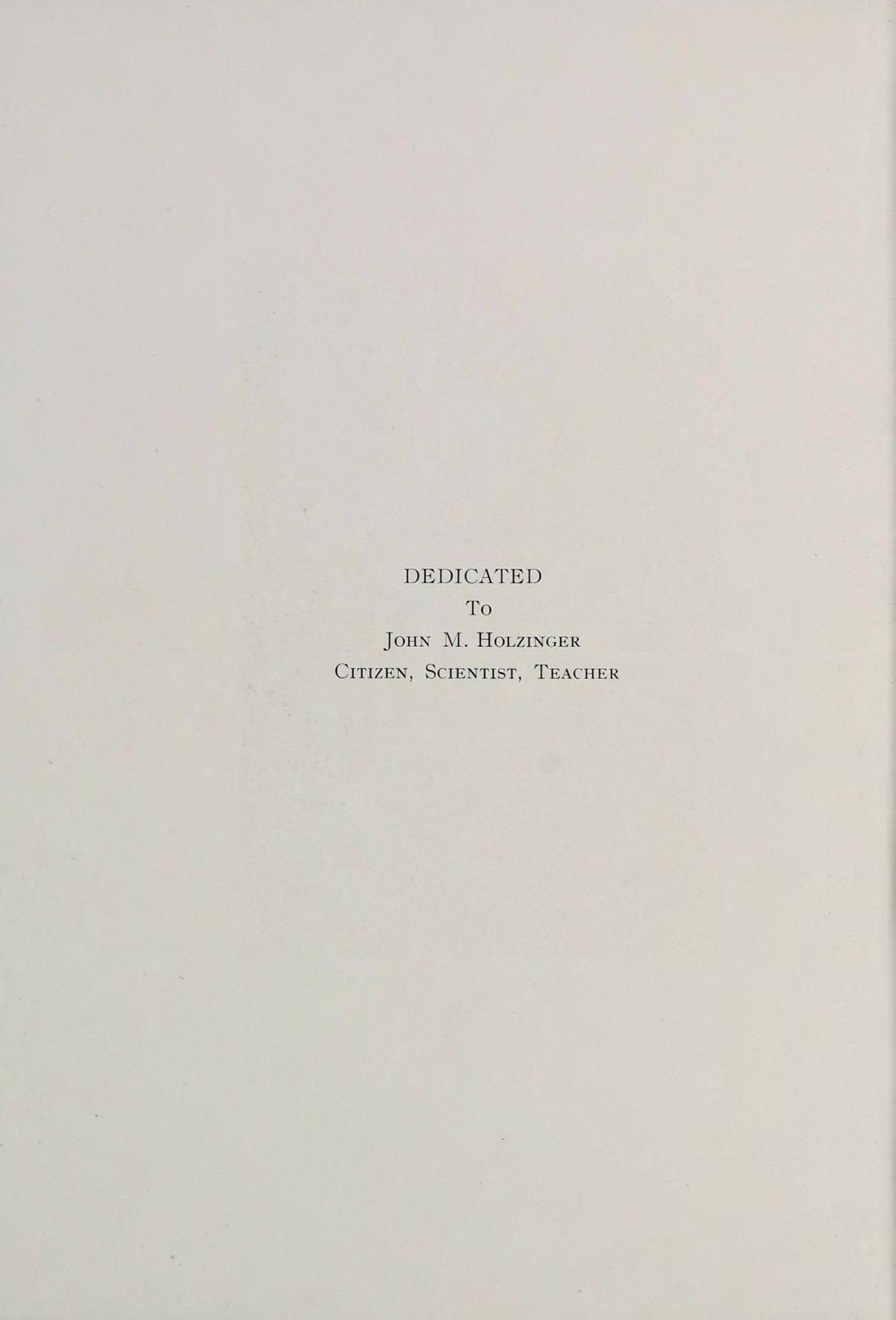
To John M. Holzinger Citizen, Scientist, Teacher
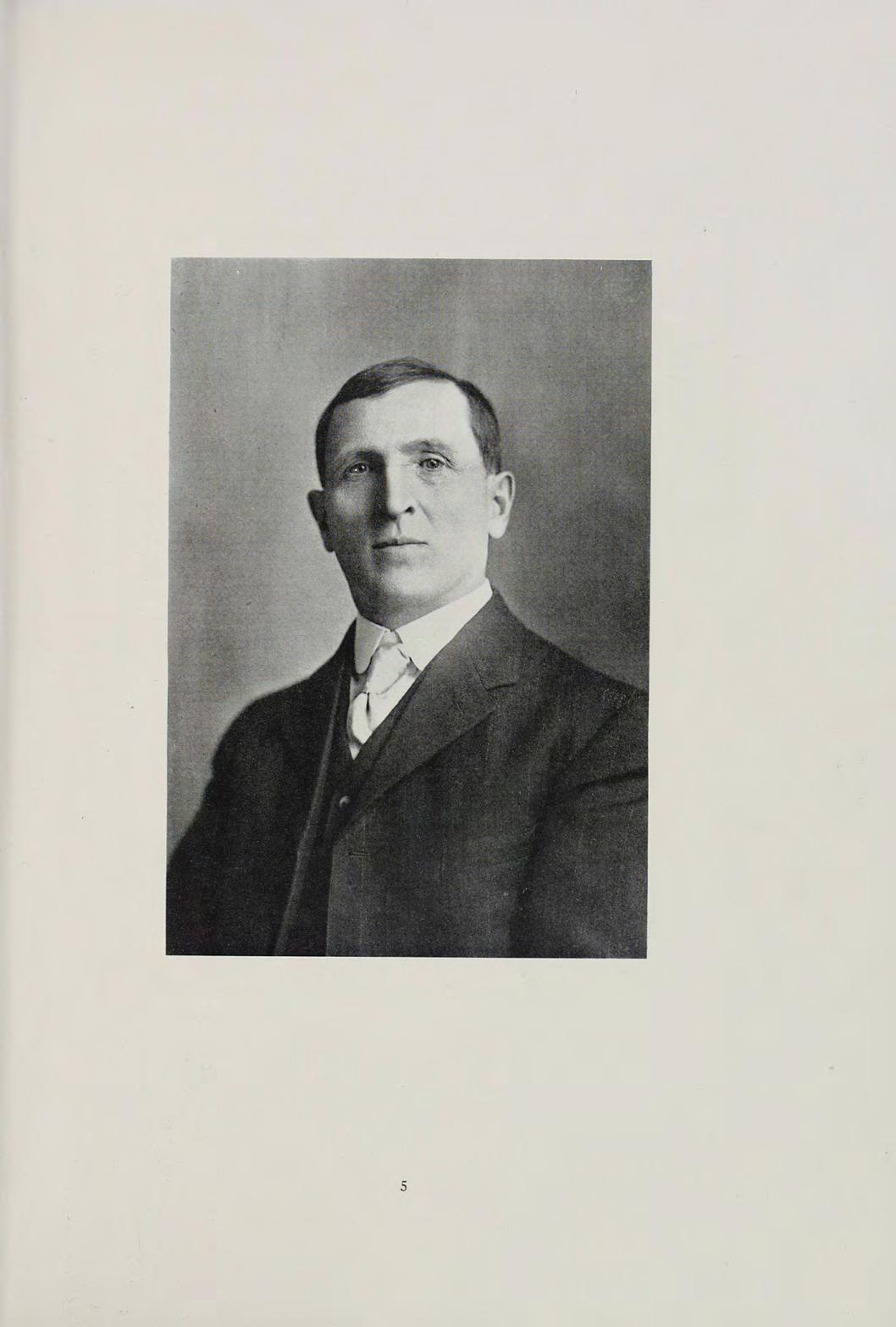
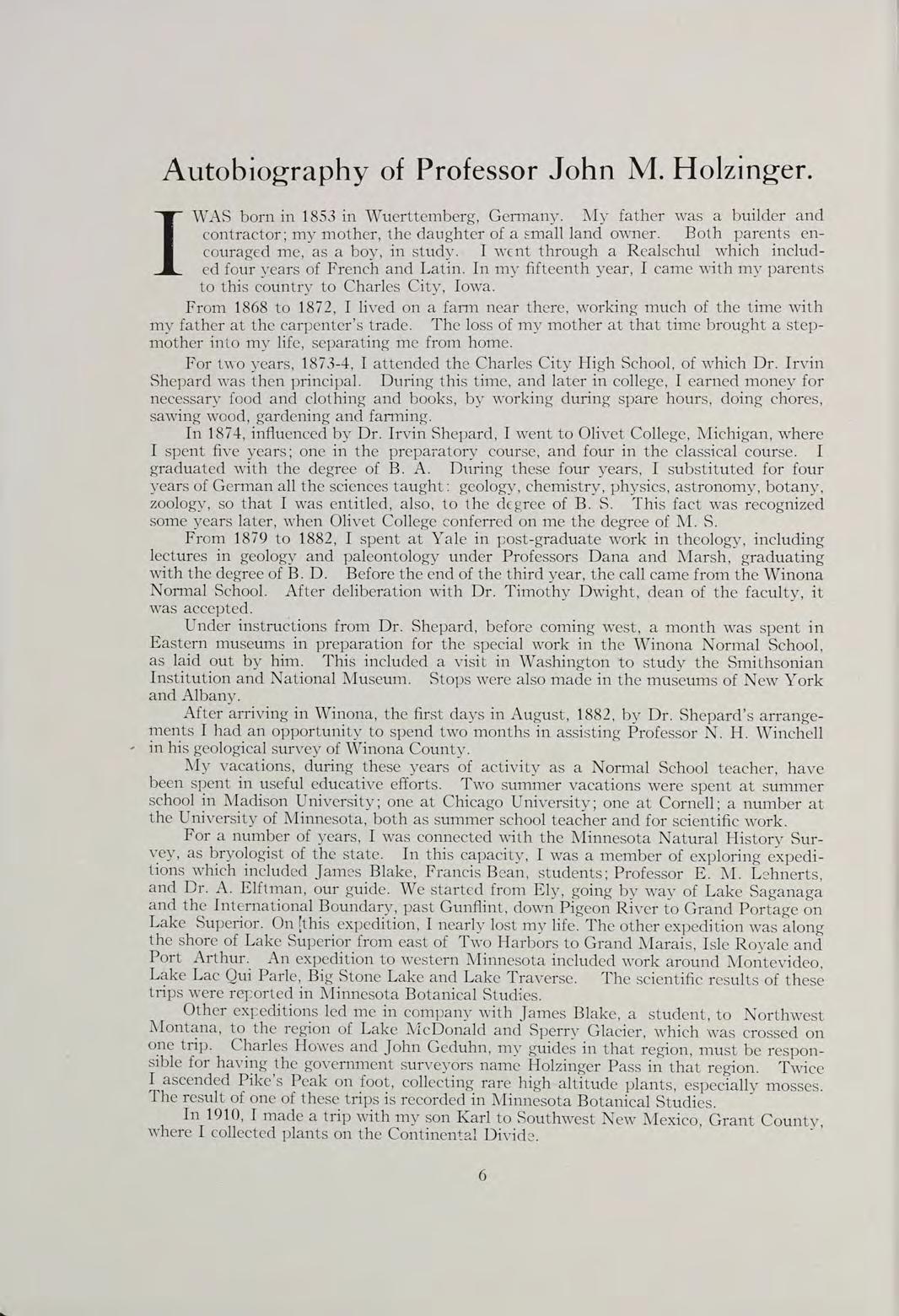
IWAS born in f 853 in Wuerttemberg, Germany. My father was a builder and contractor; my mother, the daughter of a small land owner. Both parents encouraged me, as a boy, in study. I went through a Realsehul which included four years of French and Latin. In my fifteenth year, I came with my parents to this country to Charles City, Iowa.
From 1868 to 1872, I lived on a farm near there, working muchof the time with my father at the carpenter’s trade. The loss of my mother at that time brought a stepmother into my life, separating me from home.
For two years, 1873-4, I attended the Charles City High School, of which Dr. Irvin Shepard was "then principal. During this time, and later in college, I earned money for necessary food and clothing and books, by working during spare hours, doing chores, sawing wood, gardening and farming.
In 1874, influenced by Dr. Irvin Shepard, I went to Olivet College, Michigan, where I spent five years; one in the preparatory course, and four in the classical course. I graduated with the degree of B. A. During these four years, I substituted for four years of German all the sciences taught: geology, chemistry, physics, astronomy, botany, zoology, so thatI was entitled, also, to the degree of B. S. This fact was recognized some years later, when Olivet College conferred on me the degree of M. S.
From 1879 to 1882, I spent at Yale in post-graduate work in theology, including lectures in geology and paleontology under Frofessors Dana and Marsh, graduating with the degree of B. D. Before the end of the third year, the call came from the Winona Normal School. After deliberation with Dr. Timothy Dwight, dean of the faculty, it was accepted.
Under instructions from Dr. Shepard, before coming west, a month was spent in Eastern museums in preparation for the special work in the Winona Normal School, as laid out by him. This included a visit in Washington to study the Smithsonian Institution and National Museum. Stops were also made in the museums of New York and Albany.
After arriving in Winona, the first days in August, 1882, by Dr. Shepard’s arrangements I had an opportunity to spend two months in assisting Professor N. H. Winchell in his geological survey of Winona County.
My vacations, during these years of activity as a Normal School teacher, have been spent in useful educative efforts. Two summer vacations were spent at summer school in Madison University; one at Chicago University; one at Cornell; a number at the University of Minnesota, both as summer school teacher and for scientific work.
For a number of years, I was connected with the Minnesota Natural History Survey, as bryologist of the state. In this capacity, I was a member of exploring expedi- tions which included James Blake, Francis Bean, students; Professor E. M. Lehnerts, and Dr. A. Elftman, our guide. We started from Ely, going by way of Lake Saganaga and the International Boundary, past Gunflint, down Pigeon River to Grand Portage on Lake Superior. On [this expedition, I nearly lost my life. The other expedition was along the shore of Lake Superior from east of Two Harbors to Grand Marais, Isle Royale and Port Arthur. An expedition to western Minnesota included work around Montevideo, Lake Lac Qui Parle, Big Stone Lake and Lake Traverse. The scientific results of these trips were reported in Minnesota Botanical Studies.
Other expeditions led me in company with James Blake, a student, to Northwest Montana, to the region of Lake McDonald and Sperry Glacier, which was crossed on one trip. Charles Howes and John Geduhn, my guides in that region, must be respon- sible for having the government surveyors name Holzinger Pass in that region. Twice I ascended Pike’s Peak on foot, collecting rare high altitude plants, especially mosses. The result of one of these trips is recorded in Minnesota Botanical Studies.
In 1910, I made a trip with my son Karl to Southwest New Mexico, Grant County, where I collected plants on the Continental Divide.
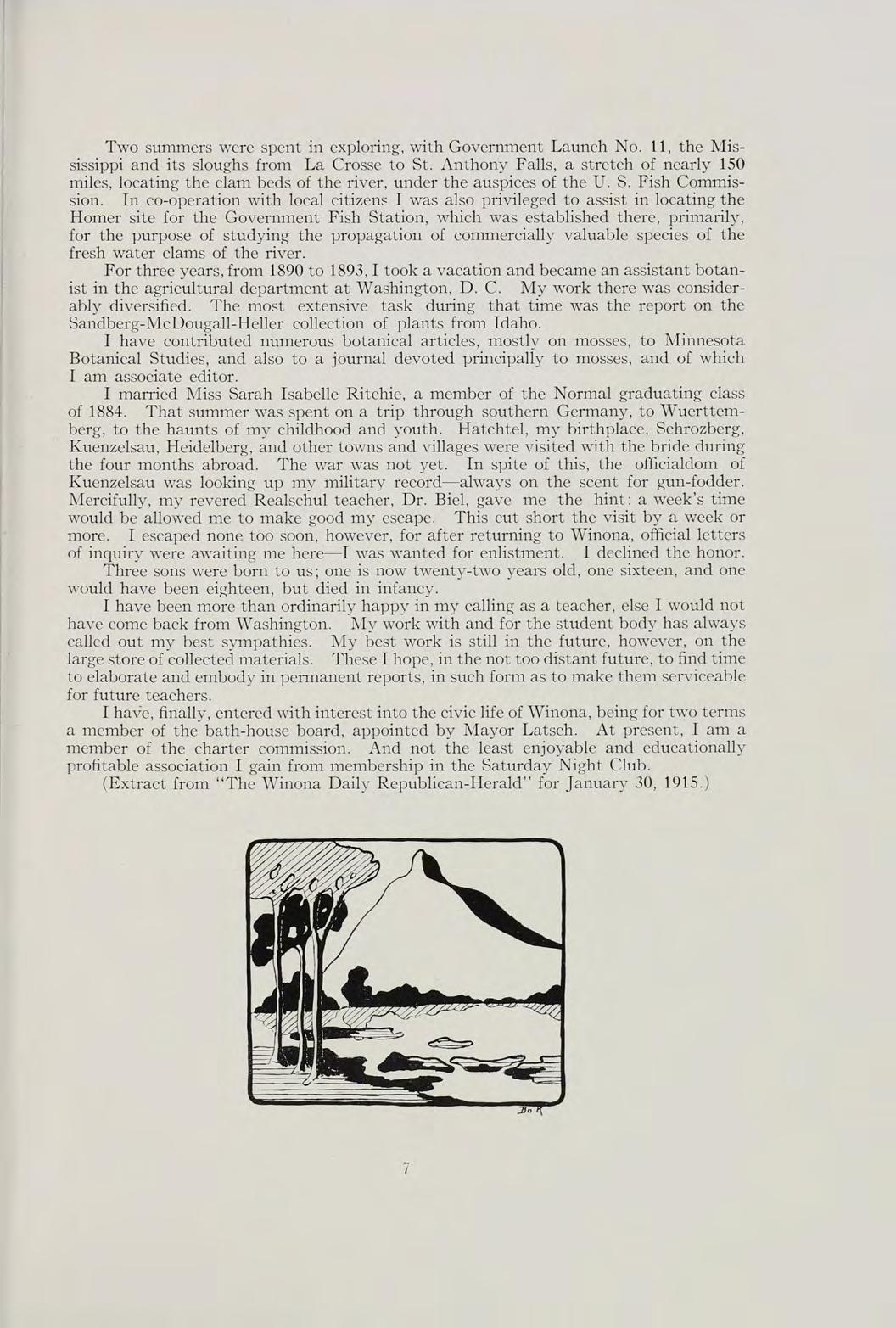
Two summers were spent in exploring, with Government Launch No. 11, the Mississippi and its sloughs from La Crosse to St. Anthony Falls, a stretch of nearly 150 miles, locating the clam beds of the river, under the auspices of the U. S. Fish Commission. In co-operation with local citizens I was also privileged to assist in locating the Homer site for the Government Fish Station, which was established there, primarily, for the purpose of studying the propagation of commercially valuable species of the fresh water clams of the river.
For three years, from 1890 to 1893,1 took a vacation and became an assistant botanist in the agricultural department at Washington, D. C. My work there was considerably diversified. The most extensive task during that time was the report on the Sandberg-MeDougall-Heller collection of plants from Idaho.
I have contributed numerous botanical articles, mostly on mosses, to Minnesota Botanical Studies, and also to a journal devoted principally to mosses, and of which I am associate editor.
I married Miss Sarah Isabelle Ritchie, a member ofthe Normal graduating class of 1884. That summer was spent on a trip through southern Germany, to Wuerttemberg, to the haunts of my childhood and youth. Hatchtel, my birthplace, Sehrozberg, Kuenzelsau, Heidelberg, and other towns and villages were visited with the bride during the four months abroad. The war was not yet. In spite of this, the officialdom of Kuenzelsau was looking up my military record—always on the scent for gun-fodder. Mercifully, my reveredRealschul teacher, Dr. Biel, gave me the hint: a week’s time would be allowed me to make good my escape. This cut short the visit by a week or more. I escaped none too soon, however, for after returning to Winona, official letters of inquiry were awaiting me here—I was wanted for enlistment. I declined the honor.
Three sons were born to us; one is now twenty-two years old, one sixteen, and one would have been eighteen, but died in infancy.
I have been more than ordinarily happy in my calling as a teacher, else I would not have come back from Washington. My work with and for the student body has always called out my best sympathies. My best work is still in the future, however, on the large store of collected materials. These I hope, in the not too distant future, to find time to elaborate and embody in permanent reports, in such form as to make them serviceable for future teachers.
I have, finally, entered with interest into the civic life of Winona, being for two terms a member of the bath-house board, appointed by Mayor Latsch. At present, I am a member of the charter commission. And not the least enjoyable and educationally profitable association I gain from membership in the Saturday Night Club.
(Extract from “The Winona Daily Republican-Herald’’ for January 30, 1915.)
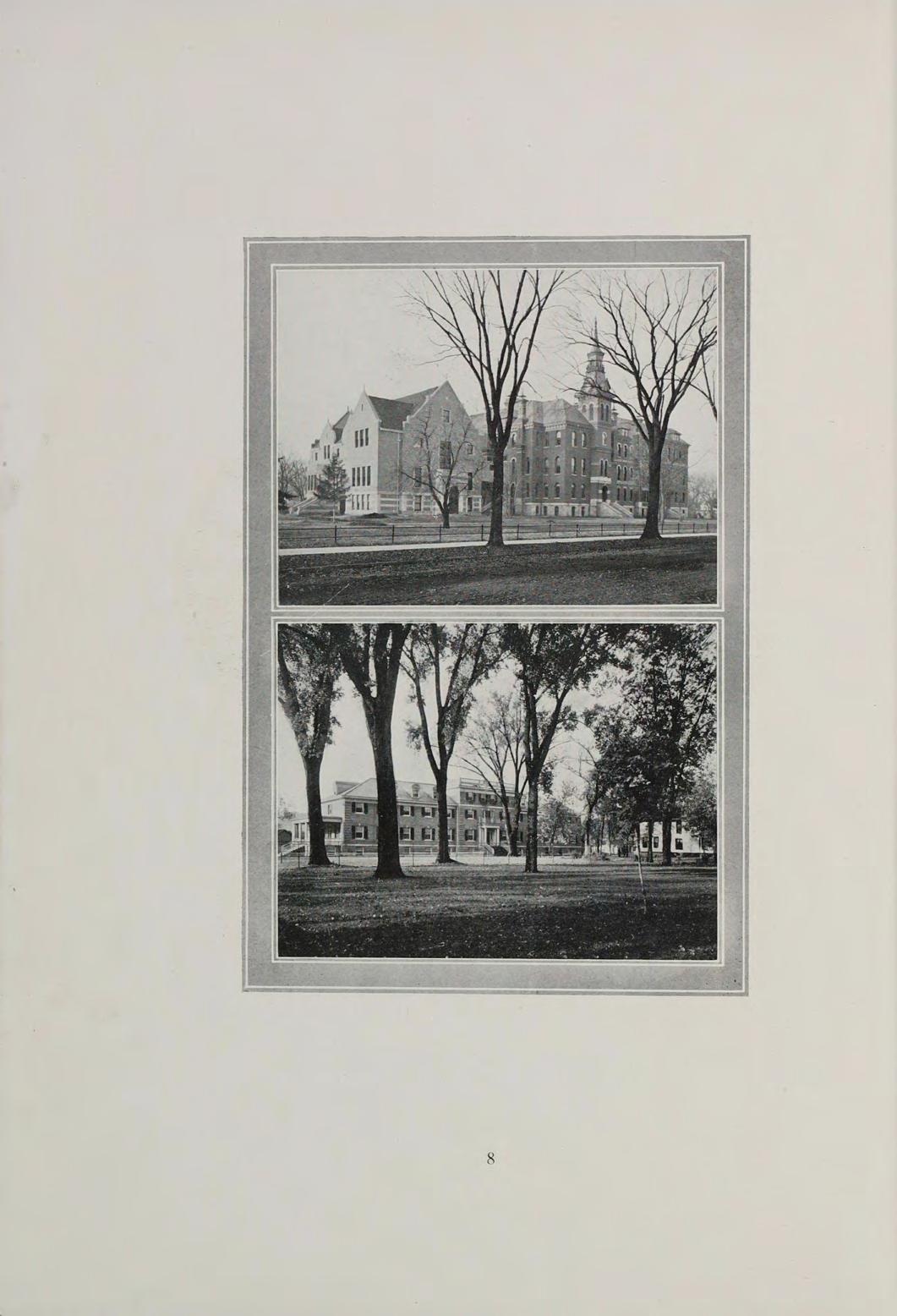
Floyd W. Moore, A. B. Assistant in History and Civics Albion College, Michigan; University of Michigan.

Maude F. Shafer, Ph. B. Mathematics, English and Erincipal of High School Milwaukee Normal School; University of Wisconsin.
President Guy E. Maxwell, M. A., A. M. Hamline University; Teachers College, Columbia University.
Caroline V. Smith
Vocal Music and Penmanship
Winona State Normal School; Summer Schools, Chicago.
William H. Munson, B. S. Zoology and Physical Science
Michigan State Normal College; Olivet College; University of Michigan; University of Chicago. //,
Mary W. Holmes, B. A., B. S. Associate in Kindergarten Education
Wellesley College; Teachers College, Columbia University. 9
O. M. Dickerson, A. B., A. M., Ph. D. History and Social Science Illinois State Normal University; University of Illinois; Harvard University.
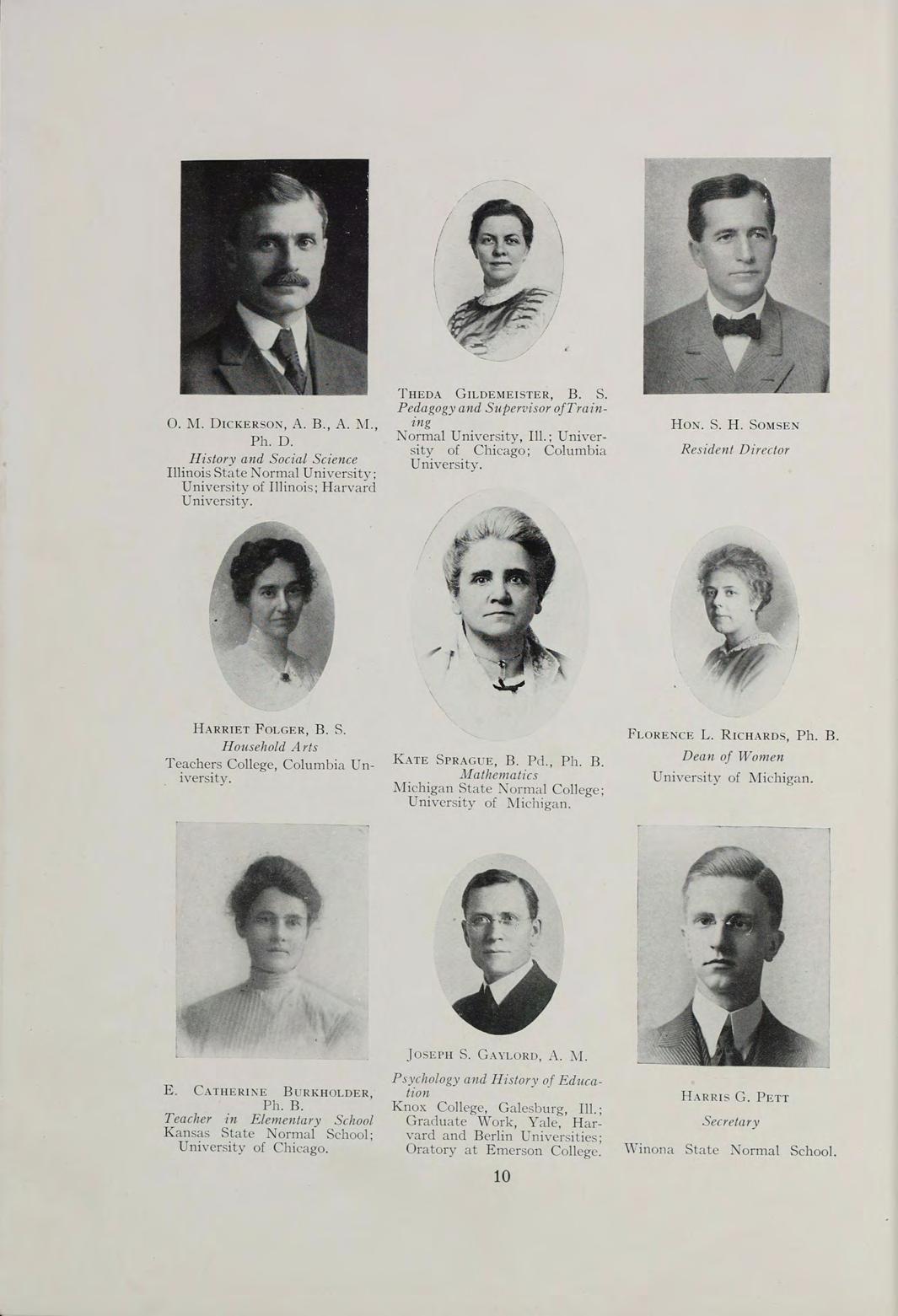
m
Harriet Folger, B. S. Household Arts Teachers College, Columbia University.
Theda Gildemeister, B. S. Pedagogy and Supervisor ofTraining Normal University, Ill.; University of Chicago; Columbia University.
E. Catherine Burkholder, Ph. B. Teacher in Elementary School Kansas State Normal School; University of Chicago.
Kate Sprague, B. Pd., Ph. B. Mathematics Michigan State Normal College; University of Michigan.
Joseph S. Gaylord, A. M. Psychology and History of Education Knox College, Galesburg, Ill.; Graduate Work, Yale, Harvard and Berlin Universities; Oratory at Emerson College.
Julia W. AEbott Kindergarten Education Teachers College, Columbia University.
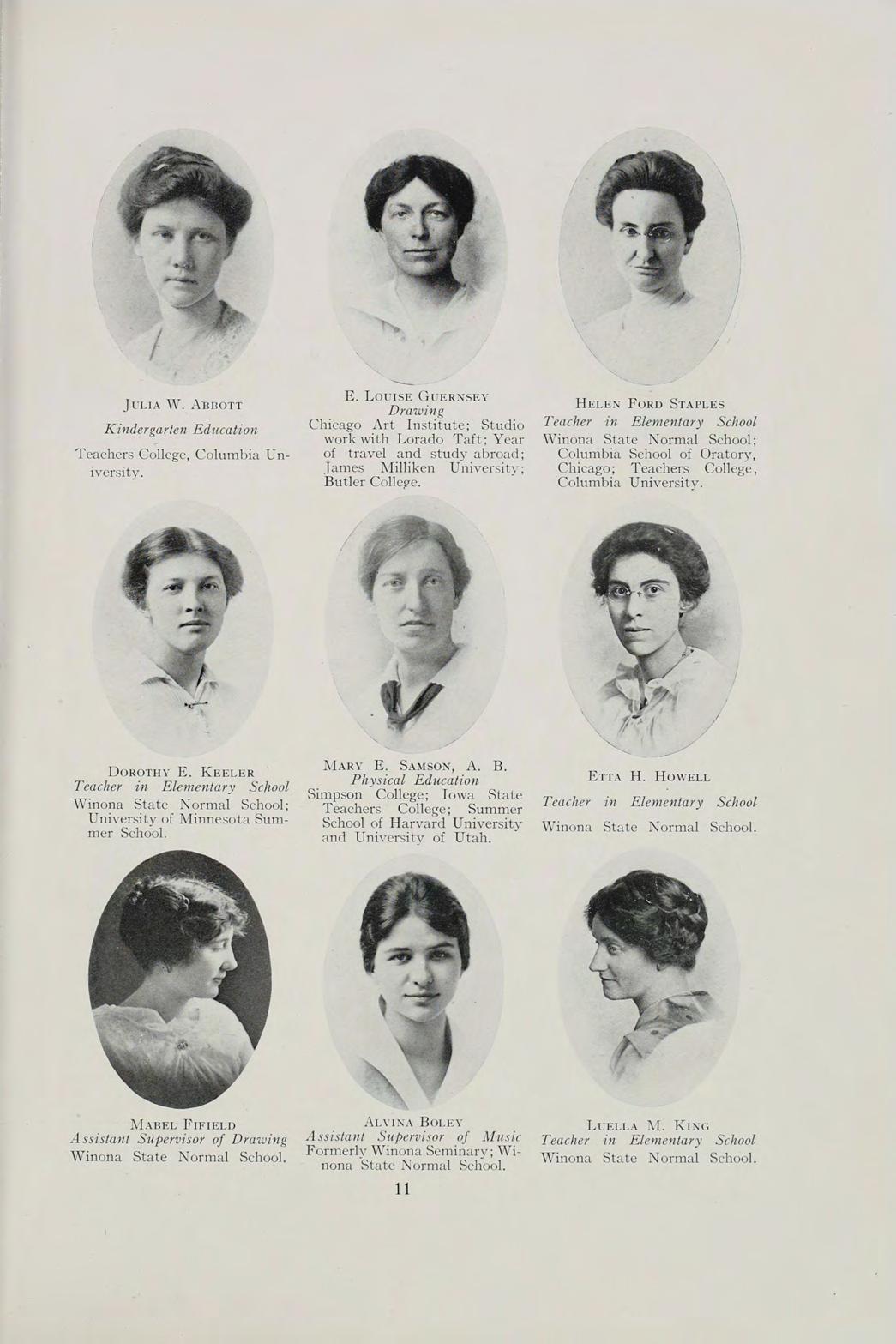
Dorothy E. Keeler Teacher in Elementary School Winona State Normal School; University of Minnesota Summer School.
E. Louise Guernsey Drawing Chicago Art Institute; Studio work with Lorado Taft; Year of travel and study abroad; James Milliken University; Butler College.
Helen Ford Staples Teacher in Elementary School Winona State Normal School; Columbia School of Oratory, Chicago; Teachers College, Columbia University.
Mabel Fifield Assistant Supervisor of Drawing Winona State Normal School.
Mary E. Samson, A. B. Physical Education Simpson College; Iowa State Teachers College; Summer School of Harvard University and University of Utah.
Etta H. Howell Teacher in Elementary School Winona State Normal School.
Alvina Boley Assistant Supervisor of Music Formerly Winona Seminary; Winona State Normal School.
Luella M. King Teacher in Elementary School Winona State Normal School.
Walter O. Abram Assistant in Industrial Arts State Teachers College, Iowa.
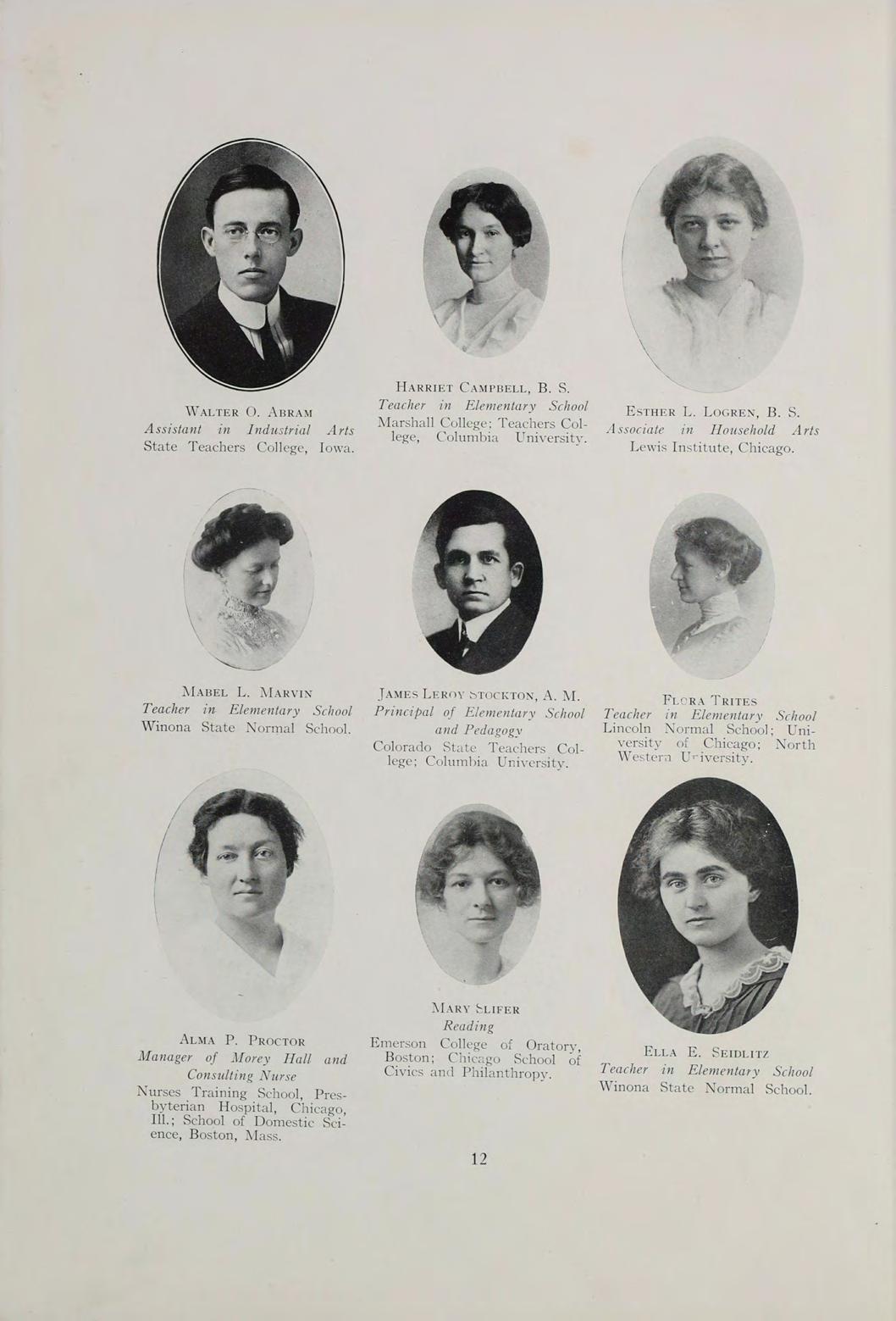
Mabel L. Marvin Teacher in Elementary School Winona State Normal School.
Harriet Campbell, B. S. Teacher in Elementary School Marshall College: Teachers College, Columbia University.
Household Arts Lewis Institute, Chicago.
Alma P. Proctor
Manager of Morey Hall and Consulting Nurse Nurses Training School, Presbyterian Hospital, Chicago, Ill.; School of Domestic Science, Boston, Mass.
James Leroy 6tockton, A. M. Principal of Elementary School and Pedagogy Colorado State Teachers College; Columbia University.
Flcra Trites Teacher in Elementary School Lincoln Normal School; University of Chicago; North Western University.
Mary Slifer Reading Emerson College of Oratory, Boston; Chicago School of Civics and Philanthropy.
Ella E. Seidlitz Teacher in Elementary School Winona State Normal School.
Vernon L. Mangun, A. M. English
Cornell Academy, Iowa; Cornell College, Iowa; University of Iowa;Universitv of Chicago.
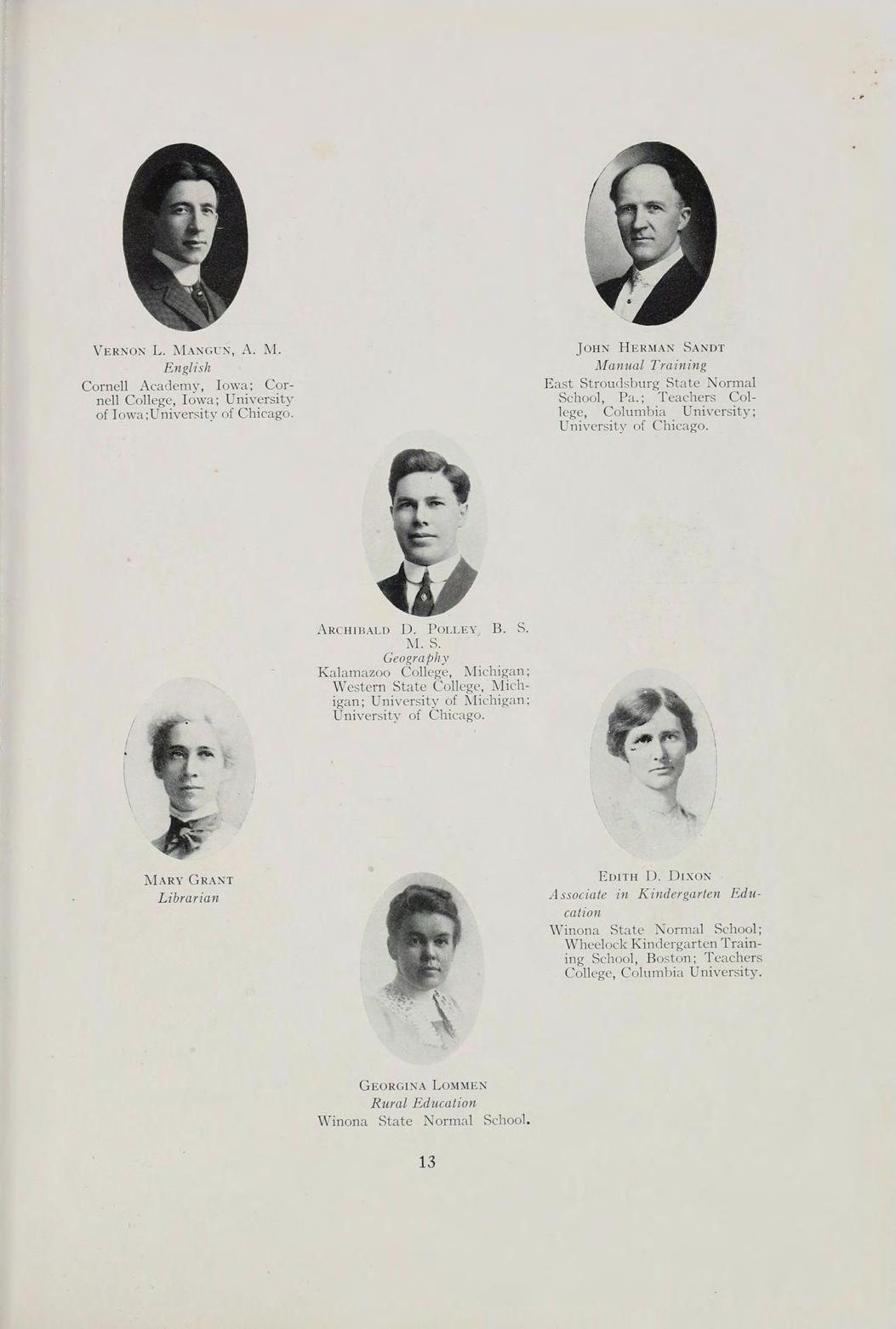
Mary Grant Librarian
Archibald D. Polley B. S.
M. S. Geography
Kalamazoo College, Michigan; Western State College, Michigan; University of Michigan; University of Chicago.
John Herman Sandt Manual Training
East Stroudsburg State Normal School, Pa.; Teachers College, Columbia University; University of Chicago.
Georgina Lommen Rural Education
Winona State Normal School.
Edith D. Dixon
Associate in Kindergarten Edncation
Winona State Normal School; Wheelock Kindergarten Training School, Boston; Teachers College, Columbia University.
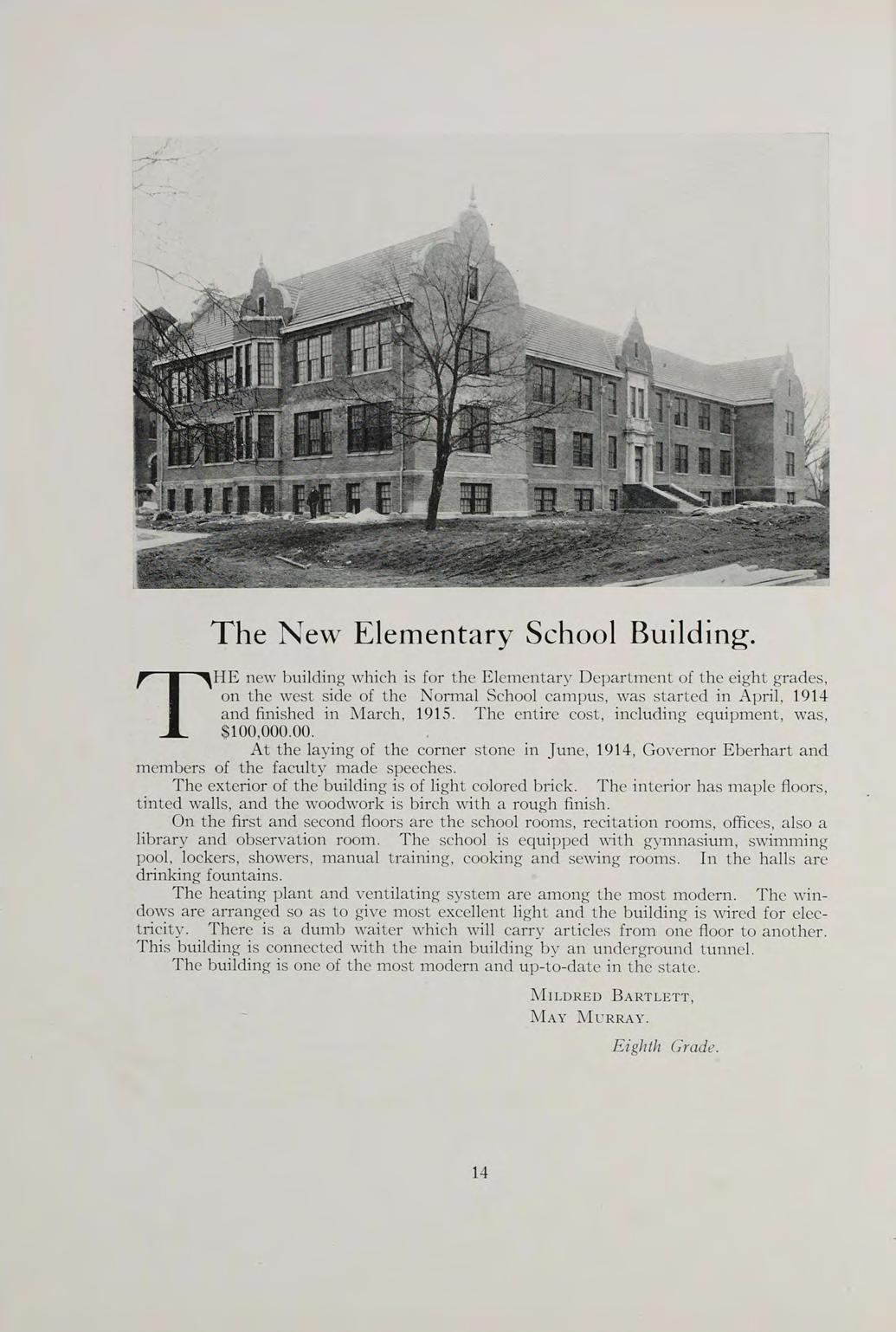
THE new building which is for the Elementary Department of the eight grades, on the west side of the Normal School campus, was started in April, 1914 and finished in March, 1915. The entire cost, including equipment, was, $100 000 00
At the laying ofthe corner stone in June, 1914, Governor Eberhart and members of the faculty made speeches.
The exterior of the building is of light colored brick. The interior has maple floors, tinted walls, and the woodwork is birch with a rough finish.
On the first and second floors are the school rooms, recitation rooms, offices, also a library and observation room. The school is equipped with gymnasium, swimming pool, lockers, showers, manual training, cooking and sewing rooms. In the halls are drinking fountains.
The heating plant and ventilating system are among the most modern. The windows are arranged so as to give most excellent light and the building is wired for electricity. There is a dumb waiter which will carry articles from one floor to another. This building is connected with the main building by an underground tunnel.
The building is one of the most modern and up-to-date in the state.
Mildred Bartlett, May Murray.
Eighth Grade.
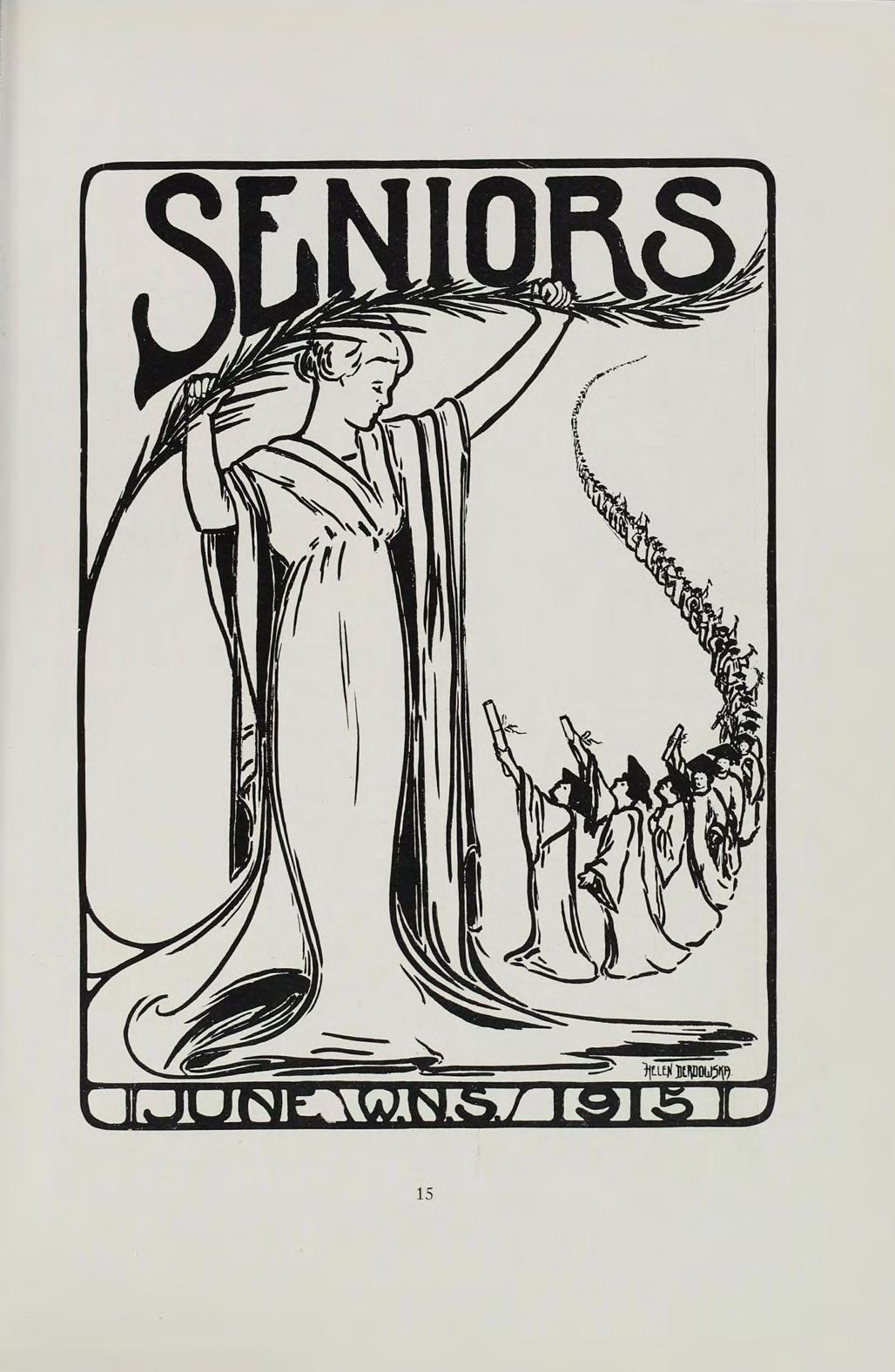

May Tolleson Kindergarten Winona
Enjoy life ere it's fled When you die, you're a long time dead."
H. Gladys Torbenson Kindergarten Sacred Heart “A disposition to make every corner cozy."
Susie Thompson Kindergarten Lyle Blessed is she who devotes her life to great and noble ends and who forms her well-considered plans with deliberate wisdom."
Loretta Slatterly
Advanced Rochester Truth is the highest thing that man keeps."
Rosella Trawicky
Advanced Winona “/ stay my haste, I make delays, For what avails this eager pace?"
Helen Wright
Advanced Eyota “Brevity is the soul of wit."
Lilah Train
Advanced Browns Valley
“How wise, how noble, young, how rarely featured."
William Baker
Advanced Winona
“Nowher so bisy a man as he ther was, And yet he seemed bisier than he was."
Grace A. Strong Advanced Winona
“A dram of sweet is worth a pound of sour."
Martha Schumacher Special Winona
“One moral certainly is plain without more fuss, Man's social happiness all rests on us."
Grace Sinclair Elementary Baker, Mont.
“She has brown hair and speaks small like a woman."
Peter N. Tri Advanced Alazeppa
“Look, he’s winding up the watch o' his wit; By and by it will strike."
Elise Schwirtz Advanced Wabasha
“If I am not great, I am what I am."
Irma Smith Advanced Winona
“Certainly a woman’s thought runs before her words."
Beatrice Scott Kindergarten Waseca
“I have no other but a woman’s reason: I think him so because I think him so."
Advanced “Hir
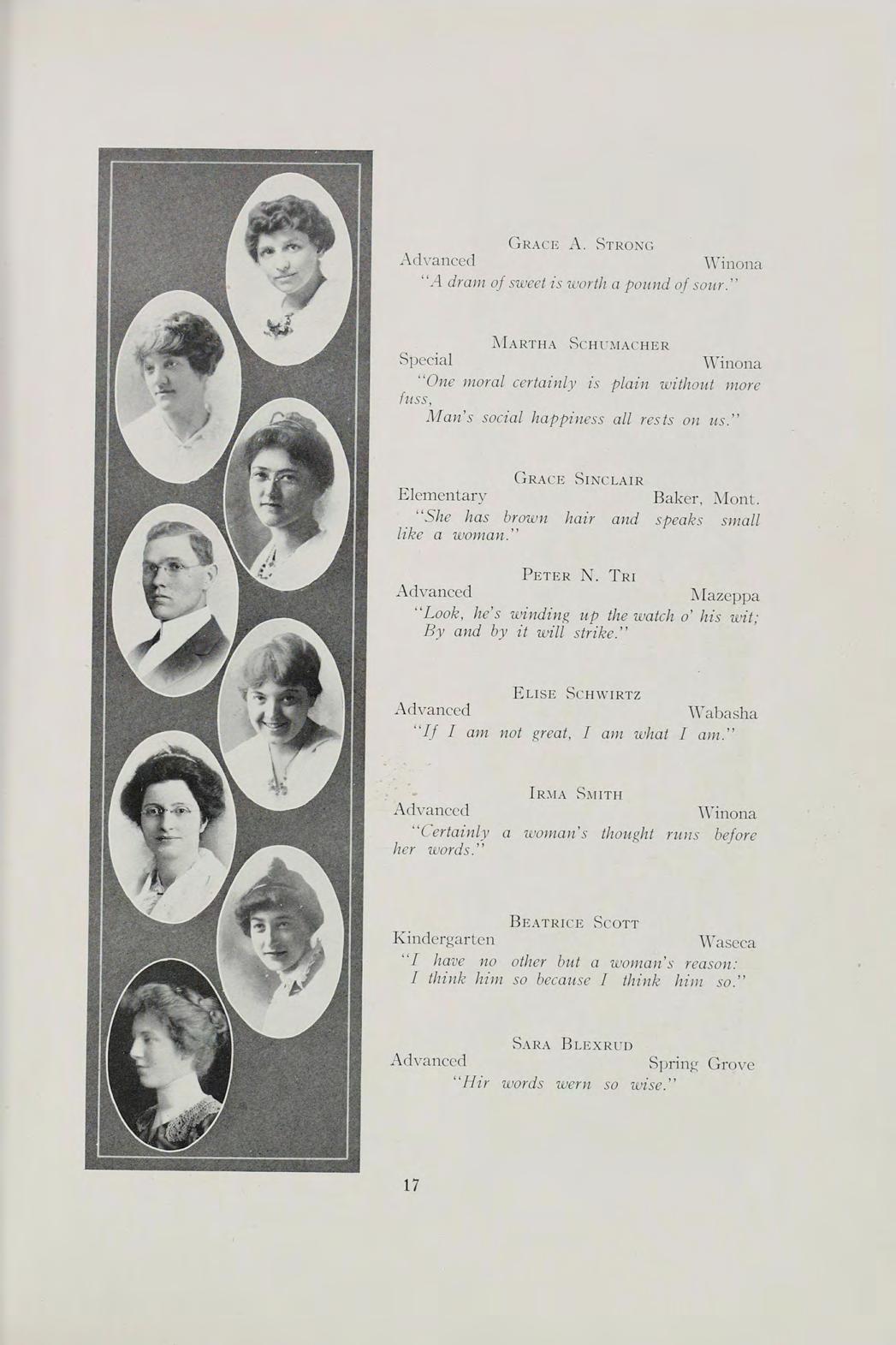
Sara Blexrud Spring Grove words wern so wise."
Hedvig Vigerta Rasmussen
Advanced Willmar “Tall and most divinely fair."
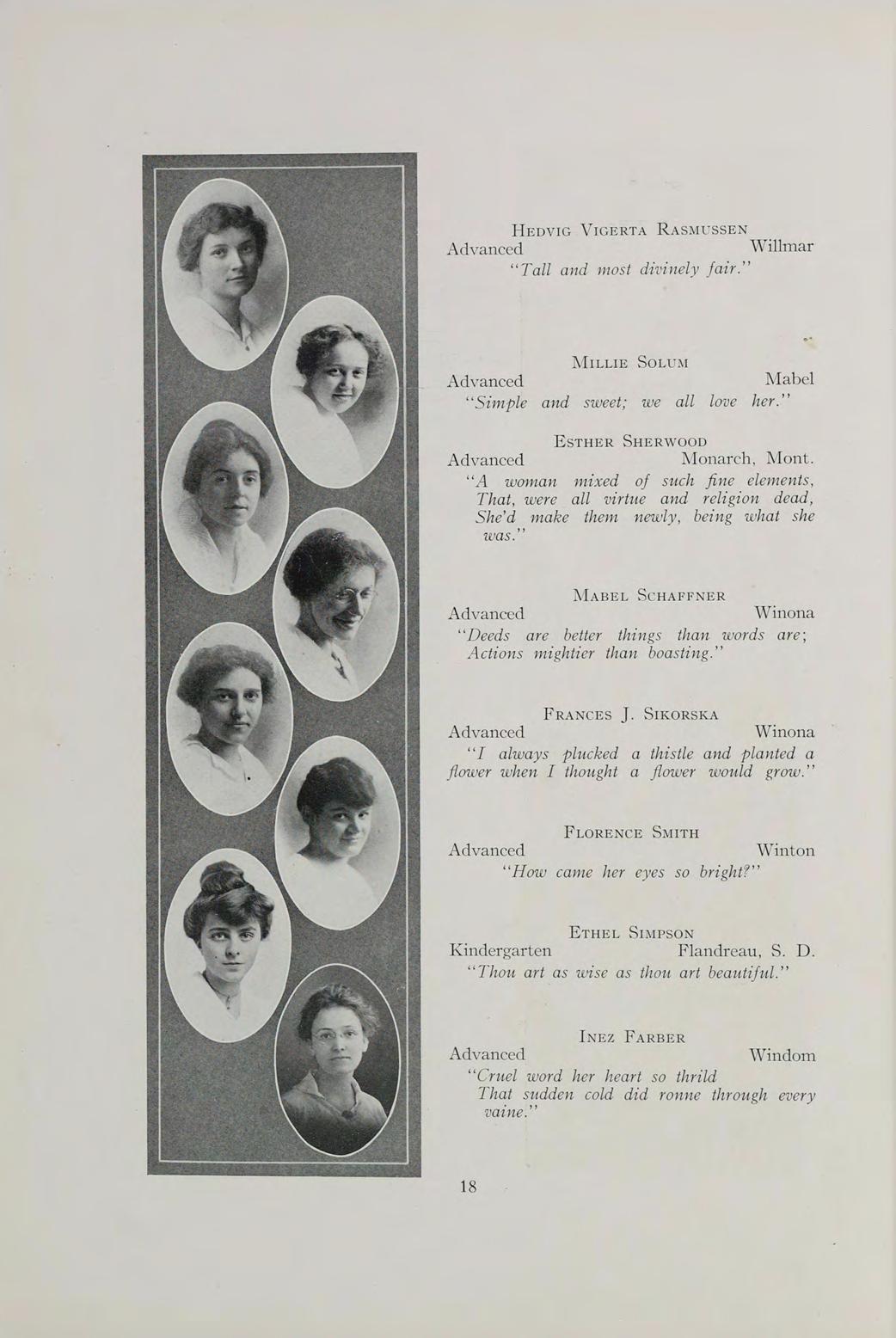
Millie Solum
Advanced Mabel
“Simple and sweet; we all love her."
Esther Sherwood
Advanced Monarch, Mont.
“A woman mixed of suck fine elements, That, were all virtue and religion dead, She'd make them newly, being what she was."
Mabel Schaffner
Advanced Winona “Deeds are better things than words are ; Actions mightier than boasting
Frances J. Sikorska
Advanced Winona
“I always plucked a thistle and planted a flower when I thought a flower would grow.”
Florence Smith
Advanced Winton
“How came her eyes so bright?”
Ethel Simpson
Kindergarten Flandreau, S. D.
“Thou art as wise as thou art beautiful
Inez Farber
Advanced Windom
“Cruel word her heart so thrild
That sudden cold did ronne through every vaine 18
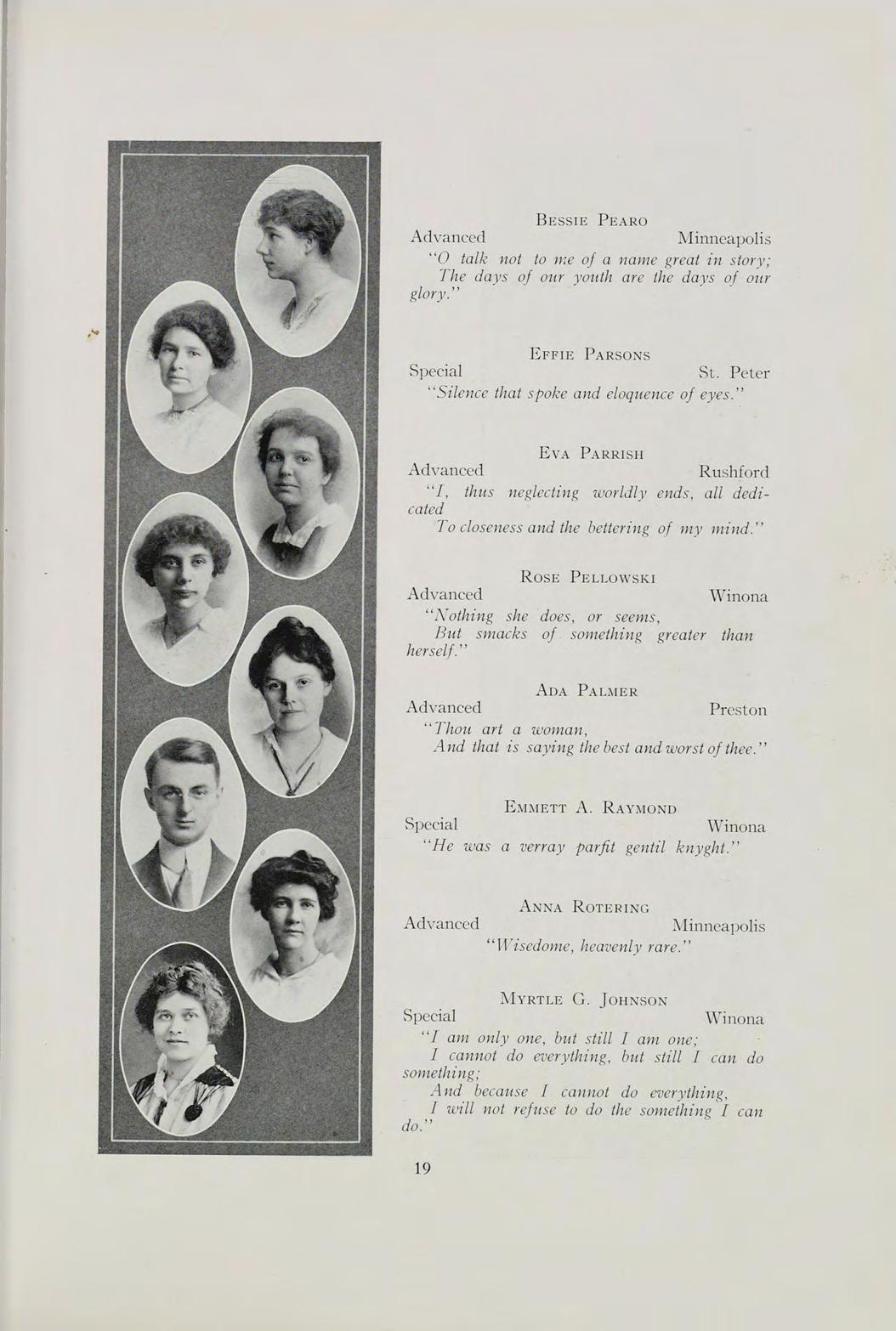
Bessie Pearo
Advanced Minneapolis
"0 talk not to me of a name great in story; The days of our youth are the days of our glory."
Effie Parsons
Special St. Peter “Silence that spoke and eloquence of eyes."
Eva Parrish
Advanced Rushford
"I, thus neglecting worldly ends, all dedicated To closeness and the bettering of my mind"
Rose Pellowski Advanced Winona
“Nothing she does, or seems, But smacks of something greater than herself."
Ada Palmer
Advanced Preston “Thou art a woman, And that is saying the best and worst of thee."
Emmett A. Raymond
Special Winona
"He was a verray parfit gentil knyght"
Anna Rote ring
Advanced Minneapolis "Wisedome, heavenly rare."
Myrtle G. Johnson Special Winona
"I am only one, but still I am one; I cannot do everything, but still I can do something;
And because I cannot do everything, I will not refuse to do the something / can do."
Mary Edd
Advanced Winona
“To be slow in words is a woman's only virtue.''
Stella MacLean
Advanced Taylors Falls
“As a wit, if notfirst, in the very first rank."
Marguerite Kirwan Miller
Advanced Minneapolis
“She loses not many words."
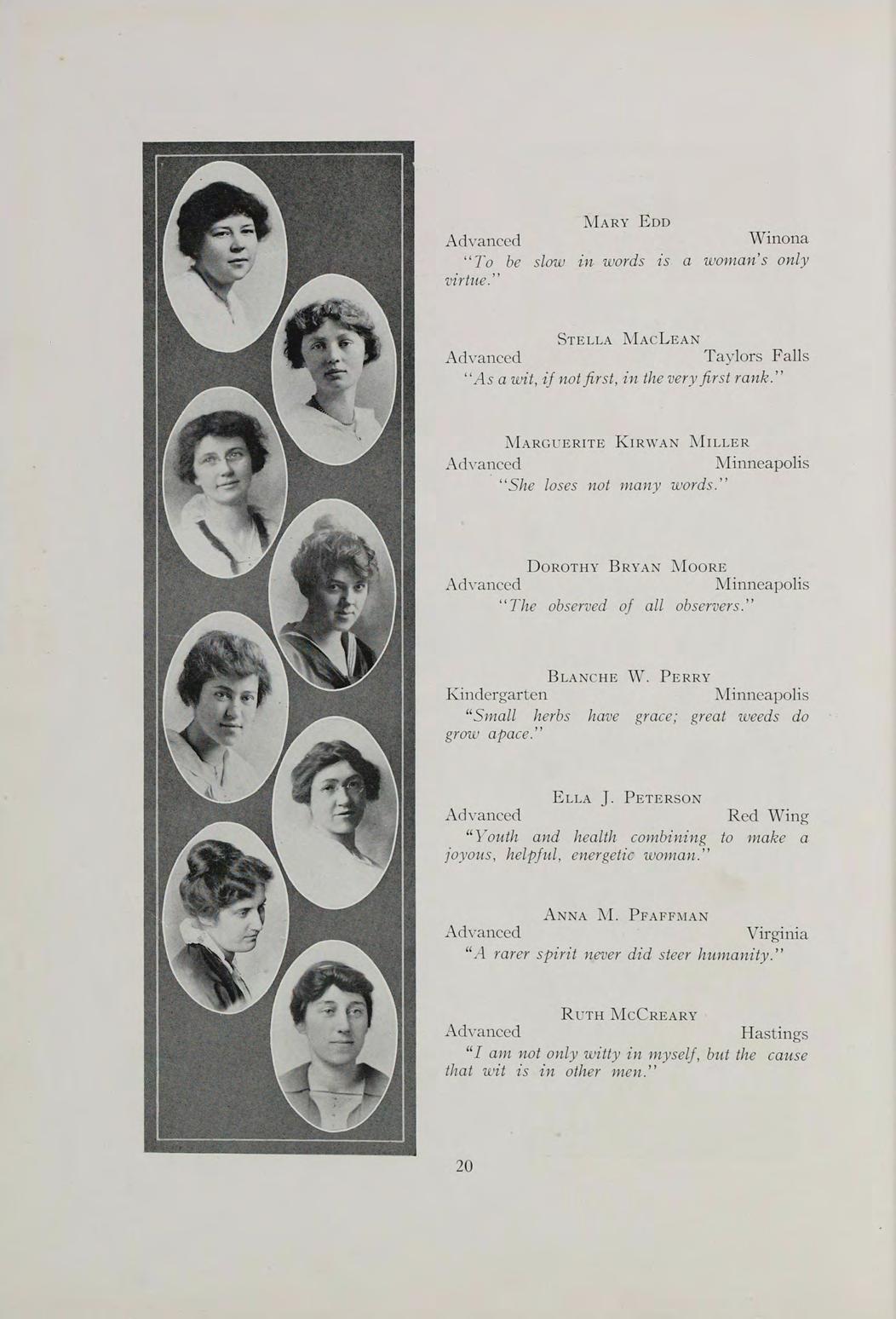
Dorothy Bryan Moore
Advanced Minneapolis “The observed of all observers."
Blanche W. Perry Kindergarten Minneapolis
u Small herbs have grace; great weeds do grow apace."
Ella J. Peterson
Advanced Red Wing
“Youth and health combining to make a joyous, helpfid, energetic woman."
Anna M. Pfaffman
Advanced Virginia
“A rarer spirit never did steer humanity."
Ruth McCreary
Advanced Hastings
“I am not only witty in myself, but the cause that wit is in other men."
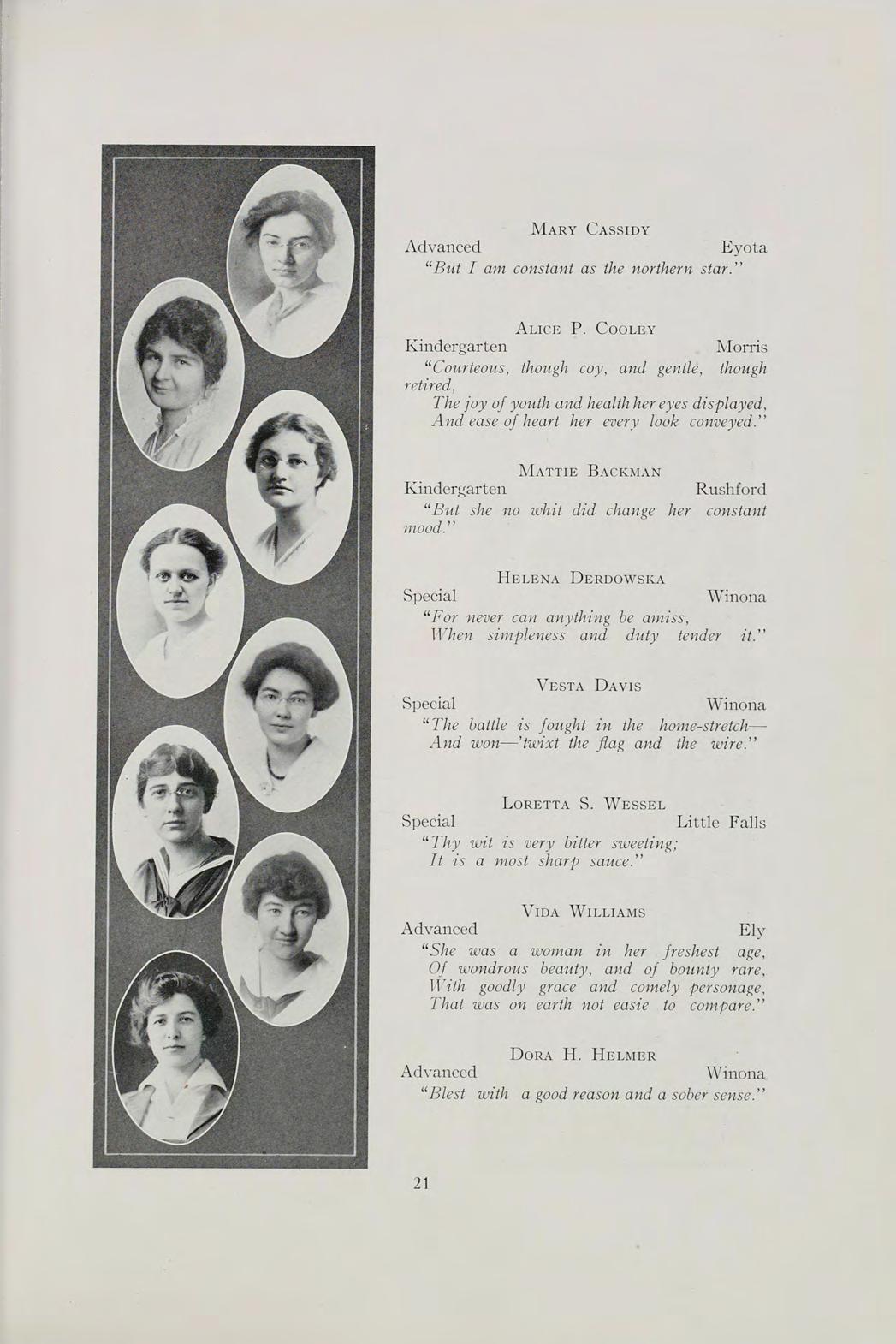
Mary Cassidy
Advanced Eyota
“But I am constant as the northern star."
Alice P. Cooley
Kindergarten Morris
Courteous, though coy, and gentle, though retired,
The joy of youth and health her eyes displayed, And ease of heart her every look conveyed"
Mattie Backman
Kindergarten Rushford
“But she no whit did change her constant mood.''
Helena Derdowska
Special Winona
“For never can anything he amiss, When simpleness and duty tender it."
Vesta Davis
Special Winona
“The battle is fought in the home-stretch And won—'twixt the flag and the wire."
Loretta S. Wessel
Special Little Falls
“Thy wit is very hitter sweeting; It is a most sharp sauce."
Vida Williams
Advanced Ely
“She was a woman in her freshest age, Of wondrous beauty, and of bounty rare, With goodly grace and comely personage, That was on earth not easie to compare."
Dora H. Helmer
Advanced Winona
“Blest with a good reason and a sober sense."
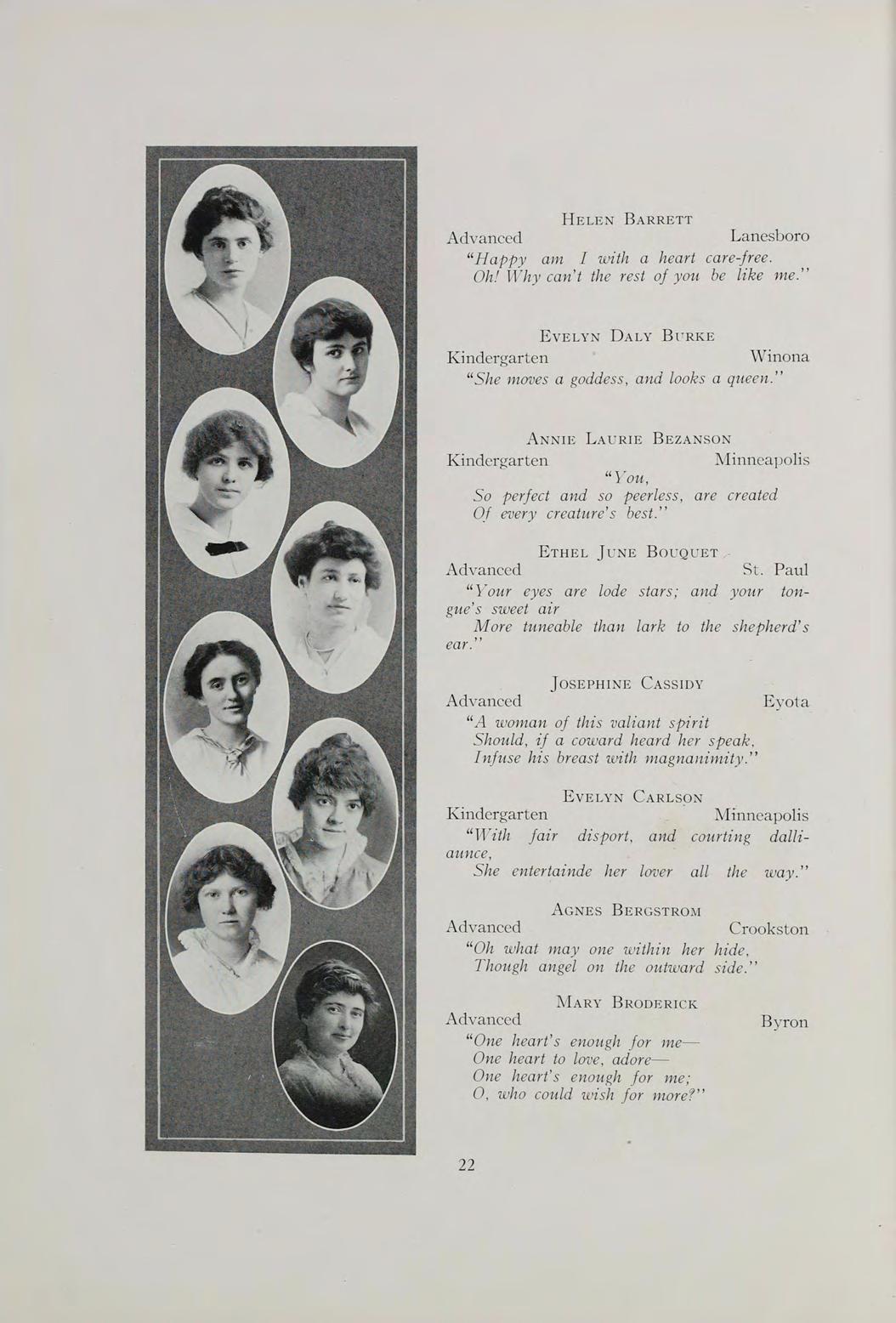
Helen Barrett
Advanced Lanesboro
“Happy am I with a heart care-free. Oh! Why can't the rest of you be like me."
Evelyn Daly Burke
Kindergarten Winona
“She moves a goddess, and looks a queen."
Annie Laurie Bezanson
Kindergarten Minneapolis
“You, So perfect and so peerless, are created Of every creature’s best."
Ethel June Bouquet
Advanced St. Paul
“Your eyes are lode stars; and your tongue's sweet air More tuneable than lark to the shepherd’s ear.’’
Josephine Cassidy
Advanced Eyota
“A woman of this valiant spirit Should, if a coward heard her speak. Infuse his breast with magnanimity."
Evelyn Carlson
Kindergarten Minneapolis
“With fair disport, and courting dalliounce, She entertainde her lover all the way."
Agnes Bergstrom
Advanced Crookston
“Oh what may one within her hide, Though angel on the outward side."
Mary Broderick
Advanced Byron
“One heart’s enough for me
One heart to love, adore One heart’s enough for me; O, who could wish for more?"
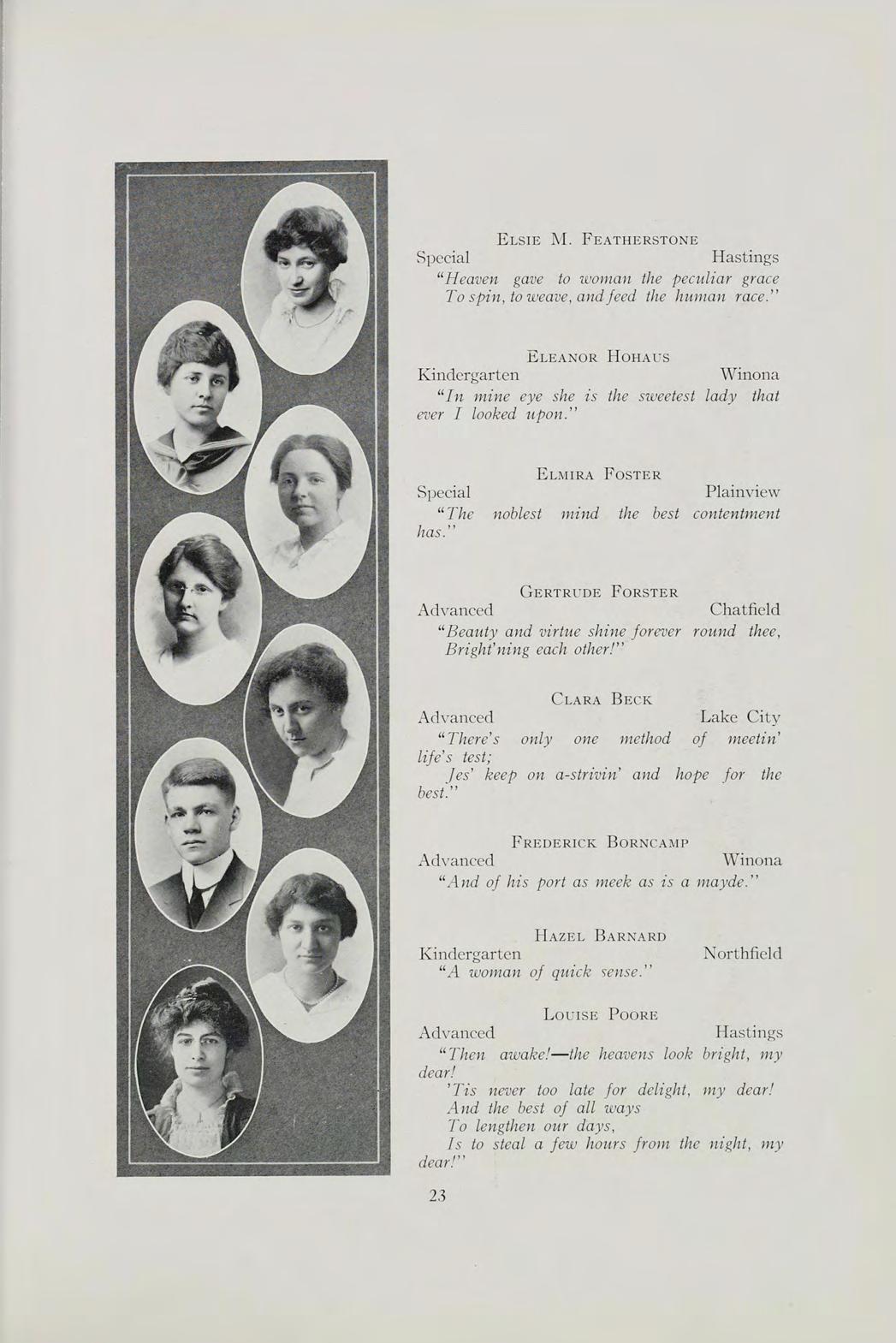
Elsie M. Featherstone
Special Hastings
“Heaven gave to woman the peculiar grace To spin, to weave, andfeed the human race."
Eleanor Hohaus
Kindergarten Winona
“In mine eye she is the sweetest lady that ever I looked upon."
Elmira Foster
Special Plainview
“The noblest mind the best contentment has."
Gertrude Forster
Advanced Chatfield
“Beauty and virtue shine forever round thee, Bright'ning each other!"
Clara Beck
Advanced Lake City
“There's only one method of meetin life's test; Jes' keep on a-strivin and hope for the best."
Frederick Borncamp
Advanced Winona
“And of his port as meek as is a mayde."
Hazel Barnard
Kindergarten Northfield
“A woman of quick sense."
Louise Poore
Advanced Hastings
“Then awake!—the heavens look bright, my dear!
'Tis never too late for delight, my dear! And the best of all ways
To lengthen our days, Is to steal a few hours from the night, my dear!"
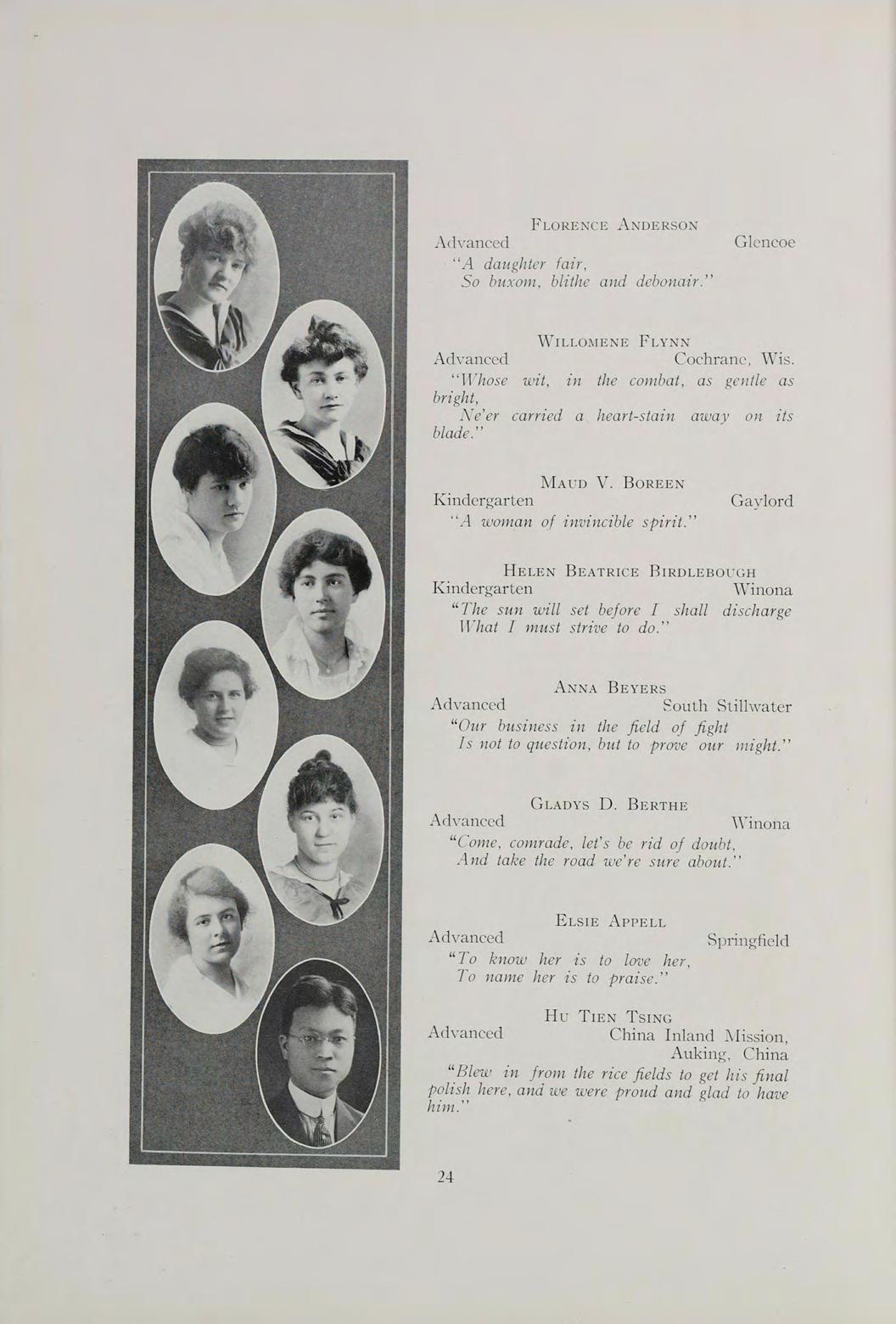
Florence Anderson Advanced Glencoe
“A daughter fair, So buxom, blithe and debonair."
Willomene Flynn Advanced Cochrane, Wis.
“Whose wit, in the combat, as gentle as bright, Ne'er carried a heart-stain away on its blade."
Maud V. Boreen Kindergarten Gaylord “A woman of invincible spirit."
Helen Beatrice Birdlebough Kindergarten Winona
“The sun will set before I shall discharge What I must strive to do."
Anna Beyers Advanced South Stillwater
“Our business in the field of fight Is not to question, but to prove our might."
Gladys D. Berthe Advanced Winona
“Come, comrade, let's be rid of doubt, And take the road we're sure about."
Elsie Appell Advanced Springfield
“To know her is to love her, To name her is to praise."
Hu Tien Tsing Advanced China Inland Mission, Auking, China
“Blew in from the rice fields to get his final polish here, and we were proud and glad to have him."

Ellenora Carlson Kindergarten Ortonville
“Slow to resolve, but in performance quick."
Alice Marie Bruner
Advanced Minneapolis
“0/ remedies of love she knew perchaunce, For she coude of that art the olde daunce."
Harriet Derdowska Advanced Winona
There's little in life but labor, And tomorrow may prove but a dream ,— Success is the bride of Endeavor, And luck but a meteor's gleam."
Dorothy B. Brown Advanced Winona “Mistress of herself, though china fall."
Blanche W. Barr Advanced Winona
“A mind at peace with all below; A heart whose love is innocent."
Ruth B. Bischoff Advanced Minneapolis Beware! I may yet do something sensational."
Frances Beckmark Advanced Red Wing
11 To be strong, is to be happy."
Gladys Saxton Advanced St. Charles
“I have a mans mind but a woman s might." 25
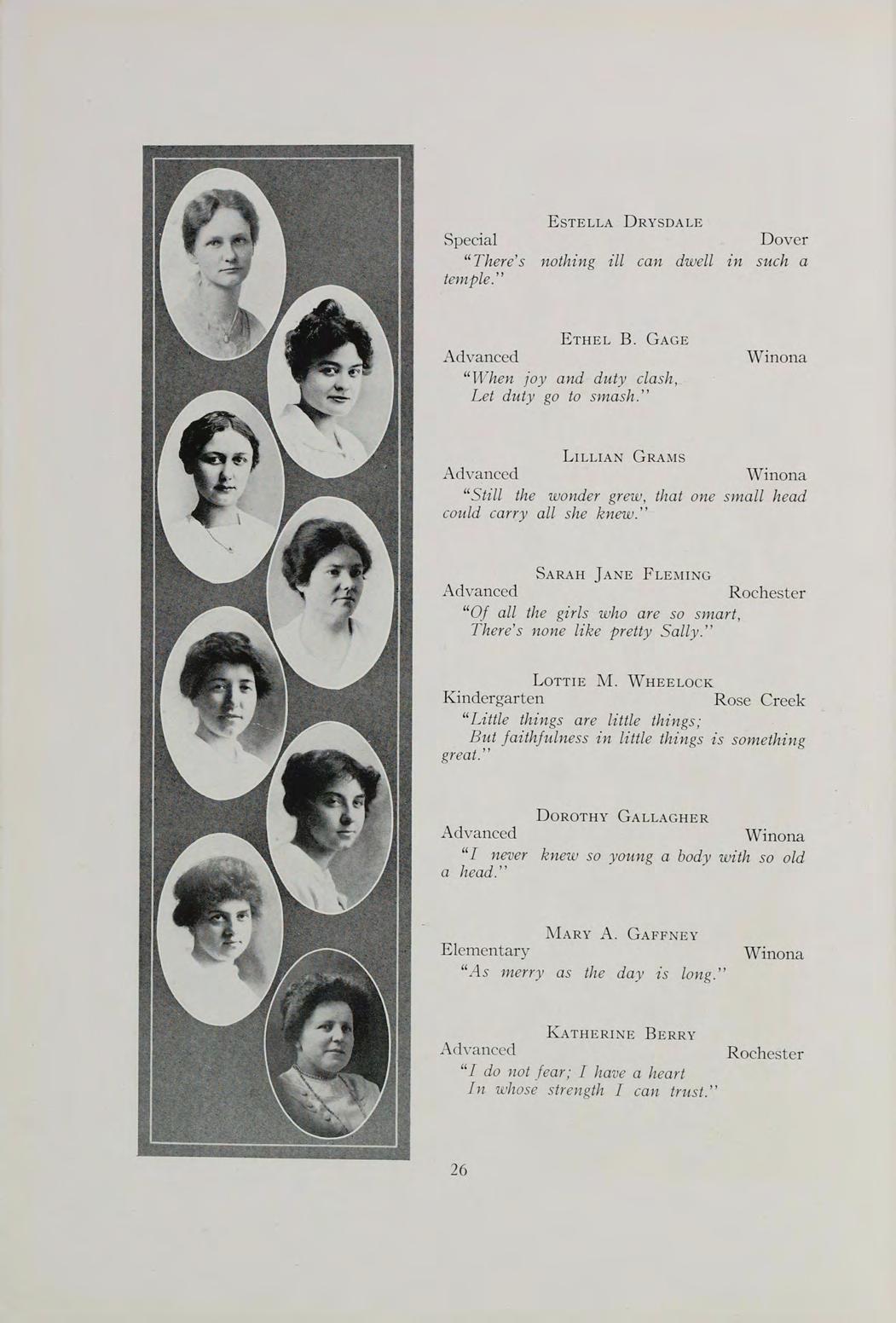
Estella Drysdale Special Dover
“There’s nothing ill can dwell in such a temple."
Ethel B. Gage Advanced Winona
“When joy and duty clash, Let duty go to smash."
Lillian Grams Advanced Winona
“Still the wonder grew, that one small head coidd carry all she knew."
Sarah Jane Fleming Advanced Rochester
“Of all the girls who are so smart, There's none like pretty Sally."
Lottie M. Wheelock Kindergarten Rose Creek
“Little things are little things; But faithfulness in little things is something great."
Dorothy Gallagher Advanced Winona
“I never knew so young a body with so old a head."
Mary A. Gaffney Elementary Winona
“As merry as the day is long."
Katherine Berry Advanced Rochester
“I do not fear; I have a heart In whose strength I can trust."
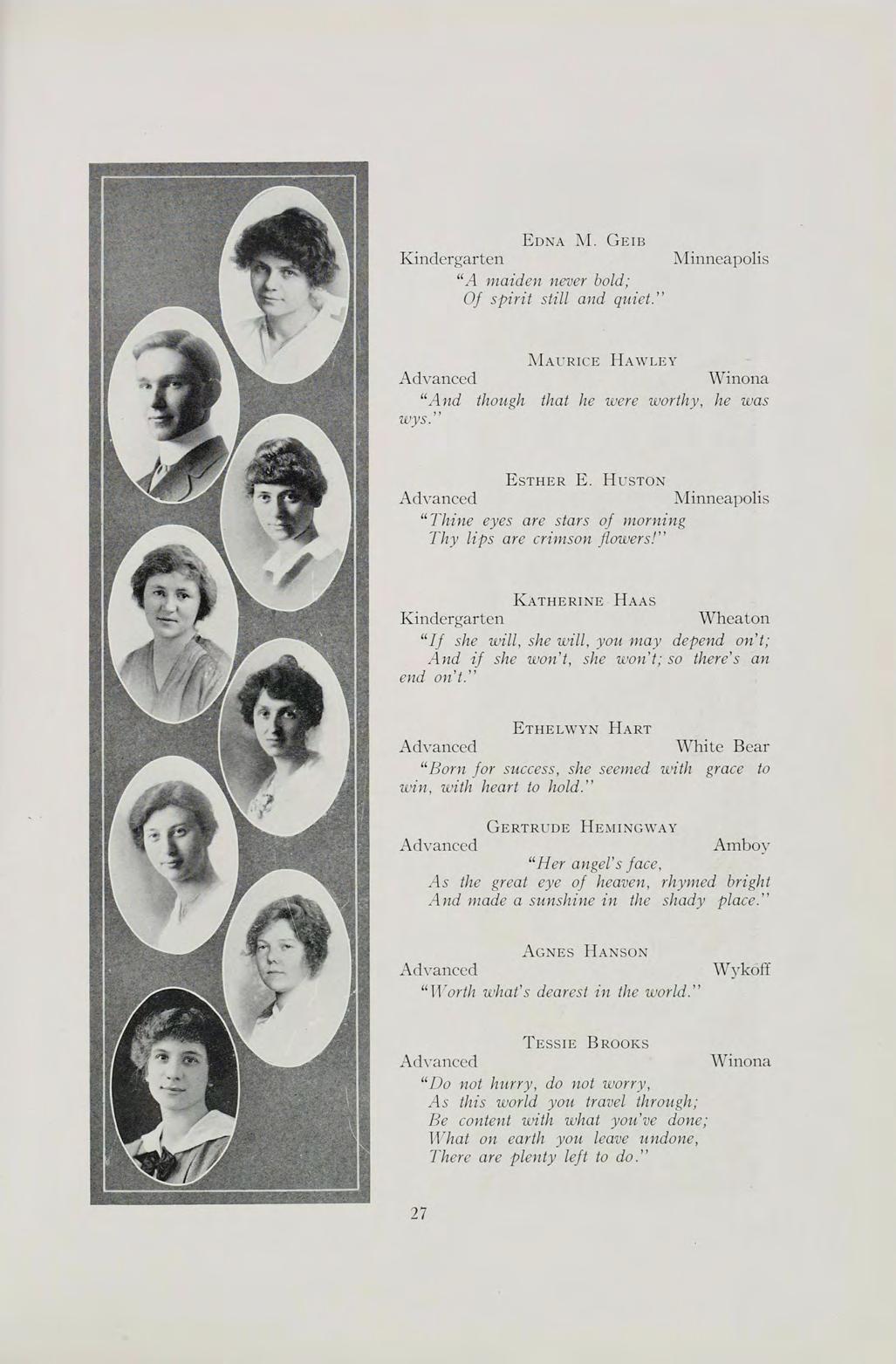
Edna M. Geib
Kindergarten Minneapolis
“A maiden never bold; Of spirit still and quiet."
Maurice Hawley
Advanced Winona
uAnd though that he were worthy, he was wys."
Esther E. Huston
Advanced Minneapolis
“Thine eyes are stars of morning Thy lips are crimson flowers!"
Katherine Haas
Kindergarten Wheaton
“If she will, she will, you may depend on't; And if she won’t, she won't; so there’s an end on't."
Ethelwyn Hart
Advanced White Bear
“Born for success, she seemed with grace to win, with heart to hold."
Gertrude Hemingway
Advanced Amboy
“Her angel’s face, A5 the great eye of heaven, rhymed bright And made a sunshine in the shady place."
Agnes Hanson
Advanced Wykoff
“Worth what's dearest in the world."
Tessie Brooks
Advanced Winona
“Do not hurry, do not worry, As this world you travel through; Be content with what you've done; What on earth you leave undone, There are plenty left to do."
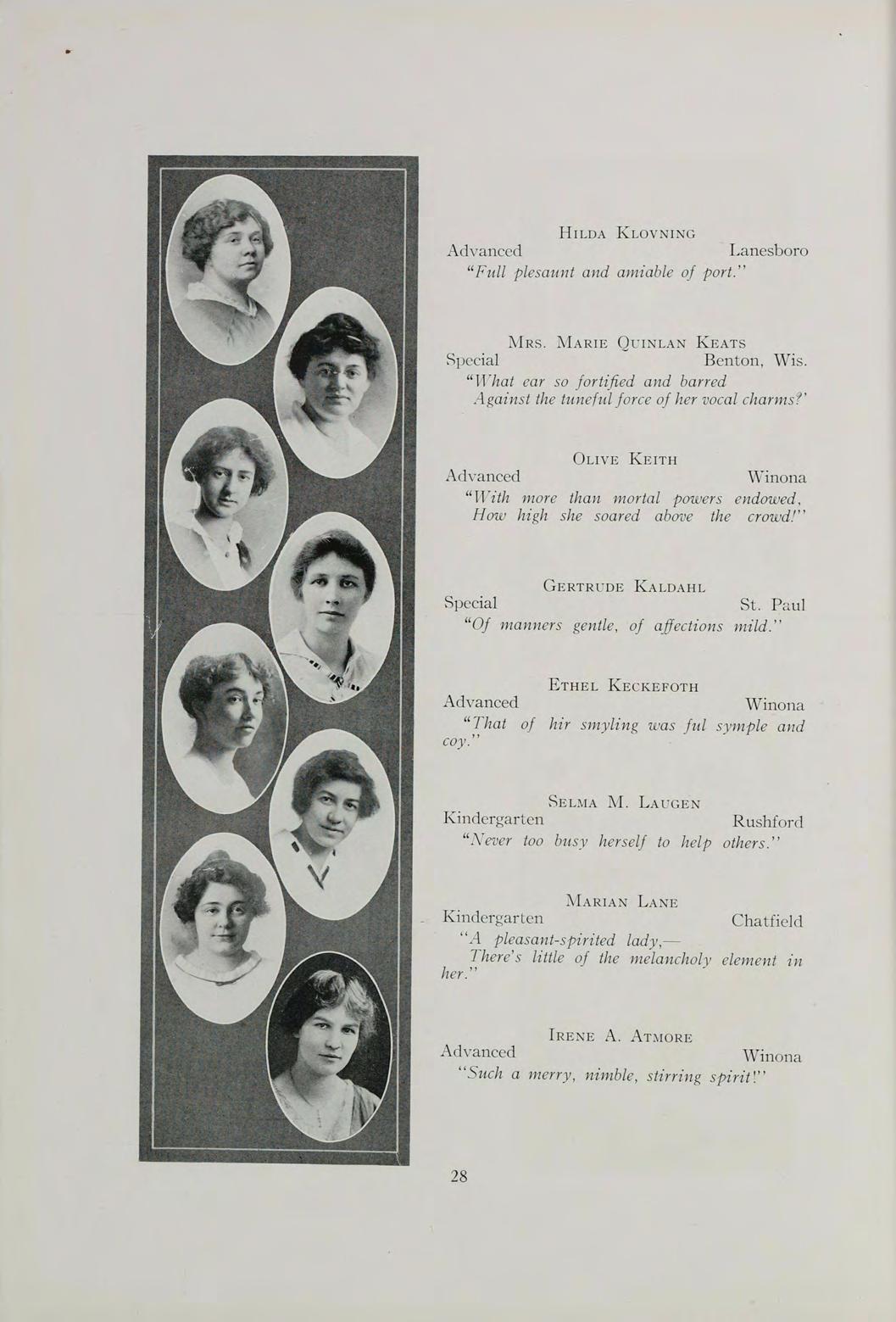
Hilda Klovning Advanced Lanesboro
“Full plesaunt and amiable of port."
Mrs. Marie Quinlan Keats Special Benton, Wis.
“What ear so fortified and barred Against the tuneful force of her vocal charmsV
Olive Keith Advanced Winona
“With more than mortal powers endowed, How high she soared above the crowd!"
Gertrude Kaldahl Special St. Paul “Of manners gentle, of affections mild."
Ethel Keckefoth Advanced Winona “That of hir smyling was fid symple and coy."
Selma M. Laugen Kindergarten Rushford
“Never too busy herself to help others."
Marian Lane Kindergarten Chatfield
“A pleasant-spirited lady,— There's little of the melancholy element in her."
Irene A. Atmore Advanced Winona
“Such a merry, nimble, stirring spirit !”
Beatrice Lane
Advanced Chatfield
“In thy heart the dew of youth, On thy lips the smile of truth.”
Helen Luhmann
Advanced Stillwater
“Bold, quick, ingenious, forward, capable
Linda Wilkins Advanced Winona
“Of cloth-making she had swiche an haunt.”
Thora Magelssen
Advanced Rushford
“O, that this too, too solid flesh woidd melt, Thaw, and resolve itself into a dew\”
Florence Mitson
Advanced Canton
“And al was conscience and tendre herte
Audrey Mitchell
Advanced Ely
“A merrier girl, Within the limit of becoming mirth, I never spent an hour's withal.”
Eva McCarthy
Kindergarten Lanesboro
“You have a nimble wit; I think 'twas made of Atlanta's heels.”
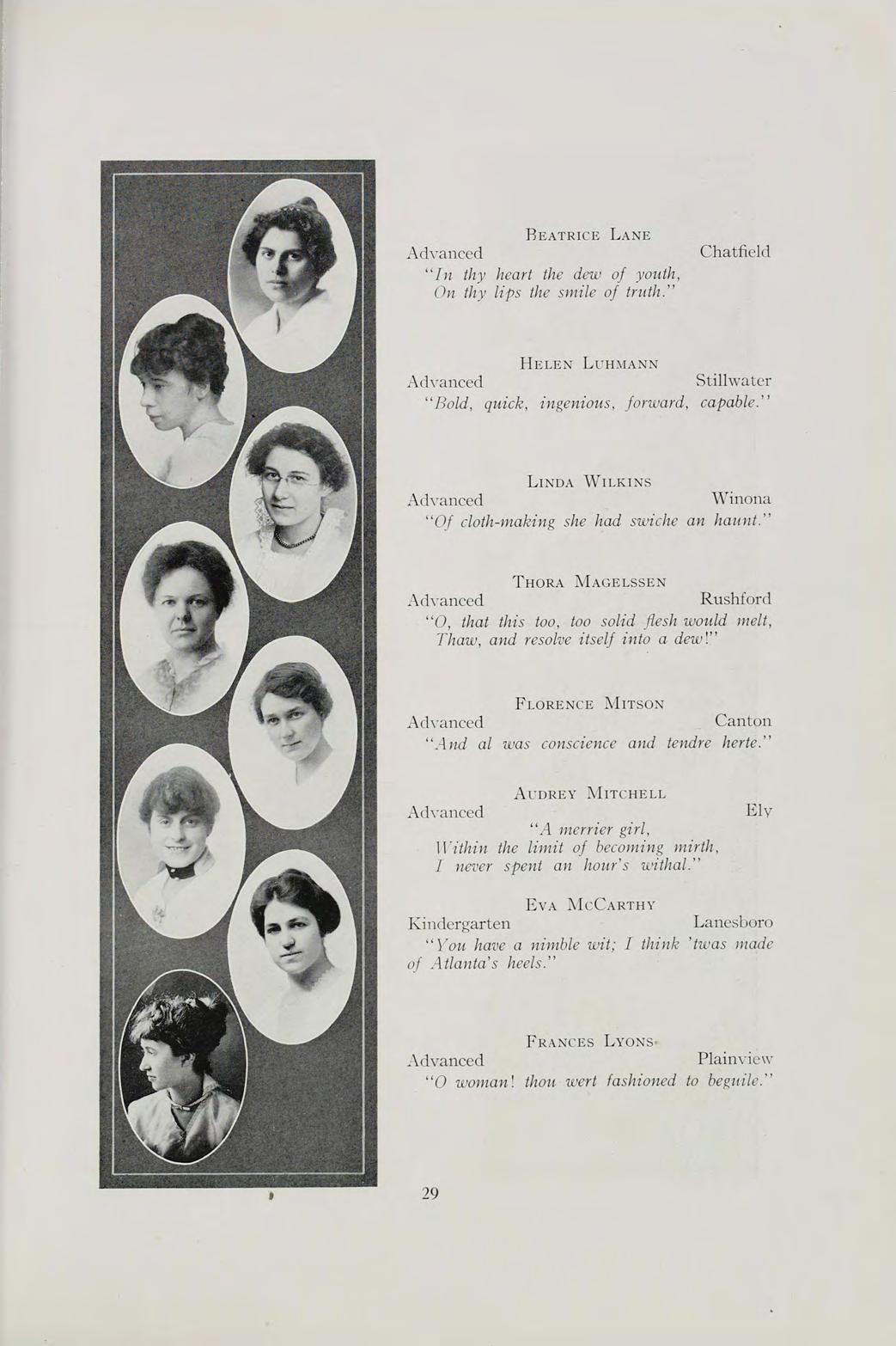
Advanced
“0 woman !
Frances LyonsPlainview thou wert fashioned to beguile.”
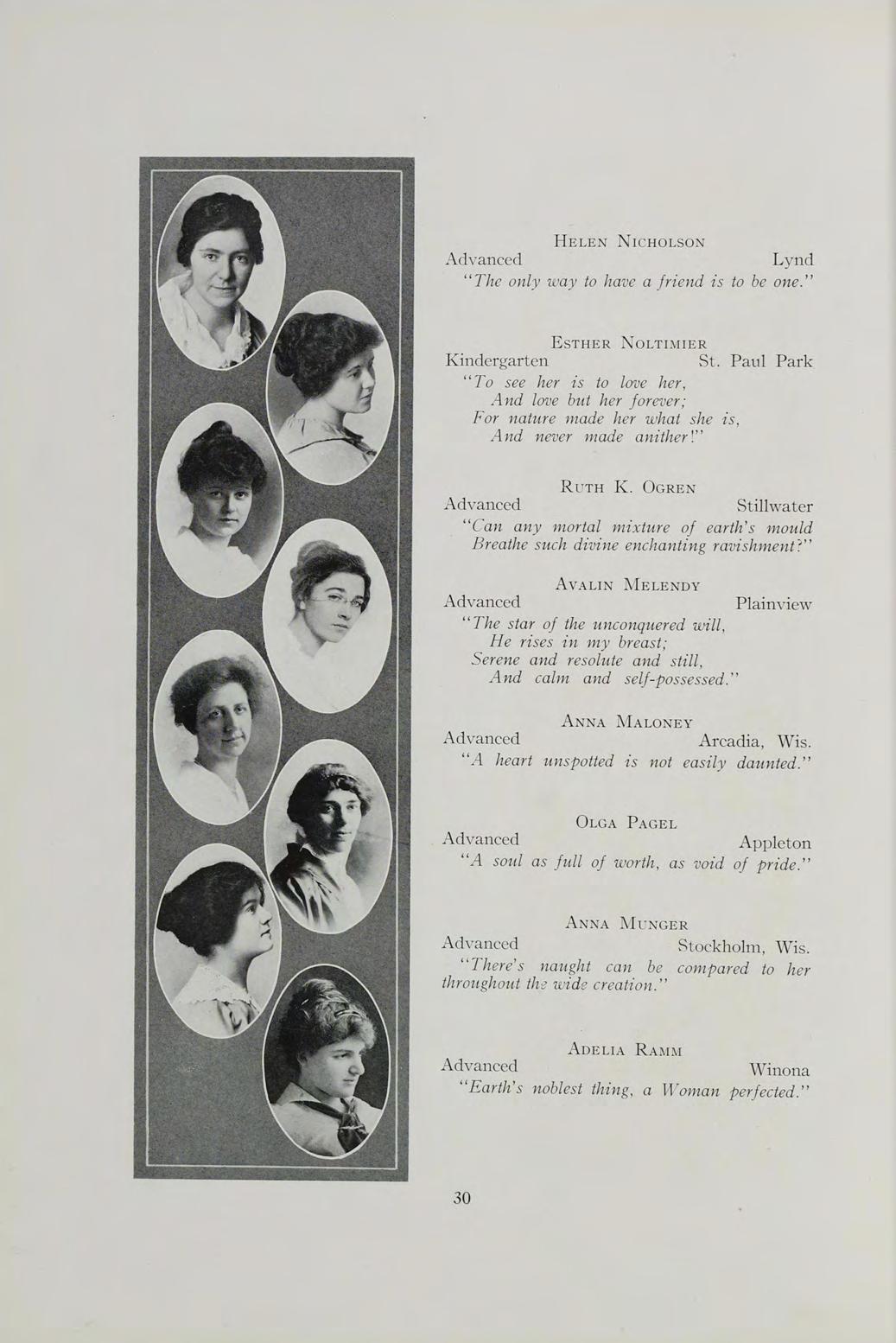
Helen Nicholson
Advanced Lynd
“The only way to have a friend is to he one."
Esther Noltimier
Kindergarten St. Paul Park
"To see her is to love her, And love but her forever; For nature made her what she is, And never made anitherl"
Ruth K. Ogren
Advanced Stillwater
“Can any mortal mixture of earth's mould Breathe such divine enchanting ravishment?”
Avalin Melendy
Advanced Plainview
"The star of the unconquered will, He rises in my breast; Serene and resolute and still, And calm and self-possessed."
Anna Maloney
Advanced Arcadia, Wis.
"A heart unspotted is not easily daunted."
Olga Pagel
Advanced Appleton
"A sold as full of worth, as void of pride."
Anna Munger
Advanced Stockholm, Wis.
"There's naught can be compared to her throughout the wide creation."
Adelia Ramm
Advanced Winona
"Earth's noblest thing, a Woman perfected."
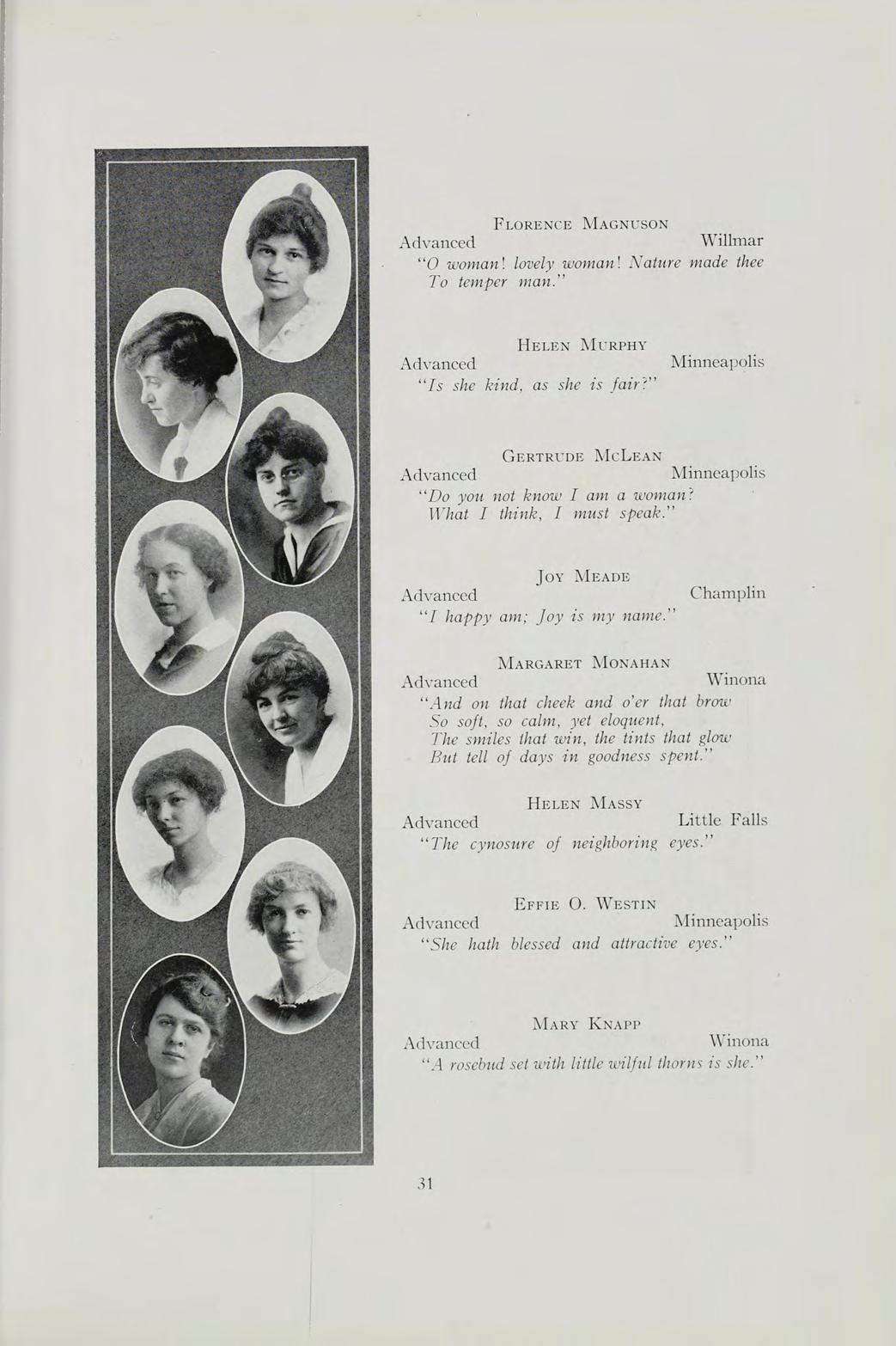
Florence Magnuson
Advanced Willmar
“0 woman ! lovely womanl Nature made thee To temper man."
Helen Murphy
Advanced Minneapolis
“Is she kind, as she is fair ?”
Gertrude McLean
Advanced Minneapolis
“Do you not know I am a woman ? What I think, I must speak."
Joy Meade
Advanced Champlin
“I happy am; Joy is my name."
Margaret Monahan
Advanced Winona
“And on that cheek and o'er that brow So soft, so calm, yet eloquent, The smiles that win, the tints that glow But tell of days in goodness spent."
Helen Massy
Advanced Little Falls
“The cynosure of neighboring eyes."
Effie O. Westin
Advanced Minneapolis
“She hath blessed and attractive eyes."
Mary Knapp
Advanced Winona
“A rosebud set with little wilful thorns is she."
Luretta Dodge
Advanced Rochester “0/ disposition gentle, and of wisdom O’ertopping womans power."
Myrtle Armstrong
Special Missoula, Mont. “A cook they had with them for the nones To boille the chiknes with the mary-bones."
Katherine Hinderman
Advanced Minneapolis “A woman that deliberates is lost."
Helen Blxk
Advanced Lanesboro “She did nothing in particular, but did it well."
Ethel Lyon
Advanced Plainview “A noble and attractive every-day bearing, coming of goodness, unselfishness, sincerity and refinement."
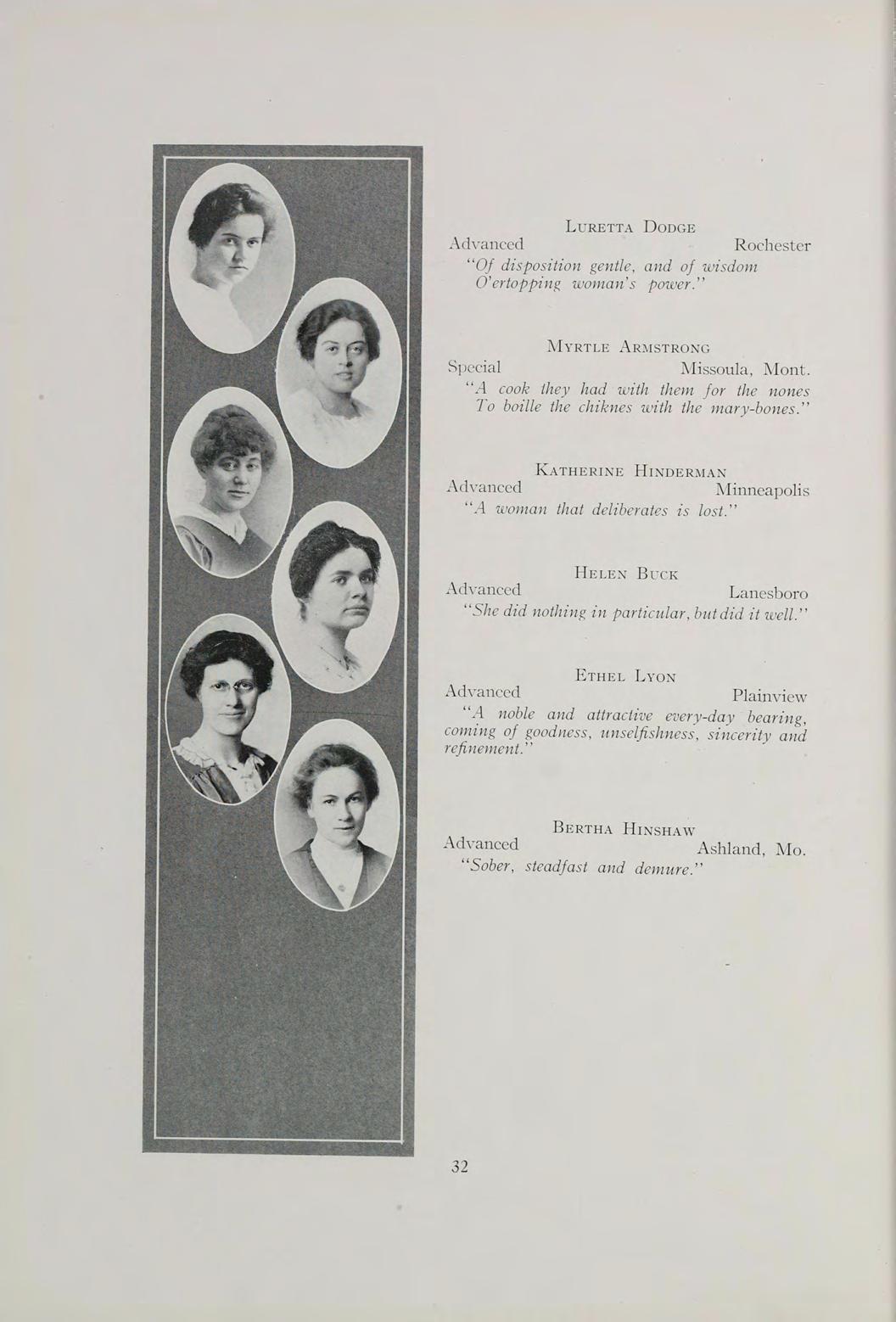
Bertha Hinshaw
Advanced Ashland, Mo. "Sober, steadfast and demure."

Ruth Prentice
Advanced St. Paul
Advanced Sophia Tancig Chisholm
Advanced Josephine Towey Minneapolis
Advanced Anna J. Hermanson Utica
Advanced Sylvia Beyer Lake Benton
Advanced Beryl Fleming St. Paul
Advanced Inez Heubach St. Charles
Advanced Vesta Grannis Lake City
Advanced Vera Tangemann Hardwick
Advanced Martha Henke Stewartville
Just live thy life in full content, Do all thy best with what is sent, Thou but receivest what was meant, Just live thy life.
Just live thy life, be not in fear, The strength of wrong shall disappear, And right is ever drawing near, Just live thy life.
Just live thy life, seem what thou art, Nor from simplicity depart, And peace shall come upon thy heart, Just live thy life.
James Leroy Stockton, In Boston Transcript.
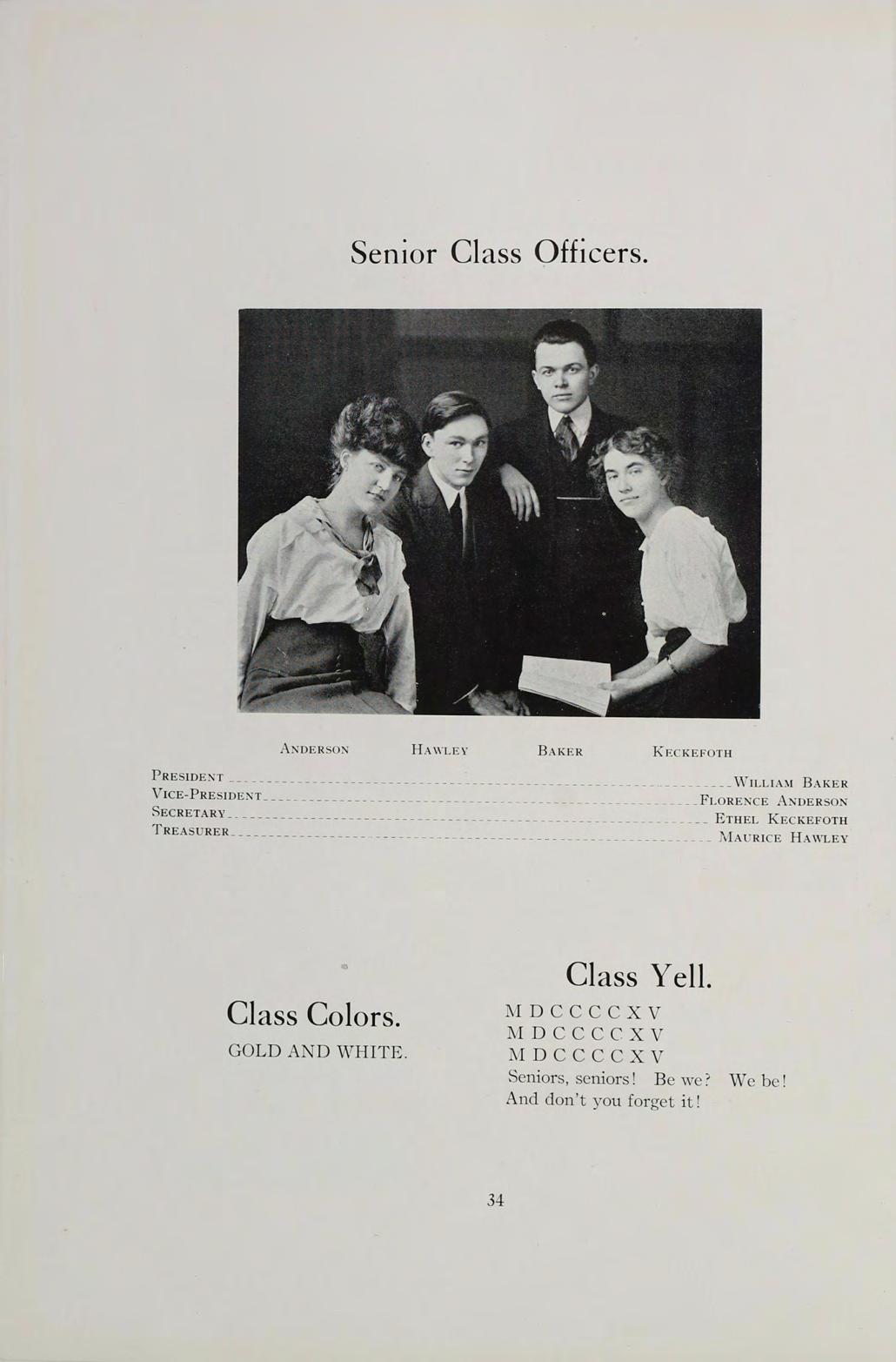
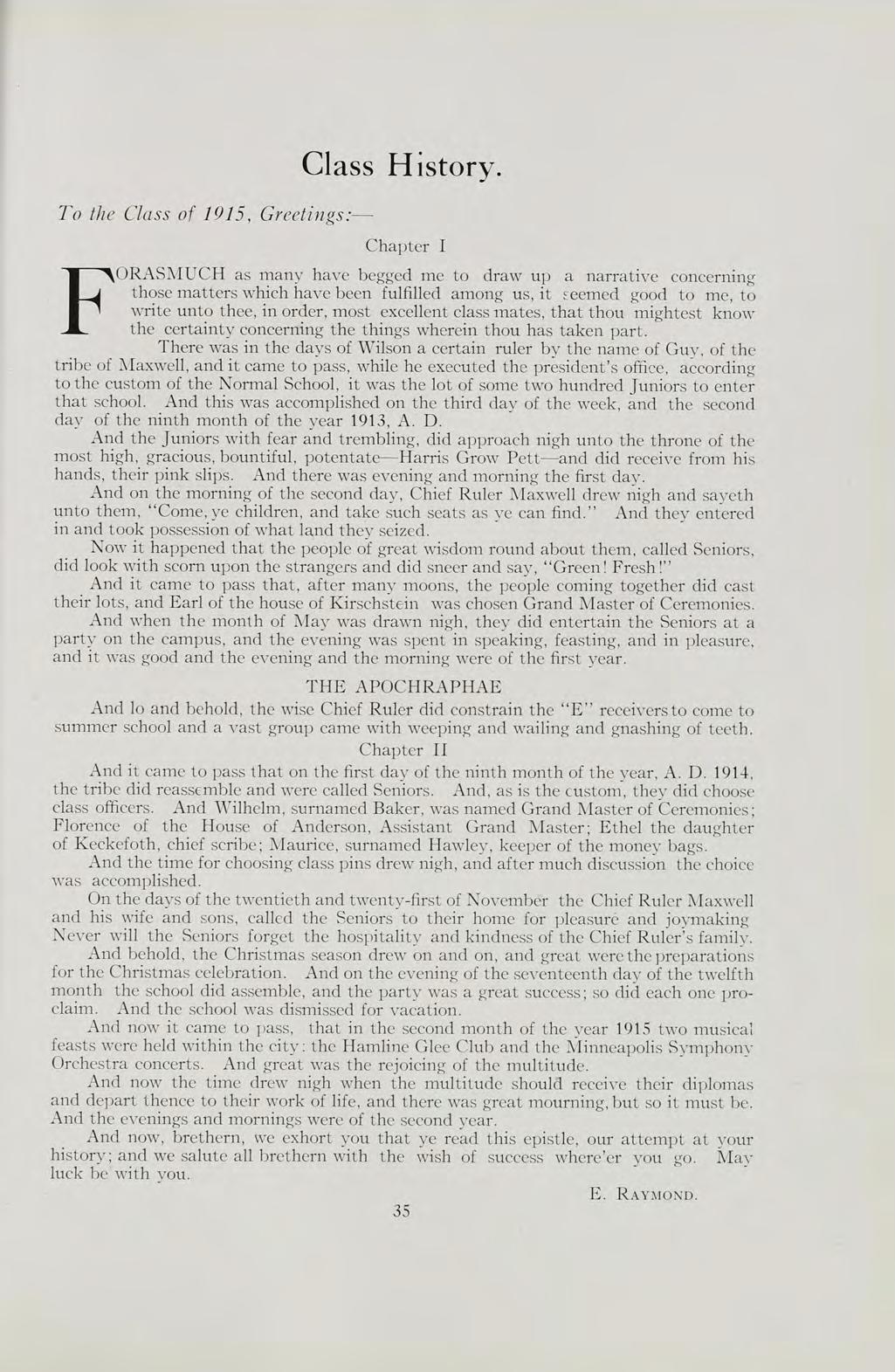
FORASMUCH as many have begged me to draw up a narrative concerning those matters which have been fulfilled among us, it teemed good to me, to write unto thee, in order, most excellent class mates, that thou mightest know the certainty concerning the things wherein thou has taken part.
There was in the days of Wilson a certain ruler by the name of Guy, of the tribe of Maxwell, and it came to pass, while he executed the president’s office, according to the custom of the Normal School, it was the lot of some two hundred Juniors to enter that school. And this was accomplished on the third day of the week, and the second day of the ninth month of the year 1913, A. D.
And the Juniors with fear and trembling, did approach nigh unto the throne of the most high, gracious, bountiful, potentate—Harris Grow Pett-—and did receive from his hands, their pink slips. And there was evening and morning the first day.
And on the morning of the second day, Chief Ruler Maxwell drew nigh and sayeth unto them, “Come, ye children, and take such seats as ye can find.” And they entered in and took possession of what land they seized.
Now it happened that the people of great wisdom round about them, called Seniors, did look with scorn upon the strangers and did sneer and say, “Green! Fresh!”
And it came to pass that, after many moons, the people coming together did cast their lots, and Earl of the house of Kirschstein was chosen Grand Master of Ceremonies.
And when the month of May was drawn nigh, they did entertain the Seniors at a party on the campus, and the evening was spent in speaking, feasting, and in pleasure, and it was good and the evening and the morning were of the first year.
And lo and behold, the wise Chief Ruler did constrain the “E” receivers to come to summer school and a vast group came with weeping and wailing and gnashing of teeth.
And it came to pass that on the first day of the ninth month of the year, A. D. 1914, the tribe did reassemble and were called Seniors. And, as is the custom, they did choose class officers. And Wilhelm, surnamed Baker, was named Grand Master of Ceremonies; Florence of the House of Anderson, Assistant Grand Master; Ethel the daughter of Keekcfoth, chief scribe; Maurice, surnamed Hawley, keeper of the money bags.
And the time for choosing class pins drew nigh, and after much discussion the choice was accomplished.
On the days of the twentieth and twenty-first of November the Chief Ruler Maxwell and his wife and sons, called the Seniors to their home for pleasure and joymaking Never will the Seniors forget the hospitality and kindness of the Chief Ruler’s family.
And behold, the Christmas season drew on and on, and great were the preparations for the Christmas celebration. And on the evening ofthe seventeenth day of the twelfth month the school did assemble, and the party was a great success; so did each one proclaim. And the school was dismissed for vacation.
And now it came to pass, that in the second month of the year 1915 two musical feasts were held within the city: the Hamline Glee Club and the Minneapolis Symphony Orchestra concerts. And great was the rejoicing of the multitude.
And now the time drew nigh when the multitude should receive their diplomas and depart thence to their work of life, and there was great mourning, but so it must be. And the evenings and mornings were of the second year.
And now, brethern, we exhort you that ye read this epistle, our attempt at your history; and we salute all brethern with the wish of success where’er you go. May luck be with you.
E. Raymond.
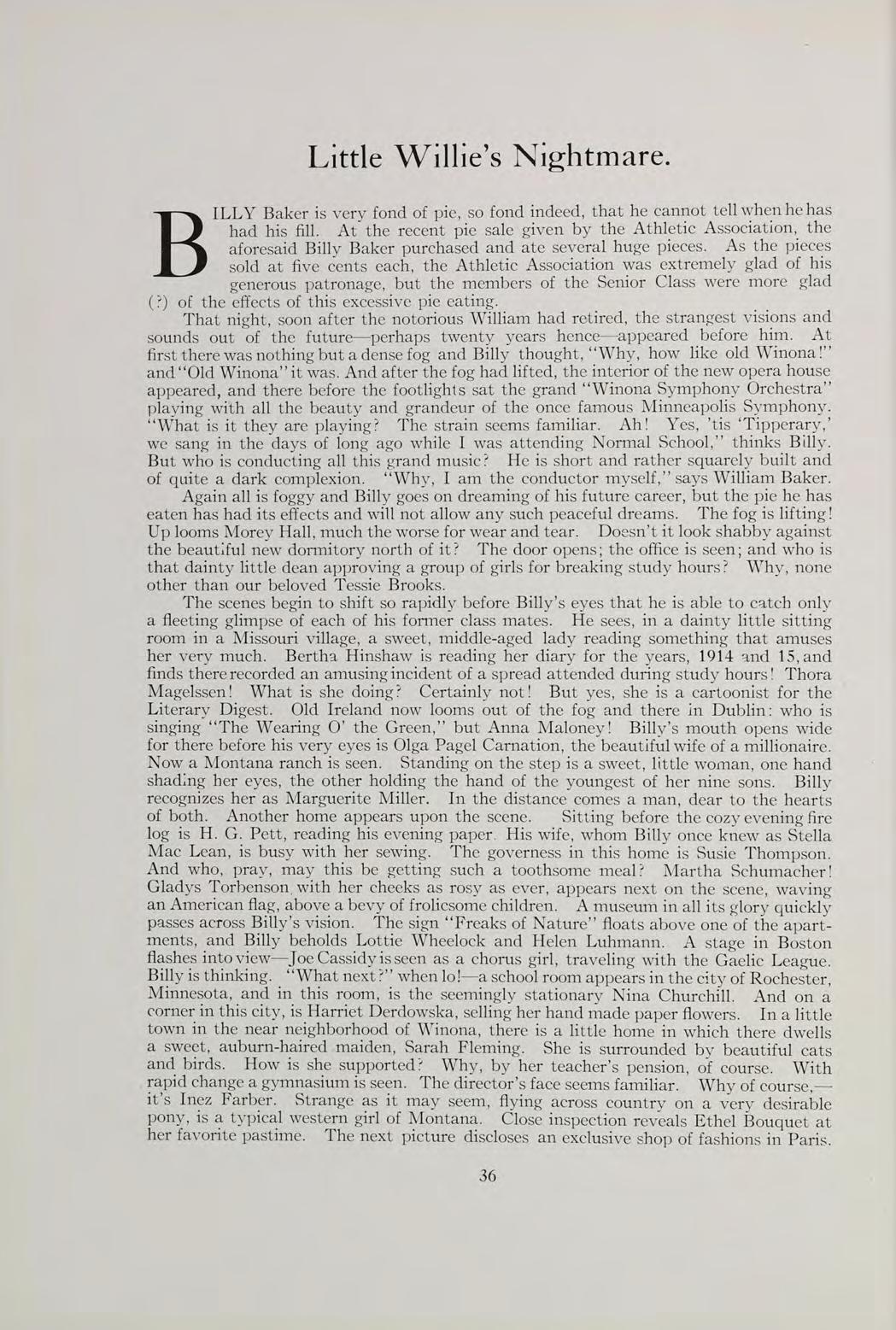
BILLY Baker is very fond of pie, so fond indeed, that he cannot tell when he has had his fill. At the recent pie sale given by the Athletic Association, the aforesaid Billy Baker purchased and ate several huge pieces. As the pieces sold at five cents each, the Athletic Association was extremely glad of his generous patronage, but the members of the Senior Class were more glad (?) of the effects of this excessive pie eating.
That night, soon after the notorious William had retired, the strangest visions and sounds out of the future—perhaps twenty years hence—appeared before him. At first there was nothing but a dense fog and Billy thought, “Why, how like old Winona!’’ and “Old Winona” it was. And after the fog had lifted, the interior of the new opera house appeared, and there before the footlights sat the grand “Winona Symphony Orchestra” playing with all the beauty and grandeur of the once famous Minneapolis Symphony. “What is it they are playing? The strain seems familiar. Ah! Yes, ’tis ‘Tipperary,’ we sang in the days of long ago while I was attending Normal School,” thinks Billy. But who is conducting all this grand music? He is short and rather squarely built and of quite a dark complexion. “Why, I am the conductor myself,” says William Baker. Again all is foggy and Billy goes on dreaming of his future career, but the pie he has eaten has had its effects and will not allow any such peaceful dreams. The fog is lifting! Up looms Morey Hall, much the worse for wear and tear. Doesn’t it look shabby against the beautiful new dormitory north of it? The door opens; the office is seen; and who is that dainty little dean approving a group of girls for breaking study hours? Why, none other than our beloved Tessie Brooks.
The scenes begin to shift so rapidly before Billy’s eyes that he is able to catch only a fleeting glimpse of each of his former class mates. He sees, in a dainty little sitting room in a Missouri village, a sweet, middle-aged lady reading something that amuses her very much. Bertha Hinshaw is reading her diary for the years, 1914 and 15, and finds there recorded an amusing incident of a spread attended during study hours! Thora Magelssen! What is she doing? Certainly not! But yes, she is a cartoonist for the Literary Digest. Old Ireland now looms out of the fog and there in Dublin: who is singing “The Wearing O’ the Green,” but Anna Maloney! Billy’s mouth opens wide for there before his very eyes is Olga Pagel Carnation, the beautiful wife of a millionaire. Now a Montana ranch is seen. Standing on the step is a sweet, little woman, one hand shading her eyes, the other holding the hand ofthe youngest of her nine sons. Billy recognizes her as Marguerite Miller. In the distance comes a man, dear to the hearts of both. Another home appears upon the scene. Sitting before the cozy evening fire log is H. G. Pett, reading his evening paper. His wife, whom Billy once knew as Stella Mac Lean, is busy with her sewing. The governess in this home is Susie Thompson. And who, pray, may this be getting such a toothsome meal? Martha Schumacher! Gladys Torbenson, with her cheeks as rosy as ever, appears next on the scene, waving an American flag, above a bevy of frolicsome children. A museum in all its glory quickly passes across Billy’s vision. The sign “Freaks of Nature” floats above one of the apartments, and Billy beholds Lottie Wheelock and Helen Luhmann. A stage in Boston flashes into view—Joe Cassidy is seen as a chorus girl, traveling with the Gaelic League. Billy is thinking. “What next ?” when lo!—a school room appears in the city of Rochester, Minnesota, and in this room, is the seemingly stationary Nina Churchill. And on a corner in this city, is Harriet Derdowska, selling her hand made paper flowers. In a little town in the near neighborhood of Winona, there is a little home in which there dwells a sweet, auburn-haired maiden, Sarah Fleming. She is surrounded by beautiful cats and birds. How is she supported? Why, by her teacher’s pension, of course. With rapid change a gymnasium is seen. The director’s face seems familiar. Why of course,— it’s Inez Farber. Strange as it may seem, flying across country on a very desirable pony, is a typical western girl of Montana. Close inspection reveals Ethel Bouquet at her favorite pastime. The next picture discloses an exclusive shop of fashions in Paris.

A beautiful living model attracts much attention. No wonder, for it is Jess Bradley. What is this? A studio! Two familiar characters are seen within it. Peter Tri is industriously working upon a piece of art, created by his own brush. Mary Cassidy is posing gracefully for him. May the success be complete! Our beloved Flora Trites now appears as a sweet governess in an orphan asylum. No one thinks more of her than the little children. Mercy sakes! Of all things! If Effie Weston isn’t teaching Literary Interpretation in Moorehead. She is heard expounding a lengthy lecture on the use of the word “thing.” “The very idea of callinganything and everything‘thing.’ Why! ‘thing’ can be anything from a pancake to a cathedral.” Here also is Vida Williams actually working in the library. Strange things do happen. A dainty little dressmaker is next in order. Billy recognizes Millie Solum. Overhead is an aeroplane race. Ah, who is that ahead? It is a woman! Why! Grace Strong, have you achieved so much ? Billy now sees an eye specialist, she is bending over a dilapidated looking patient, (Mr. Abram). Winona graduates would advise Florence Smith to use no red tape in her method, but treat him “right proper.” From whence eometh this dense smoke? It is a vinegar factory. Among the many employees is our famous Gladys Saxton. Billy hears the music of a chorus of voices and sees the Normal rostrum. Anna Rotering is directing the St. Cecilia Society as C. V. S. used to do of old. Times will change in spite of folks. Louise Poore is in the executive’s office in the U. S. Capitol, arguing with the new President (F. Moore), about a new bill just adopted in the House. The rapid change of pictures makes poor Billy rub his eyes,—only to open them again and behold a Chautauqua platfonn in Rollingstone. A large audience is listening to a cultural lecture by Dorothy Gallagher. In another public place we find Lillian Grams delivering a lecture on “How to get through the Winona Normal School as easily as possible.” A room in a Pine Island public school shows us Vesta Grannis still there. Another large factory comes before the eyes of the astonished dreamer. In bold letters across the top is the sign, “World’s Soap Factory—Hawley & Co.,” (Company means Blowers). Helen Wright seems to be the manager. We always knew she was capable. Inez Heubach is still teaching in Hibbing, but she has one addition—a French maid whose girlhood name was Katherine Hinderman. Ah! A musical studio! Frances Lyons is giving violin lessons.
In large print, the following items from an eastern newspaper attract Billy’s attention. Little, industrious Gertrude Hemingway is preparing an arithmetic that would please even Miss Sprague. Ethel Lyons is a society leader in Newport. Luella King is married and has settled down in life. Olive Keith seems to be a second Florence Nightingale. Ethel Keekefoth is the Dr. Mayos’ head nurse at St. Mary’s hospital at Rochester, Minnesota. Linda Wilkins is a soloist in St. Paul’s Church in London. Lilah Train has taken up the natural career for her. She is now a famous fancy skater. Neva Stevenson is making a world lecture tour on “Efficiency.” Queer things have happened. Adelia Ramm is offering a course for prospective women chaffeurs desirous of conducting a Jitney Line; “Results guaranteed.” Hazel Barnard was the first appli- cant. Vera Tangeman has specialized in Public Speaking, and has the place in the Winona Normal School, formerly filled by Miss Slifer. On the card of a nerve specialist Billy reads the name of Josephine Towey. Rosella Trawicky is assisting H. Z. Campbell at Columbia University.
The print of the newspaper fades away and the scene of a simple wedding floats into view. We find she that was Mary Broderick, and her husband, are attending the wedding of their oldest daughter who is, as beloved in her day, as Mary was in hers. A hairdressing apartment in Paris appears. Helen Derdowska is dressing the beautiful gray locks of Miss Samson. A new principal seems to be in poweratthe Kosciusko. It is Mary Edd. Helen Buck seems to be awakening from a long sleep, and taking a vital interest in the men of yesterday. Willomene Flynn is teaching school in a mining district in Alaska. What is this? Mary Knapp is staging “The Pied Piper” in the Dover High School. Beatrice Lane seems to insist on chaperoning coasting parties. We are sure the young people are being well cared for. Up looms the National Cloak & Suit Company. A friendly face is seen behind the counter. It is Hilda Klovning.

Our old friend, Helen Massy, is looking over a set of books with a book agent in Little Falls. It is Helen Nicholson who is trying to sell to her. Helen is just on the point of buying when in comes her husband. He believes them of no use and Helen, meek as a lamb, tells the agent she does not care for them.
Billy seems to have been seeing things only vaguely for a while, but now the lights are brighter, and it is with great ease that he discerns Bess Pearo designing friezes for a new Normal School building. A five and ten cent store is next on the scene, and behind the tin ware counter is Anna Pfaffman. A candy factory appears, in which Joy Meade is busily engaged in wrapping molasses kisses. Ruth McCreary is seen taking a postgraduate course in the Winona Normal School. Anna Beyers is going around the various dormitories in the state and giving lectures on the use of slang—“Such expressions as ‘jingers’ should be strictly avoided.’’ Mercy on me! This scene is strange. The Philippine Islands! There is Florence Anderson teaching a group of little Philippinos. Again Paris appears. Marie Bruner is buying suits for Choate & Company of Winona, Minnesota. Next Billy sees a little deaconess in Fountain City, Wisconsin. Yes, it is Esther Huston. As of old, she is diligently reading the Minneapolis Tribune. She suddenly bursts forthwith a forceful exclamation: “Why, here, these “advices to the love lorn” are written by Gertrude Forster! I always had an idea she would do something wonderful some day.” Agnes Bergstrom is still casting disdainful glances at her admirers. Agnes Hanson is the wife of a missionary in China. Here is the first authoress in the class. What may she be writing? Well, of all things! Luretta Dodge is compiling a “Birdseye View of History of Education.” President Maxwell, at least, will be pleased. A boarding house appears: Loretta Wessel, Dorothy Moore, and Gertrude McLean are the landladies. They have acquired such old maidish ways that no help will stay with them, and they must do their own work. It is nearly supper time; the dirty dishes fill their kitchen. A quarrel ensues as to who shall wash them, but upon seeing one of the boarders coming doum the street for supper, they all pitch in and the dishes are soon done. What problems were solved by the appearance of a mere man! Loretta, “Isn’t it horried to have to wash dishes?” Dorothy, “Yes.” Gertrude, “I think so too!” The Women’s Suffrage Bill is passed or, at least, evidences are to that effect, for Helen Murphy is governor of the state. Eva Parrish is editing a society paper. Florence Mitson is vice-president of theold Winona Normal. Avalon Melindy is a sweet nurse in the Plainview hospital. Audrey Mitchell is president of the Mothers Club of St. Paul. Beatrice Scott is “tickling the ivories” at the New Gaiety Theater in Minneapolis. May Tolleson is writing a book entitled “Opposition.” An opera house in Haverhill appears. Gertrude Kaldahl and Myrtle Armstrong are voeiferouslv singing a duet, the words of which are
“We have learned the cooking art, For a toothsome meal will win his heart.”
Our beloved pianiste, Alvina Boley, so successfully pursued her vocation in life, that it won for her the position as organist in the Cathedral at Rome. Vesta Davis is instructor of the Camp Fire Girls in Stockton. Estella Drysdale is running a successful boarding house in Stevens, Minnesota. The Wabasha depot is seen. The Normal girls are eating lunch there during the twenty minute stop. The face behind the lunch counter is familiar. No wonder! It is Elsie Featherstone. Elmira Foster is cooking for the Y. W. C. A. in Duluth. The world’s most famous soprano, Marie Quinlan Keats, is in New York City. Her name is on the lips of all. Fritz Borncamp has captured a Winona heiress and has, indeed, settled down. Sarah Blexrud has married a man exceedingly hard of hearing, and is living happily in Spring Grove. Irene Atmore is a grand opera singer in a king’s court. This is quite an honor, for he is the only king left. Blanch Barr and Irma Smith are competitors in their manicuring parlors in Pottsdam. Frances Beckmark is knitting and visiting with an old friend. Pink hair has turned to gray. But, “I’ll just die, I’ll just die” is still evident. Gladys Berthe and Dorothv Brown are dancing the Highland Fling in Scotland. Helen Barrett is writing her thesis for a Ph. D. Clara Beck is one of our book agents and is busily putting all of V. L. Mangun’s theories into practice. A queer sort of audience appears and a dainty little fairv-like being in a sweet,
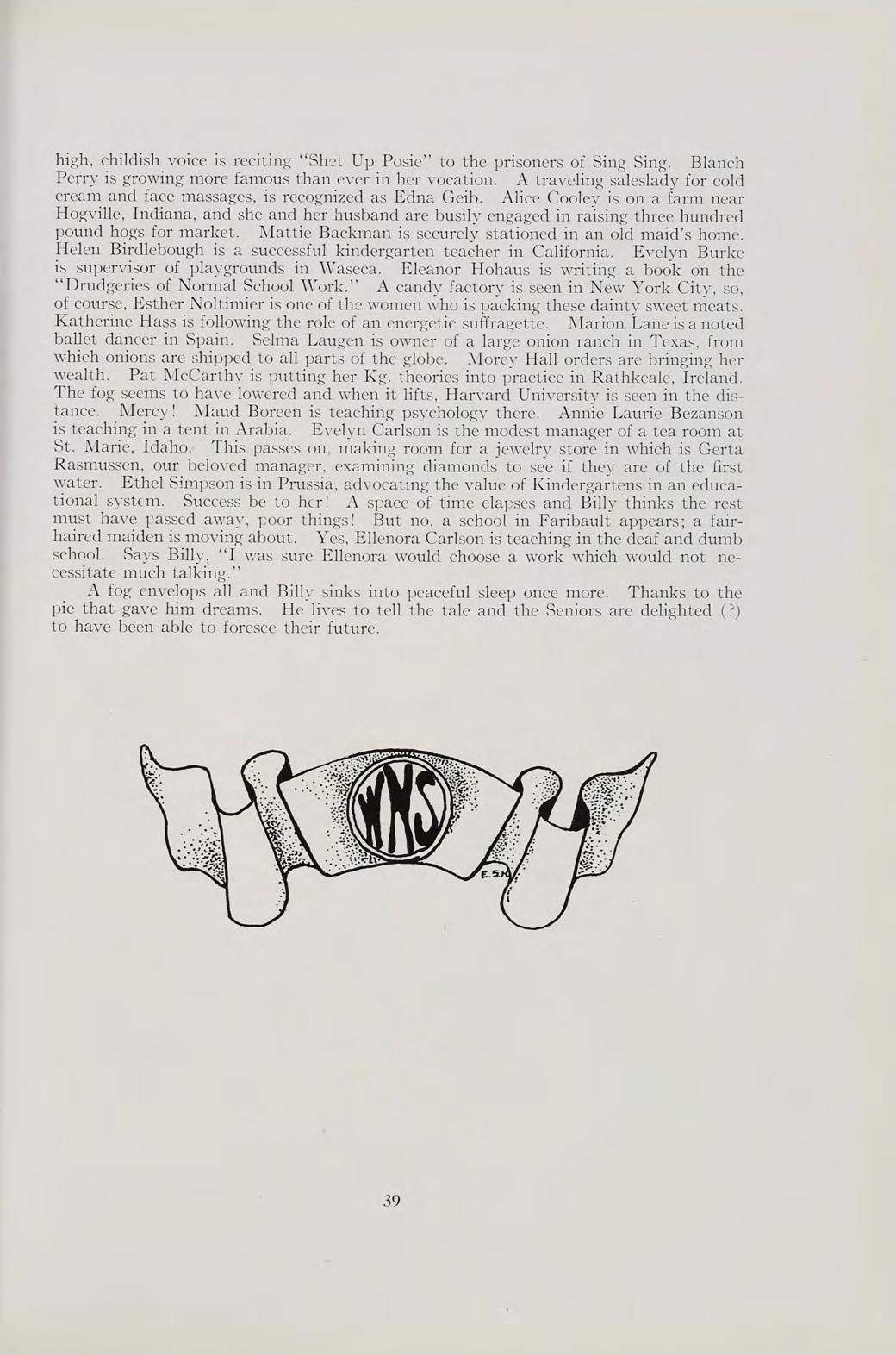
high, childish voice is reciting “Shet Up Posie” to the prisoners of Sing Sing. Blanch Perry is growing more famous than ever in her vocation. A traveling saleslady for cold cream and face massages, is recognized as Edna Geih. Alice Cooley is on a farm near Hogvillc, Indiana, and she and her husband are busily engaged in raising three hundred pound hogs for market. Mattie Baekman is securely stationed in an old maid’s home. Helen Birdlebough is a successful kindergarten teacher in California. Evelyn Burke is supervisor of playgrounds in Waseca. Eleanor Hohaus is writing a book on the “Drudgeries of Normal School Work.” A candy factory is seen in New York City, so, of course, Esther Noltimier is one of the women who is packing these dainty sweet meats. Katherine Hass is following the role of an energetic suffragette. Marion Lane is a noted ballet dancer in Spain. Selma Laugen is owner of a large onion ranch in Texas, from which onions are shipped to all parts of the globe. Morey Hall orders arc bringing her wealth. Pat McCarthy is putting her Kg. theories into practice in Rathkeale, Ireland. The fog seems to have lowered and when it lifts, Harvard University is seen in the distance. Mercy! Maud Boreen is teaching psychology there. AnnieLaurie Bezanson is teaching in a tent in Arabia. Evelyn Carlson is the modest manager of a tea room at St. Marie, Idaho. This passes on, making room for a jewelry store in which is Gerta Rasmussen, our beloved manager, examining diamonds to see if they are of the first water. Ethel Simpson is in Prussia, advocating the value of Kindergartens in an educational system. Success be to her! A space of time elapses and Billy thinks the rest must have passed away, poor things! But no, a school in Faribault appears; a fairhaired maiden is moving about. Yes, Ellenora Carlson is teaching in the deaf and dumb school. Says Billy, “I was sure Ellenora would choose a work which would not necessitate much talking.”
A fog envelops all and Billy sinks into peaceful sleep once more. Thanks to the pie that gave him dreams. He lives to tell the tale and the Seniors are delighted (?) to have been able to foresee their future.

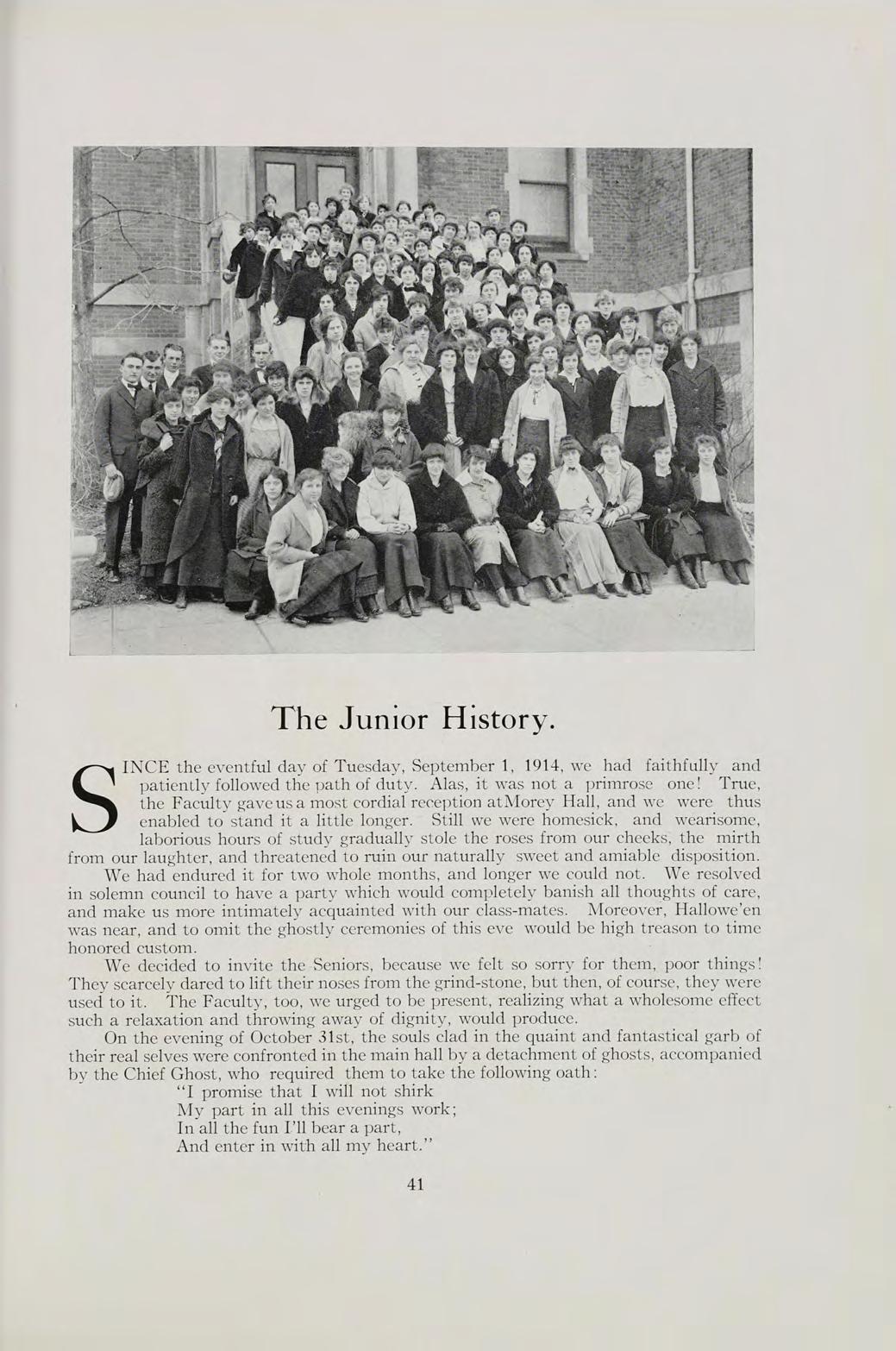
SINCE the eventful day of Tuesday, September 1, 1914, we had faithfully and patiently followed the path of duty. Alas, it was not a primrose one! True, the Faculty gave us a most cordial reception atMorey Hall, and we were thus enabled to stand it a little longer. Still we were homesick, and wearisome, laborious hours of study gradually stole the roses from our cheeks, the mirth from our laughter, and threatened to ruin our naturally sweet and amiable disposition.
We had endured it for two whole months, and longer we could not. We resolved in solemn council to have a party which would completely banish all thoughts of care, and make us more intimately acquainted with our class-mates. Moreover, Hallowe’en was near, and to omit the ghostly ceremonies of this eve would be high treason to time honored custom.
We decided to invite the Seniors, because we felt so sorry for them, poor things! They scarcely dared to lift their noses from the grind-stone, but then, of course, they were used to it. The Faculty, too, we urged to be present, realizing what a wholesome effect such a relaxation and throwing away of dignity, would produce.
On the evening of October 31st, the souls clad in the quaint and fantastical garb of their real selves were confronted in the main hall by a detachment of ghosts, accompanied by the Chief Ghost, who required them to take the following oath:
“I promise that I will not shirk
My part in all this evenings work;
In all the fun I’ll bear a part, And enter in with all my heart.”
They were then compelled to pass through Hades, from which their screams and groans made the night hideous, and caused entering souls to quake. At last they entered the Bottomless Pit, the gymnasium.
Ah, the strange and wonderful revelations! There were Japanese and Negroes, respectable ghosts and hideous skeletons, a backward or forward walking phenomenon, a patchwork girl, and a scare crow eloped from a cornfield
The Junior Kindergartners gave a Brownie Dance, and another group of Junior girls, a Witch Dance,—after which all joined in a grand promenade. Miss Lundvaal read “The Wind,” and Marie Bruner in gypsy costume, tripped the light fantastic with true gypsy abandon. The Misses Hilgren, Nelson and Murphy gave a Witch scene from “Macbeth” with apologies to Shakespeare as follows:
Scene—A cavern. In the middle
First Witch—
Thrice the rising bell hath rung.
Second Witch—
Thrice, and once each girl hath yawned.
Third Witch—
Duty cries, get up! get up!
FirstWitch—
Round about the cauldron go, In the seething mess, we throw
Shrieks of girls and screams and laughter,
Midnight spreads ending in disaster.
Getting caught is just our lot; Boil thou first i’ the charmed pot.
Double, double, toil and trouble; Fire burn, and cauldron bubble.
Second Witch—
Gilde’s glance that makes us quake, In the cauldron boil and bake; Those spectacles of Holzinger
That hypnotize the poor beginners.
Mr. Mangun’s brand new hat, I’m sure he could spare one cravat For the charm of powerful trouble; Life a hell broth boil and bubble.
All Witches—
Double, double, toil and trouble; Fire burn and cauldron bubble.

boiling cauldron.
Third Witch—
Here’s Emmett Raymond’s little speech Which caused our hearts to wildly beat, But when he played on the piano, And Miss Troxel sang soprano, Joy of joy! Unuttered bliss!
Now what’s our chances after this? What does Evelyn Carlson care?
She has a Jewel rich and rare; While poor Miss Heubach cannot see Where all the other boys can be.
Fling in tears, and fling in sorrow, We will all feel better by tomorrow.
All—
Double, double, toil and trouble; Fire burn, and cauldron bubble.
Second Witch—
Cool it with our study hours, Then the charm can bind all powers.
All—
The w^eird sisters, hand in hand, Posters of the sea and land, 1 hus do go about, about, Thrice to thine and thrice to mine, And thrice again to make up nine. Peace! The charms w ound up!
After the program, prizes for the best costumes were awarded to Miss Guernsey, the “Patchwork Girl,” and Mr. James Robb, the “Coy Maiden.” Then all joined in folk dancing, bobbed for apples, or sought to learn their fates. After refreshments and happy songs, we repaired to earth once more. However, we noted with triumph the changed atmosphere, and we hereby do heartily recommend that succeeding classes follow the precedent established by the Worthv Juniors of 1914-T5.
Following our excellent example, the Seniors proceeded to entertain the Faculty and the Juniors at a jolly Christmas party held in the gymnasium. The air was intensely charged with the Christmas spirit. A bag of candy and nuts was given to each happy child, and then we decided in our hearts that the Seniors w^ere “just all right” after all. We will long remember the lovely dinner and the Christmas glow, given by Miss Proctor, when with bags and cases packed, and books laid aside, we revelled in feasting. The Junior-Senior Reception given on the lawn at Morey Hall, May 15th, closed our eventful year. With sad hearts, we bid adieu to the school we have learned to love, and happily return to our homes with the dawning consciousness that we are now Seniors!
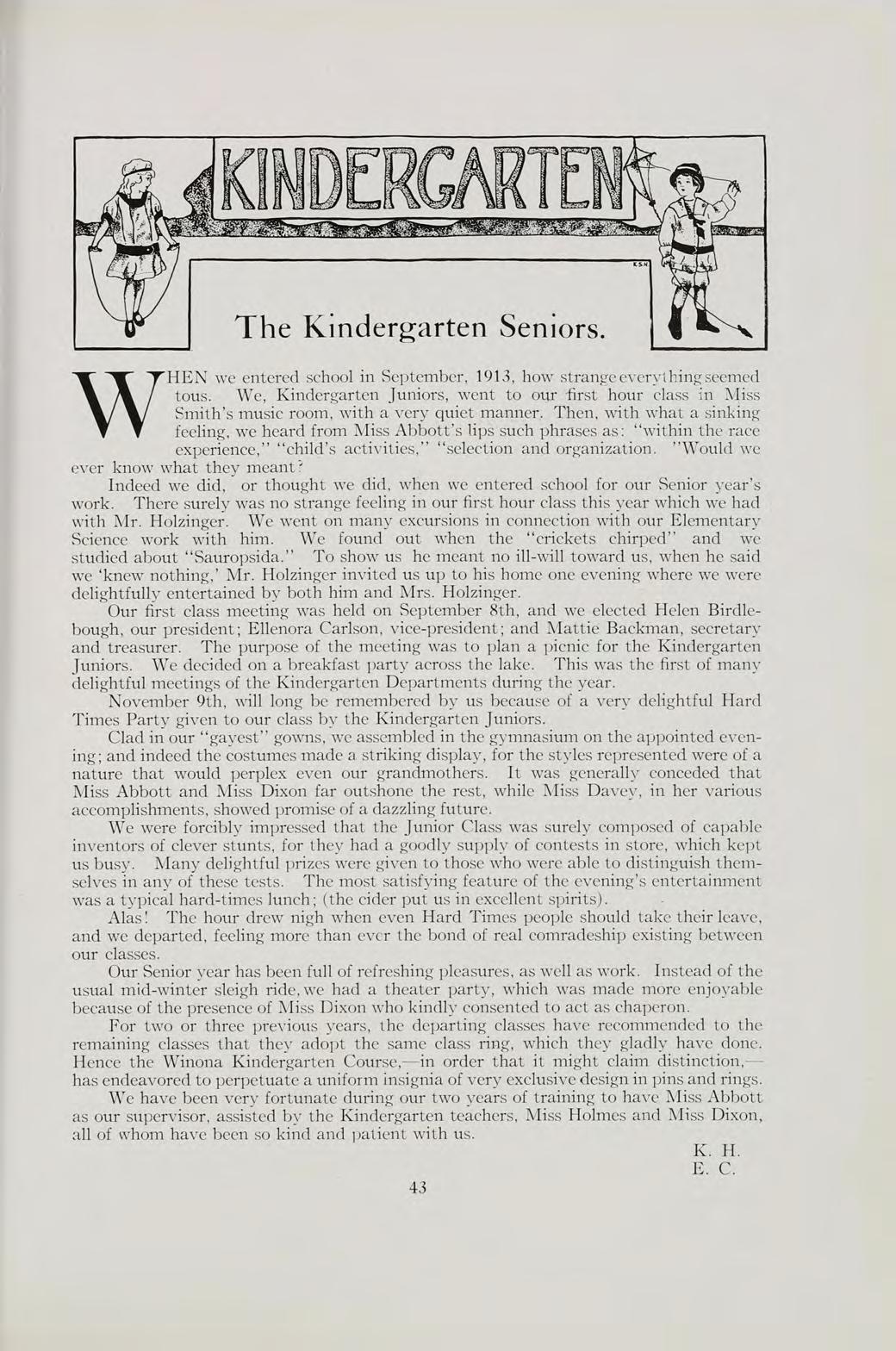
WHEN we entered school in September, 1913, how strange everything seemed tous. We, Kindergarten Juniors, wentto our Erst hour class in Miss Smith’s music room, with a very quiet manner. Then, with what a sinking feeling, we heard from Miss Abbott’s lips such phrases as: “within the race experience,’’ “child’s activities,” “selection and organization. ’’Would we ever know what they meant?
Indeed we did, or thought we did, when we entered school for our Senior year’s work. There surely was no strange feeling in our first hour class this year which we had with Mr. Holzinger. We went on many excursions in connection with our Elementary Science work with him. We found out when the “crickets chirped” and we studied about “Sauropsida.” To show us he meant no ill-will toward us, when he said we ‘knew nothing,’ Mr. Holzinger invited us up to hishome one evening where we were delightfully entertained by both him and Mrs. Holzinger.
Our first class meeting was held on September 8th, and we elected Helen Birdiebough, our president; Ellenora Carlson, vice-president; and Mattie Backman, secretary and treasurer. The purpose of the meeting was to plan a picnic for the Kindergarten Juniors. We decided on a breakfast party across the lake. This was the first of many delightful meetings of the Kindergarten Departments during the year. November 9th, will long be remembered by us because of a very delightful Hard Times Party given to our class by the Kindergarten Juniors.
Clad in our “gayest” gowns, we assembled in the gymnasium on the appointed evening; and indeed the costumes made a striking display, for the styles represented were of a nature that would perplex even our grandmothers. It was generally conceded that Miss Abbott and Miss Dixon far outshone the rest, while Miss Davev, in her various accomplishments, showed promise of a dazzling future.
We were forcibly impressed that the Junior Class was surely composed of capable inventors of clever stunts, for they had a goodly supply of contests in store, which kept us busy. Many delightful prizes were given to those who were able to distinguish themselves in any of these tests. The most satisfying feature of the evening’s entertainment was a typical hard-times lunch; (the cider put us in excellent spirits).
Alas! The hour drew nigh when even Hard Times people should take their leave, and we departed, feeling more than ever the bond of real comradeship existing between our classes.
Our Senior year has been full of refreshing pleasures, as well as work. Instead of the usual mid-winter sleigh ride, we had a theater party, which was made more enjoyable because of the presence of Miss Dixon who kindly consented to act as chaperon.
For two or three previous years, the departing classes have recommended to the remaining classes that they adopt the same class ring, which they gladly have done. Hence the Winona Kindergarten Course,—in order that it might claim distinction,— has endeavored to perpetuate a uniform insignia of very exclusive design in pins and rings.
We have been very fortunate during our two years of training to have Miss Abbott as our supervisor, assisted by the Kindergarten teachers, Miss Holmes and Miss Dixon, all of whom have been so kind and patient with us.
K. H.
E. C.
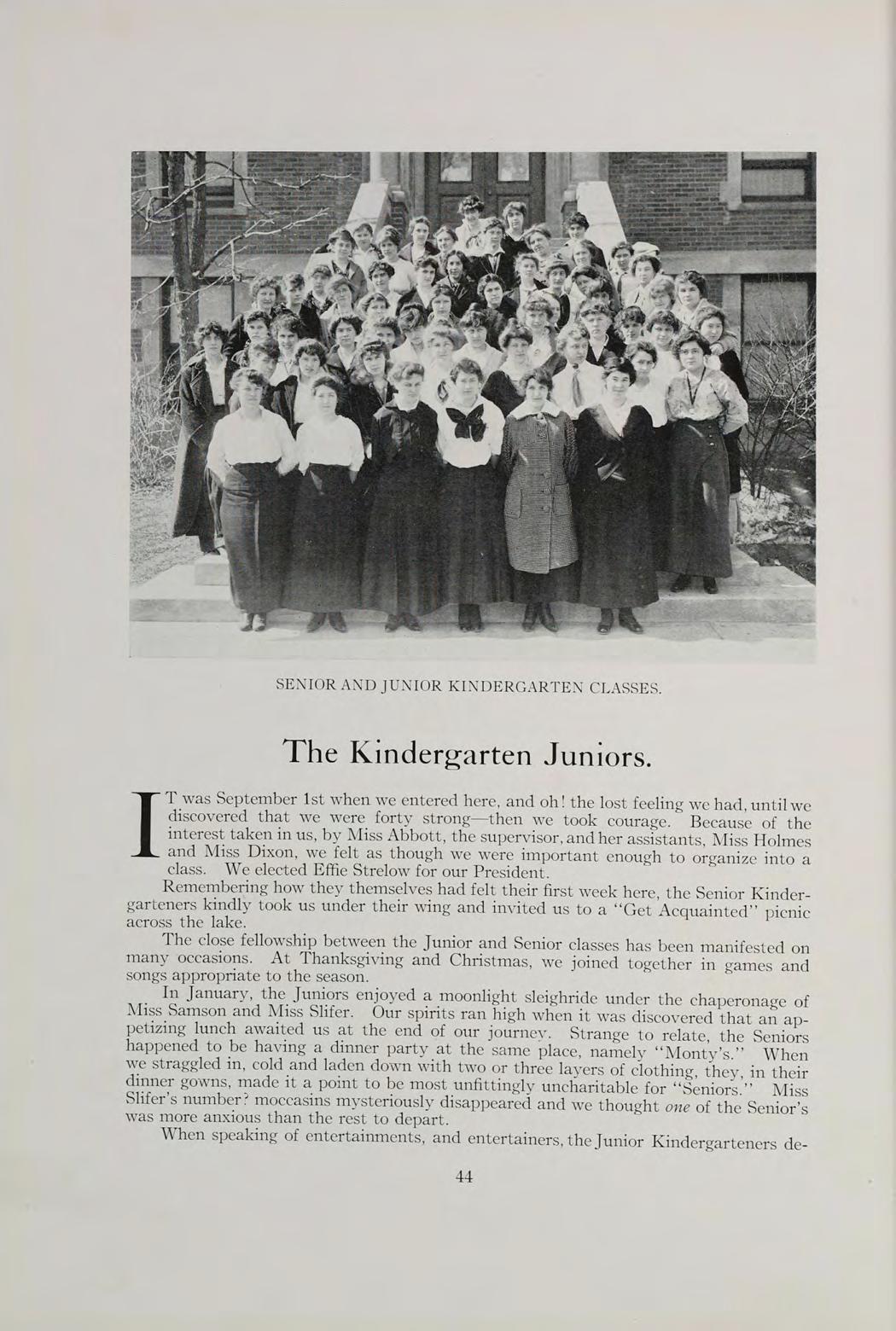
SENIOR AND JUNIOR KINDERGARTEN CLASSES.
IT was September 1st when, we entered here, and oh! the lost feeling we had, until we discovered that we were forty strong—then we took courage. Because of the interest taken in us, by Miss Abbott, the supervisor, and her assistants, Miss Holmes and Miss Dixon, we felt as though we were important enough to organize into a class. We elected Effie Strelow for our President.
Remembering how they themselves had felt their first week here, the Senior Kindergarteners kindly took us under their wing and invited us to a “Get Acquainted’’ picnic across the lake.
The close fellowship between the Junior and Senior classes has been manifested on many occasions. At Thanksgiving and Christmas, we joined together in games and songs appropriate to the season.
In January, the Juniors enjoyed a moonlight sleighride under the chaperonage of Miss Samson and Miss Slifer. Our spirits ran high when it was discovered that an ap- petizing lunch awaited us at the end of our journey. Strange to relate, the Seniors happened to be having a dinner party at the same place, namely “Monty’s.” When we straggled in, cold and laden down with two or three layers of clothing, they, in their dinner gowns, made it a point to be most unfittingly uncharitable for “Seniors.” Miss Slifer’s number? moccasins mysteriously disappeared and we thought one of the Senior’s was more anxious than the rest to depart.
When speaking of entertainments, and entertainers, the Junior Kindergarteners de-
mand that at the top of the list of honorable mention, be placed the Senior Kindergarteners and their Colonial party of February 26th.
George and Martha Washington, in the persons of Mattie Backman and Ellenora Carlson, greeted their guests at the door of the Kindergarten, which was transformed by artistic decorations of our country’s colors. Three slaves, whose complexion faded slightly after exposure to the heat, accompanied their mistresses to this long-to-be-remembered occasion.
If you saw a watch on an orange peel, you would probably think it a bad place for the watch, but it was only “Die Wacht am Rhein.” Those Seniors had many other names of songs told in much the same way, but it requires too much explanation to make you understand them.
Just think! Most of the fortunes which a magic cherry let fall, prophesied that those Kindergarteners would be teachers. That surely looks as though some of those girls might be accepted by superintendents. Even the city of Homer condescended to consider one of the guests, providing that at the end of forty-six years she made Homer her home.
One of the best features of the evening, was something that disappeared so fast you would almost think the Kindergarten Department had not eaten since the dresses they wore had passed out of fashion.
Thus with trials and tribulations, Interspersed with recitations, We have toiled along together, Intermingling work and pleasure.
A for Miss Abbott, who soars above us all.
B for Both Miss Holmes and Miss Dixon for after them do we fallCis for Christopher and Cooley as well—-
Of their many sweet virtues I could not tell.
D is for Davey, our Junior treasurer dear,
And E is for Ehresman who’ll be an artist we fear.
F is for Ferguson, who is gracious to all.
And G is for Gertrude and Laura who come from St. Paul.
H is for Hanover, the Bell of our lot,
And also for Edith who is very much sought.
I is for initials which we are lacking.
Now for the rest my brain I’ll be racking.
J is for Helen and Kathryn, Oh, My! How differently these J’s do apply.
K is for Krause who will sing for you, And L is for Lebkicker from Montana “U”
M is the few whom you do not know.
N is for Alice who is always just so.
But P is for Prior, Potter and Palm, These three, we bank our scholarship on.
Q is for the Question you might ask,
While R is for Ross, a maid with a task. Virginia, Marguerite and Effie signify S. But Helen and Marion shine in their tests.
T is for Teeple and Templeman who talk all the time. They would feel badly, if not in this rhyme.
U and V must come with a jest, For I had almost forgotten all of the rest. Beulah and Olive, Lois, Hazel and Mabel, To represent W they’re more than ableIrene and Roberta now have the floor, So I’ll say X. Y. Z. and my task is o’er.

“Empty”
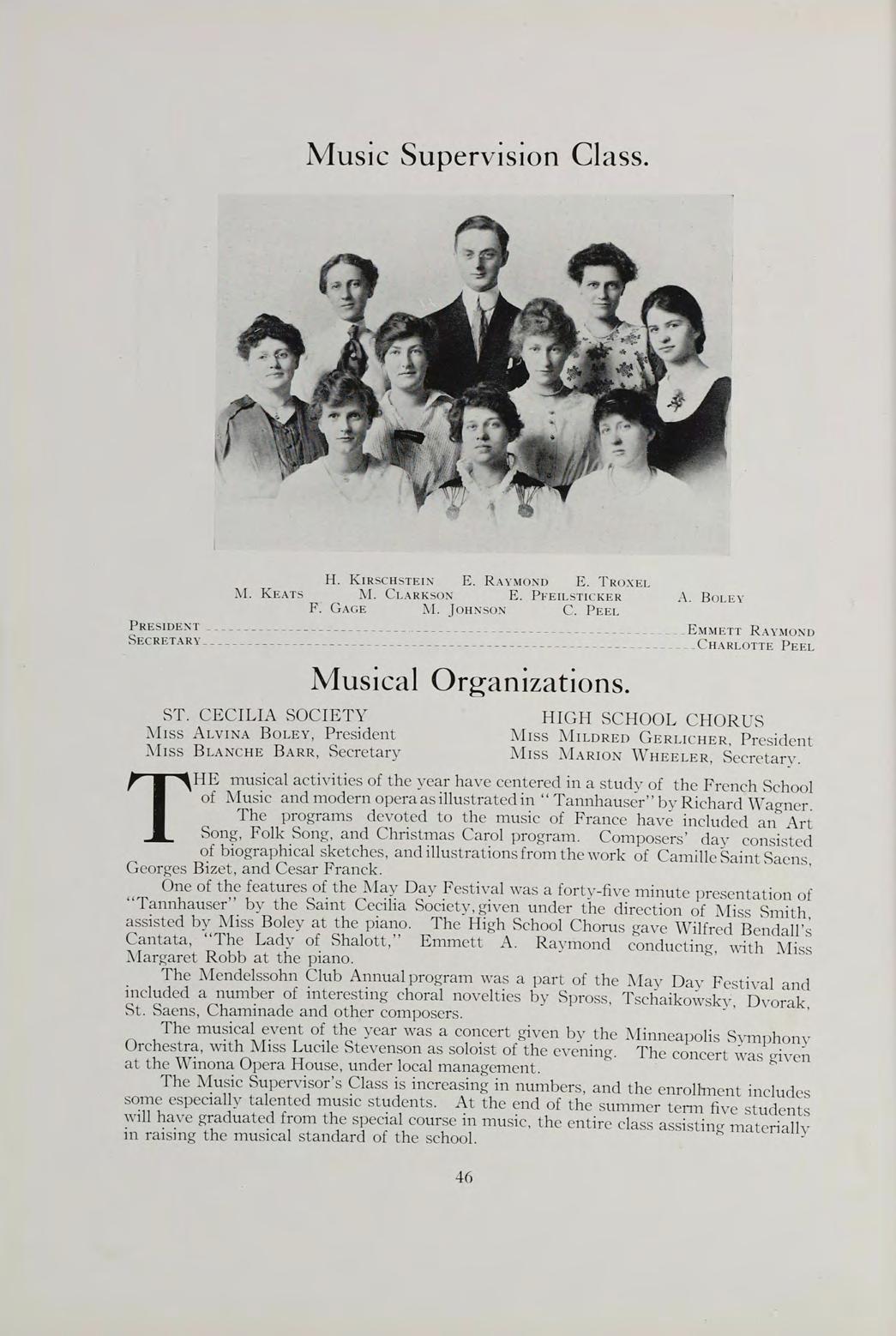
President
H. Kirschstein E. Raymond E. Troxel
M. Keats M. Clarkson E. Peeilsticker A. Boley F. Gage M. Johnson C. Peel
Emmett Raymond Secretary ^Charlotte Peel
Miss Alvina Boley, President
Miss Blanche Barr, Secretary
Miss Mildred Gerlicher, President
Miss Marion Wheeler, Secretary.
HE musical activities of the year have centered in a study of the French School of Music and modern opera as illustrated in Tannhauser” by Richard Wagner. The programs devoted to the music of France have included an Art Song, Folk Song, and Christmas Carol program. Composers’ day consisted of biographical sketches, and illustrationsfrom the work of Camille Saint Saens, Georges Bizet, and Cesar Franck.
One of the features of the May Day Festival was a forty-five minute presentation of “Tannhauser” by the Saint Cecilia Society, given under the direction of Miss Smith, assisted by Miss Boley at the piano. The High School Chorus gave Wilfred Bendall’s Cantata, “The Lady of Shalott,” Emmett A. Raymond conducting, with Miss Margaret Robb at the piano.
The Mendelssohn Club Annual program was a part of the May Day Festival and included a number of interesting choral novelties by Spross, Tsehaikowskv, Dvorak, St. Saens, Chaminade and other composers.
The musical event of the year was a concert given by the Minneapolis Symphony Orchestra, with Miss Lueile Stevenson as soloist of the evening. The concert was given at the Winona Opera House, under local management.
The Music Supervisor’s Class is increasing in numbers, and the enrollment includes some especially talented music students. At the end of the summer term five students will have graduated from the special course in music, the entire class assisting materiallv in raising the musical standard of the school.

HE Household Arts Department has enjoyed a year of unusual development and activity under the efficient guidance of Miss Folger.
During the early part of the year a Household Arts Club was organized. This organization served to bring the Senior and Junoir members together in a common interest and friendship. At some of the meetings, interesting talks were given by different members of the faculty on Women’s Work andHome Life in Other Countries. Other meetings were entirely social and at such times novel games and contests whiled away the hours.
Among the interesting events on the calendar of work in this department was the introduction of school luncheons for the children in the elementary school. This work was carried on during the winter term, and was in charge of the advanced class. Each noon a hot, nutritive dish was served, the cost of which did not exceed one cent a day for each child.
The advanced class in cooking was given the opportunity of acting as caterers for Mr. Maxwell, when he entertained the Advisory Board at an eight course dinner. The brilliant success of the event is not describable by tongue or pen.
A very practical experiment was carried on by the class in dietetics during the winter term. The incident referred to was the inspection of the meals served at the dormitory. At this time the class was satisfied that the meals contained the proper nourishment and a scientific proportion of food nutrients.
During the spring term, a class in home nursing was organized. At the completion ofthe work, all members were equipped with a practical knowledge of the care of the sick and the sick room.
The sewing department has done splendid work this year. The girls have manifested much interest and enthusiasm, and have spent many extra hours in order that they might accomplish as much work as possible. There have been three exhibits. The largest was held at the close of the winter term. This included not only the Thanksgiving and Christmas work, but also, cotton, linen, woolen and silk dresses. There were note books which showed that some time had been given to the study of costumes and design. The class in Sewing III took a course in millinery and made their own spring bonnets.
M. A.

Kaldahl E. Foster M. Willd N. Nelson
Miss Folger E. Drysdale E. Featherstone D. Geffe R. Leonhart V. Davis
M. Schumacher M. Armstrong B. Nolan A. Munger E. Raetz
E. Parsons G. Berry
THROUGH the kind and able guidance of Miss Shafer, the work of the High School Department has steadily progressed during the past year. Instead of the ordinary Literary Society, which could not be formed, on account of the conflicting hours of the students, an Out Door Club was organized, with nature study, recreation, and exercise, as its aim. The following officers were elected:
President
Vice President
Secretary
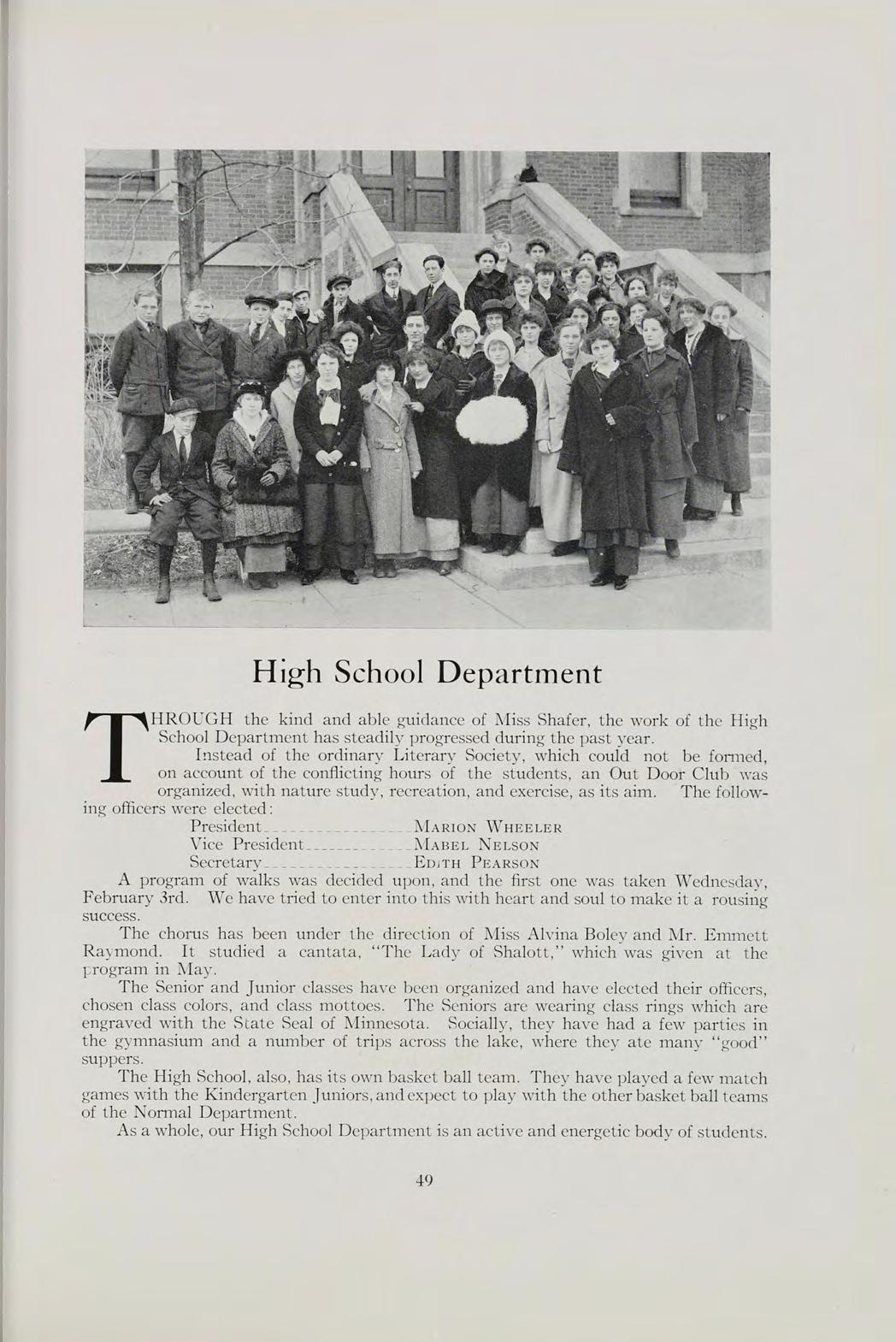
Marion Wheeler
Mabel Nelson
Edjth Pearson
A program of walks was decided upon, and the first one was taken Wednesday, February 3rd. We have tried to enter into this with heart and soul to make it a rousing success.
The chorus has been under the direction of Miss Alvina Boley and Mr. Emmett Raymond. It studied a cantata, “The Lady of Shalott,” which was given at the program in May.
The Senior and Junior classes have been organized and have elected their officers, chosen class colors, and class mottoes. The Seniors are wearing class rings which are engraved with the State Seal of Minnesota. Socially, they have had a few parties in the gymnasium and a number of trips across the lake, where they ate many “good” suppers.
The High School, also, has its own basket ball team. They have played a few match games with the Kindergarten Juniors, and expect to play with the other basket ball teams of the Normal Department.
As a whole, our High School Department is an active and energetic body of students.
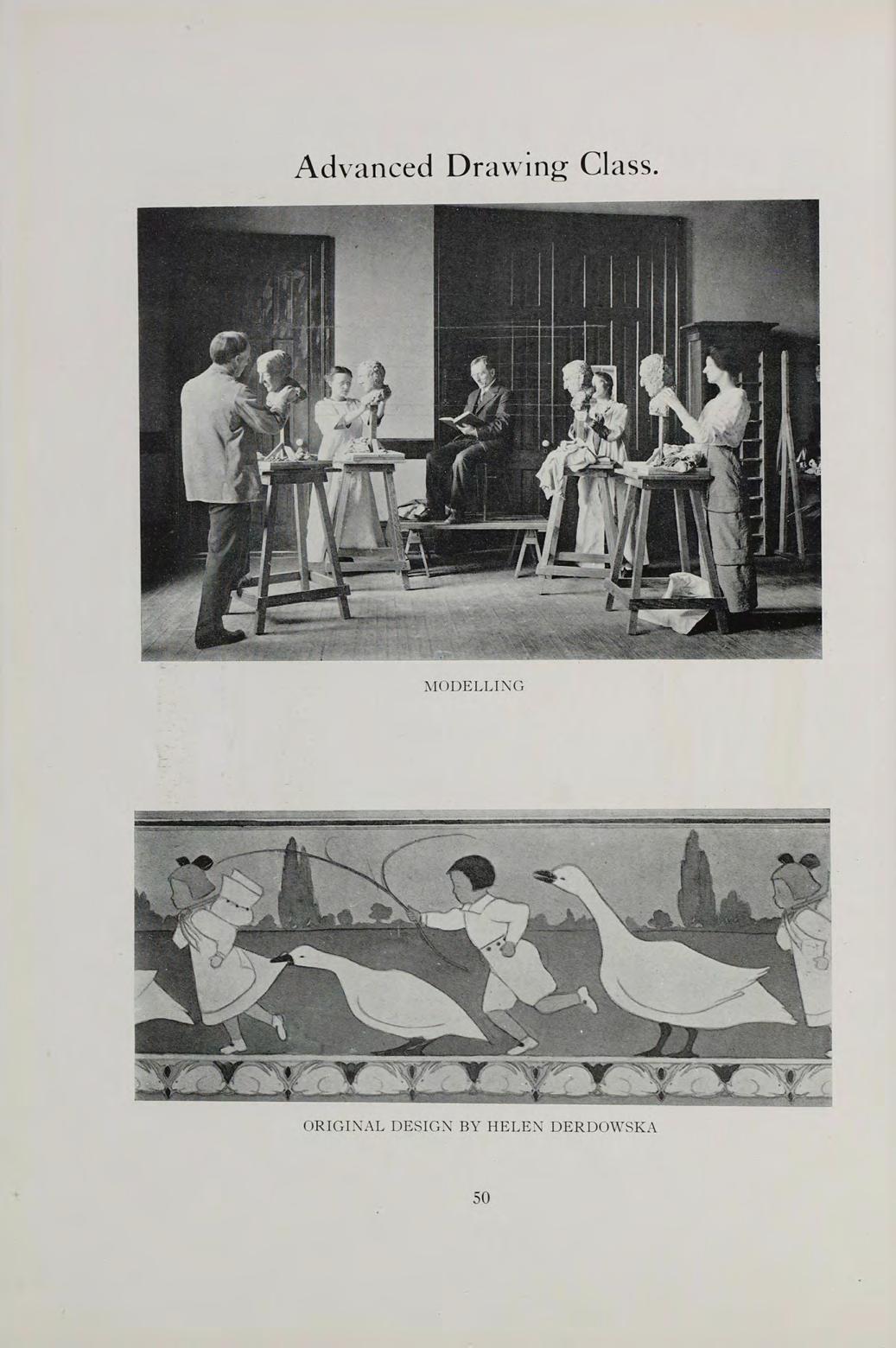
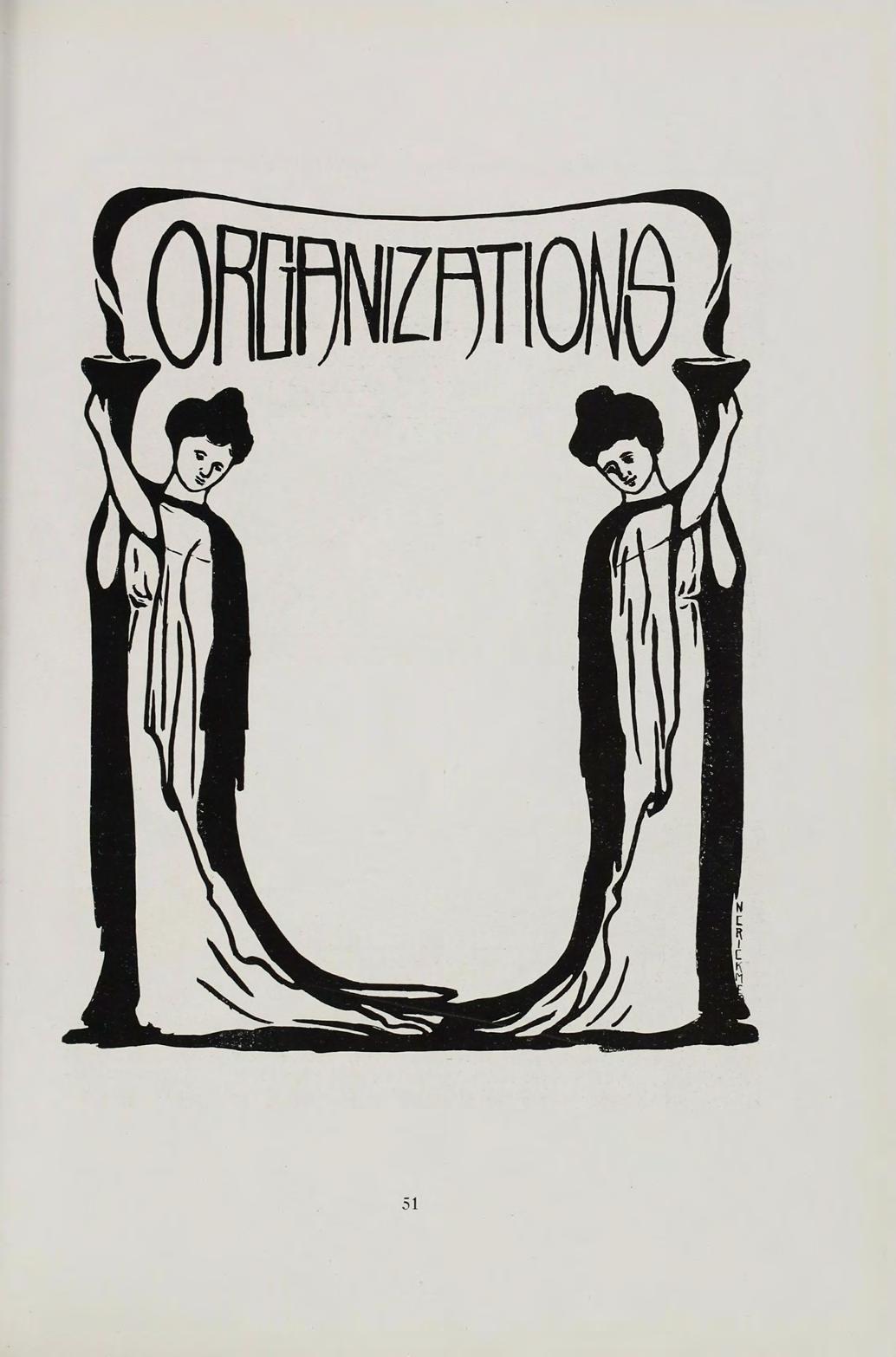
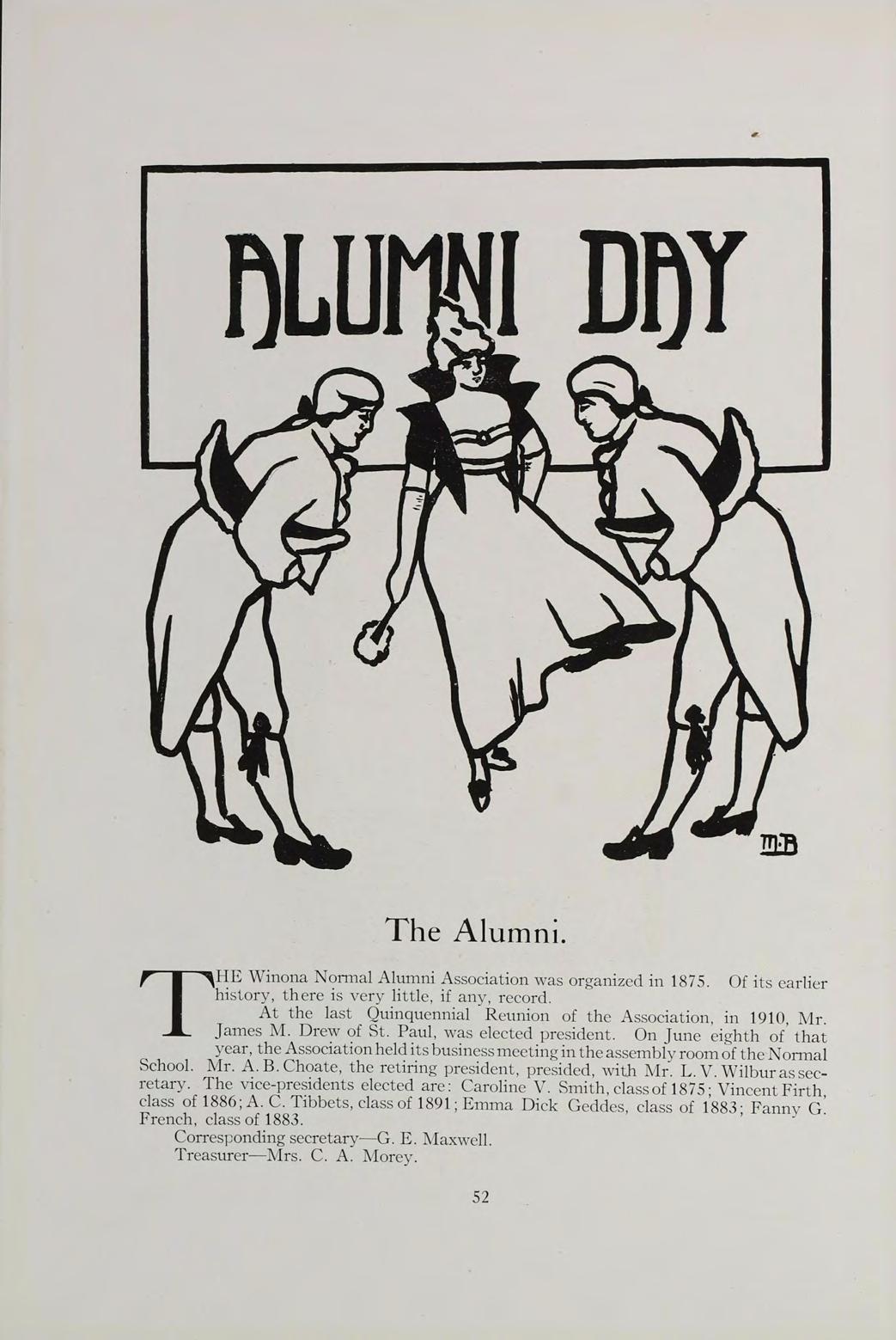
THE Winona Normal Alumni Association was organized in 1875. Of its earlier history, there is very little, if any, record.
At the last Quinquennial Reunion of the Association, in 1910, Mr. James M. Drew of St. Paul, was elected president. On June eighth of that year, the Association held its business meeting in the assembly room of the Normal School. Mr. A. B. Choate, the retiring president, presided, with Mr. L. V. Wilbur as secretary. The vice-presidents elected are: Caroline V. Smith, class of 1875; Vincent Firth, class of 1886; A. C. Tibbets, class of 1891; Emma Dick Geddes, class of 1883’ Fanny G* French, class of 1883.
Corresponding secretary-—G. E. Maxwell. Treasurer—Mrs. C. A. Morey.
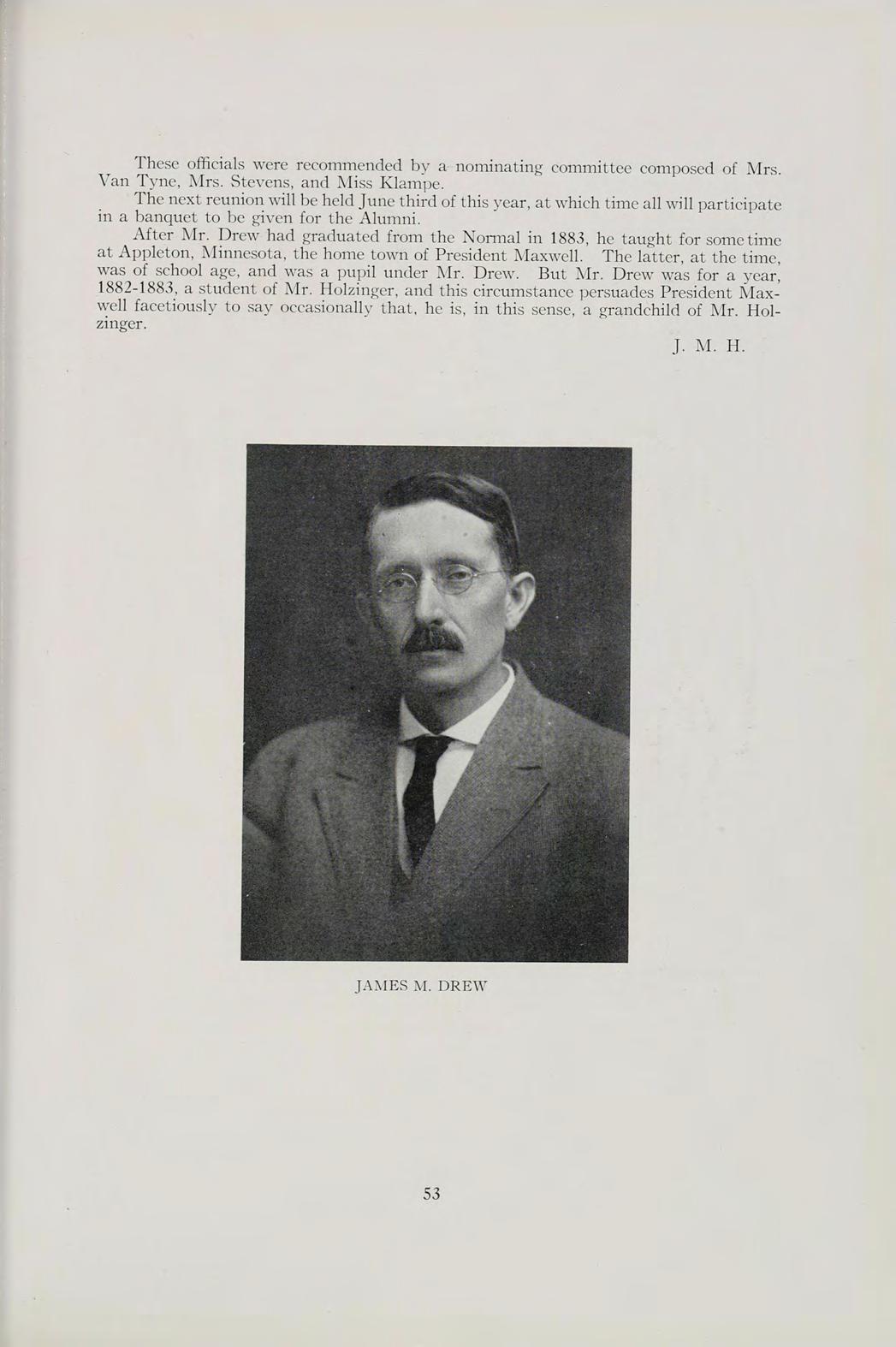
These officials were recommended by a nominating committee composed of Mrs. Van Tyne, Mrs. Stevens, and Miss Klampe.
The next reunion will be held June third of this year, at which time all will participate in a banquet to be given for the Alumni.
After Mr. Drew had graduated from the Normal in 1883, he taught for sometime at Appleton, Minnesota, the home town of President Maxwell. The latter, at the time, was of school age, and was a pupil under Mr. Drew. But Mr. Drew was for a year, 1882-1883, a student of Mr. Holzinger, and this circumstance persuades President Maxwell facetiously to say occasionally that, he is, in this sense, a grandchild of Mr. Hoizinger.
J. M. H.
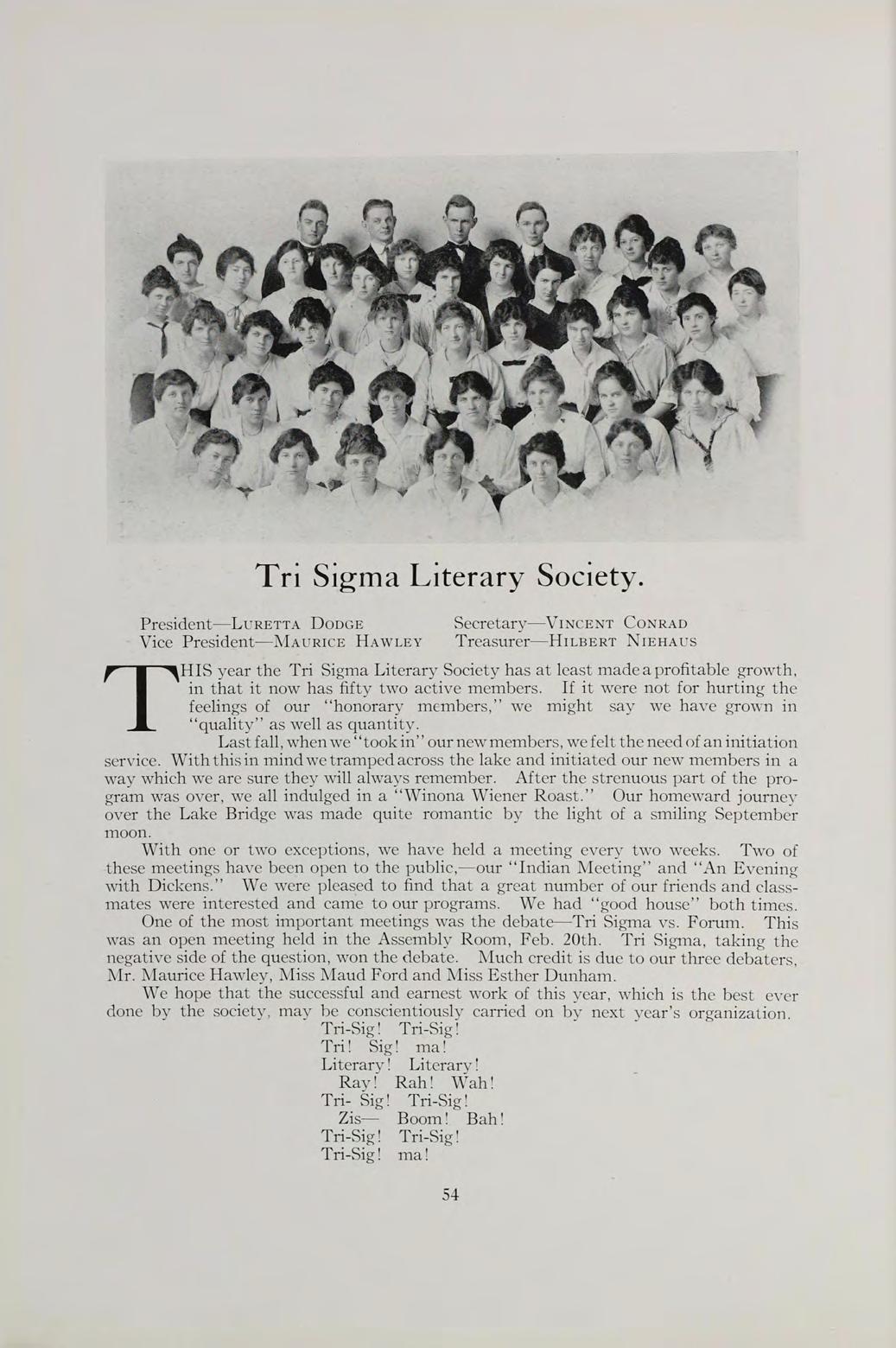
President—Luretta Dodge Secretary—Vincent Conrad Vice President—Maurice Hawley Treasurer—Hilbert Niehaus
THIS year the Tri Sigma Literary Society has at least made a profitable growth, in that it now has fifty two active members. If it were not for hurting the feelings of our “honorary members,’’ we might say we have grown in “quality” as well as quantity.
Last fall, when we took in’ our new members, we felt the need of an initiation service. With this in mind we tramped across the lake and initiated our new members in a way which we are sure they will always remember. After the strenuous part of the program was over, we all indulged in a “Winona Wiener Roast.” Our homeward journey over the Lake Bridge was made quite romantic by the light of a smiling September moon.
With one or two exceptions, we have held a meeting every two weeks. Two of these meetings have been open to the public,—our “Indian Meeting” and “An Evening with Dickens.” We were pleased to find that a great number of our friends and classmates were interested and came to our programs. We had “good house” both times.
One of the most important meetings was the debate—Tri Sigma vs. Forum. This was an open meeting held in the Assembly Room, Feb. 20th. Tri Sigma, taking the negative side of the question, won the debate. Much credit is due to our three debaters, Mr. Maurice Hawley, Miss Maud Ford and Miss Esther Dunham.
We hope that the successful and earnest work of this year, which is the best ever done by the society, may be conscientiously carried on by next year’s organization.
Tri-Sig! Tri-Sig!
Tri! Sig ! ma! Literary! Literary! Ray! Rah! Wah!
Tri- Sig! Tri-Sig! Zis— Boom! Bah
Tri-Sig! Tri-Sig!
Tri-Sig! ma!
THIS organization, formed four years ago for the benefit of Normal Students, has been a most flourishing one since its inception. At the present time, theclub consists of sixty-one active members.
The club has fulfilled its aims, and has carried on its work most suecessfully, especiallyduring the past year. Business meetings are held at St.Thomas Hall every other Wednesday evening, at which time the several priests of the Parish give talks on religious subjects vital to the lives of the students. Open discussions of various questions are likewise held from time to time. The society has also shown its keen interest in the charitable work of the city by helping the St. Rose of Lima Guild along this line.
The social life of theclub has not been neglected, however, while pursuing its other aims. Informal parties and suppers have been given, whenever the members desired.
Officers are elected in September and January, the present incumbents being:
President Mary Edd
Vice-President Lucile Millet
Secretary Esther Page
Treasurer Willomene Flynn

M. E.
E. Foster L. Train G. Meade N. Liljeberg 0. Pagel Mr. Moore E. Keckefoth E. Lyon E. Hart C. Girtler B. Hinshaw A. Studt E. Peterson I.Smith E. Schwirtz L. Grams G. Hemingway D. Brown
Officers for the Winter Term
President—John Katowski
Vice-President—Ethel Lyon

TSecretary—Gertrude Hemingway
Treasurer—Carlyn Girtler
HE Forum was organized last year for the purpose of giving more people opportunity to do literary work. Thus the right spirit prompted these indivictuals to join the society. The work which was begun last year was taken up again at the beginning of the fall term, and is now being successfully carried on. Although the Forum is not a large society.it nevertheless contains enoughgood material to carry on some very interesting as well as instructive programs. The meetings of the society have been held on Saturday evenings. One meeting took the form of a joint debate—Tri-Sigma vs. Forum. The subject of the debate was “Resolved that the U. S. Army and Navy should be materially increased.’’ The Forum took the affirmative, but was defeated. The judges gave them great praise for the work done in the debate. The debaters for the Forum were: Gertrude Hemingway, John Katowski and Lillian Grams.

E. Noltimier A. Bezanson M. Brimhall T. Brooks O. Keith B. Hinshaw B. Perry G. Rasmussen E. Simpson
THE Young Women’s Christian Association of the Winona Normal School is a branch ofthe national organization, having been affiliated last spring. Its purpose is to bring to young women away at school a more abundant life in a four-fold way,—physical, social, intellectual and spiritual. When a Y. W. C. A. is organized in a city, it is usually the only place where young women who work gain any knowledge of a true home. They provide rest rooms, libraries, and lunch rooms for the girls.
In our society we can not provide allof these things, but we have furnished a comfortable rest-room, with the nucleus of a library. We hold weekly sandwich sales which are very well patronized by the students. The money goes to defray the expenses of the organization and for missionary purposes.
The scope ofthe work ofthe Y. W. C. A. is suggested by the titles of the committees. The weekly meetings, bible classes and social good times, which are a part of the Y. W. C. A. work everywhere, are its strongest activities in our school.
Every Thursday evening, the girls assemble at Morey Hall for a quiet and instructivehour. A number of town people and faculty membershave addressed these meetings.
In bible study voluntary classes have been organized in the various Sunday-schools of the city. As a training for Sunday-school teachers, Miss Abbott has given us a series of talks on Sunday-school methods and principles of teaching bible stories to children.
In our missionary work, we send money to help support the field missionary and Miss Elizabeth Coan of Persia, a member of last year’s class. We also send a delegate to the Geneva Convention. Miss Annie Bezanson was our representative this year.
The Y. W. C. A. have had several social functions during the past year. These were opened by an afternoon tea to help the new members get acquainted with each other and with the cabinet. This was followed in November by a beautiful and impressive initiation service and banquet. Just before the girls left for the holidays, a Christmas program was given which was very interesting and instructive. This program was followed by a Christmas sale in the alcove at Morey Hall.
Our work has been very successful this year, due to the co-operation among our ranks, and we hope this work of service may be as successfully carried out next year.
O. K.

THE boys of the Normal Department, feeling the need of closer union and fellowship among themselves, held an informal meeting one fine evening last October. It was decided to form a club, the purpose of which was to be partly literary, but largely social.
Mr. Hawley was elected as our first president, underwhose ablemanagement the club soon stood on solid foundation. Mr. Hu continued the good work throughout the winter term, and Mr. Hawley was re-elected for the spring term.
The regular meetings of this club were held Friday evenings about twice a month, but it was found necessary to call many special meetings. Several prominent speakers, whose interest centers largely on boys, gave some very interesting talks. One of the first social events was an oyster supper given after the first basket-ball game of the season. The main social event however was the “April Fool’’ party given under the auspices of this club at Morey Hall. Mr. Baker distinguished himself as a chorus girl, and some very dramatic (!) skill and wonderful (?) singing came to light when a scene from the Opera II Travatore was put on in the form of a burlesque. Clog dancers, heretofore unknown, made their first public appearance. Rare jokes, someof which were handed down from the “Stone Ages,’’were aired once more. The enthusiastic audience—some of whom were anned with opera glasses in the form of milk bottles—frequently showered the “players” with beautiful paper bouquets. The program is said to have accomplished its purpose.
After one of the strenuous sessions of the club, the members generally relaxed in the following manner: (Pete) Tri playing the piano; (Kot) Katowski and (Jimmie) Robb jigging; (Dopey) Blowers and (Props) Hawley singing a duet; (Doughnuts) Flannery telling a funny story; (Charley) Ellison showing (Louis) Einhorn one of the new dances; (Corporal) Conrad drawing a cartoon; (Dutch) Niehaus teaching (Tien Tsing) Hu the intricacies of German; (Augie) Rick trying to get the minutes of the meeting in good shape and at the same time arguing with (Steve) Sievertson; (Drowsy) Borncamp being conspicuous by his absence; and (Chick) Baker getting material for a new play.
The interest shown throughout all meetings promises much for the future of the club, and we sincerely hope that the boys of the Normal will continue and improve on this worthy organization next year.
H. N.
FIRST SOPRANO
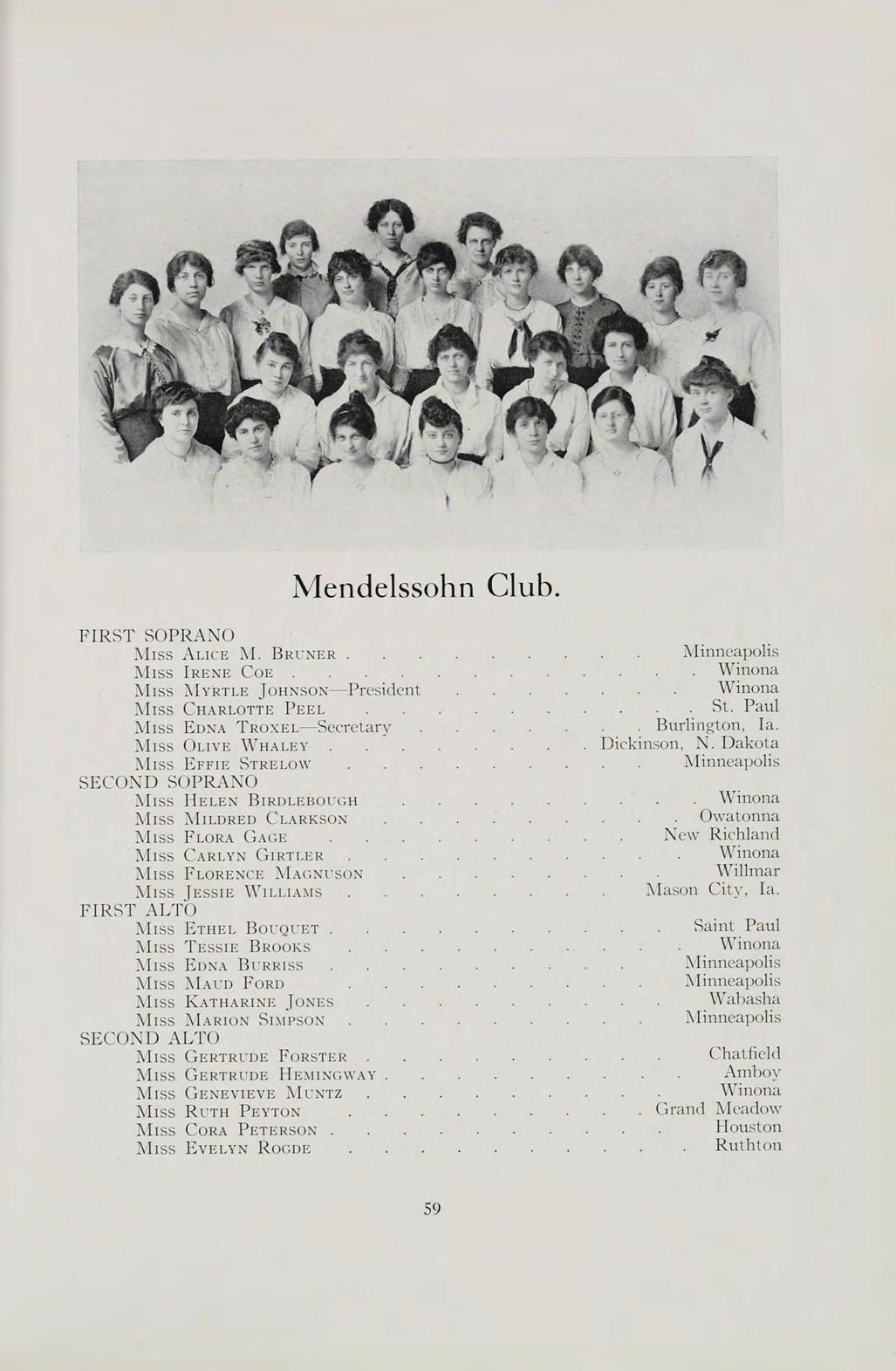
Miss Alice M. Bruner Minneapolis
Miss Irene Coe Winona
Miss Myrtle Johnson—President Winona
Miss Charlotte Peel St. Paul
Miss Edna Troxel—Secretary Burlington, la.
Miss Olive Whaley Dickinson, N. Dakota
Miss Effie Strelow Minneapolis
SECOND SOPRANO
Miss Helen Birdlebough Winona
Miss Mildred Clarkson Owatonna
Miss Flora Gage New Richland
Miss Carlyn Girtler Winona
Miss Florence Magnuson Willmar
Miss Jessie Williams Mason Citv, la.
FIRST ALTO
Miss Ethel Bouquet Saint Paul
Miss Tessie Brooks Winona
Miss Edna Burriss Minneapolis
Miss Maud Ford Minneapolis
Miss Katharine Jones Wabasha
Miss Marion Simpson Minneapolis
SECOND ALTO
Miss Gertrude Forster Chatfield
Miss Gertrude Hemingway Amboy
Miss Genevieve Muntz Winona
Miss Ruth Peyton Grand Meadow
Miss Cora Peterson Houston
Miss Evelyn Rogde Ruthton
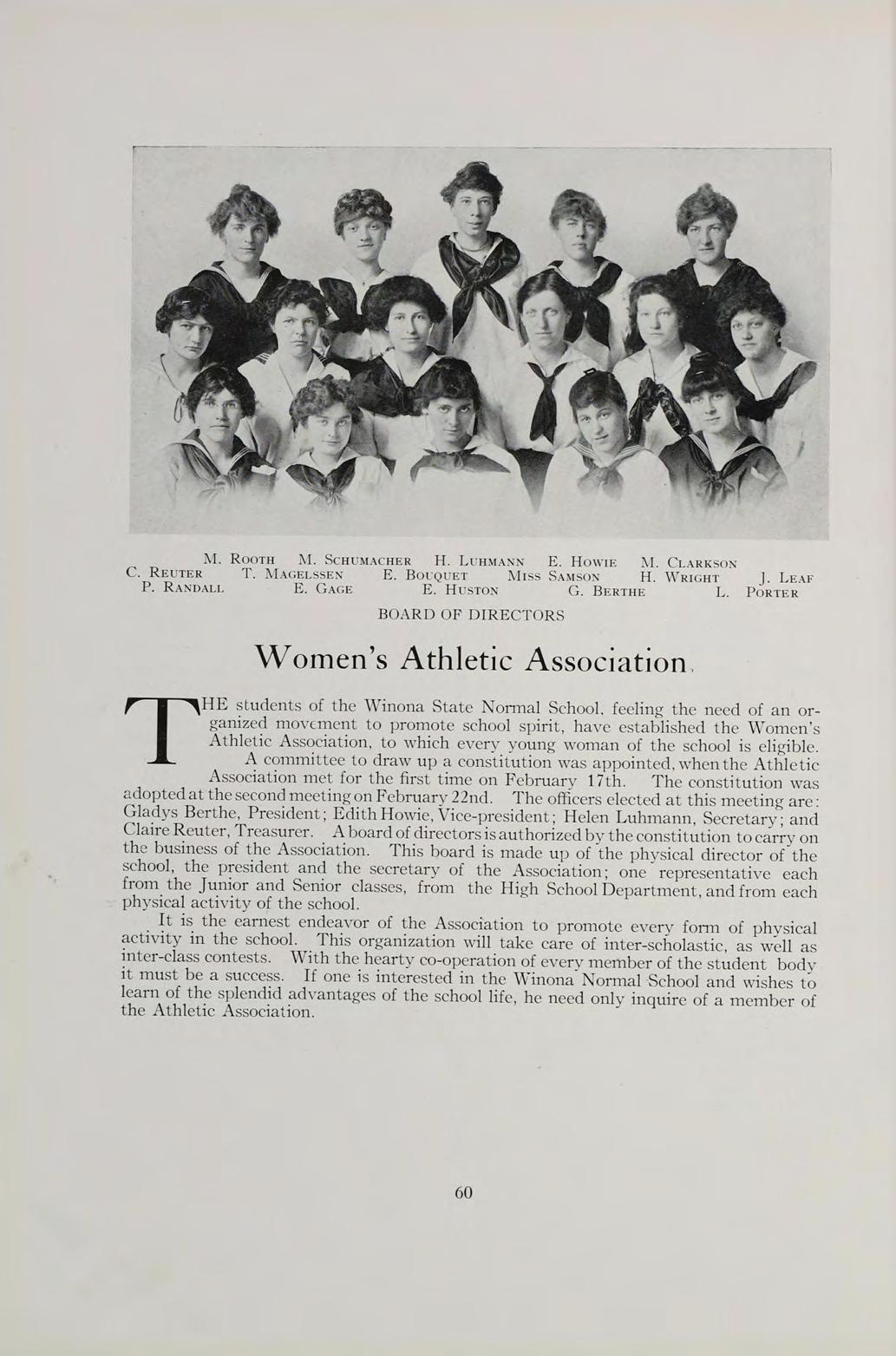
M. Rooth M. Schumacher H. Luhmann E. Howie M. Clarkson C. Reuter T. Magelssen E. Bouquet Miss Samson H. Wright J. Leaf P. Randall E. Gage E. Huston G. Berthe L. Porter
BOARD OF DIRECTORS
THE students of the Winona State Normal School, feeling the need of an organized movement to promote school spirit, have established the Women’s Athletic Association, to which every young woman of the school is eligible. A committee to draw up a constitution was appointed, when the Athletic Association met for the first time on February 17th. The constitution was adopted at the second meeting on February 22nd. The officers elected at this meeting are: Gladys Berthe, President; Edith Howie, Vice-president; Helen Luhmann, Secretary; and Claire Reuter, Treasurer. A board of directors is authorized by the constitution to carry on the business of the Association. This board is made up of the physical director of the school, the president and the secretary of the Association; one representative each from the Junior and Senior classes, from the High School Department, and from each physical activity of the school.
It is the earnest endeavor of the Association to promote every form of physical activity in the school. This organization will take care of inter-scholastic, as well as inter-class contests. With the hearty co-operation of every member of the student body it must be a success. If one is interested in the Winona Normal School and wishes to learn of the splendid advantages of the school life, he need only inquire of a member of the Athletic Association.
Hawley Simpson Brooks
Keckefoth Hohaus Burriss Grams Derdowska Carlson
Gilbertson Miller Birdlebough Bouquet Rasmussen Davey Berthe
Editor-in-chief
Assistant-editor
Business Manager
Assistant Business Manager
Junior Business Manager..
Artist
Assistant Artist
Literary
Organizations
Social Jokes
Athletics
Kindergarten Seniors
Kindergarten Juniors
Junior Representative
High School Representative
Faculty Critics
Agda Phillips
Ruth Ehresman
John Katowski
Grace Strong
Audrey Mitchell
Maude Ford
Helen Luhmann
J. M. Holzinger
Emmett Raymond
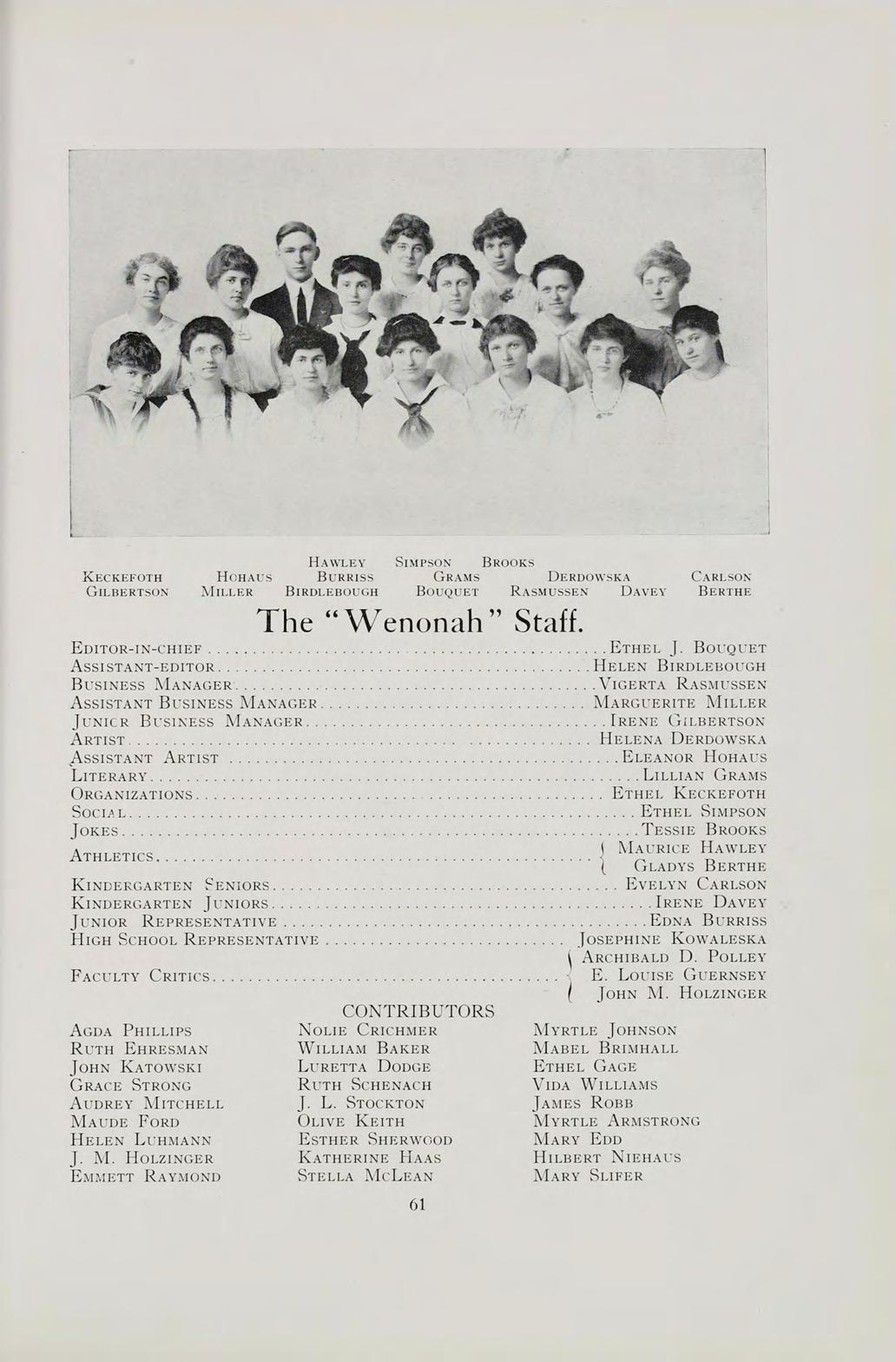
CONTRIBUTORS
Nolie Crichmer
William Baker
Luretta Dodge
Ruth Schenach
J. L. Stockton
Olive Keith
Esther Sherwood
Katherine Haas
Stella McLean
Ethel J. Bouquet
HelenBirdlebough
Vigerta Rasmussen
Marguerite Miller
Irene Gilbertson
Helena Derdowska
Eleanor Hohaus
Lillian Grams
Ethel Keckefoth
Ethel Simpson
Tessie Brooks
| Maurice Hawley
1 Gladys Berthe
Evelyn Carlson
Irene Davey
Edna Burriss
Josephine Kowaleska
^ Archibald D. Polley
E. Louise Guernsey
I John M. Holzinger
Myrtle Johnson
Mabel Brimhall
Ethel Gage
Vida Williams
James Robb
Myrtle Armstrong
Mary Edd
Hilbert Niehaus
Mary Slifer
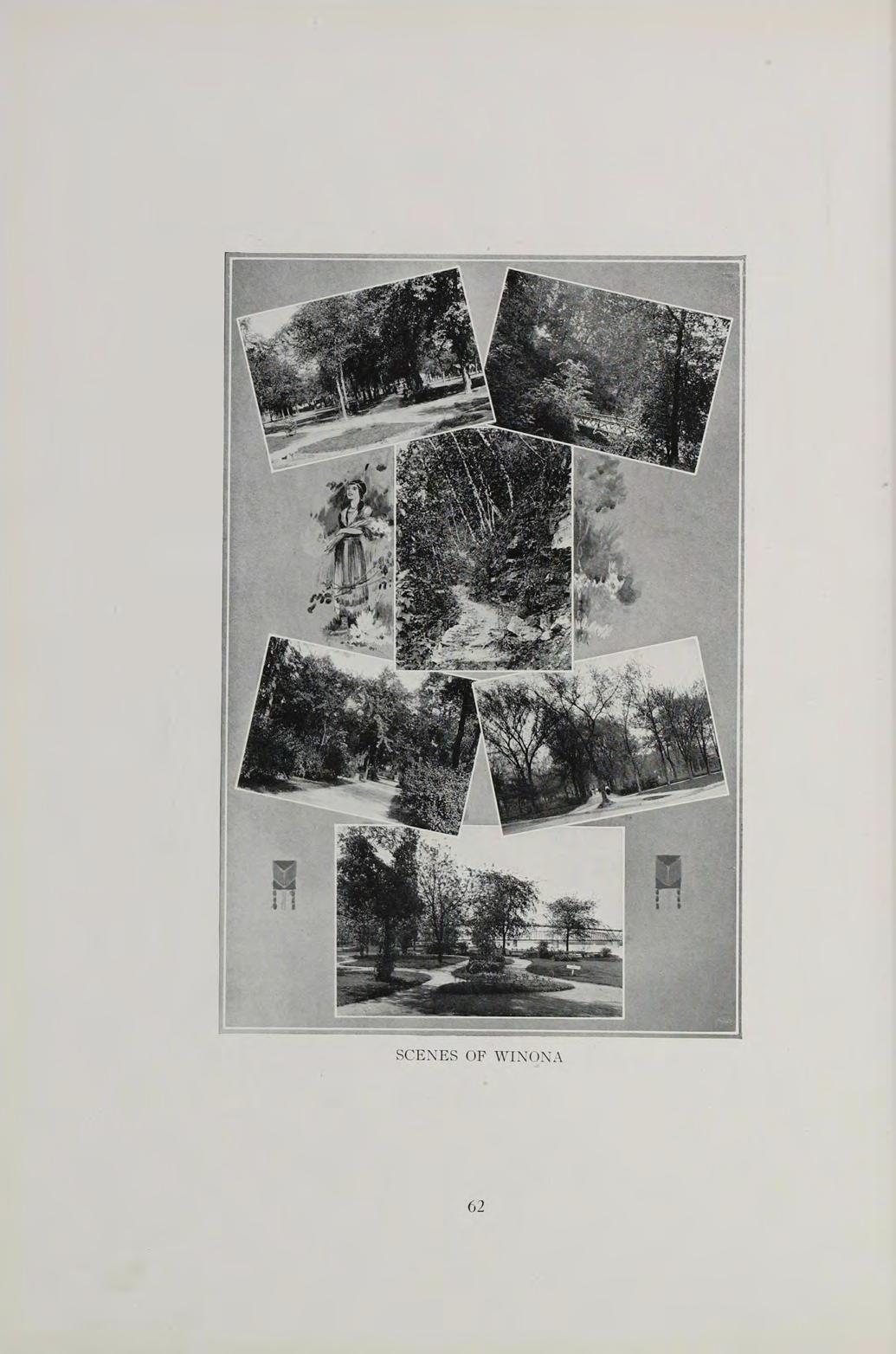
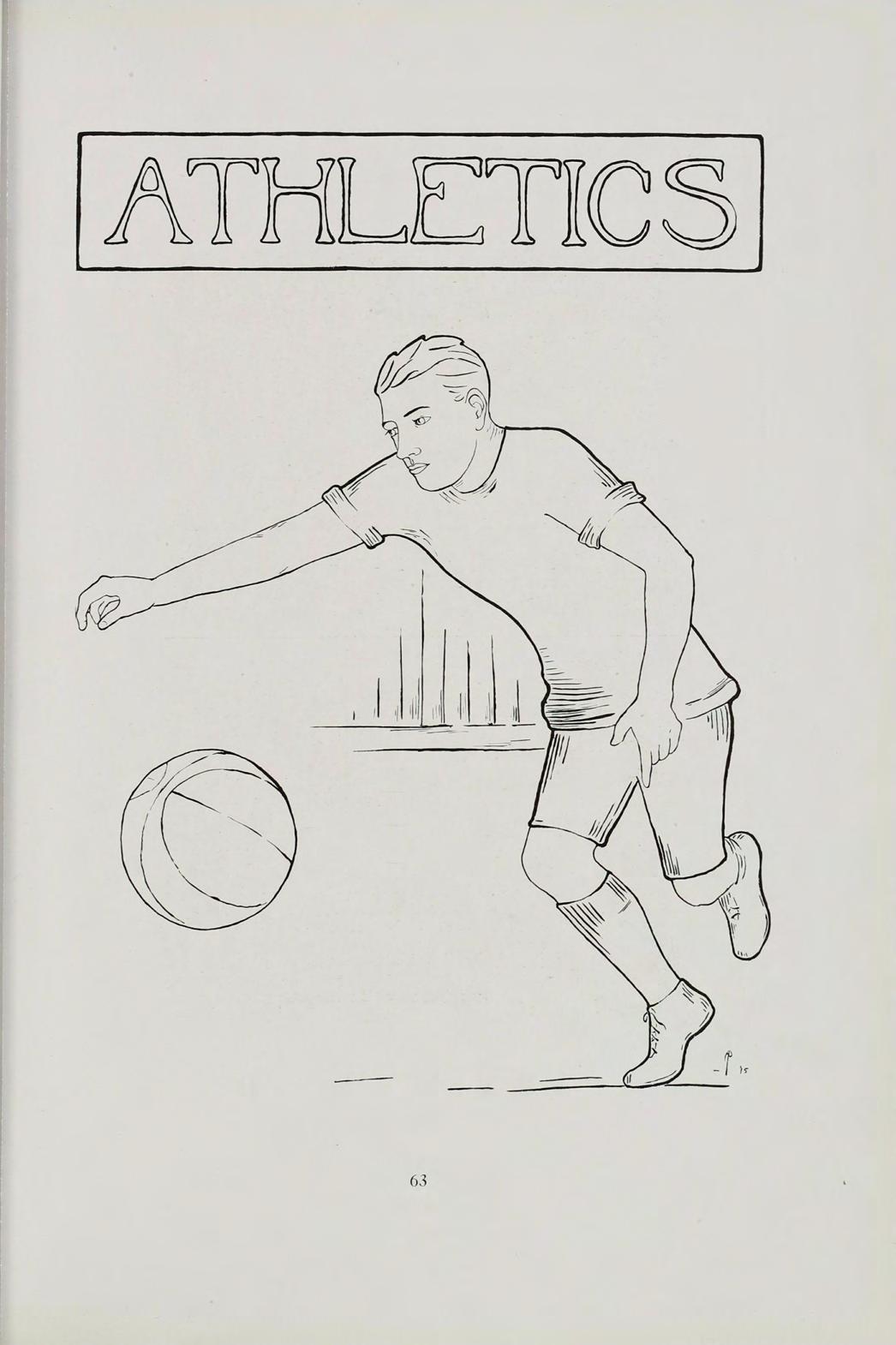

EARLY in the fall, the boys began training for the winter basket-ball season, and about a dozen candidates tried out for the team. Altho hampered by lack of material, the boys worked hard, and two teams were organized. The first team was made up of Capt. Niehaus and Blowers, forwards; Katowski, center; Robb and Borncamp, guards. On the second team were Capt. Conrad and Flannery, forwards; Hawley, center; Rick and Syvertson, guards.
Games were played with the city High School, Y. M. C. A. teams, and the Business College. The two most important events of the season were the games with La Crosse Normal, at La Crosse on Jan. 9th., and at Winona on Feb. 20th.; both of which were won by La Crosse.
While from the standpoint of victories the season was not very successful, yet the foundation has been laid for a winning team for next year, and the rapid improvement of the team during the past season, promises much for the future.
Great credit is due Mr. Abram, and also Mr. Moore, for their efficient coaching and earnest help during the year.
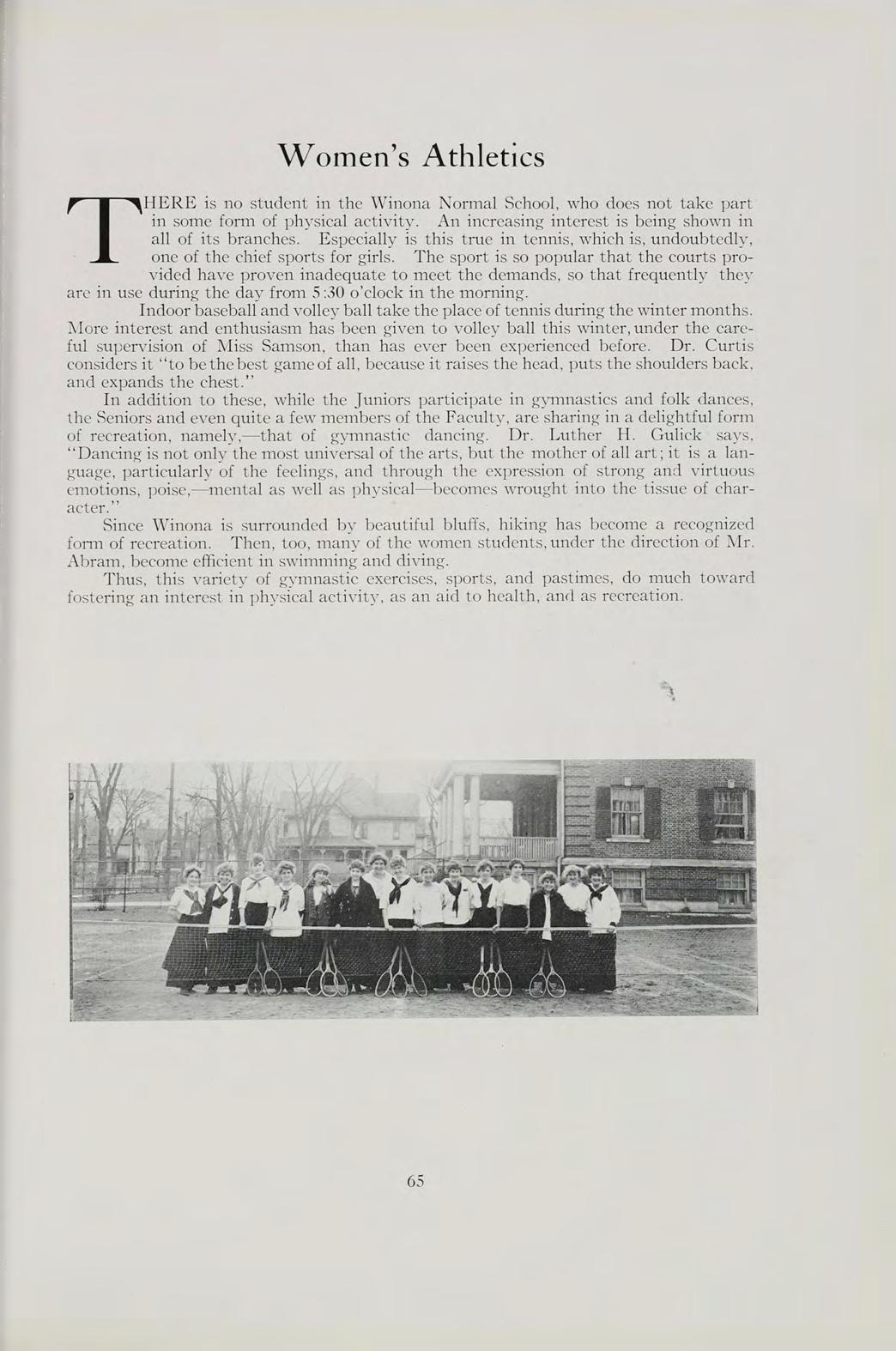
THERE is no student in the Winona Normal School, who does not take part in some form of physical activity. An increasing interest is being shown in all of its branches. Especially is this true in tennis, which is, undoubtedly, one of the chief sports for girls. The sport is so popular that the courts provided have proven inadequate to meet the demands, so that frequently they are in use during the day from 5:30 o’clock in the morning.
Indoor baseball and volley ball take the place of tennis during the winter months. More interest and enthusiasm has been given to volley ball this winter, under the careful supervision of Miss Samson, than has ever been experienced before. Dr. Curtis considers it “to be the best game of all, because it raises the head, puts the shoulders back, and expands the chest.’’
In addition to these, while the Juniors participate in gymnastics and folk dances, the Seniors and even quite a few members of the Faculty, are sharing in a delightful form of recreation, namely,—that of gymnastic dancing. Dr. Luther H. Guliek says, “Dancing is not only the most universal of the arts, but the mother of all art; it is a language, particularly of the feelings, and through the expression of strong and virtuous emotions, poise,-—mental as well as physical—becomes wrought into the tissue of character.’’
Since Winona is surrounded by beautiful bluffs, hiking has become a recognized form of recreation. Then, too, many of the women students, under the direction of Mr. Abram, become efficient in swimming and diving.
Thus, this variety of gymnastic exercises, sports, and pastimes, do much toward fostering an interest in physical activity, as an aid to health, and as recreation.
THE students can again feel that basket ball this season has been a great suecess. Both Senior and Junior teams were formed among the students of the Nonnal Department. Although the Seniors did remarkable work, the Juniors were successful in obtaining the Normal championship.
On February 24th, the first game of the season was played. When time was called, the score was found to be a tie. No person who saw the game will soon forget the tense excitement of the last few minutes, when each team was fighting to gain the extra two points. The Juniors were victorious, and the final score was 19 to 17. The second game, which wr as played on February 26th, was won again by the Juniors with a 19 to 11 score.
Besides the Junior and Senior games, there were several interesting games played between a team representing the Junior Kindergarteners, and one representing the High School Department.
The two elements which were largely responsible in making basket ball so successful, were the hearty support both by the basket ball girls and the student body, and the very efficient direction of Miss Samson. Through her untiring efforts and perseverance she has developed in the girls the spirit of team work and fair play.
SENIORS
Ethel Keckefoth l Forwards
Esther Huston j Helen Luhmann—Center
Elise Schwirtz I Guards Carlyn Girtler }
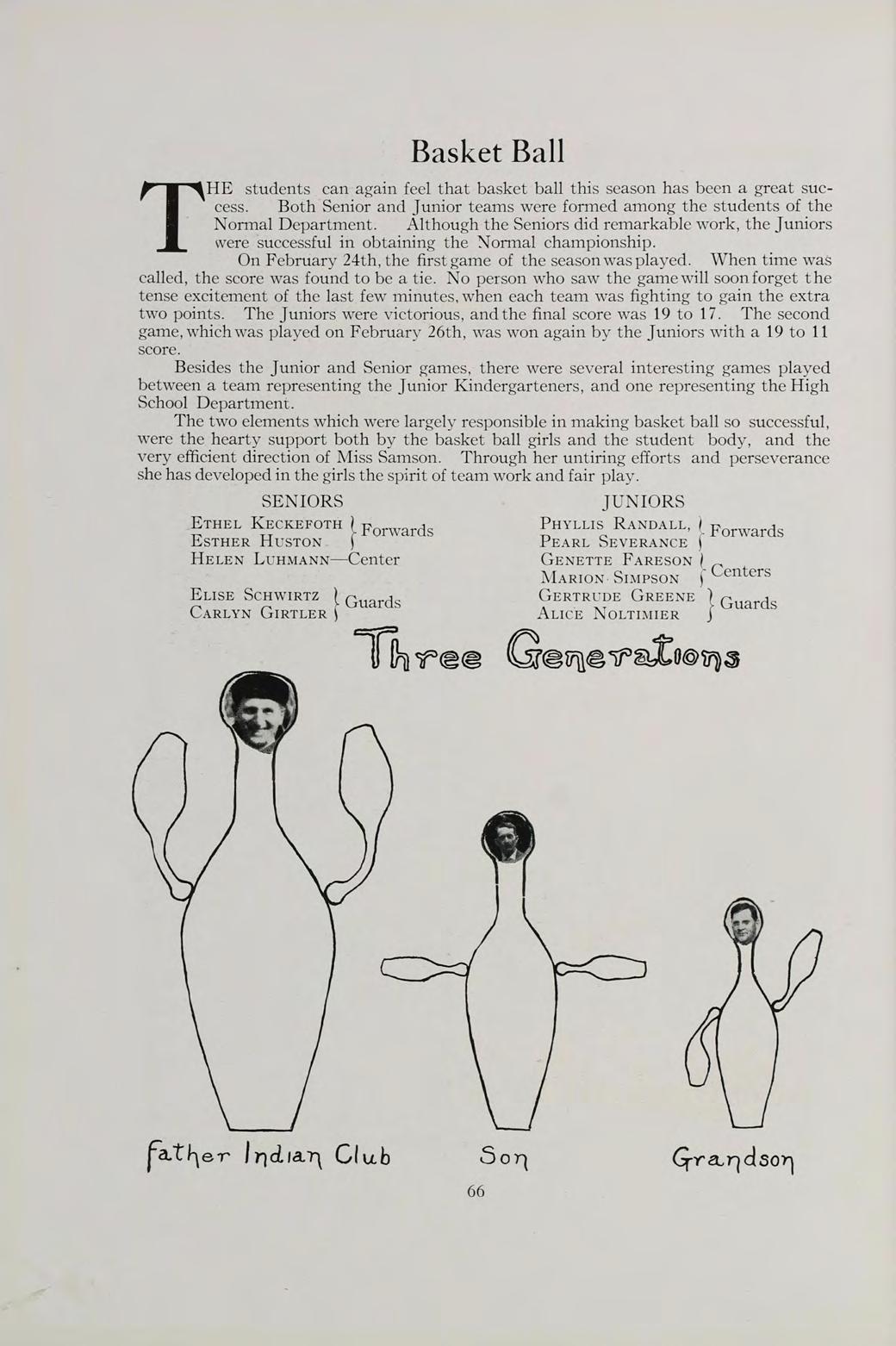
Phyllis Randall, I Forwards
Pearl Severance J Genette Fareson I Marion Simpson j'Centers
Alice Noltimier j Guards
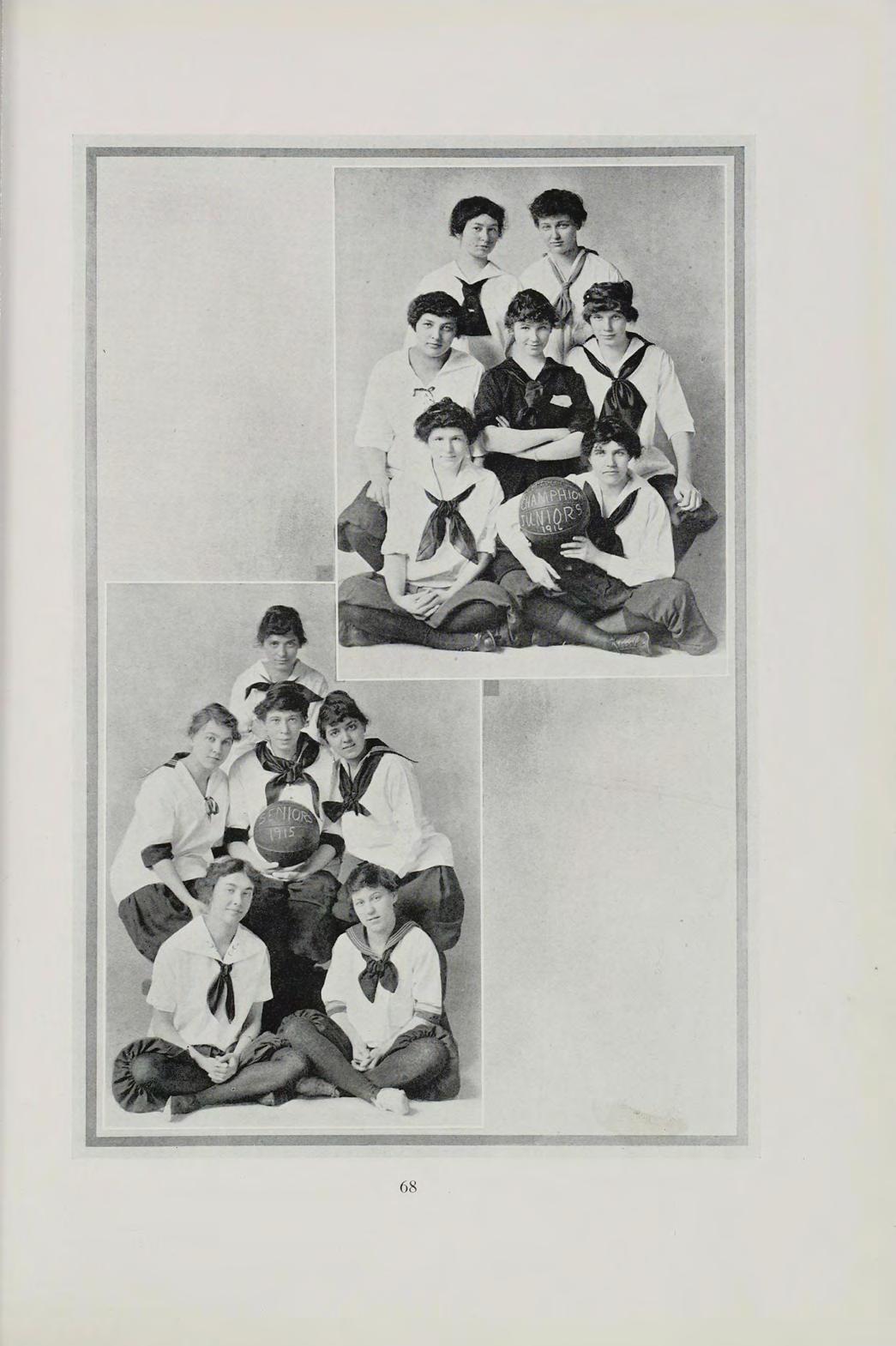
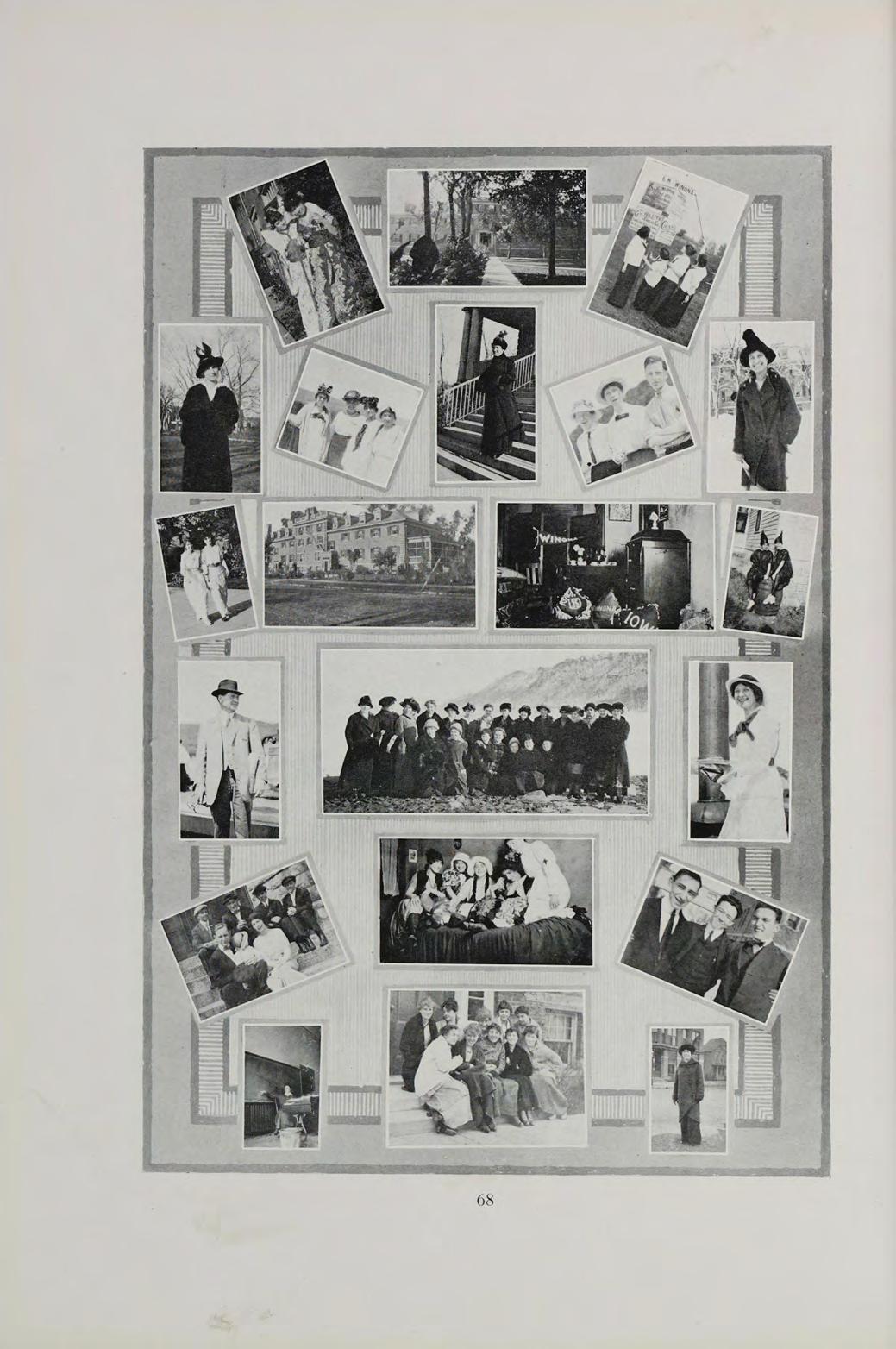
1—Registration Day—We missed Miss Richard’s welcome.
5—The customary “Get Acquainted” Excursion on the river.
6—“After dinner” recital at Morey Hall.
11—Banquet at Morey Hall for the Model School boys who ran in the relay race at the Tri-County Fair.
14—Mr. Dickerson told us under what circumstances Francis Scott Keyes wrote “The Star Spangled Banner” just a century ago today.
19—Senior Kgs. gave a picnic breakfast across the lake for the Junior Kgs. First meeting of the Forum Literary Society this year.
23—“Open House” at Morey Hall.
25—Reception at Morey Hall given by the Faculty for all the Normal students.
26—Initiation picnic of the Tri Sigma Literary Society at Bluff Side Park.
28—Miss Edna Troxel entertained us with a recital of six French Art Songs.
30—“Open House” at Morey Hall.
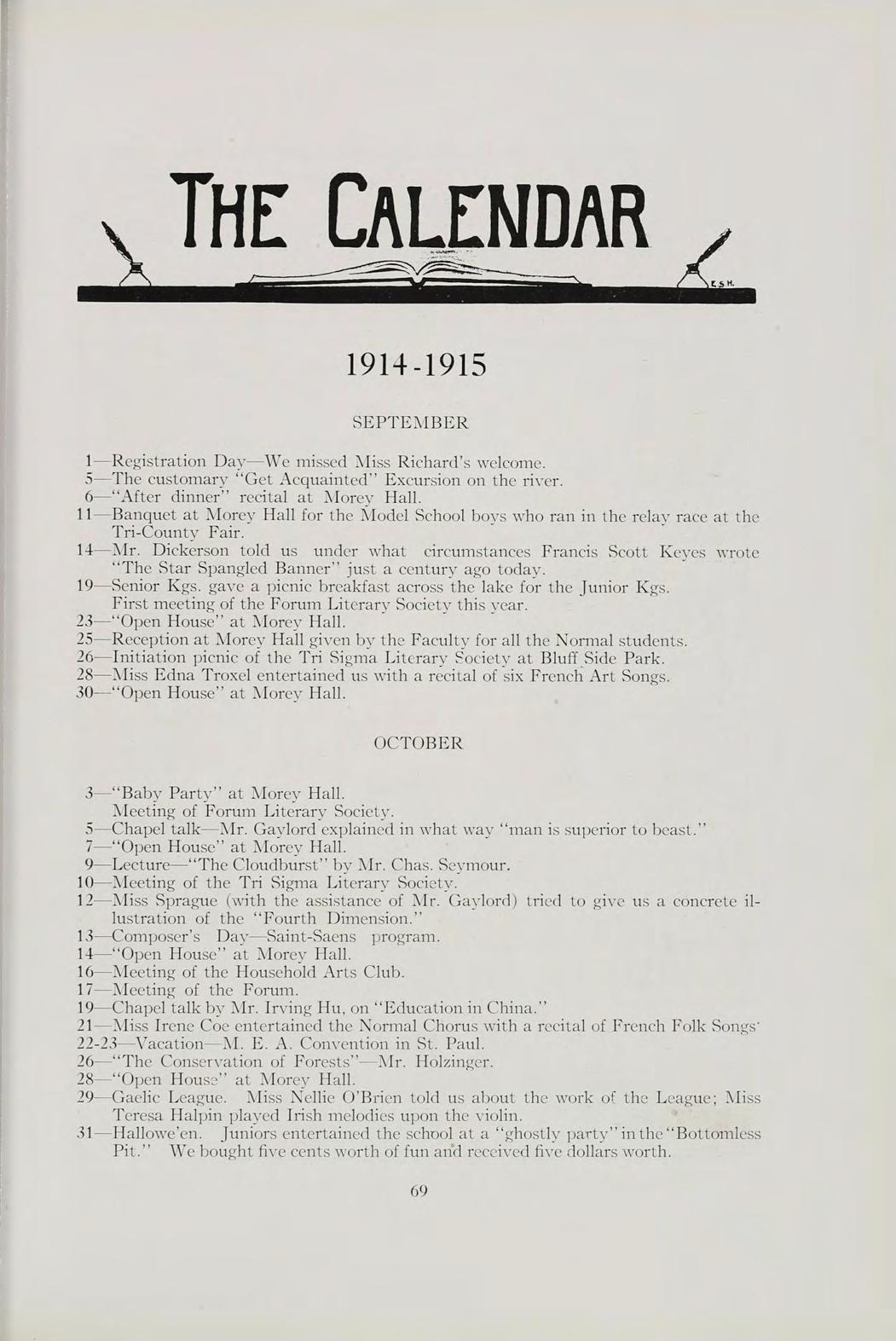
3—“Baby Party” at Morey Hall. Meeting of Forum Literary Society.
5—Chapel talk—Mr. Gaylord explained in what way “man is superior to beast.”
7—“Open House” at Morey Hall.
9—Lecture—“The Cloudburst” by Mr. Chas. Seymour.
10—Meeting of the Tri Sigma Literary Society.
12—Miss Sprague (with the assistance of Mr. Gaylord) tried to give us a concrete illustration of the “Fourth Dimension.”
13—Composer’s Day—Saint-Saens program.
14—“Open House” at Morey Hall.
16—Meeting of the Household Arts Club.
17—Meeting of the Forum.
19—Chapel talk by Mr. Irving Hu, on “Education in China.”
21—Miss Irene Coe entertained the Normal Chorus with a recital of French Folk Songs'
22-23—Vacation—M. E. A. Convention in St. Paul.
26—“The Conservation of Forests”—Mr. Holzinger.
28—“Open House” at Morey Hall.
29—Gaelic League. Miss Nellie O’Brien told us about the work of the League; Miss Teresa Halpin played Irish melodies upon the violin.
31—Hallowe’en. Juniors entertained the school at a “ghostly party” in the “Bottomless Pit.” We bought five cents worth of fun and received five dollars worth.
1—Miss Richards was welcomed back to Morey Hall.
2—Miss Richards related to a large audience this morning, her experiences in Europe before and after the outbreak of war. There were few dry eyes in the room when she had concluded, and the assembly rose to their feet to sing “America.”
4—“Open House” at Morey Hall.
6—Meeting ofthe Household Arts Club.
The County teachers held two meetings at the Normal School.
7—The Kindergarten Juniors gave a Hard Times Party in the gymnasium for the Senior Kindergarteners.
7—Open meeting ofthe Tri Sigma. Program: “Indian Life.”
9—MissGildemeister read us “golden thoughts” which she has gathered in her notebook from the books of today.
13—Composer’s Day-—Bizet program. The St. Cecilia Society sang “The Habanera” from “Carmen.”
14—Initiation service of the Y. W. C. A. Tri Sigma meeting. Forum meeting.
16—Chapel talk—“Universal Peace”—Mr. Moore.
18—“Open House” at Morey Hall. Mr. Mitchell from Lake City (Vesta’s “Scotty”) entertained the company with Scotch songs and stories.
19—Meeting of the Writer’s Club.
20—President Maxwell, his wife, and sons entertained the Senior Class at their home. Household Arts Club had a taffy pull.
21—Mr. Maxwell’s hospitality was continued this evening for the benefit of those who were not present last evening. Tri Sigma meeting.
23—Chapel talk—“Effect ofthe war on U. S. Commerce” by Mr. Abram.
24—Dinner for graduates at Morey Hall. Graduation exercises. “Lucky girls!”
25—30—Thanksgiving vacation.
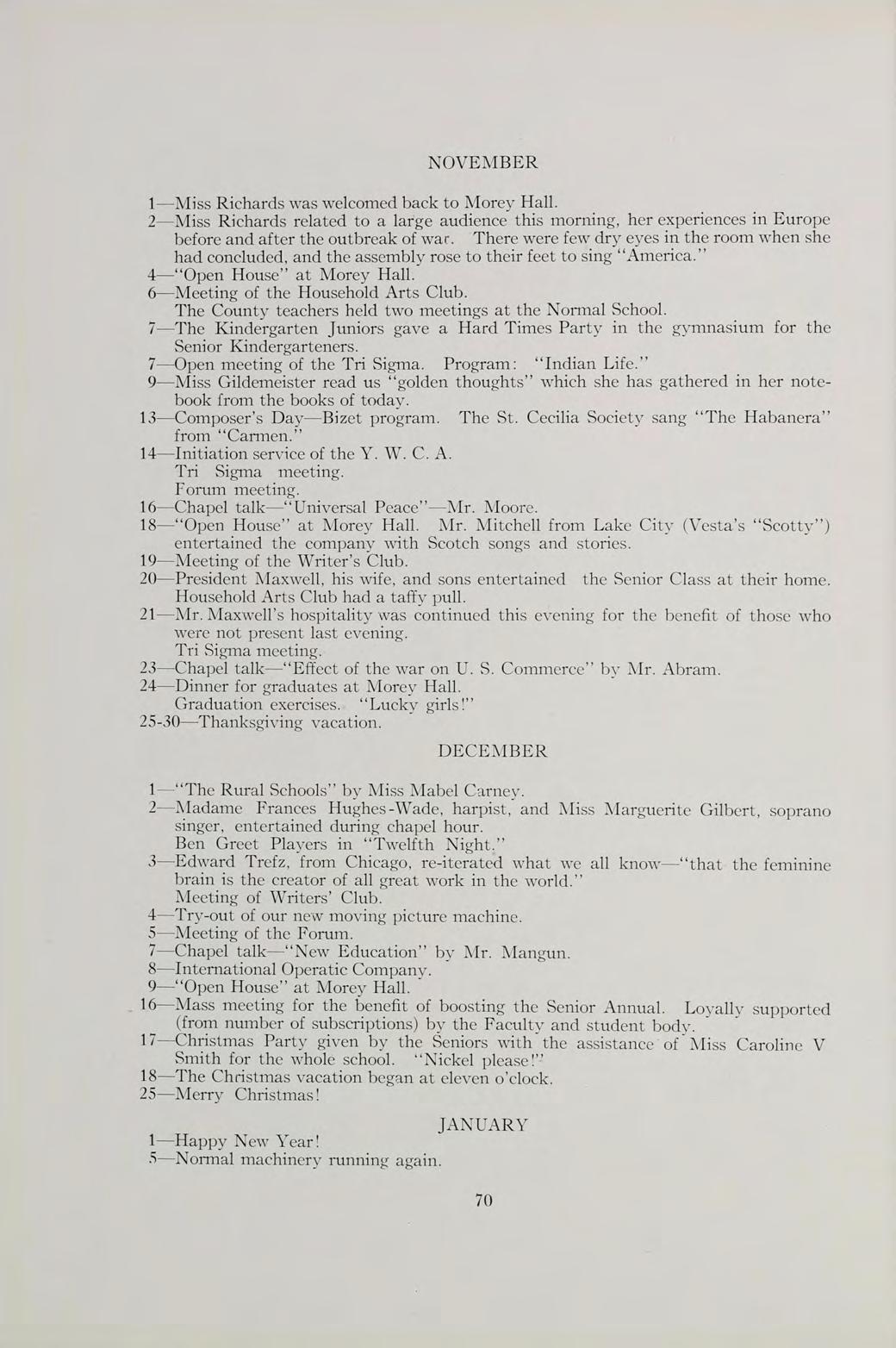
1—“The Rural Schools” by Miss Mabel Carney.
2—Madame Frances Hughes-Wade, harpist, and Miss Marguerite Gilbert, soprano singer, entertained during chapel hour.
Ben Greet Players in “Twelfth Night.”
3—Edward Trefz, from Chicago, re-iterated what we all know—“that the feminine brain is the creator of all great work in the world.” Meeting of Writers’ Club.
4—Try-out of our new moving picture machine.
5—Meeting ofthe Forum.
7—Chapel talk—“New Education” by A4r. Mangun.
8—International Operatic Company.
9—-“Open House” at Morey Hall.
16—Mass meeting for the benefit of boosting the Senior Annual. Loyally supported (from number of subscriptions) by the Faculty and student body.
17—Christmas Party given by the Seniors with the assistance of Miss Caroline V Smith for the whole school. “Nickel please!”
18—The Christmas vacation began at eleven o’clock.
25—Merry Christmas!
1—Happy New Year!
5—Normal machinery running again.
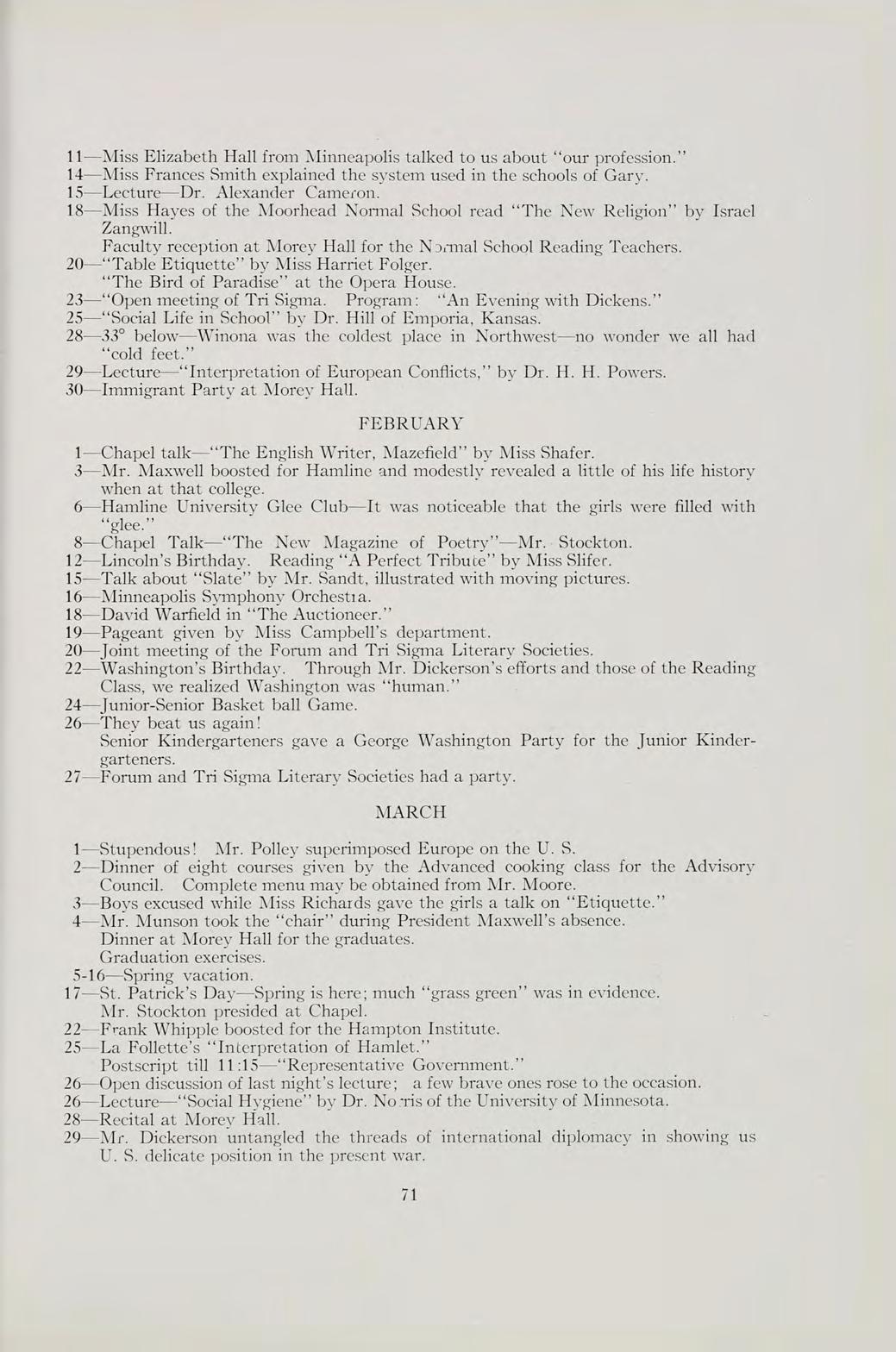
11—Miss Elizabeth Hall from Minneapolis talked to us about “our profession.”
14-—Miss Frances Smith explained the system used in the schools of Gary.
15—Lecture—Dr. Alexander Cameron.
18—Miss Hayes ofthe Moorhead Normal School read “The New Religion” by Israel Zangwill.
Faculty reception at Morey Hall for the N Denial School Reading Teachers.
20—“Table Etiquette” by Miss Harriet Folger. “The Bird of Paradise” at the Opera House.
23—“Openmeeting of Tri Sigma. Program: “An Evening with Dickens.”
25—“Social Life in School” by Dr. Hill of Emporia, Kansas.
28——33° below—Winona was the coldest place in Northwest—no wonder we all had “cold feet.”
29—Lecture—“Interpretation of European Conflicts,” by Dr. H. H. Powers.
30—Immigrant Party at Morey Hall.
1—Chapel talk—“The English Writer, Mazefield” by Miss Shafer.
3—Mr. Maxwell boosted for Hamline and modestly revealed a little of his life history when at that college.
6—Hamline University Glee Club—It was noticeable that the girls were filled with “glee.”
8—Chapel Talk—“The New Magazine of Poetry”—Mr. Stockton.
12-—Lincoln’s Birthday. Reading “A Perfect Tribute” by Miss Slifer.
15—Talk about “Slate” by Mr. Sandt, illustrated with moving pictures.
16—Minneapolis Symphony Orchestia.
18——David Warfield in “The Auctioneer.”
19—Pageant given by Miss Campbell’s department.
20—Joint meeting ofthe Forum and Tri Sigma Literary Societies.
22—Washington’s Birthday. Through Mr. Dickerson’sefforts and those ofthe Reading Class, we realized Washington was “human.”
24—Junior-Senior Basket ball Game.
26—They beat us again!
Senior Kindergarteners gave a George Washington Party for the Junior Kindergarteners.
2 7-—Forum and Tri Sigma Literary Societies had a party.
1—Stupendous! Mr. Polley superimposed Europe on the U. S.
2—Dinner of eight courses given by the Advanced cooking class for the Advisory Council. Complete menu may be obtained from Mr. Moore.
3—Boys excused while Miss Richards gave the girls a talk on “Etiquette.”
4—Mr. Munson took the “chair” during President Maxwell’s absence. Dinner at Morey Hall for the graduates. Graduation exercises.
5— 16—Spring vacation.
17—St. Patrick’s Day-—Spring is here; much “grass green” was in evidence. Mr. Stockton presided at Chapel.
22- Frank Whipple boosted for the Hampton Institute.
25—La Follette’s “Interpretation of Hamlet.”
Postscript till 11:15—“Representative Government.”
26—Open discussion of last night’s lecture; a few brave ones rose to the occasion.
26—Lecture—“Social Hygiene” by Dr. No 'ris of the University of Minnesota.
28—Recital at Morey Hall.
29—Mr. Dickerson untangled the threads of international diplomacy in showing us U. S. delicate position in the present war.
1—“April Fool!” Beware of Miss Guernsey. “Etiquette of Travel” by Mrs. Stott.
2—Good Friday—vacation.
4—Easter. Early morning carols and an egg hunt on lawn at Morey Hall.
5—Chapel talk—-“Relation of the Mental to the Physical” by Miss Samson.
8—The Normal students had the opportunity of enjoying John Drew in “Rosemary.”
12—Miss Guernsey’s talk “Concentrated Thought” was “not psychological, educational, pedagogical, nor kindergartenical.”
13—“Etiquette in Public Places” by Mrs. Abbott.
14—“Oh dem Hampton Singers!”
Mr. Schuman from Argentine Republic, South America, told us of the work of Winona graduates there.
15—Mr. Spaulding, superintendent of schools, from Minneapolis.
17—Formal “Open House” reception at Morey Hall.
19—Chapel talk—“The Kindergarten” by Miss Abbott.
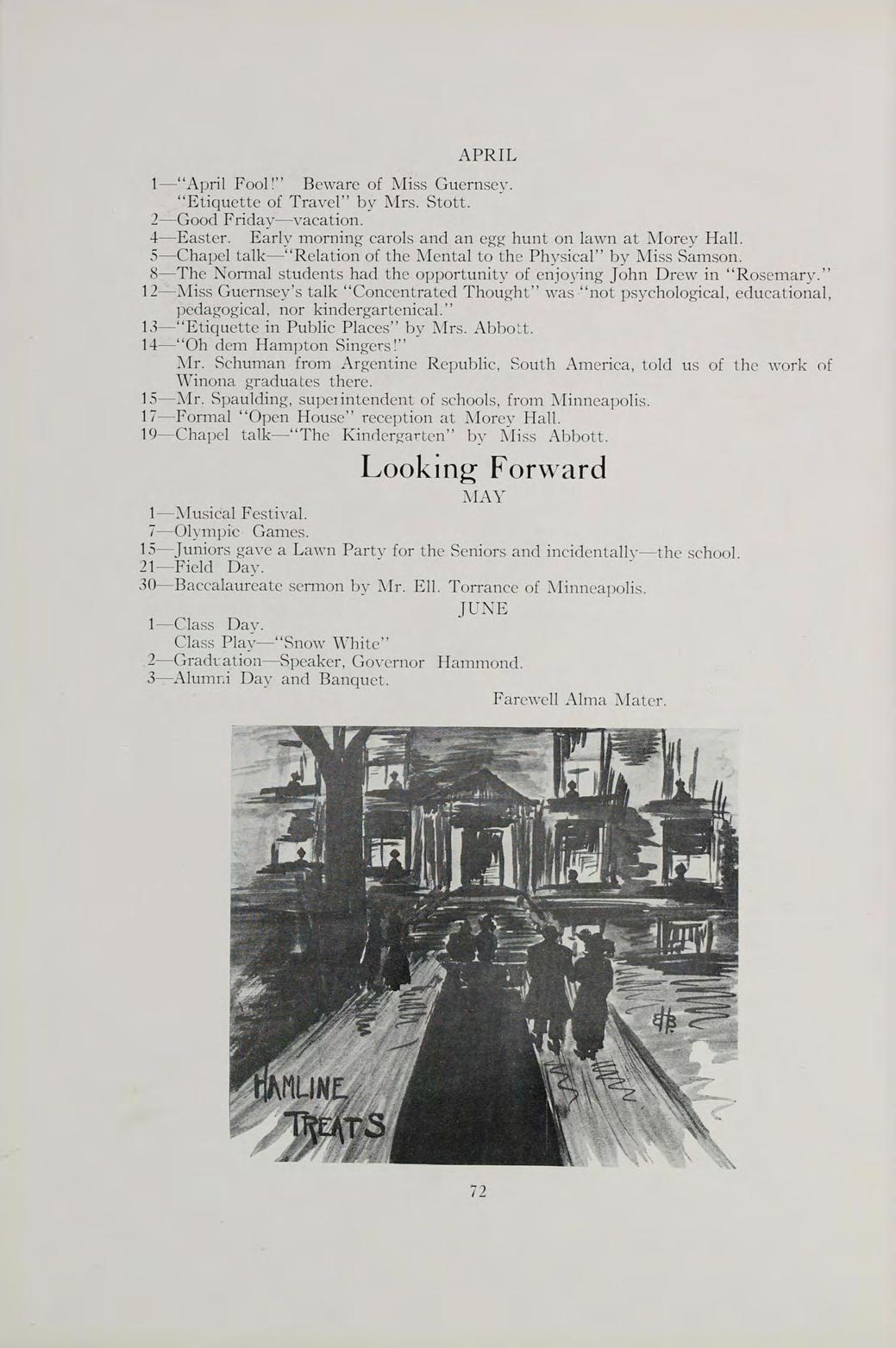
1-—Musical Festival.
7—Olympic Games.
15—Juniors gave a Lawn Party for the Seniors and incidentally—the school.
21—Field Day.
30—Baccalaureate sermon by Mr. Ell. Torrance of Minneapolis.
JUNE
1—Class Day.
Class Play—“Snow White”
2—Graduation—Speaker, Governor Hammond.
3—Alumni Day and Banquet.
Farewell Alma Mater.
THE most enjoyable event of the year, was the Christmas festival given by the Seniors for the members of the Faculty, Junior and High School classes on the evening of December 17, 1914, which was the night before school closed for the holiday vacation.
Much to the Seniors’ credit, the evening’s entertainment was kept secret, and we met in the assembly room early in the evening, full of anticipation.
An interesting program had been arranged by Miss Smith. The first three numbers were French Christmas carols sung by Miss Troxel, a carol by the Mendelssohn Club, and a reading by Miss Slifer, “The Christ Child,” during which a beautiful picture of the Child was thrown on the screen. Then a reading, describing the journey of the Wise Men to the Bethlehem stable, was given by Irene Ehmke, accompanied by pictures by the world’s famous artists. As a particularly beautiful one of the Infant in the manger was shown, the music of Stilly Night was played, and all present sang that lovely song. It was a fitting climax to the program.
If anyone present had entered that room without the Christmas spirit, it is certain that he did not leave it thus, for if the readings and pictures had failed to stir the spirit within him, the soft clear tones of Stilly Night surely did so.
After the program, we were invited to proceed to the gymnasium via the tunnel. Each person received a card with a mysterious number which he was told to keep until later. To our surprise, as we entered the gym, we beheld an enormous Christmas tree, beautifully trimmed, and glittering with electric lights. Then in came jolly, old Santa Claus in the person of Mr. Holzinger, just arrived from the North Pole. He established himself by the cozy fire-place, and with joking comments distributed the bulging stockings to the Faculty, each of which contained a token of their life “hobby.” The merriment was at its height when we saw Mr. Polley draw from his stocking, a new globe; Miss Smith, a music box; Mr. Munson, the latest book on butterflies; President Maxwell, a horn to toot, and Harris Pett, a complete miniature toilet set. Santa rememberd even the babies of the Faculty with rattles.
There were some presents asked for, which Santa Claus, much to his chagrin, could not supply. Could any of our dear readers help him out?
Hon. Santa Claus:
I’m badly in need of a few bass voices to relieve the dear, sweet, patient, lovely girls of the St. Cecilia Society. If it is agreeable to you, will you help me out there?
Dear Santa Claus:

Caroline V. Smith.
We’re five little playmates and we are trying to play basket ball. We have everything but a ball that will go into the basket. Will you bring us one? That’s all this time, but send it before the next game if you can.
The Basket Ball Team.
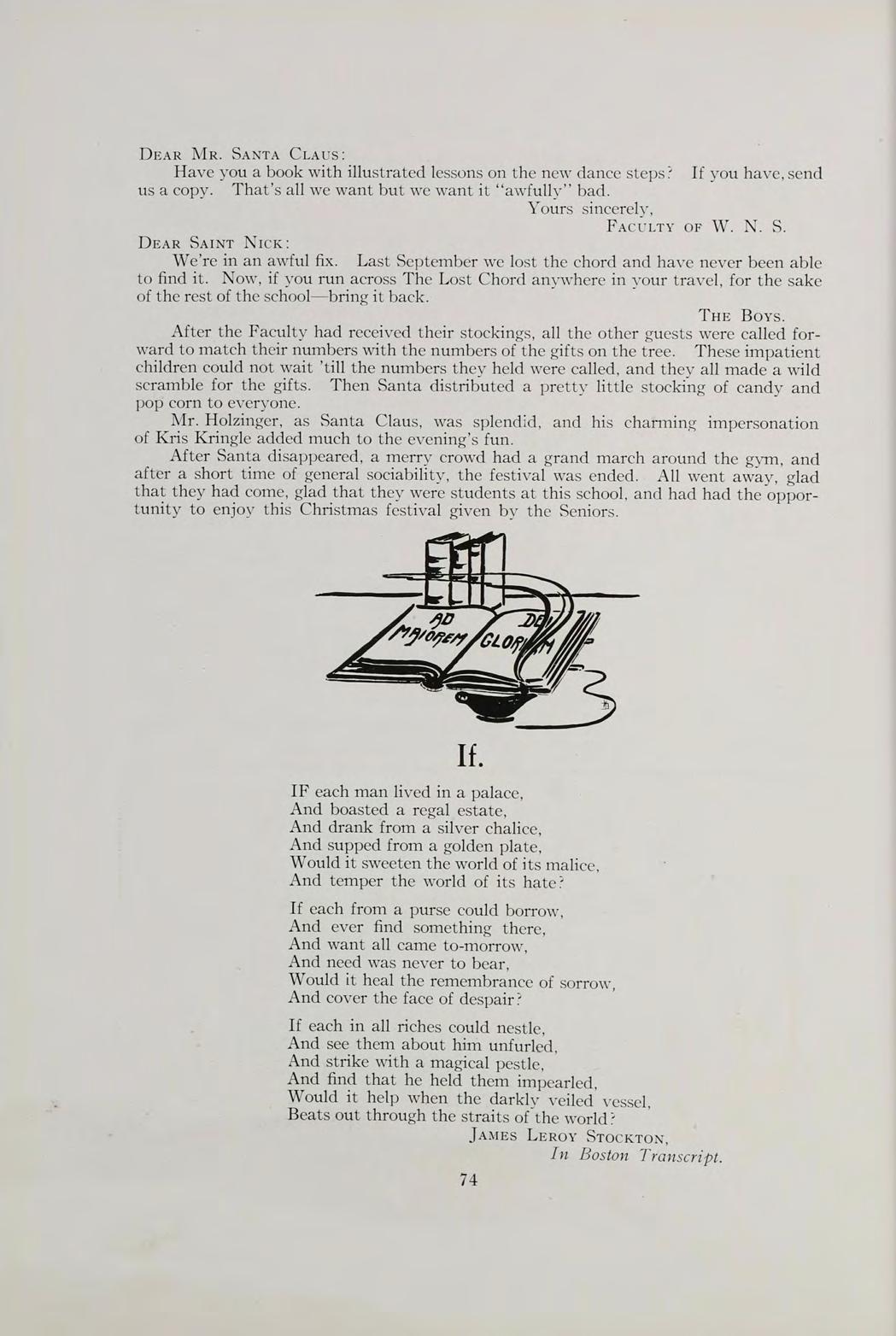
Dear Mr. Santa Claus:
Have you a book with illustrated lessons on the new dance steps ? If you have, send us a copy. That’s all we want but we want it “awfully” bad.
Yours sincerely, Faculty of W. N. S. Dear Saint Nick:
We’re in an awful fix. Last September we lost the chord and have never been able to find it. Now, if you run across The Lost Chord anywhere in your travel, for the sake of the rest of the school—bring it back.
The Boys.
After the Faculty had received their stockings, all the other guests were called forward to match their numbers with the numbers of the gifts on the tree. These impatient children could not wait ’till the numbers they held were called, and they all made a wild scramble for the gifts. Then Santa distributed a pretty little stocking of candy and pop corn to everyone.
Mr. Holzinger, as Santa Claus, was splendid, and his charming impersonation of Kris Kringle added much to the evening’s fun.
After Santa disappeared, a merry crowd had a grand march around the gym, and after a short time of general sociability, the festival was ended. All went away, glad that they had come, glad that they were students at this school, and had had the opportunity to enjoy this Christmas festival given by the Seniors.
If.IF each man lived in a palace, And boasted a regal estate, And drank from a silver chalice, And supped from a golden plate, Would it sweeten the world of its malice, And temper the world of its hate?
If each from a purse could borrow, And ever find something there, And want all came to-morrow, And need was never to bear, Would it heal the remembrance of sorrow, And cover the face of despair?
If each in all riches could nestle, And see them about him unfurled, And strike with a magical pestle, And find that he held them impearled, Would it help when the darkly veiled vessel, Beats out through the straits of the world?
James Leroy Stockton, In Boston Transcript.
My dier cozin:
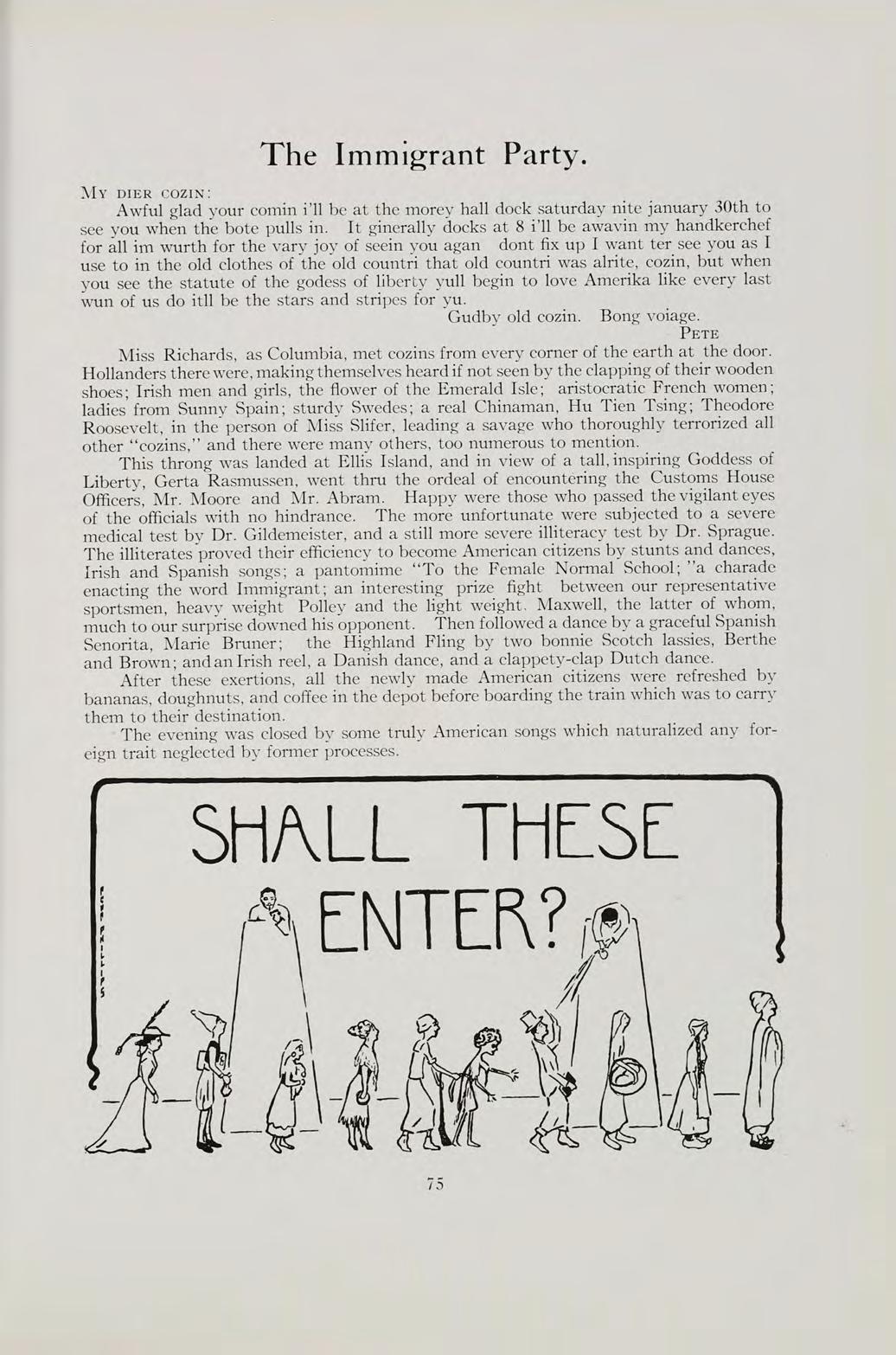
Awful glad your comin i’ll be at the morey hall dock Saturday nite January 30th to see you when the bote pulls in. It ginerally docks at 8 i’ll be awavin my handkerchef for all im wurth for the vary joy of seein you agan dont fix up I want ter see you as I use to in the old clothes of the old eountri that old countri was alrite, cozin, but when you see the statute of the godess of liberty yull begin to love Amerika like every last wun of us do itll be the stars and stripes for yu.
Gudby old cozin. Bong voiage. Pete
Miss Richards, as Columbia, met cozins from every corner of the earth at the door. Hollanders there were, making themselves heard if not seen by the clapping of their wooden shoes; Irish men and girls, the flower of the Emerald Isle; aristocratic French women; ladies from Sunny Spain; sturdy Swedes; a real Chinaman, Hu Tien Tsing; Theodore Roosevelt, in the person of Miss Slifer, leading a savage who thoroughly terrorized all other “cozins,” and there were many others, too numerous to mention.
This throng was landed at Ellis Island, and in view of a tall, inspiring Goddess of Liberty, Gerta Rasmussen, went thru the ordeal of encountering the Customs House Officers, Mr. Moore and Mr. Abram. Happy were those who passed the vigilant eyes of the officials with no hindrance. The more unfortunate were subjected to a severe medical test by Dr. Gildemeister, and a still more severe illiteracy test by Dr. Sprague. The illiterates proved their efficiency to become American citizens by stunts and dances, Irish and Spanish songs; a pantomime “To the Female Normal School; ”a charade enacting the word Immigrant; an interesting prize fight between our representative sportsmen, heavy weight Polley and the light weight. Maxwell, the latter of whom, much to our surprise downed his opponent. Then followed a dance by a graceful Spanish Senorita, Marie Bruner; the Highland Fling by two bonnie Scotch lassies, Berthe and Brown; and an Irish reel, a Danish dance, and a clappety-clap Dutch dance.
After these exertions, all the newly made American citizens were refreshed by bananas, doughnuts, and coffee in the depot before boarding the train which was to carry them to their destination.
The evening was closed by some truly American songs which naturalized any foreign trait neglected by former processes.
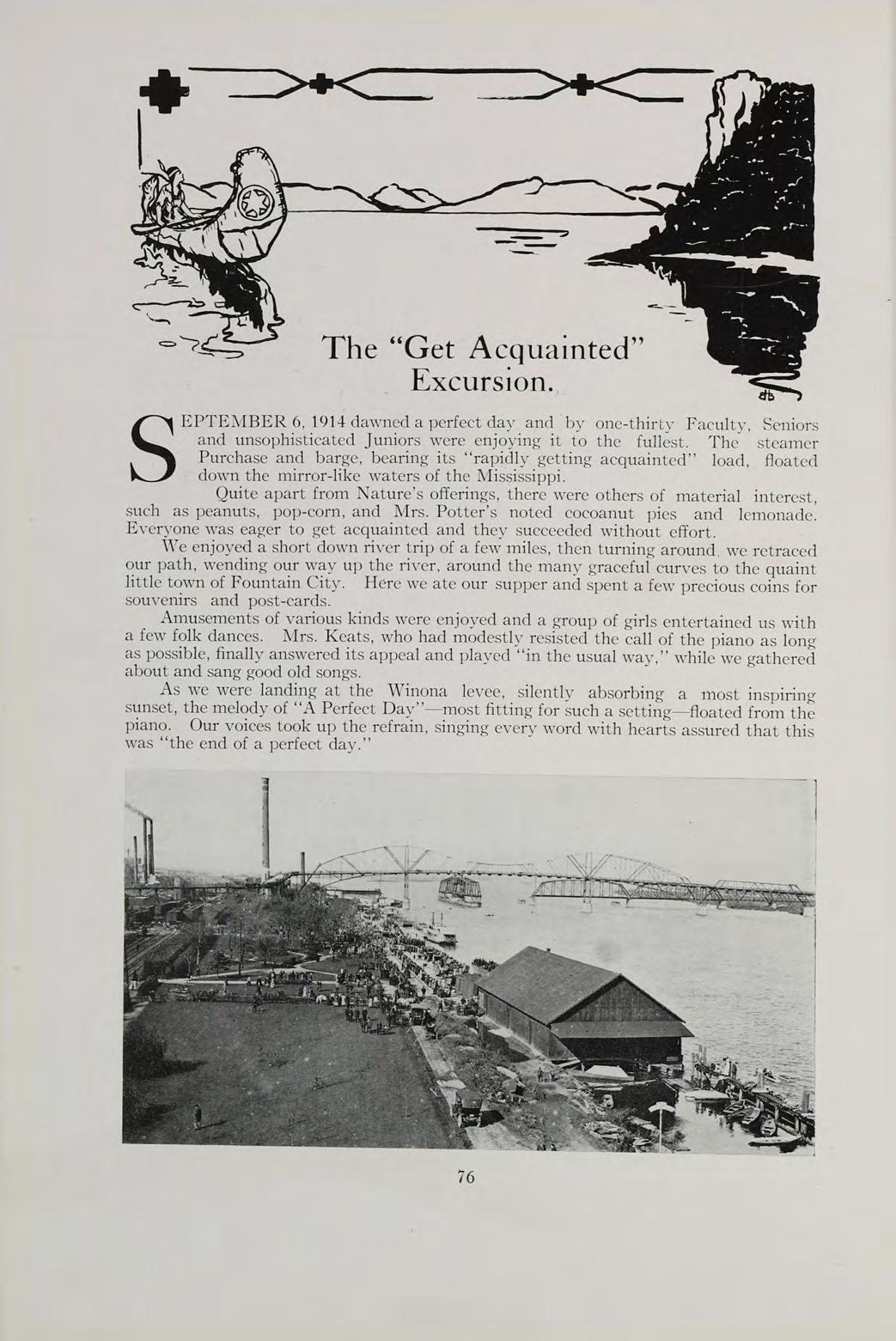
SEPTEMBER 6, 1914 dawned a perfect day and by one-thirty Faculty, Seniors and unsophisticated Juniors were enjoying it to the fullest. The steamer Purchase and barge, bearing its “rapidly getting acquainted’’ load, floated down the mirror-like waters of the Mississippi.
Quite apart from Nature’s offerings, there were others of material interest, such as peanuts, pop-corn, and Mrs. Potter’s noted cocoanut pies and lemonade. Everyone was eager to get acquainted and they succeeded without effort.
We enjoyed a short down river trip of a few miles, then turning around, we retraced our path, wending our way up the river, around the many graceful curves to the quaint little town of Fountain City. Here we ate our supper and spent a few precious coins for souvenirs and post-cards.
Amusements of various kinds were enjoyed and a group of girls entertained us with a few folk dances. Mrs. Keats, who had modestly resisted the call of the piano as long as possible, finally answered its appeal and played “in the usual way,” while we gathered about and sang good old songs.
As we were landing at the Winona levee, silently absorbing a most inspiring sunset, the melody of “A Perfect Day”—most fitting for such a setting—floated from the piano. Our voices took up the refrain, singing every word with hearts assured that this was “the end of a perfect day.”
Berthe Tolleson Hawley Brooks Keckefoth Niehaus Carlson Gallagher
Baker Sherwood Mitchell Hart Mac Lean Perry Wheelock Conrad Brown Noltimier Bailey Maxwell Snyder Simpson Hinderman
SNOW WHITE AND THE SEVEN DWARFS by Jessie Braham White
“White as snow, red as blood, and black as ebony.’’
Oueen Brangomar, step-mother to Snow White
Princess Snow White
Rosalys
Amelotte
Ermengarde
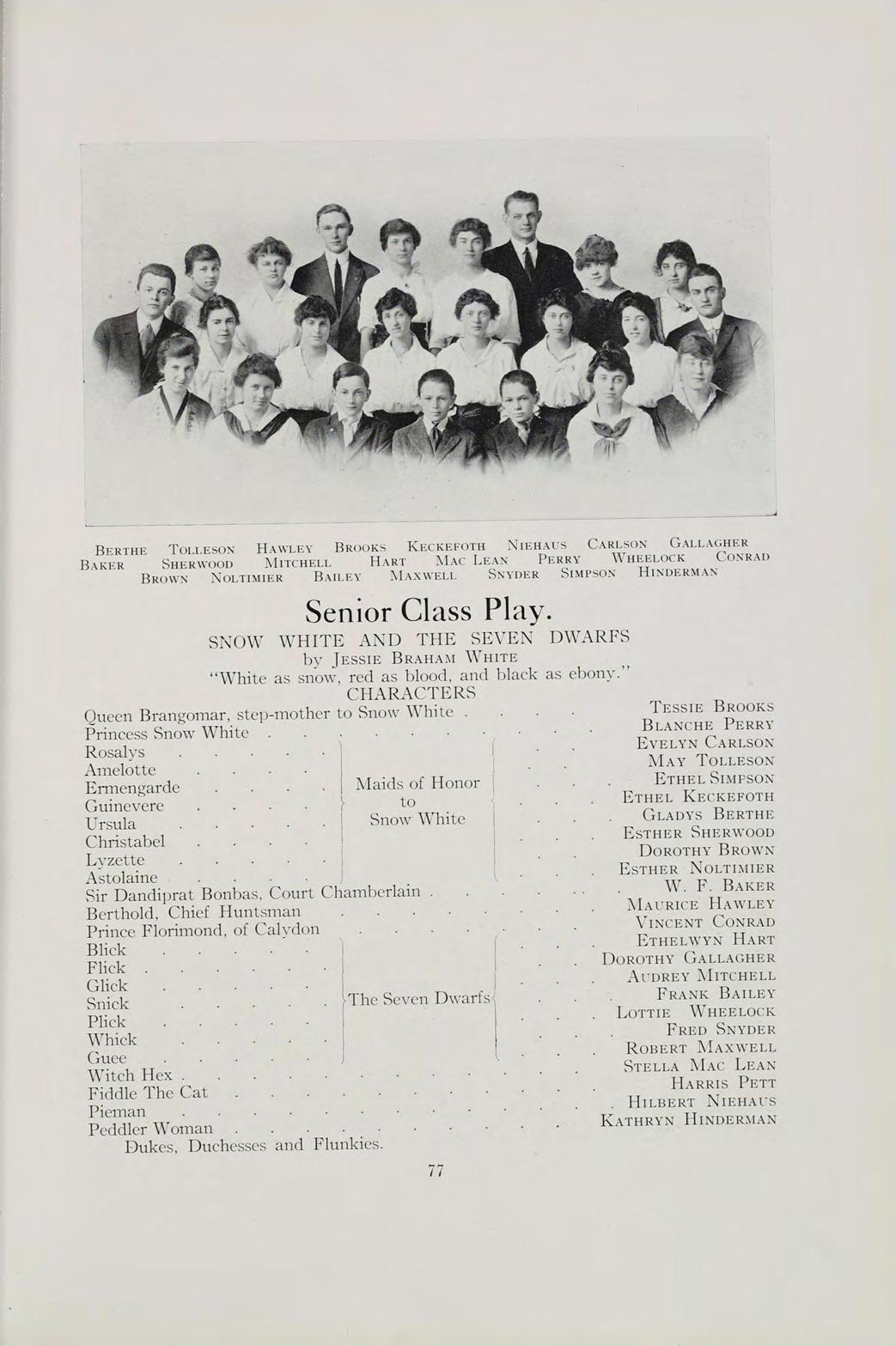
Maids of Honor
Guinevere r to
Ursula | Snow White
Christabel
Lyzette
Astolaine
Sir Dandiprat Bonbas, Court Chamberlain
Berthold, Chief Huntsman
Prince Florimond, of Calvdon
Blick
Flick
Click
Snick
Plick
Whick
Guee j
Witch Hex
Fiddle The Cat
Pieman
The Seven Dwarfs
Peddler Woman Dukes, Duchesses and Flunkies.
Tessie Brooks
Blanche Perry
Evelyn Carlson
May Tolleson
Ethel Simpson
Ethel Keckefoth
Gladys Berthe
Esther Sherwood
Dorothy Brown
Esther Noltimier
W. F. Baker
Maurice Hawley
Vincent Conrad
Ethelwyn Hart
Dorothy Gallagher
Audrey Mitchell
Frank Bailey
Lottie Wheelock
Fred Snyder
Robert Maxwell
Stella Mac Lean
Harris Pett
Hilbert Niehaus
Kathryn Hinderman
The Death Disk
A Critical Situation
Miss Blanche Perry
Mr. Hilbert Niehaus
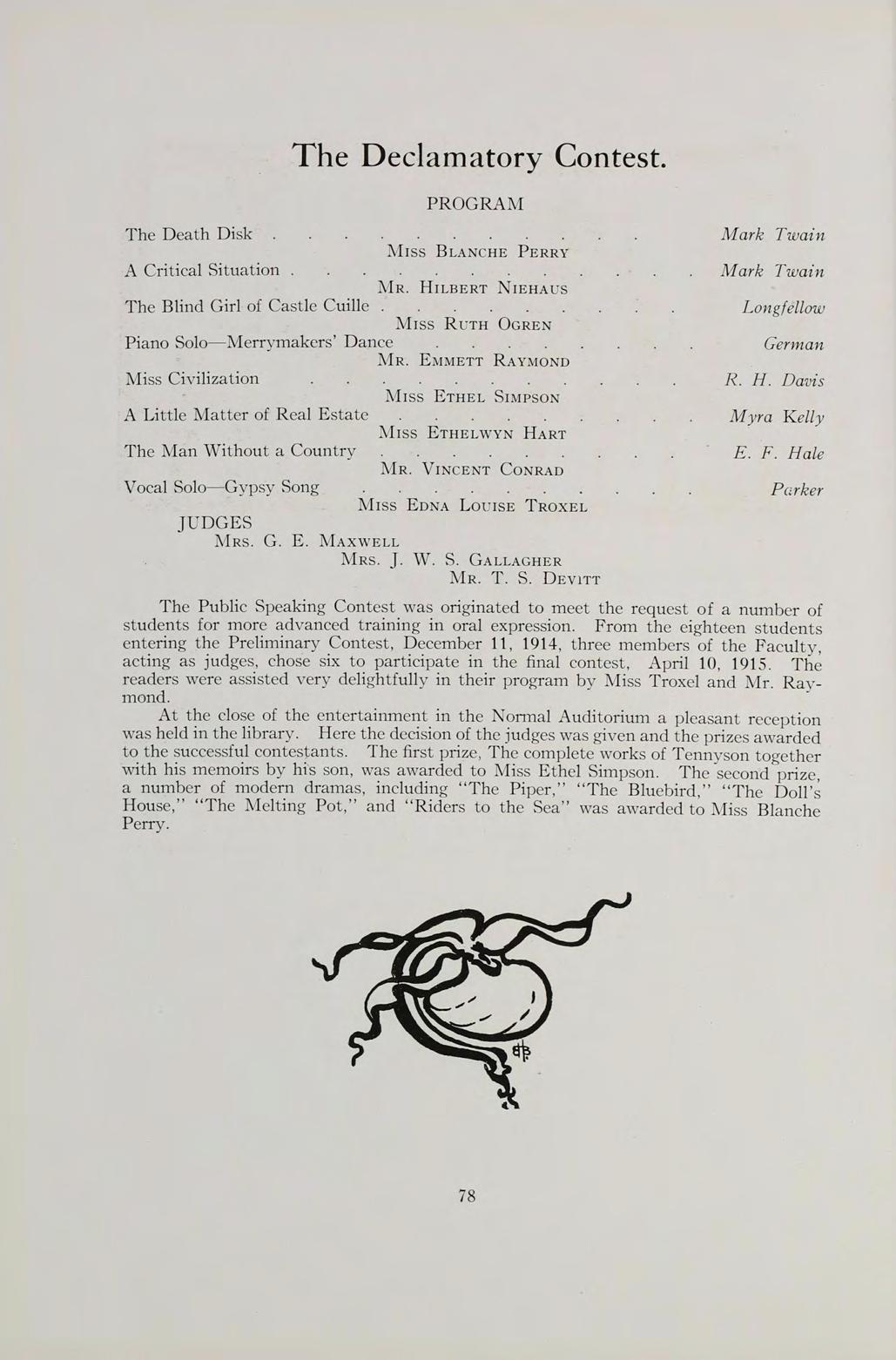
The Blind Girl of Castle Cuille
Piano Solo—Merrymakers’ Dance
Miss Civilization
A Little Matter of Real Estate
The Man Without a Country
Vocal Solo—Gypsy Song
Mark Twain
Mark Twain
Miss Ruth Ogren Longfellow
Mr. Emmett Raymond German
Miss Ethel Simpson
Miss Ethelwyn Hart
Mr. Vincent Conrad
Miss Edna Louise Troxel JUDGES
Mrs. G. E. Maxwell
Mrs. J. W. S. Gallagher
R. H. Davis
Myra Kelly
E. F. Hale
Mr. T. S. Devitt Parker
The Public Speaking Contest was originated to meet the request of a number of students for more advanced training in oral expression. From the eighteen students entering the Preliminary Contest, December 11, 1914, three members of the Faculty, acting as judges, chose six to participate in the final contest, April 10, 1915. The readers were assisted very delightfully in their program by Miss Troxel and Mr. Ray- mond.
At the close of the entertainment in the Normal Auditorium a pleasant reception was held in the library. Here the decision of the judges was given and the prizes awarded to the successful contestants. The first prize, The complete works of Tennyson together with his memoirs by his son, was awarded to Miss Ethel Simpson. The second prize, a number of modern dramas, including “The Piper,” “The Bluebird,” “The Doll’s House,” “The Melting Pot,” and “Riders to the Sea” was awarded to Miss Blanche Perry.
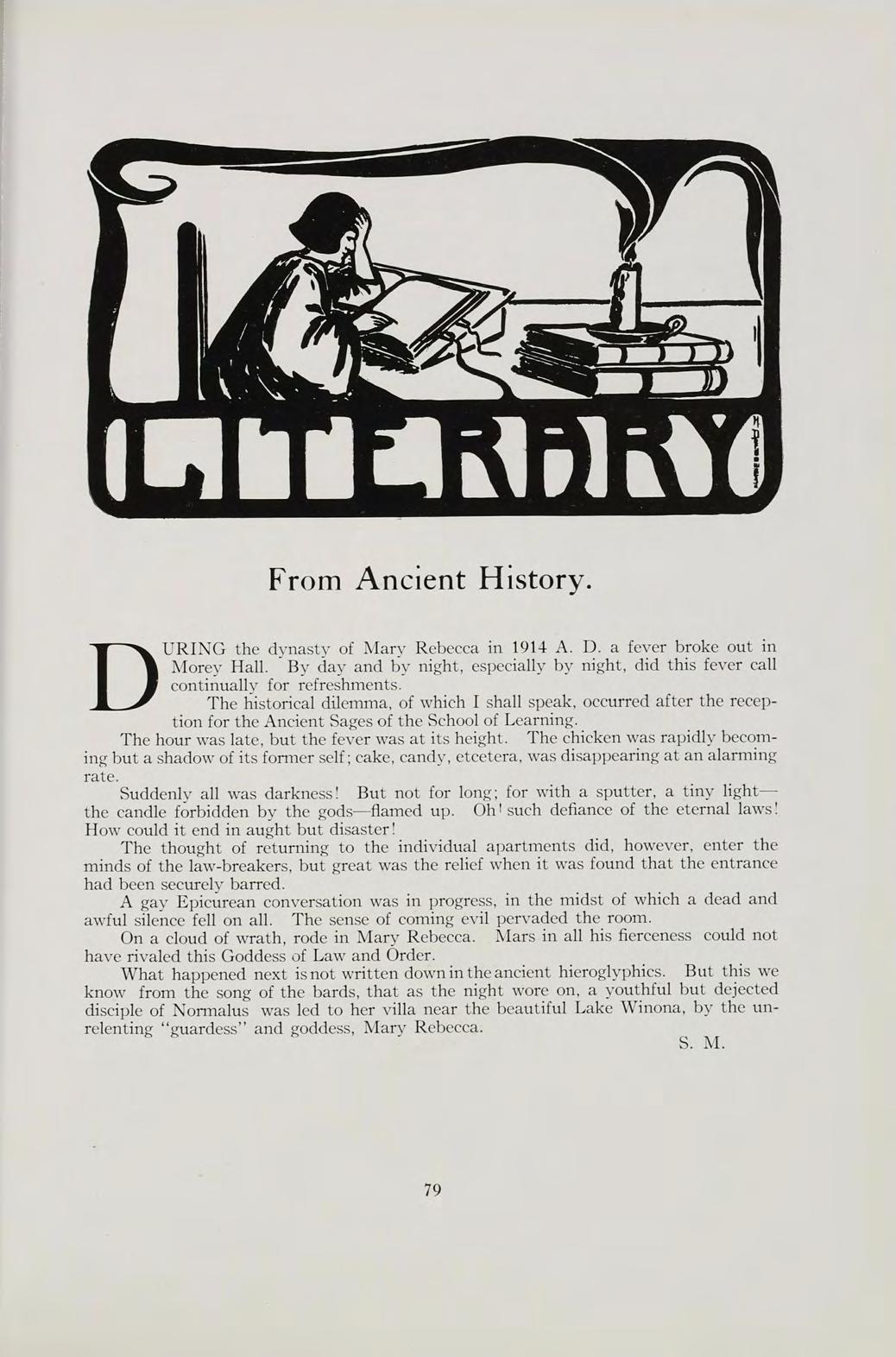
DURING the dynasty of Mary Rebecca in 1914 A. D. a fever broke out in Morey Hall. By day and by night, especially by night, did this fever call continually for refreshments.
The historical dilemma, of which I shall speak, occurred after the reception for the Ancient Sages of the School of Learning.
The hour was late, but the fever was at its height. The chicken was rapidly becoming but a shadow of its former self; cake, candy, etcetera, was disappearing at an alarming rate.
Suddenly all was darkness! But not for long; for with a sputter, a tiny light— the candle forbidden by the gods—flamed up. Oh 1 such defiance of the eternal laws! How could it end in aught but disaster!
The thought of returning to the individual apartments did, however, enter the minds of the law-breakers, but great was the relief when it was found that the entrance had been securely barred.
A gay Epicurean conversation was in progress, in the midst of which a dead and awful silence fell on all. The sense of coming evil pervaded the room.
On a cloud of wrath, rode in Mary Rebecca. Mars in all his fierceness could not have rivaled this Goddess of Law and Order.
What happened next is not written down in the ancient hieroglyphics. But this we know from the song of the bards, that as the night wore on, a youthful but dejected disciple of Normalus was led to her villa near the beautiful Lake Winona, by the unrelenting “guardess” and goddess, Marv Rebecca.
S. M.
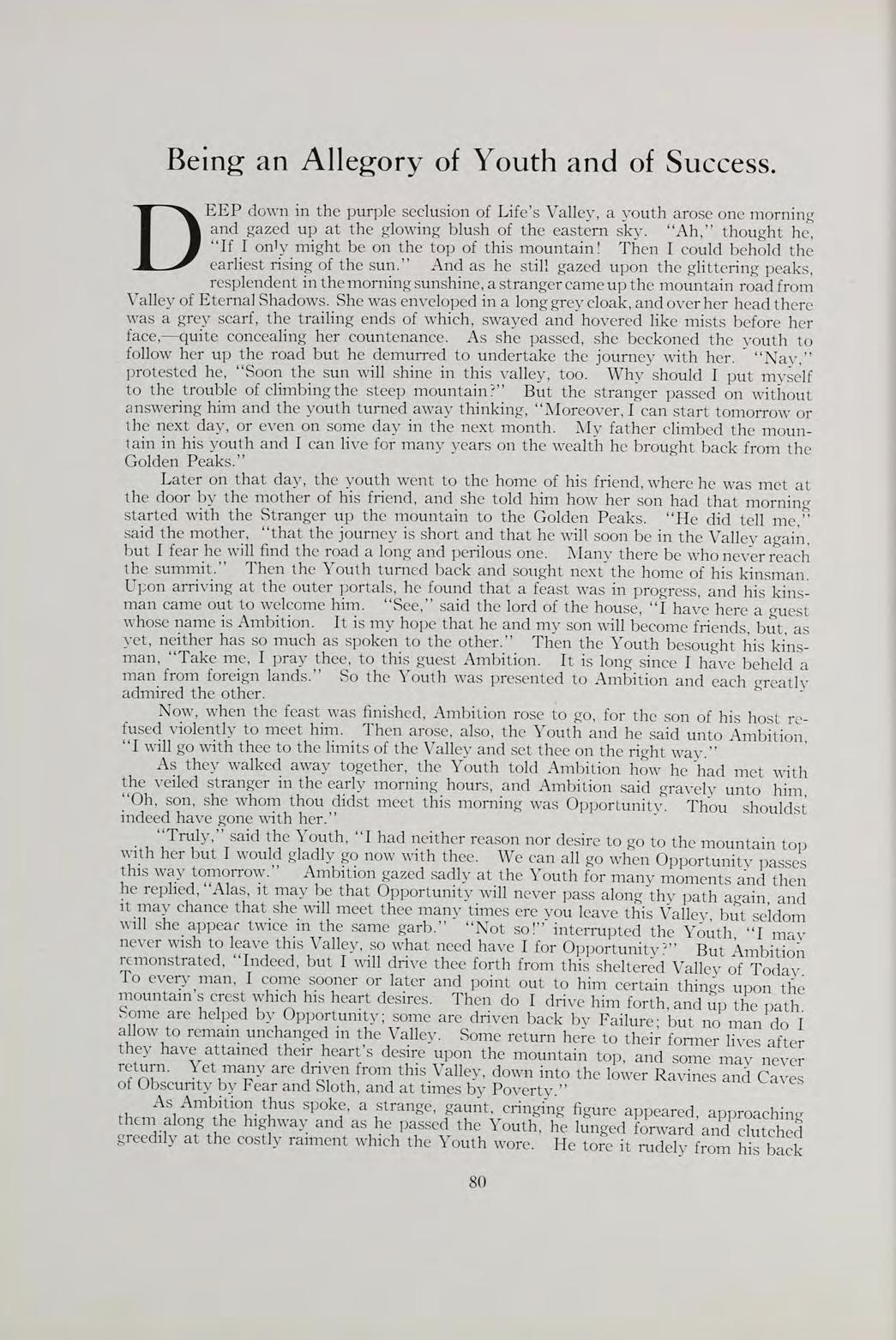
DEEP down in the purple seclusion of Life’s Valley, a youth arose one morning and gazed up at the glowing blush of the eastern sky. “Ah,” thought he, “If I only might be on the top of this mountain! Then I could behold the earliest rising of the sun.” And as he still gazed upon the glittering peaks, resplendent in the morning sunshine, a stranger came up the mountain road from Valley of Eternal Shadows. She was enveloped in a long grey cloak, and over her head there was a grey scarf, the trailing ends of which, swayed and hovered like mists before her face,—quite concealing her countenance. As she passed, she beckoned the youth to follow her up the road but he demurred to undertake the journey with her. “Nay,” protested he, “Soon the sun will shine in this valley, too. Why should I put myself to the trouble of climbing the steep mountain?” But the stranger passed on without answering him and the youth turned away thinking, “Moreover, I can start tomorrow or the next day, or even on some day in the next month. My father climbed the mountain in his youth and I can live for many years on the wealth he brought back from the Golden Peaks.”
Later on that day, the youth went to the home of his friend, where he was met at the door by the mother of his friend, and she told him how her son had that morning started with the Stranger up the mountain to the Golden Peaks. “He did tell me,” said the mother, “that the journey is short and that he will soon be in the Valley again, but I fear he will find theroad a long and perilous one. Many there be who never reach the summit.” Then the Youth turned back and sought next the home of his kinsman. Upon arriving at the outer portals, he found that a feast was in progress, and his kinsman came out to welcome him. “See,” said the lord of the house, “I have here a guest whose name is Ambition. It is my hope that he and my son will become friends, but, as yet, neither has so much as spoken to the other.” Then the Youth besought his kinsman, “Take me, I pray thee, to this guest Ambition. It is long since I have beheld a man from foreign lands.” So the Youth was presented to Ambition and each greatly admired the other.
Now, when the feast was finished, Ambition rose to go, for the son of his host refused violently to meet him. Then arose, also, the Youth and he said unto Ambition, “I will go with thee to the limits of the Valley and set thee on the right way.”
As they walked away together, the Youth told Ambition how he had met with the veiled stranger in the early morning hours, and Ambition said gravely unto him, “Oh, son, she whom thou didst meet this morning was Opportunity. Thou shouldst indeed have gone with her.”
“Truly,” said the Youth, “I had neither reason nor desire to go to the mountain top with her but I would gladly go now with thee. We can all go when Opportunity passes this way tomorrow.” Ambition gazed sadly at the Youth for many moments and then he replied, “Alas, it may be that Opportunity will never pass along thy path again, and it may chance that she will meet thee many times ere you leave this Valley, but seldom will she appear twice in the same garb.” “Not so!” interrupted the Youth, “I may never wish to leave this Valley, so what need have I for Opportunity?” But Ambition remonstrated, “Indeed, but I will drive thee forth from this sheltered Valley of Today. To every man, I come sooner or later and point out to him certain things upon the mountain’s crest which his heart desires. Then do I drive him forth, and up the path. Some are helped by Opportunity; some are driven back by Failure; but no man do I allow to remain unchanged in the Valley. Some return here to their former lives after they have attained their heart’s desire upon the mountain top, and some may never return. Yet many are driven from this Valley, down into the lower Ravines and Caves of Obscurity by Fear and Sloth, and at times by Poverty.”
As Ambition thus spoke, a strange, gaunt, cringing figure appeared, approaching them along the highway and as he passed the Youth, he lunged forward and clutched greedily at the costly raiment which the Youth wore. He tore it rudely from his back
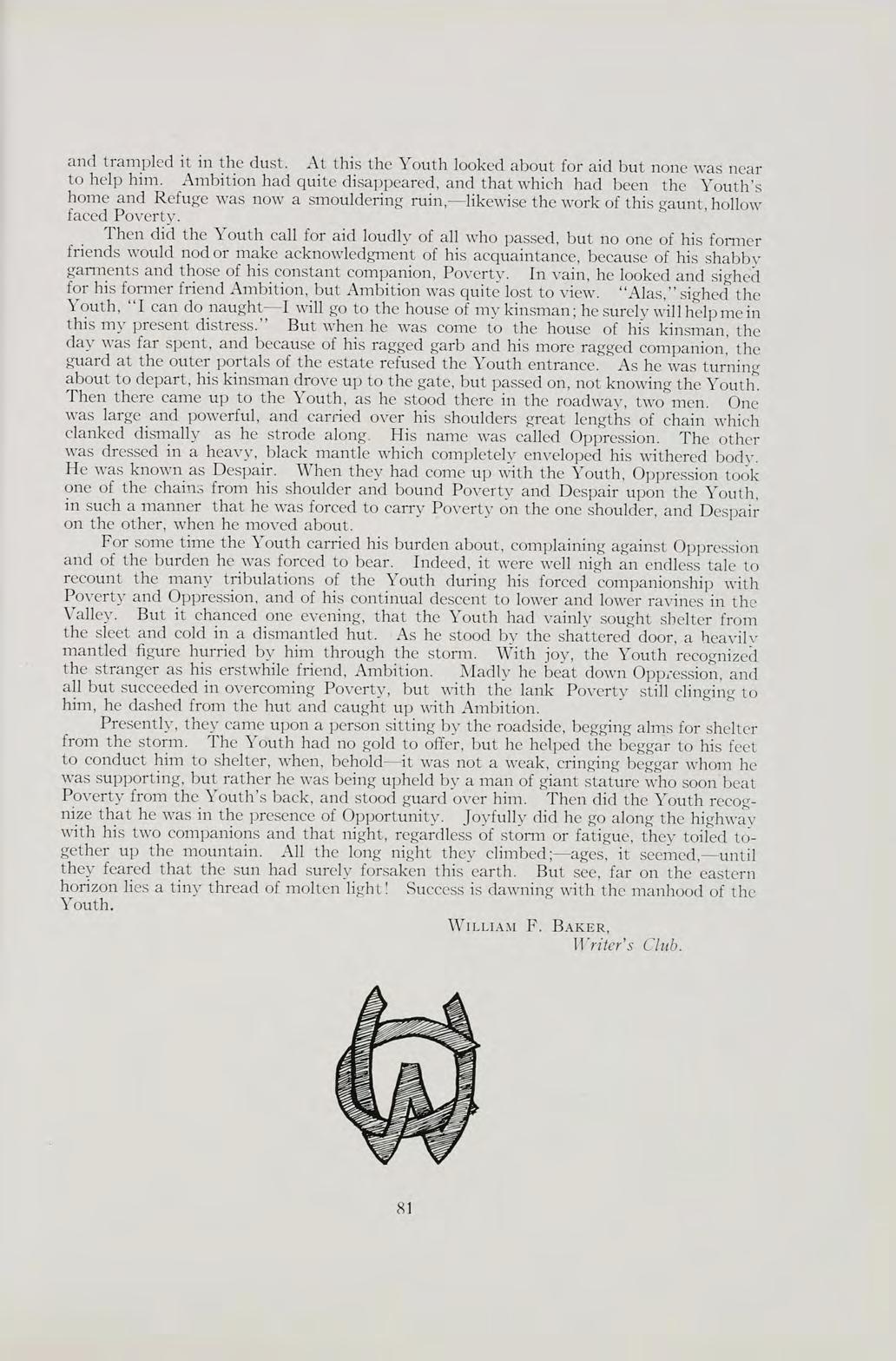
and trampled it in the dust. At this the Youth looked about for aid but none was near to help him. Ambition had quite disappeared, and that which had been the Youth’s home and Refuge was now a smouldering ruin,—likewise the work of this gaunt, hollow faced Poverty.
Then did the Youth call for aid loudly of all who passed, but no one of his former friends would nod or make acknowledgment of his acquaintance, because of his shabby garments and those of his constant companion, Poverty. In vain, he looked and sighed for his former friend Ambition, but Ambition was quite lost to view. “Alas,” sighed the Youth, “I can do naught—I will go to the house of my kinsman; he surely will help me in this my present distress.” But when he was come to the house of his kinsman, the day was far spent, and because of his ragged garb and his more ragged companion, the guard at the outer portals of the estate refused the Youth entrance. As he was turning about to depart, his kinsman drove up to the gate, but passed on, not knowing the Youth. Then there came up to the Youth, as he stood there in the roadway, two men. One was large and powerful, and carried over his shoulders great lengths of chain which clanked dismally as he strode along. His name was called Oppression. The other was dressed in a heavy, black mantle which completely enveloped his withered body. He was known as Despair. When they had come up with the Youth, Oppression took one of the chains from his shoulder and bound Poverty and Despair upon the Youth, in such a manner that he was forced to carry Poverty on the one shoulder, and Despair on the other, when he moved about.
For some time the Youth carried his burden about, complaining against Oppression and of the burden he was forced to bear. Indeed, it were well nigh an endless tale to recount the many tribulations of the Youth during his forced companionship with Poverty and Oppression, and of his continual descent to lower and lower ravines in the Valley. But it chanced one evening, that the Youth had vainly sought shelter from the sleet and cold in a dismantled hut. As he stood by the shattered door, a heavily mantled figure hurried by him through the storm. With joy, the Youth recognized the stranger as his erstwhile friend, Ambition. Madly he beat down Oppression, and all but succeeded in overcoming Poverty, but with the lank Poverty still clinging to him, he dashed from the hut and caught up with Ambition.
Presently, they came upon a person sitting by the roadside, begging alms for shelter from the storm. The Youth had no gold to offer, but he helped the beggar to his feet to conduct him to shelter, when, behold—it was not a weak, cringing beggar whom he was supporting, but rather he was being upheld by a man of giant stature who soon beat Poverty from the Youth’s back, and stood guard over him. Then did the Youth recog- nize that he was in the presence of Opportunity. Joyfully did he go along the highway with his two companions and that night, regardless of storm or fatigue, they toiled together up the mountain. All the long night they climbed;—ages, it seemed,—until they feared that the sun had surely forsaken this earth. But see, far on the eastern horizon lies a tiny thread of molten light! Success is dawning with the manhood of the Youth.
William F. Baker, Writer's Club.
Thrilling story of Adventures and Horrors of a night in Morey Hall.
The Hostess
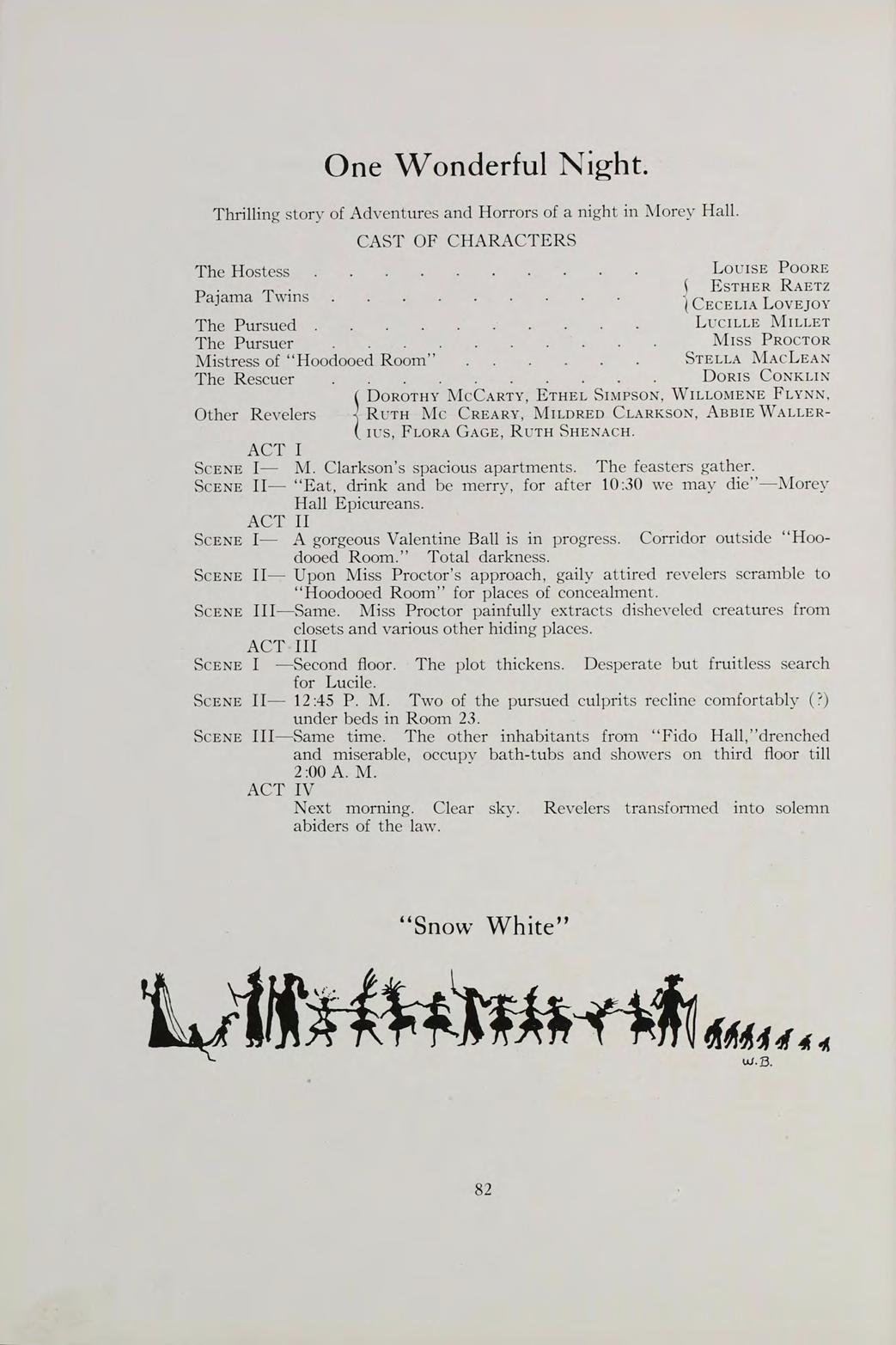
Louise Poore ( Esther Raetz
Pajama Twins ( Cecelia Lovejoy
The Pursued Lucille Millet
The Pursuer Miss Proctor
Mistressof “Hoodooed Room” Stella MacLean
The Rescuer Doris Conklin i Dorothy McCarty, Ethel Simpson, Willomene Flynn, Other Revelers -j Ruth Me Creary, Mildred Clarkson, Abbie Waller( ius, Flora Gage, Ruth Shenach.
ACT I
Scene I— M. Clarkson’s spacious apartments. The feasters gather.
Scene II— “Eat, drink and be merry, for after 10:30 we may die"—Morey Hall Epicureans.
ACT II
Scene I— A gorgeous Valentine Ball is in progress. Corridor outside “Hoodooed Room.” Total darkness.
Scene II— Upon Miss Proctor’s approach, gaily attired revelers scramble to “Hoodooed Room” for places of concealment.
Scene III—Same. Miss Proctor painfully extracts disheveled creatures from closets and various other hiding places.
ACT III
Scene I —Second floor. The plot thickens. Desperate but fruitless search for Lucile.
Scene II— 12:45 P. M. Two of the pursued culprits recline comfortably (?) under beds in Room 23.
Scene III—Same time. The other inhabitants from “Fido Hall,’’drenched and miserable, occupy bath-tubs and showers on third floor till 2:00 A. M.
ACT IV
Next morning. Clear sky. Revelers transformed into solemn abiders of the law.
“Snow White”
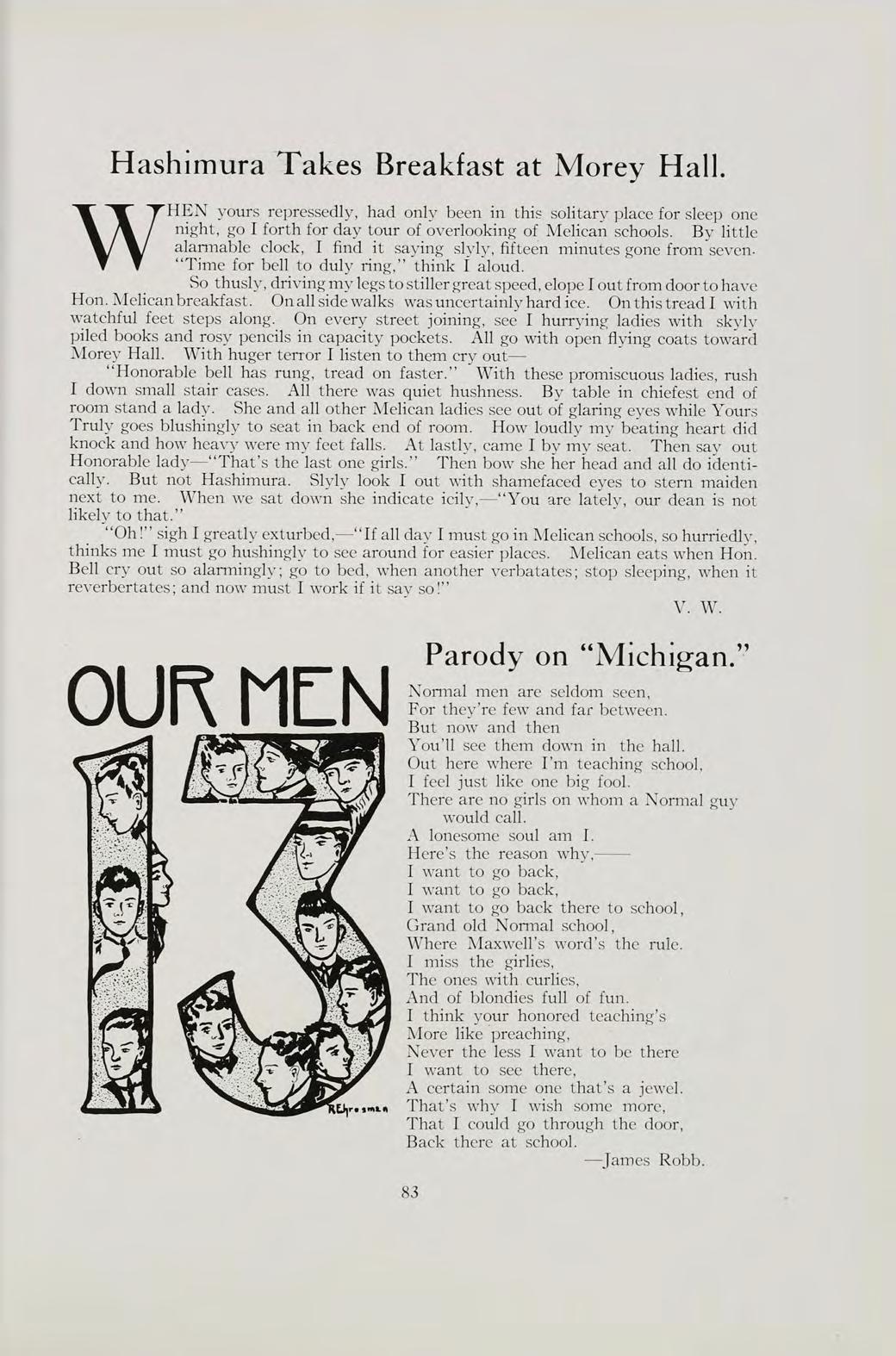
WHEN yours repressedly, had only been in this solitary place for sleep one night, go I forth for day tour of overlooking of Melican schools. By little alarmable clock, I find it saying slyly, fifteen minutes gone from seven“Time for bell to duly ring,” think I aloud. So thusly, driving my legs to stillergreat speed, elope I out from door to have Hon. Melican breakfast. On all sidewalks was uncertainly hard ice. On this tread I with watchful feet steps along. On every street joining, see I hurrying ladies with skvly piled books and rosy pencils in capacity pockets. All go with open flying coats toward Morey Hall. With huger terror I listen to them cry out—-
“Honorable bell has rung, tread on faster.” With these promiscuous ladies, rush I down small stair cases. All there was quiet hushness. By table in chiefest end of room stand a lady. She and all other Melican ladies see out of glaring eyes while Yours Truly goes blushingly to seat in back end of room. How loudly my beating heart did knock and how heavy were my feet falls. At lastly, came I by my seat. Then say out Honorable lady—“That’s the last one girls.” Then bow she her head and all do identieally. But not Hashimura. Slyly look I out with shamefaced eyes to stern maiden next to me. When we sat down she indicate icily,—“You are lately, our dean is not likely to that.”
“Oh!” sigh I greatly exturbed,—“If all day I must go in Melican schools, so hurriedly, thinks me I must go hushingly to see around for easier places. Melican eats when Hon. Bell cry out so alarmingly; go to bed, when another verbatates; stop sleeping, when it reverbertates; and now must I work if it say so!”
V. W.
Normal men are seldom seen, For they’re few and far between. But now and then You’ll see them down in the hall. Out here where I’m teaching school, I feel just like one big fool. There are no girls on whom a Normal guy would call.
A lonesome soul am I. Here’s the reason why, I want to go back, I want to go back, I want to go back there to school, Grand old Normal school, Where Maxwell’s word’s the rule. I miss the girlies, The ones with curlies, And of blondies full of fun.
I think your honored teaching’s More like preaching, Never the less I want to be there I want to see there,
A certain some one that’s a jewel. That’s why I wish some more, That I could go through the door, Back there at school.
—James Robb.
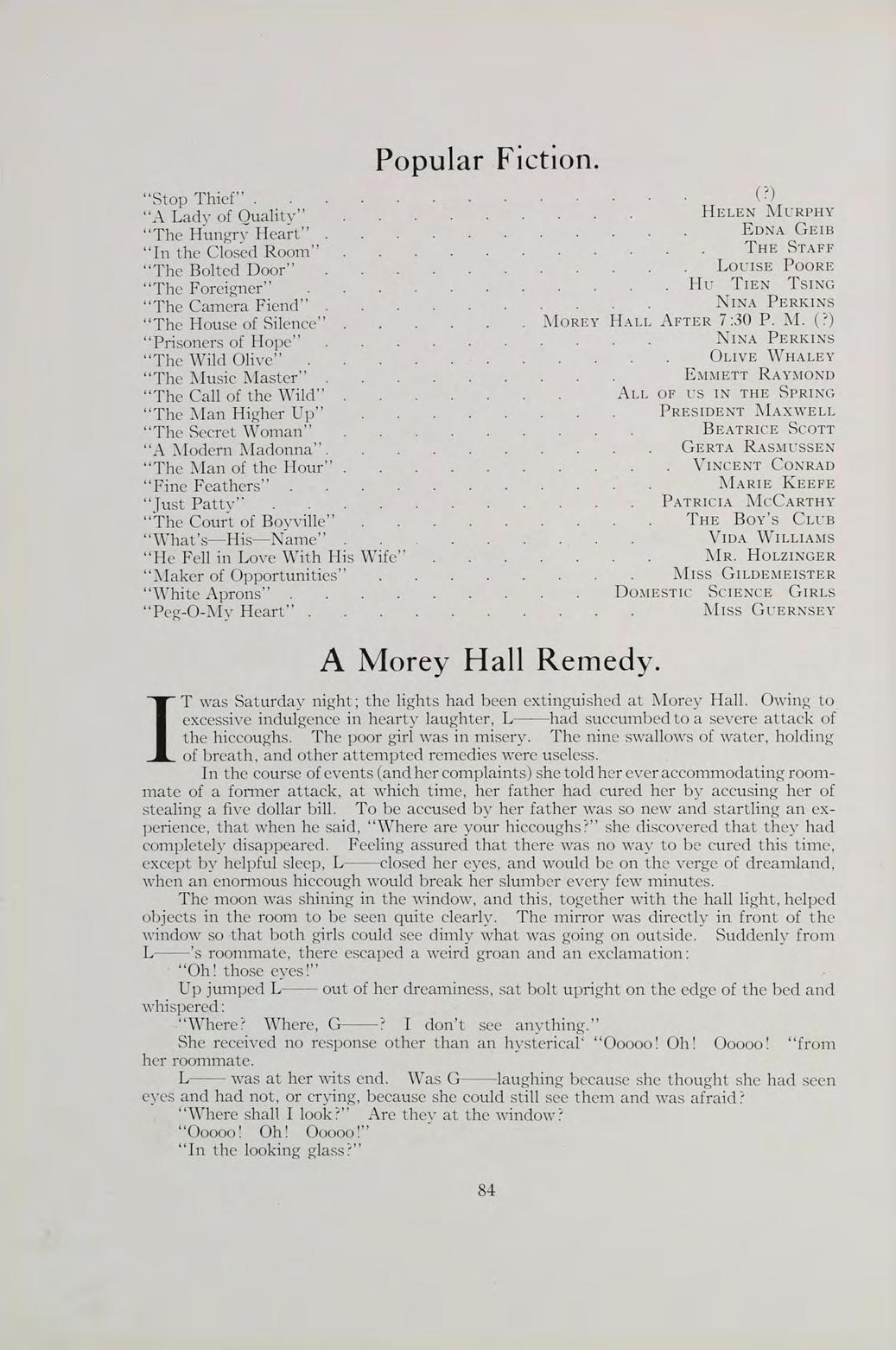
“Stop Thief”
“A Lady of Quality”
“The Hungry Heart”
“In the Closed Room”
“The Bolted Door”
“The Foreigner”
“The Camera Fiend”
“The House of Silence”
“Prisoners of Hope”
“The Wild Olive”
“The Music Master”
“The Call of the Wild”
“The Man Higher Up”
“The Secret Woman”
“A Modern Madonna”.
“The Man of the Hour”
“Fine Feathers”
“Just Patty”
“The Court of Boyville”
“What’s—His—Name”
“He Fell in Love With His Wife”
“Maker of Opportunities”
“White Aprons”
“Peg-O-My Heart”
I(?)
Helen Murphy
Edna Geib
The Staff
Louise Poore
H u Tien Tsing
Nina Perkins
Morey Hall After 7:30 P. M. (?)
Nina Perkins
OliveWhaley
Emmett
Raymond
All of us in the Spring
President Maxwell
Beatrice Scott
Gerta Rasmussen
Vincent Conrad
Marie Keefe
Patricia McCarthy
The Boy’s Club
Vida Williams
Mr. Holzinger
Miss Gildemeister
Domestic Science Girls
Miss Guernsey
T was Saturday night; the lights had been extinguished at Morey Hall. Owing to excessive indulgence in hearty laughter, L had succumbed to a severe attack of the hiccoughs. The poor girl was in misery. The nine swallows of water, holding of breath, and other attempted remedies were useless.
In the course of events (and her complaints) she told her ever accommodating roommate of a former attack, at which time, her father had cured her by accusing her of stealing a five dollar bill. To be accused by her father was so new and startling an experience, that when he said, “Where are your hiccoughs?'” she discovered that they had completely disappeared. Feeling assured that there was no way to be cured this time, except by helpful sleep, L closed her eyes, and would be on the verge of dreamland, when an enormous hiccough would break her slumber every few minutes.
The moon was shining in the window, and this, together with the hall light, helped objects in the room to be seen quite clearly. The mirror was directly in front of the window so that both girls could see dimly what was going on outside. Suddenly from L ’s roommate, there escaped a weird groan and an exclamation:
“Oh! those eyes!”
Up jumped L out of her dreaminess, sat bolt upright on the edge of the bed and whispered:
“Where? Where, G ? I don’t see anything.”
She received no response other than an hysterical 1 “Ooooo! Oh! Ooooo! “from her roommate.
L was at her wits end. Was G laughing because she thought she had seen eyes and had not, or crying, because she could still see them and was afraid?
“Where shall I look?” Are they at the window?
“Ooooo!Oh!Ooooo!”
“In the looking glass?”
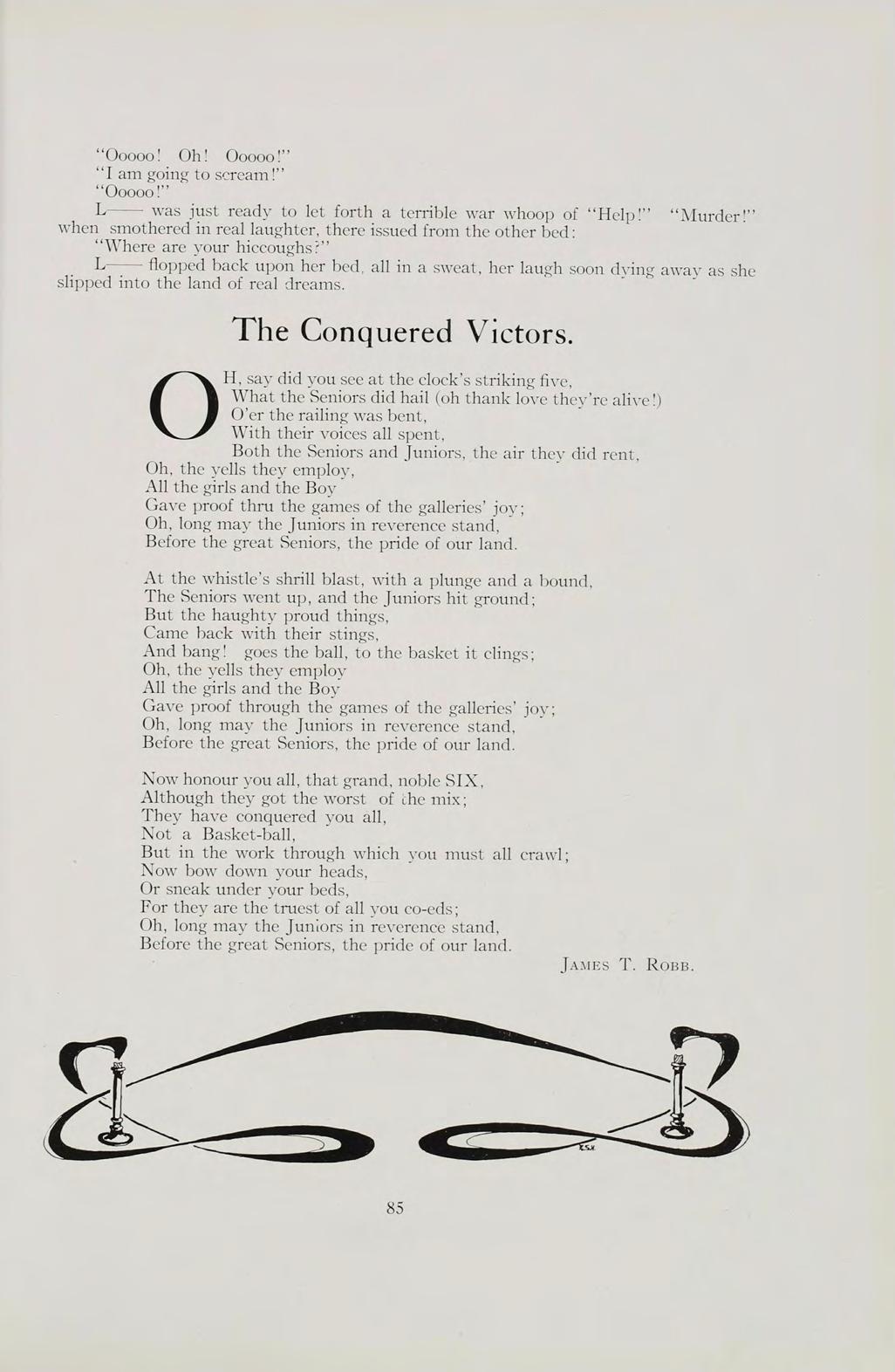
“Ooooo! Oh! Ooooo!”
“I am going to scream!”
‘‘Ooooo!”
L was just ready to let forth a terrible war whoop of “Help!” “Murder!” when smothered in real laughter, there issued from the other bed: “Where are your hiccoughs?”
L flopped back upon her bed. all in a sweat, her laugh soon dying away as she slipped into the land of real dreams.
OH, say did you see at the clock’s striking five, What the Seniors did hail (oh thank love they’re alive!)
O’er the railing was bent, With their voices all spent, Both the Seniors and Juniors, the air they did rent, Oh, the yells they employ,
All the girls and the Boy
Gave proof thru the games of the galleries’ joy; Oh, long may the Juniors in reverence stand, Before the great Seniors, the pride of our land.
At the whistle’s shrill blast, with a plunge and a bound, The Seniors went up, and the Juniors hit ground; But the haughty proud things, Came back with their stings, And bang! goes the ball, to the basket it clings; Oh, the yells they employ
All the girls and the Boy Gave proof through the games of the galleries’ joy; Oh, long may the Juniors in reverence stand, Before the great Seniors, the pride of our land.
Now honour you all, that grand, noble SIX, Although they got the worst of che mix; They have conquered you all, Not a Basket-ball, But in the work through which you must all crawl; Now bow down your heads, Or sneak under your beds, For they are the truest of all you co-eds; Oh, long may the Juniors in reverence stand, Before the great Seniors, the pride of our land.
James T. Robb.
is the civic watchword of today.
Is it Your watchword when you BUY." Make it yours.
Buy from Our Advertisers and you will have not only Safety but Satisfaction.
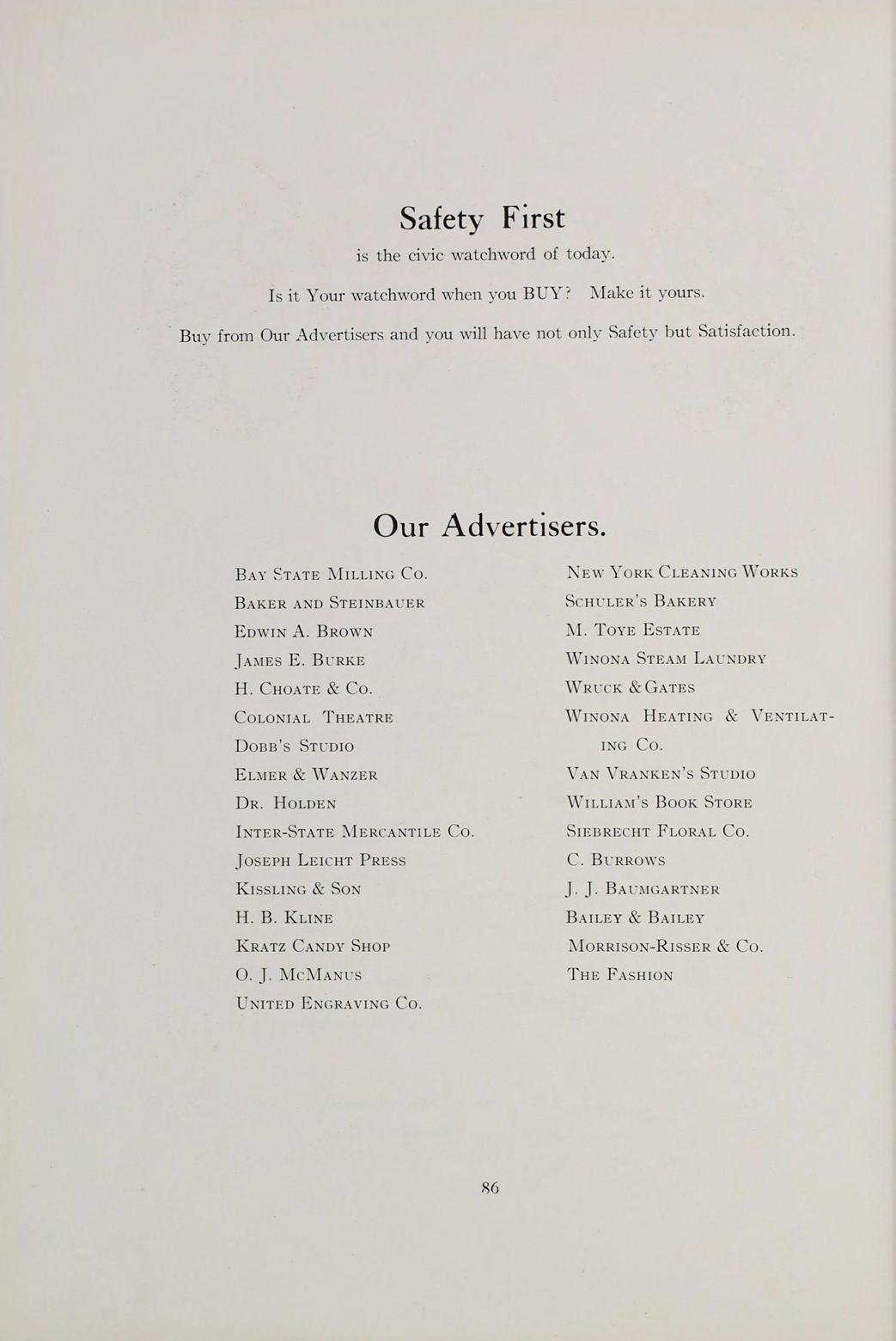
Bay State Milling Co.
Baker and Steinbauer
Edwin A. Brown
James E. Burke
H. Choate & Co.
Colonial Theatre
Dobb’s Studio
Elmer & Wanzer
Dr. Holden
Inter-State Mercantile Co.
Joseph Leicht Press
Kissling & Son
H. B. Kline
Kratz Candy Shop
0. J. McManus
United Engraving Co.
New York Cleaning Works
Schuler’s Bakery
M. Toye Estate
Winona Steam Laundry
Wruck & Gates
Winona Heating & Ventilating Co.
Van Vranken’s Stltdio
William’s Book Store
Siebrecht Floral Co.
C. Burrows
J.J. Baumgartner
Bailey & Bailey
Morrison-Risser & Co.
The Fashion
Bess Pearo—Taking her nourishment
Inez Farber—In some deviltry
Bill Baker—Out of place
Ethel Liddle—At a dance
Madeline Teeple—In nervous expostulation
Pauline Prior—Inarms!
Helen Jeffries—Within art (ful) glances
Phyllis Randall—Nowhere in particular
Lissette Porter—Consulting “Little Aids to Cupid’’
Irene Davey—Studying “Short Cuts to Popularity”
Maud Boreen—Taking her beauty sleep
Anna Pfaffman—With her national dish (Limburger)
Evelyn Carlson-—Admiring her “Jewel”
Laura Griffith—In another case
Gertrude MacLean—Talking
Harry Einhorn—On somebodies “trilbies”
Downing Ellison—With the girls
Kathryn Hinderman—Making up
1—“Don’t Take My Loving Man Away
2—“Skeleton Rag”
3—“Kiss Me Again”
4—“There is a Boy in the Heart of Virginia”

Helen Massy
Anna Olson
Pauline Prior
Lois Willis
5—“Take Me Back to Babyland” Blanche Perry
6—“When You’re Away” (to) Miss Richards
7—“Roses Bloom for Lovers” Harris Pett
8—“I Love the Ladies” Mr. Holzinger
Mr. H. (reading about earthquake in Italy)—“That was a literal shaking in the boots of Europe.
For all information concerning Madison “U”, consult Grace S and Martha S.
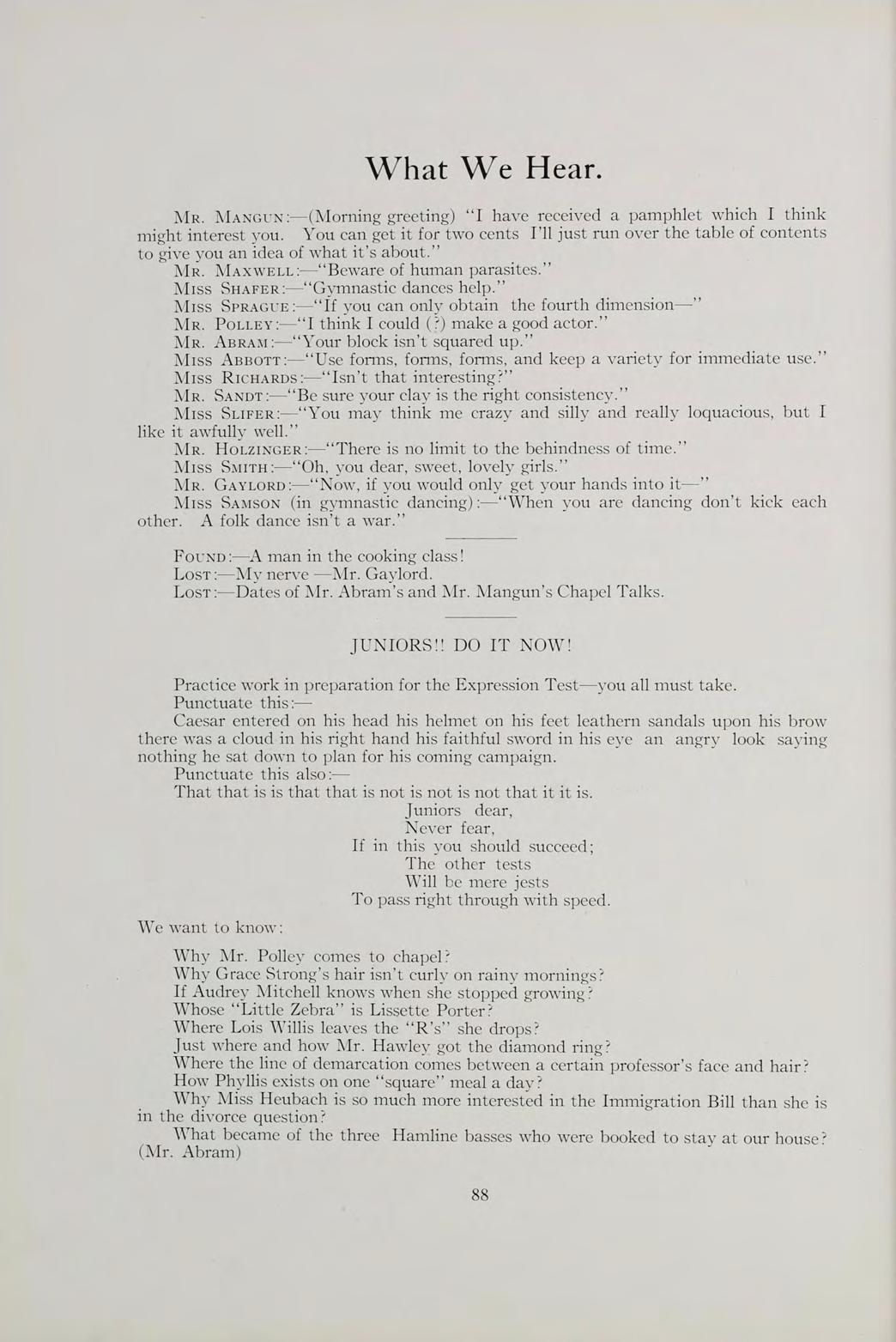
Mr. Mangun:—(Morning greeting) “I have received a pamphlet which I think might interest you. You can get it for two cents I’ll just run over the table of contents to give you an idea of what it’s about.”
Mr. Maxwell:—‘‘Beware of human parasites.”
Miss Shafer:—“Gymnastic dances help.”
Miss Sprague:—“If you can only obtain the fourth dimension—”
Mr. Polley:—“I think I could (?) make a good actor.”
Mr. Abram:—“Your block isn’t squared up.”
Miss Abbott:—“Use forms, forms, forms, and keep a variety for immediate use.”
Miss Richards:—“Isn’t that interesting?”
Mr. Sandt:—“Be sure your clay is the right consistency.”
Miss Slifer:—“You may think me crazy and silly and really loquacious, but I like it awfully well.”
Mr. Holzinger:—“There is no limit to the behindness of time.”
Miss Smith:—“Oh, you dear, sweet, lovely girls.”
Mr. Gaylord:—“Now, if you would only get your hands into it—”
Miss Samson (in gymnastic dancing):—“When you are dancing don’t kick each other. A folk dance isn’t a war.”
Found:—A man in the cooking class!
Lost :—My nerve —Mr. Gaylord.
Lost:—Dates of Mr. Abram’s and Mr. Mangun’s Chapel Talks.
Practice work in preparation for the Expression Test—you all must take.
Punctuate this:—
Caesar entered on his head his helmet on hisfeet leathern sandals upon his brow there was a cloud in his right hand his faithful sword in his eye an angry look saying nothing he sat down to plan for his coming campaign.
Punctuate this also:—
That that isis that that is not is not is not that it it is. Juniors dear, Never fear, If in this you should succeed; The other tests Will be mere jests To pass right through with speed.
We want to know:
Why Mr. Polley comes to chapel?
Why Grace Strong’s hair isn’t curly on rainy mornings?
If Audrey Mitchell knows when she stopped growing ?
Whose “Little Zebra” is Lissette Porter?
Where Lois Willis leaves the “R’s” she drops?
Just where and how Mr. Hawley got the diamond ring?
Where the line of demarcation comes between a certain professor’s face and hair?
How Phyllis exists on one “square” meal a day?
Why Miss Heubach is so much more interested in the Immigration Bill than she is in the divorce question?
What became of the three Hamline basses who were booked to stav at our house? (Mr. Abram)
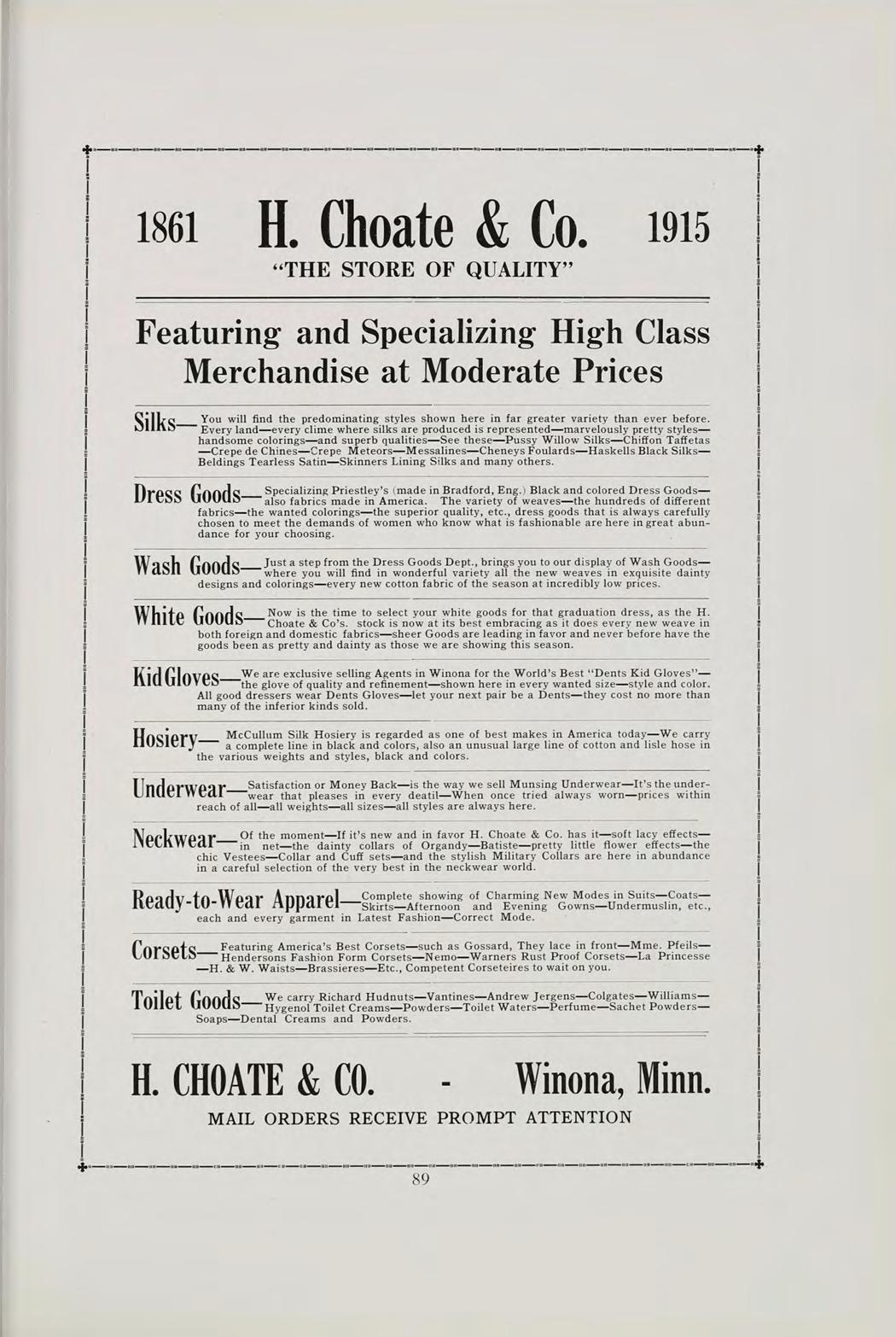
Silks— You will find the predominating styles shownhere in far greater variety than ever before. Every land—every clime where silks are produced is represented—marvelously pretty styles— handsome colorings—and superb qualities—See these—Pussy Willow Silks—Chiffon Taffetas —Crepe de Chines—Crepe Meteors—Messalines—Cheneys Foulards—Haskells Black Silks— Beldings Tearless Satin—Skinners Lining Silks and many others.
LrPQQ C/wido Specializing Priestley’s (made in Bradford, Eng.) Black and colored Dress Goods—
I/I Coo Ul/UUo a i so fabrics made in America. The variety of weaves—the hundreds of different fabrics—the wanted colorings—the superior quality, etc., dress goods that is always carefully chosen to meet the demands of women who know what is fashionable are here in great abundance for your choosing.
WUell CnnH C Just a step f rom fh e Dress Goods Dept., brings you to our display of Wash Goods—
TT (toll IIUUUo where you will find in wonderful variety all the new weaves in exquisite dainty designs and colorings—every new cotton fabric of the season at incredibly low prices.
WhltP
Now is the time to select your white goods forthat graduation dress, as the H. TT IIIIC lIUUUo Choate & Co’s, stock is now at its best embracing as it does every new weave in both foreign and domestic fabrics—sheer Goods are leading in favor and never before have the goods been as pretty and dainty as those we are showing this season.
KlH L|nVP<i We are exc * us ve selling Agents in Winona for the World’s Best “Dents Kid Gloves”—
IY1U U1U V Co the glove of quality and refinement—shown here in every wanted size—style and color. All good dressers wear Dents Gloves—let your next pair be a Dents—they cost no more than many of the inferior kinds sold.
Hneiprv McCullum Silk Hosiery is regarded as one of best makes in America today—We carry
IlUolCI j a complete line in black and colors, also an unusual large line of cotton and lisle hose in the various weights and styles, black and colors.
LnHprWPar Satisfaction or Money Back—is the way we sell Munsing Underwear—It’s the underUllUCIWCdl wear that pleases in every deatil—When once tried always worn—pri reach of all—all weights—all sizes—all styles are always here. -prices within
NppIlWPMI* Of the moment—If it’s new and infavor H. Choate & Co. has it—soft lacy effects— liCCIYWCdl i n net—the dainty collars of Organdy—Batiste—pretty little flower effects—the chic Vestees—Collar and Cuffsets—and the stylish Military Collars are here in abundance in a careful selection of the very best in the neckwear world.
Rdflflv tn Wpfir Annfirpl Complete showing of Charming New Modes in Suits—Coats— llCdUj - lU" TT Cdl iiJJJJdl Cl Skirts—Afternoon and Evening Gowns—Undermuslin, etc each and every garment in Latest Fashion—Correct Mode.
Fa1*CpIc Featuring America’s Best Corsets—such as Gossard, They lace in front—Mme. Pfeils— v "I oClo Hendersons Fashion Form Corsets—Nemo—Warners Rust Proof Corsets—La Princesse —H. & W. Waists—Brassieres—Etc., Competent Corseteires to wait on you.
Toilet Goods— We carry Richard Hudnuts—Vantines—Andrew Jergens—Colgates—Williams— Hygenol Toilet Creams—Powders—Toilet Waters—Perfume—Sachet Powders— Soaps—Dental Creams and Powders.
We want to know why Miss Abbott encourages the girls to get a graft with the janitors?
If we couldn’t get rich by living on the fourth dimension?
Why Harris gave Miss Dixon a tardy excuse and turned others down that snowy morning? Was he afraid she’d get into his wool? (as he says)
If Helen Massy should get Einhorn, could she toot."
What Mr. Polley did with the maps contributed by the sewing class ?
Why the Cooking IV class spent so much time on styles." (Stiles)
Why Evelyn Carlson never comes to any school doings on Friday and Saturday evenings ?
Why Blanche Perry always says “yes, that’s just what I meant,” when some one else answers the question she could not answer?
Why May Tolleson enjoys agreeing to disagree with whomever she chances to meet."
What Nu Beta Gamma means?
Why some girls change their course to theHousehold Arts."
Since when “S. C. G.” has stood for O. K.? Perhaps Ethel S. can enlighten us. How many apples Mr. Gaylord could consume in a day?
One night I dreamed, and then awoke And laughed it was so funny I dreamed my daughter had written home And did not ask for money!
Shares in Dean’s “Stand In” Company (For Sale by F. L. Richards)
Stockholders:
Pauline Prior
Mildred Clarkson
Helen Jeffries
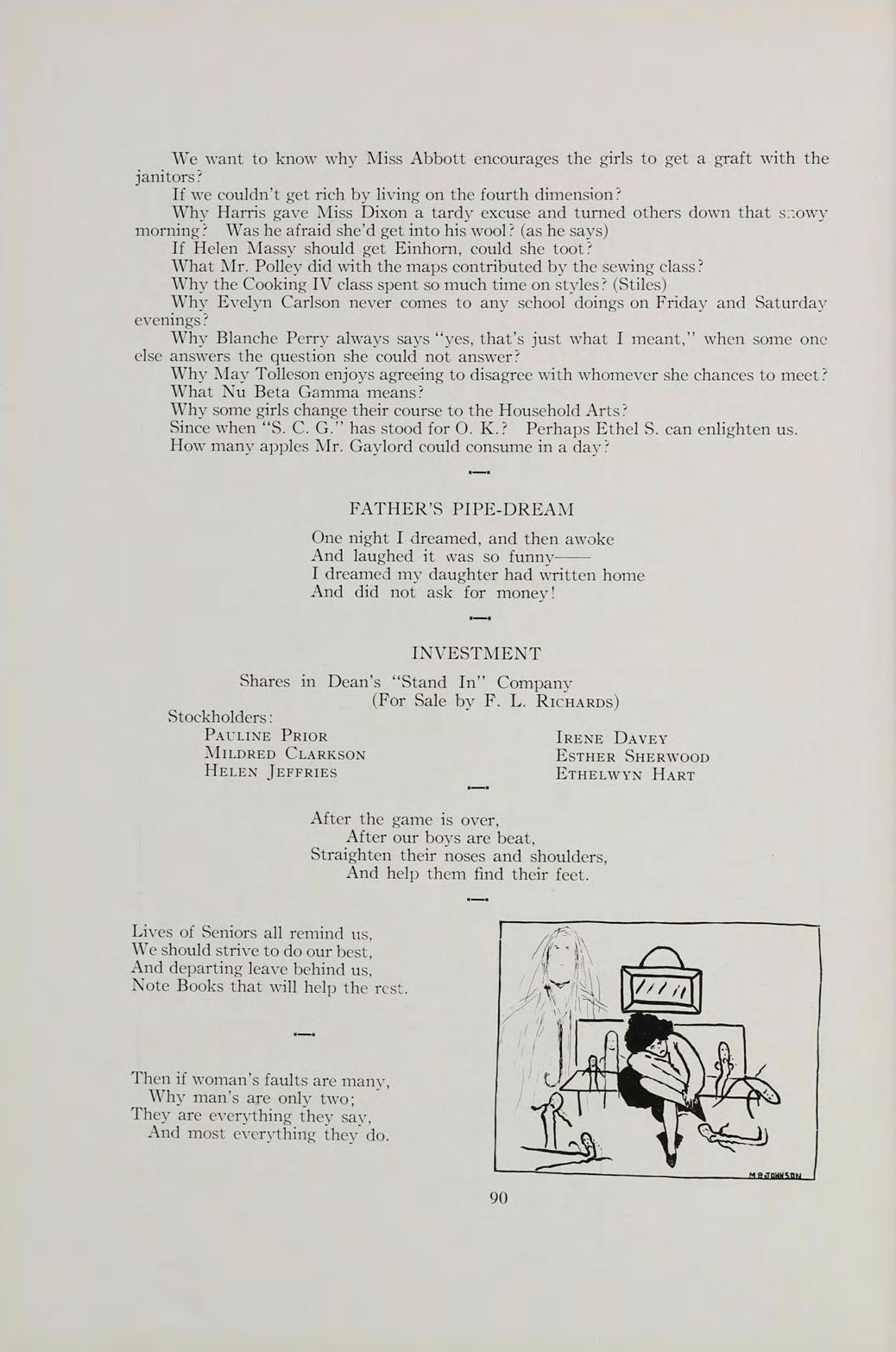
Irene Davey
Esther Sherwood
Ethelwyn Hart
After the game is over, After our boys are beat, Straighten their noses and shoulders, And help them find their feet.
Lives of Seniors all remind us, We should strive to do our best, And departing leave behind us, Note Books that will help the rest.
Then if woman’s faults are many, Why man’s are only two; They are everything they say, And most everything they do.

A correct answer to this question should help both you and us. And in the following we propose to give you a few reasons why we believe it’s to your interest to trade with us.
In the first place you are assured of a SQUARE DEAL. We wouldn’t intentionally cheat you out of a single penny and if for any reason you should get the little end of a deal we are always ready and willing to make good.
While we are not always cheaper than every one else on every thing yet our prices on the whole are as low and in most cases a little less than others.
Correct Merchandise, that is the right merchandise at the right time. We feature the best known brands in all lines of merchandise and in so doing insure you a standard article and our stocks are always large and complete—and you are assured of getting the best.
We are constantly striving to better serve you and will thank you to help us in any way that you can.
Now if you are not one of our regular customers try us once and see how you like our merchandise, our service and our prices. We believe we can serve you as no other store in this community consequently ask for a trial order.
Grace’s heart’s at Madison, Her heart is not here, Her heart’s in the “U”, A following the dear; A following the wild dear, Perhaps nobody knows,— Her heart’s in Wisconsin Where-ever she goes.
There was an old man Who had a wooden leg; A ride he couldn’t steal And a ride he wouldn’t beg; So he took four spools, And an old tin can. He called it a Ford: And the darn thing ran.
It’s a long way to Old Winona, It’s a long way to go.
It’s a long way to Old Winona, To the dearest school I know.
Goodbv Miss Gildemeister, Goodbye Morey Hall.
It’s a long, long way to Old Winona, But my heart’s with you all.
E. Foster
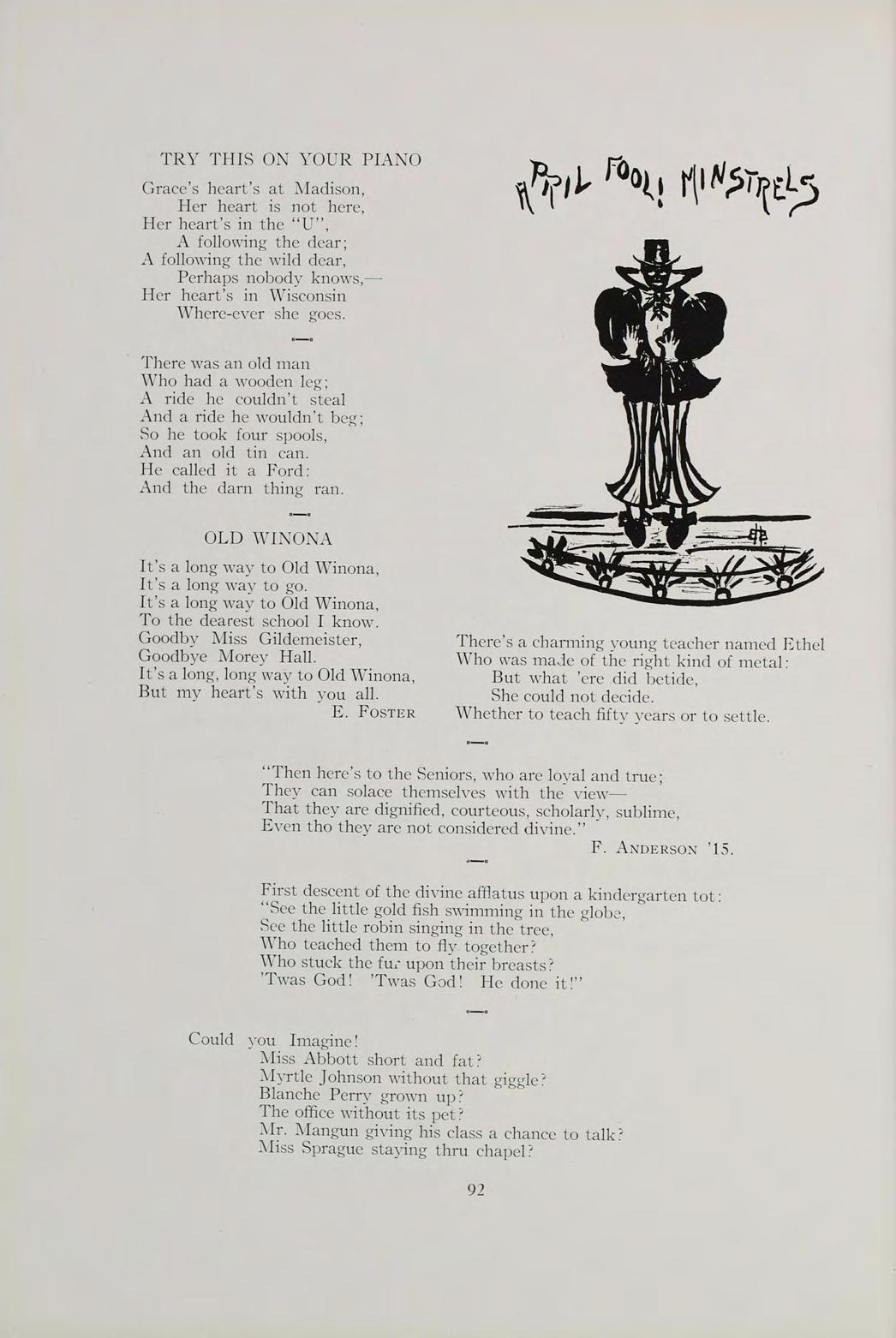
There’s a charming young teacher named Ethel Who was made of the right kind of metal: But what ’ere did betide, She could not decide. Whether to teach fifty years or to settle.
“Then here’s to the Seniors, who are loyal and true; They can solace themselves with the view— That they are dignified, courteous, scholarly, sublime, Even tho they are not considered divine.”
F. Anderson T5.
First descent of the divine afflatus upon a kindergarten tot:
“See the little gold fish swimming in the globe, See the little robin singing in the tree, Who teached them to fly together? Who stuck the fur upon their breasts?
’Twas God! ’Twas God! He done it!”
Miss Abbott short and fat?
Myrtle Johnson without that giggle? Blanche Perry grown up?
The office without its pet?
Mr. Mangun giving his class a chance to talk?
Miss Sprague staying thru chapel?

One hundred boys in the Normal department ? ! ! !
Mr. Maxwell dancing?
A term without a test?
The rest room quiet?
Getting H in everything?
Miss Slifer not having her characters all picked before she had the play ?
Sarah Fleming meek?
Miss Richards not giving the girls advice?
Alice Cooley agreeing?
Miss Gildemeister having a few moments to herself?
For all the latest sytles consult Miss Keefe.
Working for directness in Public Speaking Class—better known as the“class of one boy.”
Miss S. (to youthful Louise),—“You don’t talk as if you loved us. Are you sure you love every one of us?”
Louise:—“Very sure.”
(What “the boy” meant by that gasp we cannot say).
He that falls in love with himself, finds no rival. As ye sew, so shall ye rip.
The eagles on U. S. coins are symbolic of their flight. Where there’s a will, there’s a wont.
Some women’s heads are turned by flattery—some by peroxide. Generally speaking, women are generally speaking.
Winona Normal School, Eighth Model.

Dear Mr. Hu:—
You asked me to explain St. Valentines day to you and so I will do the best I can. St. Valentines day was started by St. Valentine. St. Valentines day is on the fourteenth day of February and is a day when you give valentines and show your love. I know nothing more about it, so I will close. Yours very truly, John Munro.
There is a professor named Moore, Of jokes he has one and four, To amuse his classes And please the lasses, He repeats them o’er and o’er.
There is a man named Dickerson, Who is fond of many a clever pun, But to scare his classes He puts on his glasses And glares at the students who are bum.
There is a fair lady named Slifer, Whose ambition is to have us just like her, So she gives us the rules Of the Emersonian schools And A’s to those who are like her.
A. M. V. W.
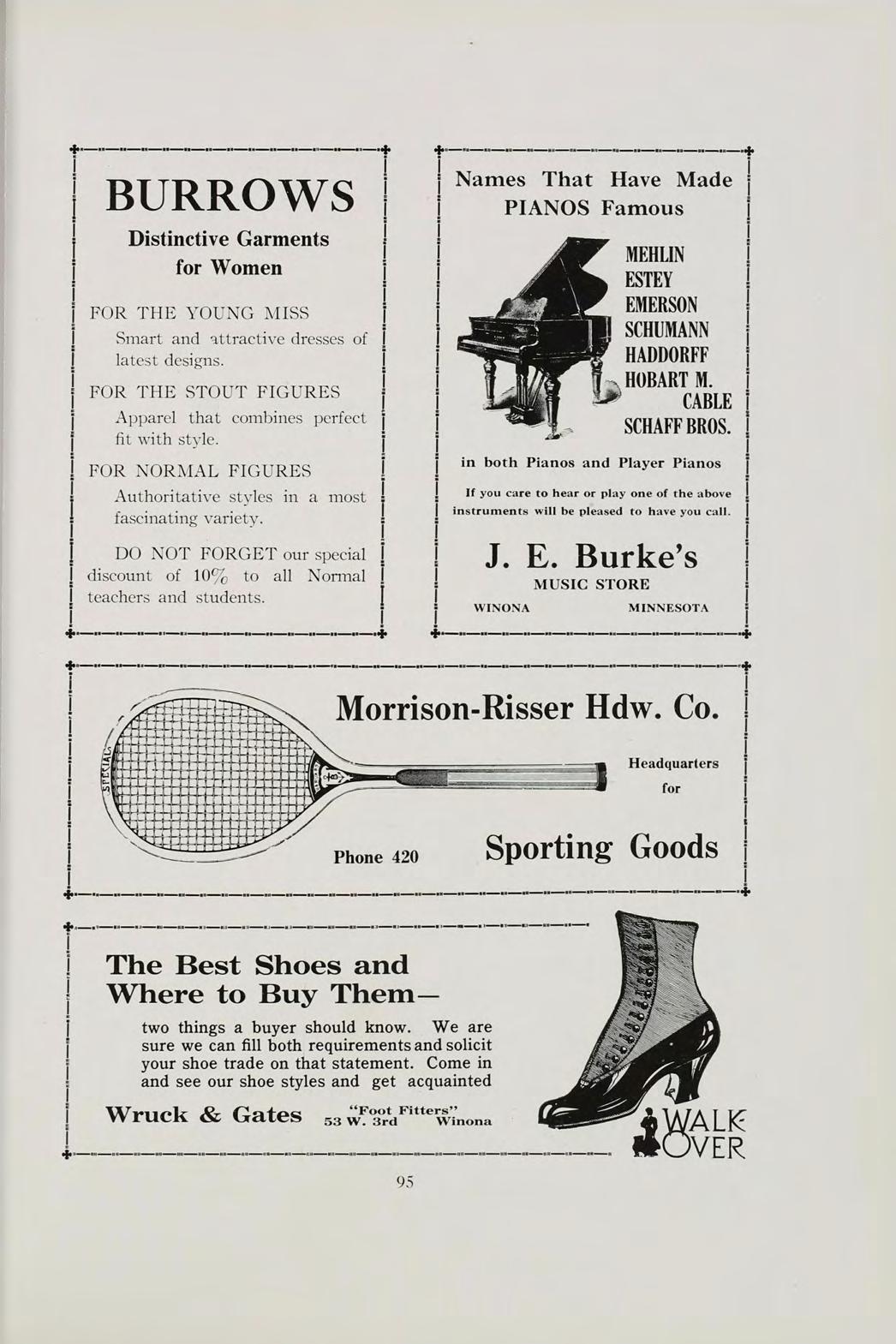
FOR THE YOUNG MISS
Smart and attractive dresses of latest designs.
FOR THE STOUT FIGURES
Apparel that combines perfect fit with style.
FOR NORMAL FIGURES
Authoritative styles in a most fascinating variety.
DO NOT FORGET our special discount of 10% to all Normal teachers and students.
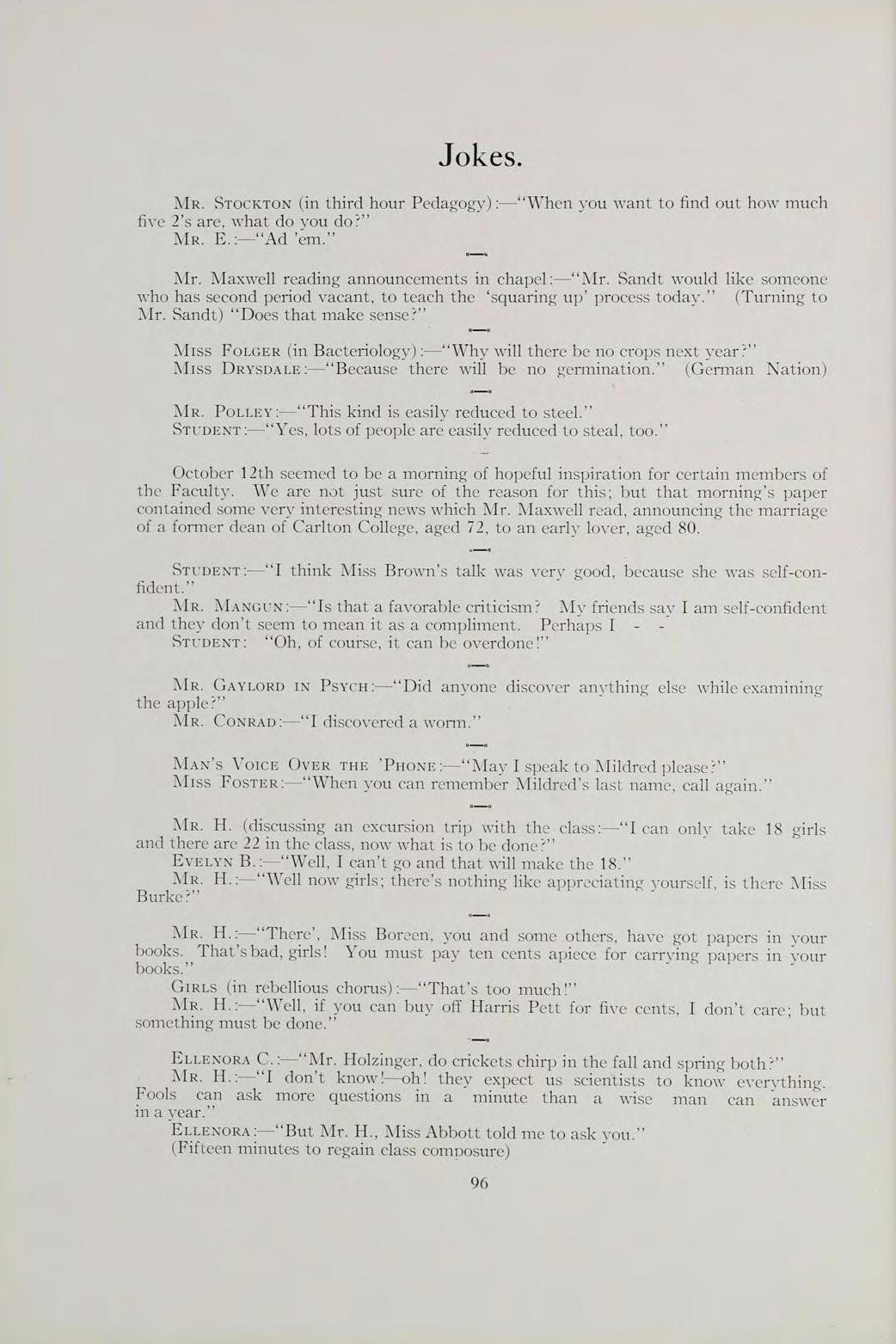
Mr. Stockton (in third hour Pedagogy):—“When you want to find out how much five 2’s are, what do you do?”
Mr. E.: “Ad’em.”
Mr. Maxwell reading announcements in chapel:—“Mr. Sandt would like someone who has second period vacant, to teach the ‘squaring up’ process today.” (Turning to Mr. Sandt) “Does that make sense?”
Miss Folger (in Bacteriology):—“Why will there be no crops next year.'”
Miss Drysdale:—“Because there will be no germination.” (German Nation)
Mr. Polley:—“This kind is easily reduced to steel.”
Student:—“Yes, lots of people are easily reduced to steal, too.”
October 12th seemed to be a morning of hopeful inspiration for certain members of the Faculty. We are not just sure of the reason for this; but that morning’s paper contained some very interesting news which Mr. Maxwell read, announcing the marriage of a former dean of Carlton College, aged 72, to an early lover, aged 80.
Student:—“I think Miss Brown’s talk was very good, because she was self-confident.”
Mr. Mangun:—“Is that a favorable criticism? My friends say I am self-confident and they don’t seem to mean it as a compliment. Perhaps I -Student: “Oh, of course, it can be overdone!”
Mr. Gaylord in Psych:—“Did anyone discover anything else while examining the apple?”
Mr. Conrad:—“I discovered a worm.”
Man’s Voice Over the ’Phone:—“May I speak to Mildred please?”
Miss Foster:—“When you can remember Mildred’s last name, call again.”
Mr. H. (discussing an excursion trip with the class:—-“I can only take 18 girls and there are 22 in the class, now what is to be done?”
Evelyn B.:—“Well, I can’t go and that will make the 18.”
Mr. H.: “Well now girls; there’s nothing like appreciating yourself, is there Miss Burke?”
Mr. H.: “There’, Miss Boreen, you and some others, have got papers in your books. That’s bad, girls! You must pay ten cents apiece for carrying papers in your books.”
Girls (in rebellious chorus):—“That’s too much!”
Mr. H.: “Well, if you can buy off Harris Pctt for five cents, I don’t care; but something must be done.”
Ellenora C.:—“Mr. Holzinger, do crickets chirp in the fall and spring both?”
Mr. H.: “I don’t know!—oh! they expect us scientists to know everything. Fools can ask more questions in a minute than a wise man can answer in a year.”
Ellenora:—“But Mr. H., Miss Abbott told me to ask you.” (Fifteen minutes to regain class coniDosure)
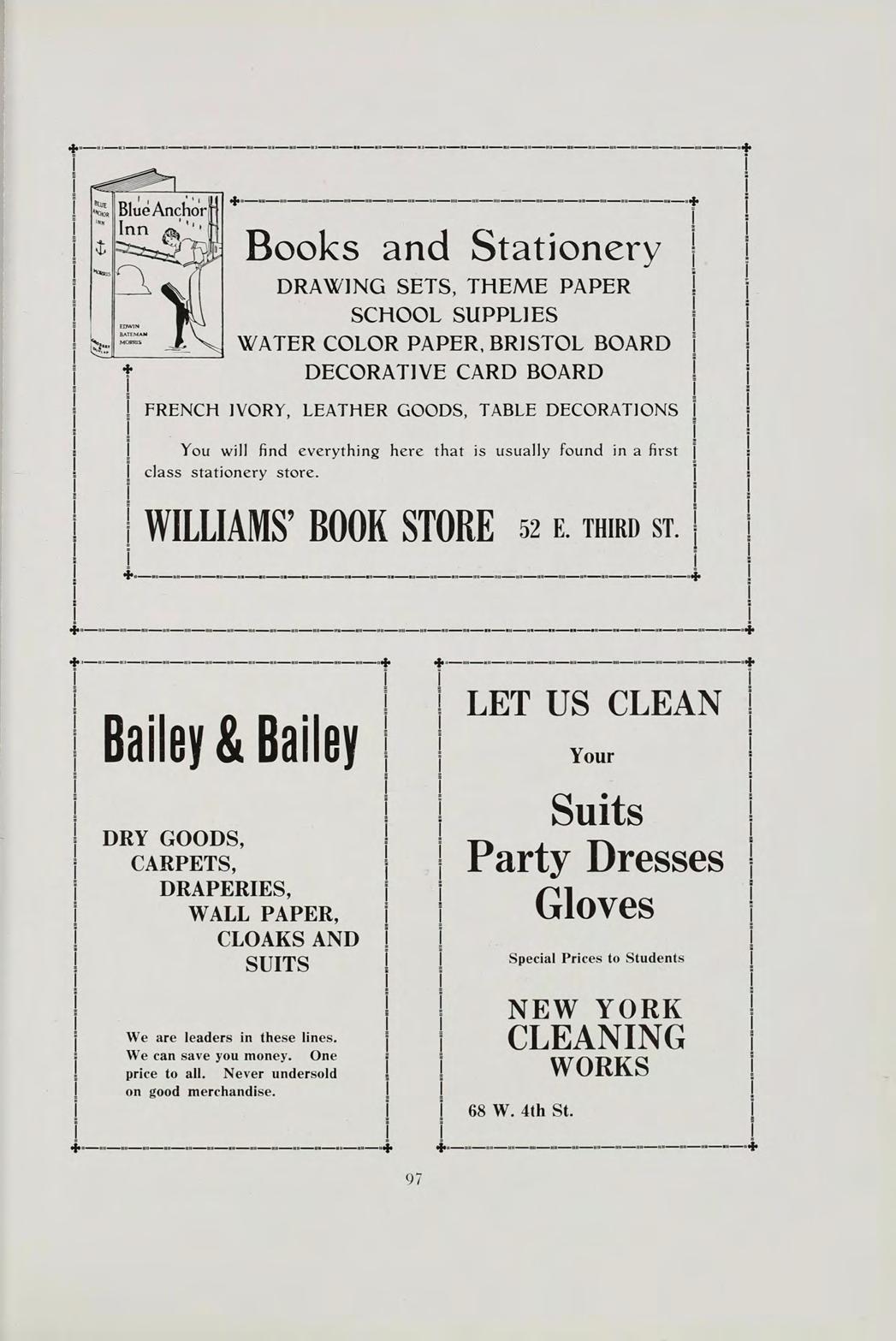
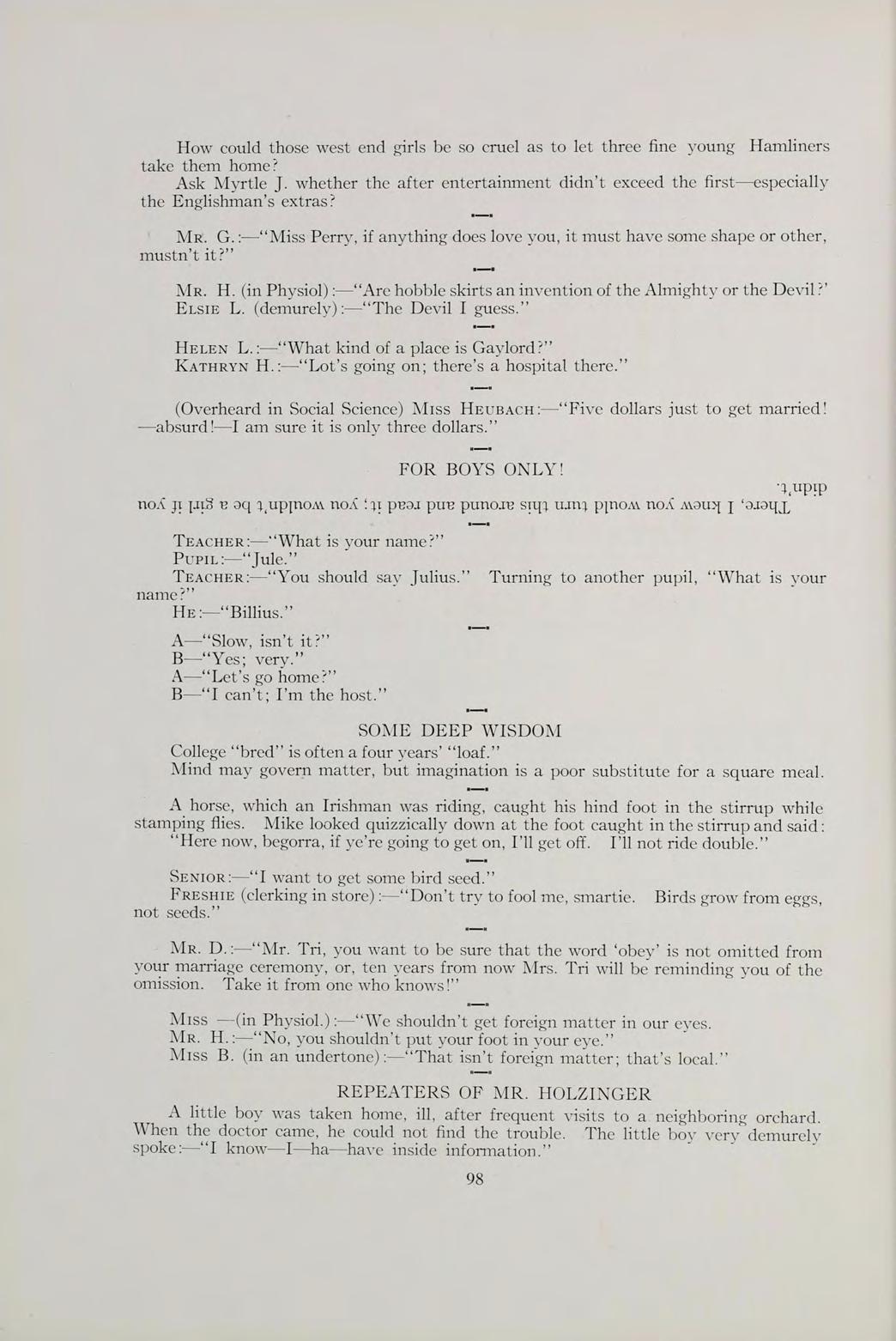
How could those west end girls be so cruel as to let three fine young Hamliners takethem home?
Ask Myrtle J. whether the after entertainment didn’t exceed the first—especially the Englishman’s extras?
Mr. G. :—“Miss Perry, if anything does love you, it must have some shape or other, mustn’t it?”
Mr. H. (in Physiol):—“Are hobble skirts an invention of the Almighty or the Devil.'’ Elsie L. (demurely):—“The Devil I guess.”
Helen L.:—“What kind of a place is Gaylord?”
Kathryn H.:—“Lot’s going on; there’s a hospital there.”
(Overheard in Social Science) Miss Heubach:—“Five dollars just to get married! —absurd!—I am sure it is only three dollars.”
FOR BOYS ONLY!
ji b oq yupjnoA\ noX I u pnoa pun punojB siq; run; pjnoAV noX avou>[ j ‘oaoqj^
Teacher:—“What is your name?”
Pupil:—“Jule.”
Teacher:—“You should say Julius.” Turning to another pupil, “What is your name?”
He:—“Billius.”
A—“Slow, isn’t it?”
B—“Yes; very.”
A—“Let’s go home?”
B—“I can’t; I'm the host.”
College “bred” is often a four years’ “loaf.”
Mind may govern matter, but imagination is a poor substitute for a square meal.
A horse, which an Irishman was riding, caught his hind foot in the stirrup while stamping flies. Mike looked quizzically down at the foot caught in the stirrup and said: “Here now, begorra, if ye’re going to get on, I’ll get off. I’ll not ride double.”
Senior:—“I want to get some bird seed.”
Freshie (clerking in store):—“Don’t try to fool me, smartie. Birds grow from eggs, not seeds.”
Mr. D.:—“Mr. Tri, you want to be sure that the word ‘obey’ is not omitted from your marriage ceremony, or, ten years from now Mrs. Tri will be reminding you of the omission. Take it from one who knows!”
Miss —(in Physiol.):—“We shouldn’t get foreign matter in our eyes.
Mr. H.:—“No, you shouldn’t put vour foot in vour eye.”
M iss B. (in an undertone):—“That isn’t foreign matter; that’s local.”
A little boy was taken home, ill, after frequent visits to a neighboring orchard. When the doctor came, he could not find the trouble. The little boy very demurely spoke:—“I know—I—ha—have inside information.”

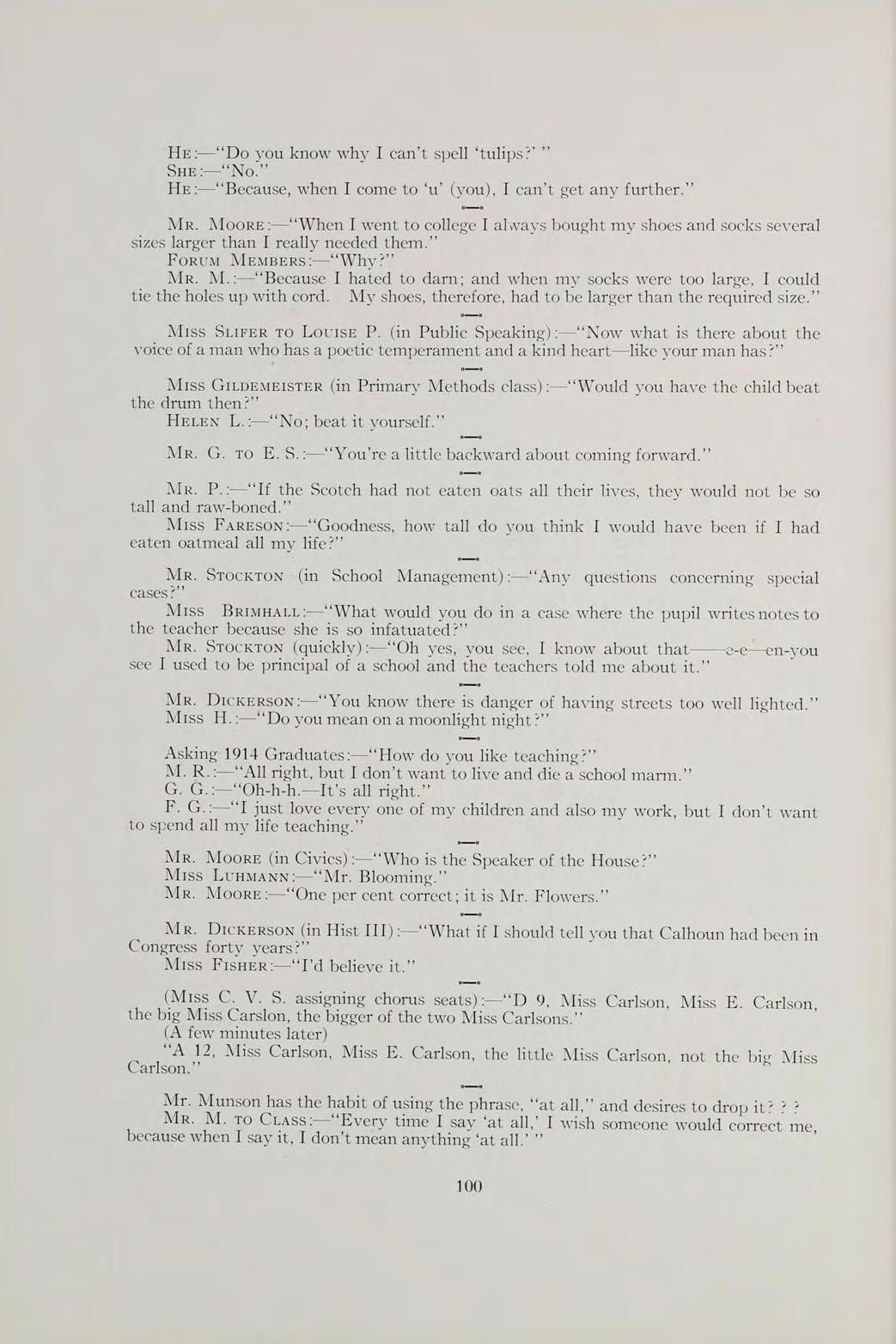
He:—“Do you know why I can’t spell ‘tulips."'
She :—“No.”
He:—“Because, when I come to V (you), I can’t get any further.”
Mr. Moore :—“When I went to college I always bought my shoes and socks several sizes larger than I really needed them.”
Forum Members:—“Why?”
Mr. M.:—“Because I hated to darn; and when my socks were too large, I could tie the holes up with cord. My shoes, therefore, had to be larger than the required size.”
Miss Slifer to Louise P. (in Public Speaking):—“Now what is there about the voice of a man who has a poetic temperament and a kind heart—like your man has."”
Miss Gildemeister (in Primary Methods class):—“Would you have the child beat the drum then?”
Helen L.:—“No; beat it yourself.”
Mr. G. to E. S.:—“You’re a little backward about coming forward.”
Mr. P.:—“If the Scotch had not eaten oats all their lives, they would not be so tall and raw-boned.”
Miss Fareson:—“Goodness, how tall do you think I would have been if I had eaten oatmeal all my life?”
Mr. Stockton (in School Management):—-“Any questions concerning special cases?”
Miss Brimhall:—“What would you do in a case where the pupil writes notes to the teacher because she is so infatuated?”
Mr. Stockton (quickly):—“Oh yes, you see, I know about that e-e—en-you see I used to be principal of a school and the teachers told me about it.”
Mr. Dickerson:—“You know there is danger of having streets too well lighted.”
Miss H.:—“Do you mean on a moonlight night ?”
Asking 1914 Graduates:—“How do you like teaching?”
M. R.:—“All right, but I don’t want to live and die a school marm.”
G. G.:—“Oh-h-h.—It’s all right.”
F. G.:—“I just love every one of my children and also my work, but I don’t want to spend all my life teaching.”
Mr. Moore (in Civics):—“Who is the Speaker of the House?”
Miss Luhmann:—“Mr. Blooming.”
Mr. Moore:—“One per cent correct; it is Mr. Flowers.”
Mr. Dickerson (in Hist III):—“What if I should tell you that Calhoun had been in Congress forty years?”
Miss Fisher:—“I’d believe it.”
(Miss C. V. S. assigning chorus seats):—“D 9, Miss Carlson, Miss E. Carlson, the big Miss Carslon, the bigger of the two Miss Carlsons.”
(A few minutes later)
“A 12, Miss Carlson, Miss E. Carlson, the little Miss Carlson, not the big Miss Carlson.”
Mr. Munson has the habit of using the phrase, “at all,” and desires to drop it? ? ?
Mr. M. to Class:—“Every time I say ‘at all,’ I wish someone would correct me, because when I say it, I don’t mean anything ‘at all.’
100
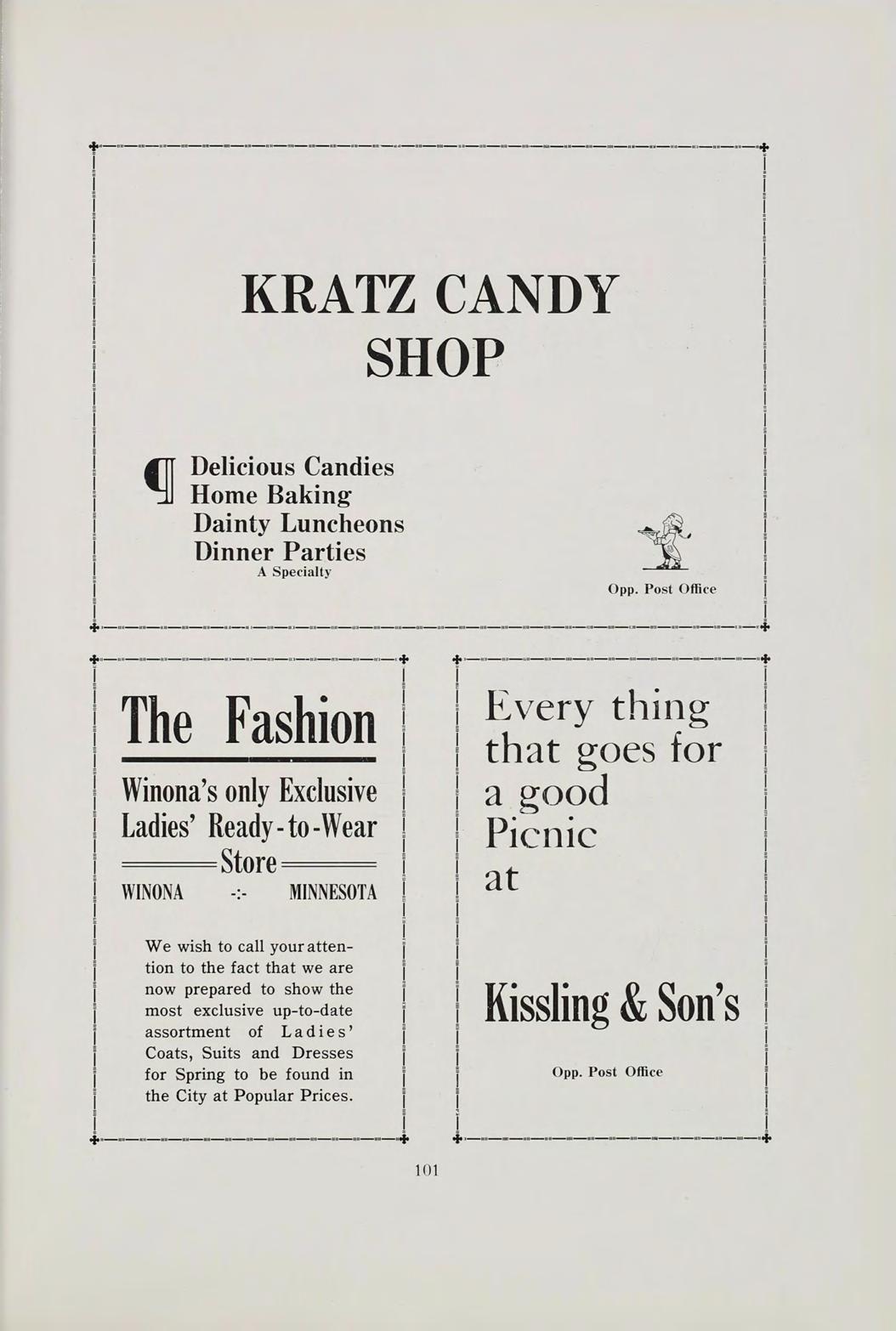
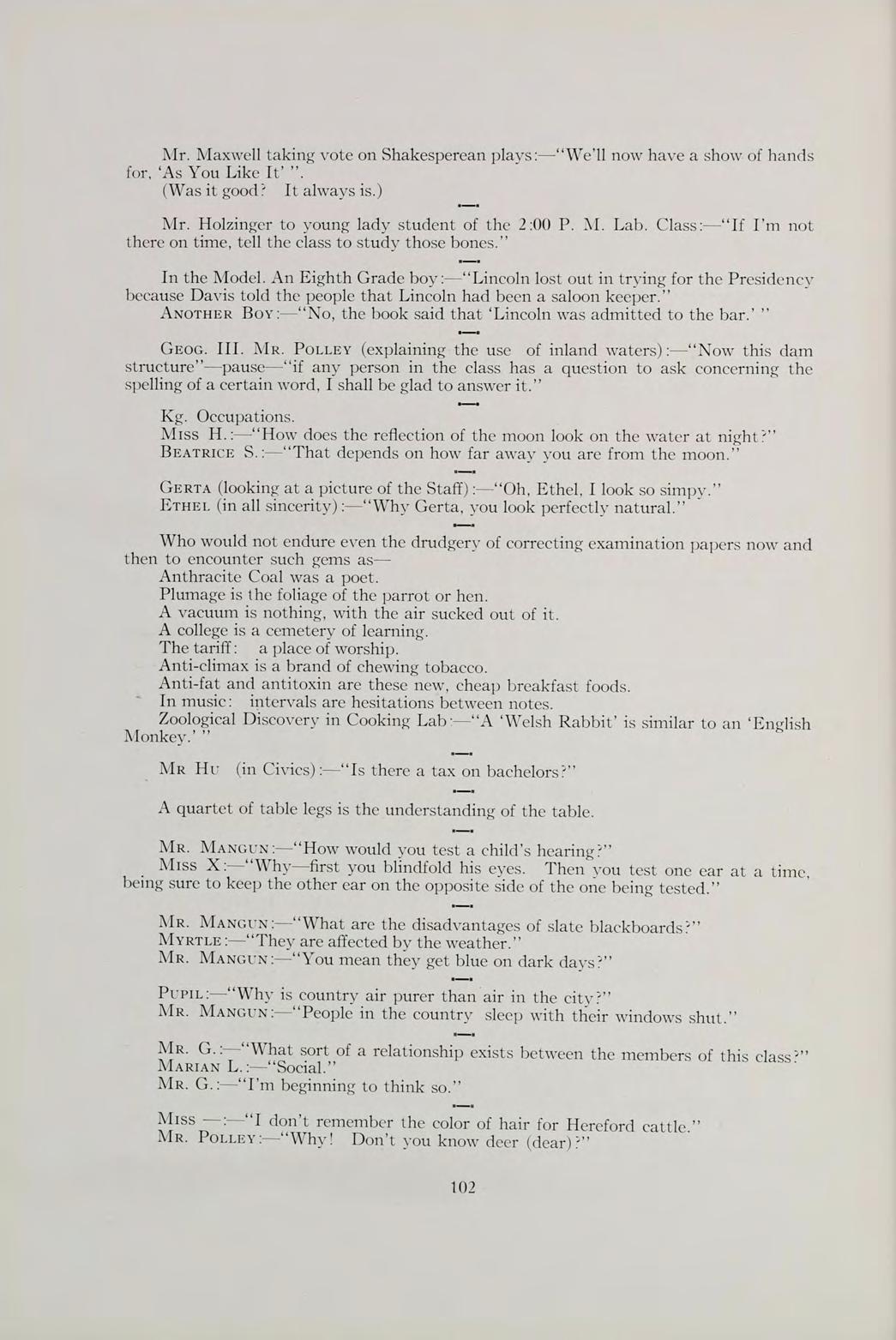
Mr. Maxwell taking vote on Shakesperean plays:—“We’ll now have a show of hands for, ‘As You Like It’ ’’.
(Was it good ? It always is.)
Mr. Holzinger to young lady student of the 2:00 P. M. Lab. Class:—“If I’m not there on time, tell the class to study those bones.”
In the Model. An Eighth Grade boy:—“Lincoln lost out in trying for the Presidency because Davis told the people that Lincoln had been a saloon keeper.”
Another Boy:—“No, the book said that ‘Lincoln was admitted to the bar.’
Geog. III. Mr. Polley (explaining the use of inland waters):—“Now this dam structure”-—pause—“if any person in the class has a question to ask concerning the spelling of a certain word, I shall be glad to answer it.”
Kg. Occupations.
Miss IL:—“How does the reflection of the moon look on the water at night.'”
Beatrice S.:-—“That depends on how far away you are from the moon.”
Gerta (looking at a picture of the Staff):—“Oh, Ethel, I look so simpy.”
Ethei. (in all sincerity):—“Why Gerta, you look perfectly natural.”
Who would not endure even the drudgery of correcting examination papers now and then to encounter such gems as—
Anthracite Coal was a poet.
Plumage is the foliage of the parrot or hen.
A vacuum is nothing, with the air sucked out of it.
A college is a cemetery of learning.
The tariff: a place of worship.
Anti-climax is a brand of chewing tobacco.
Anti-fat and antitoxin are these new, cheap breakfast foods.
In music: intervals are hesitations between notes.
Zoological Discovery in Cooking Lab:—“A ‘Welsh Rabbit’ is similar to an ‘English Monkey.’
Mr Hu (in Civics):—“Is there a tax on bachelors?”
A quartet of table legs is the understanding of the table.
Mr. Mangun:—“How would you test a child’s hearing?”
Miss X:—“Why—first you blindfold his eyes. Then you test one ear at a time, being sure to keep the other ear on the opposite side of the one being tested.”
Mr. Mangun:—“What are the disadvantages of slate blackboards?”
Myrtle :—“They are affected by the weather.”
Mr. Mangun:—“You mean they get blue on dark days?”
Pupil:—“Why is country air purer than air in the city?”
Mr. Mangun:—“People in the country sleep with their windows shut.”
Mr. G.:—“What sort of a relationship exists between the members of this class?”
Marian L.:—“Social.”
Mr. G.:—“I’m beginning to think so.”
Miss —:—“I don’t remember the color of hair for Hereford cattle.”
Mr. Polley:—“Why! Don’t you know deer (dear)?”
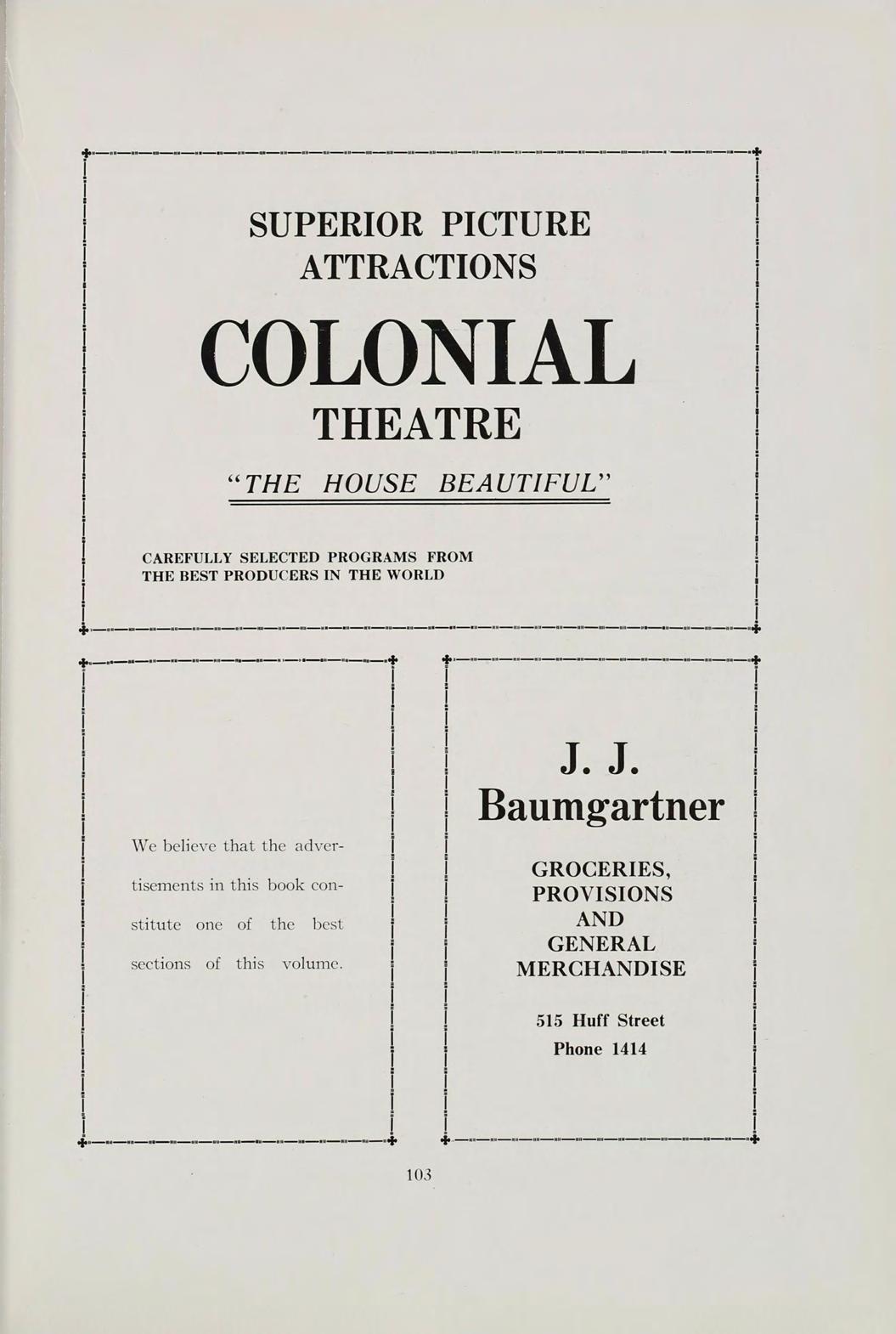
“THE
CAREFULLY SELECTED PROGRAMS FROM THE BEST PRODUCERS IN THE WORLD !* J.
We believe that the advertisements in this book con-
stitute one of the best AND sections of this volume.
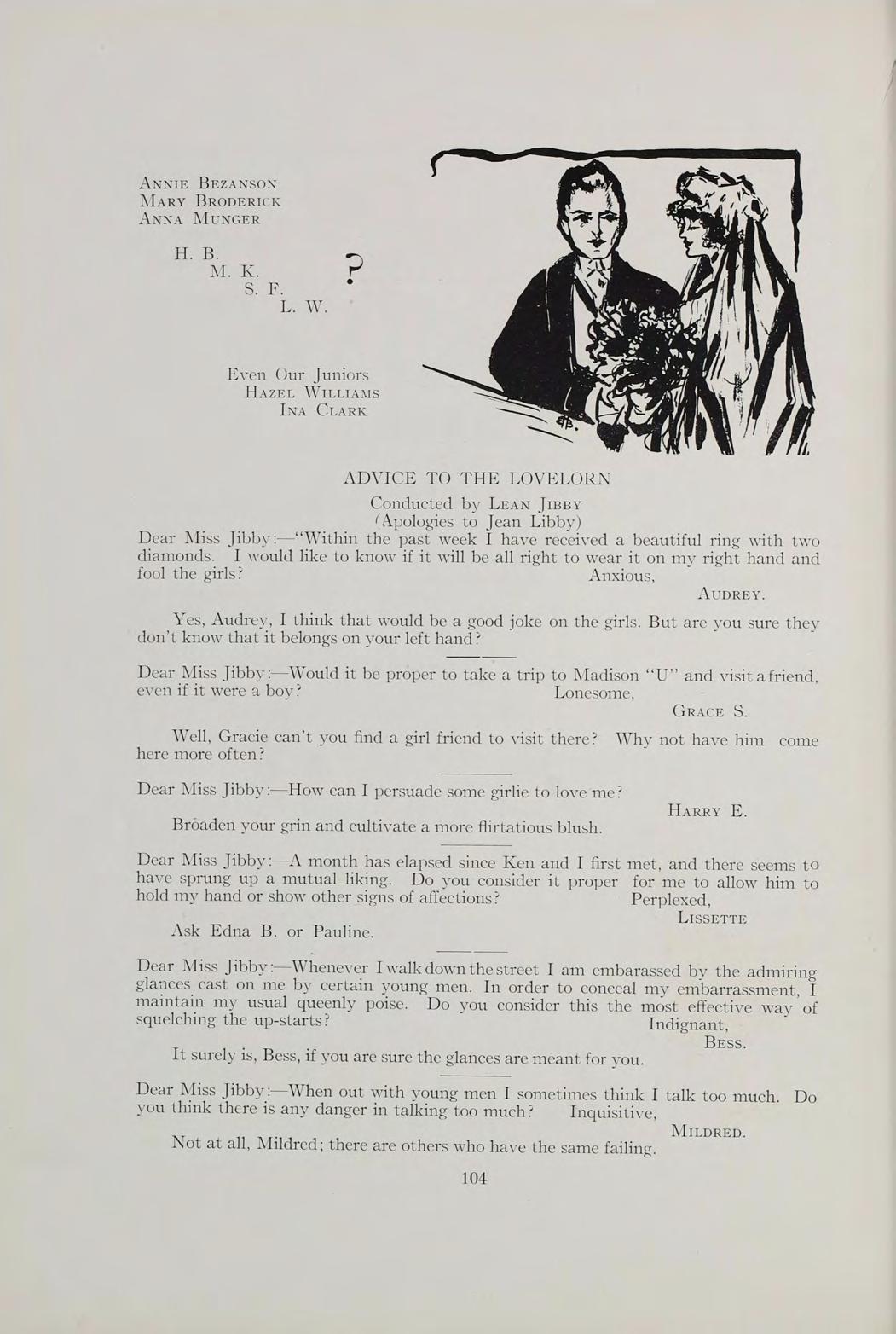
Annie Bezanson
Mary Broderick
Anna Monger
H. B.
M. K.
S. F. L. W.
Even Our Juniors
Hazel Williams
Ina Clark
Conducted by Lean Jibby ^Apologies to Jean Libby)
Dear Miss Jibby:—“Within the past week I have received a beautiful ring with two diamonds. I would like to know if it will be all right to wear it on my right hand and fool the girls? Anxious, Audrey.
Yes, Audrey, I think that would be a good joke on the girls. But are you sure they don’t know that it belongs on your left hand ?
Dear Miss Jibby:—Would it be proper to take a trip to Madison “U” and visitafriend, even if it were a boy ? Lonesome, Grace S.
Well, Gracie can’t you find a girl friend to visit there? Why not have him come here more often?
Dear Miss Jibby:-—How can I persuade some girlie to love me?
Broaden your grin and cultivate a more flirtatious blush. Harry E.
Dear Miss Jibby:-—A month has elapsed since Ken and I first met, and there seems to have sprung up a mutual liking. Do you consider it proper for me to allow him to hold my hand or show other signs of affections? Perplexed, Lissette Ask Edna B. or Pauline.
Dear Miss Jibby:—Whenever I walk down the street I am embarassed by the admiring glances cast on me by certain young men. In order to conceal my embarrassment, I maintain my usual queenly poise. Do you consider this the most effective way of squelching the up-starts? Indignant, Bess.
It surely is, Bess, if you are sure the glances are meant for you.
Dear Miss Jibby:—When out with young men I sometimes think I talk too much. Do you think there is any danger in talking too much? Inquisitive, Not at all, Mildred; there are others who have the same failing. Mildred.
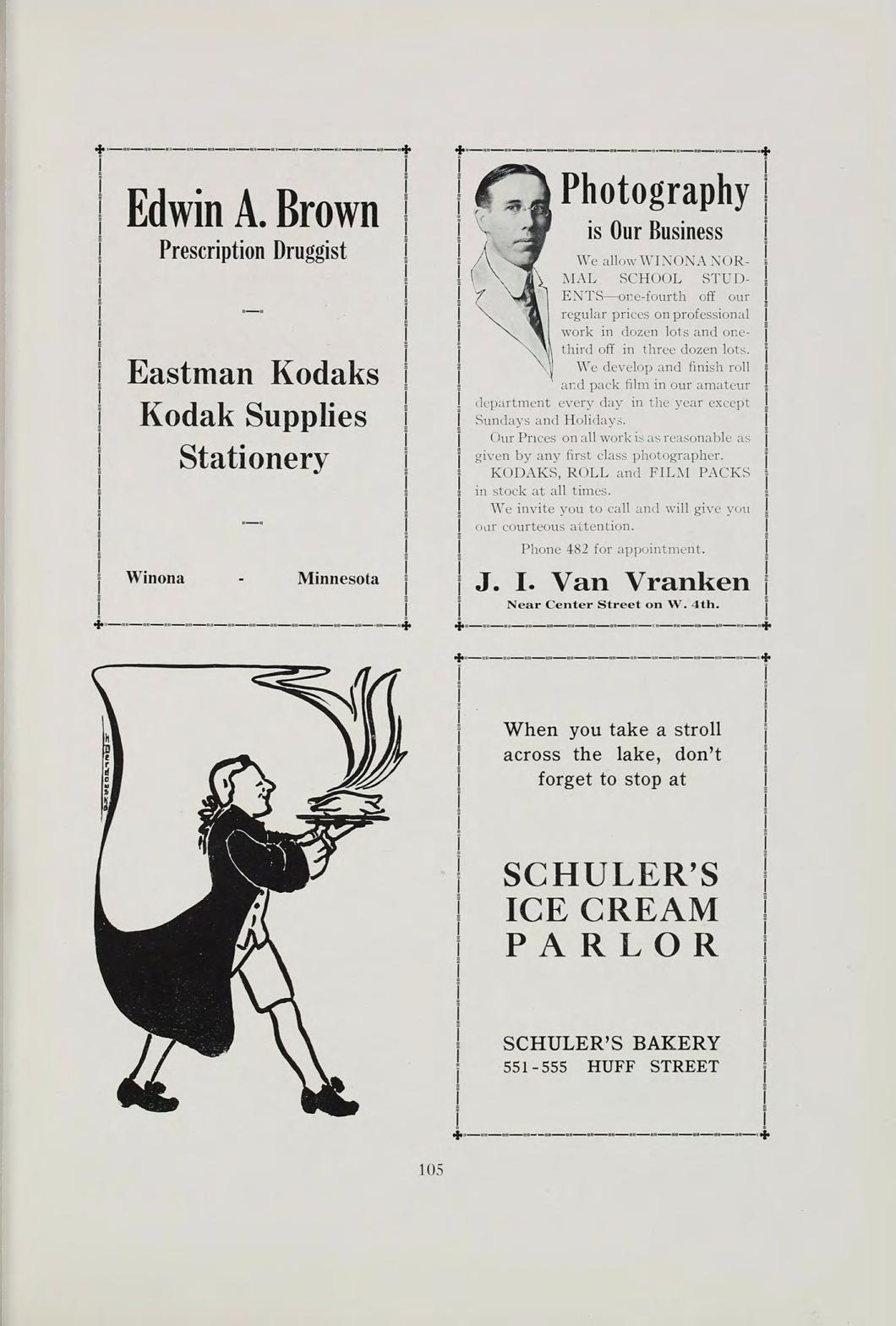
We allow WINONA NORMAL SCHOOL STUDENTS—one-fourth off our regular prices on professional work in dozen lots and onethird off in three dozen lots. We develop and finish roll and pack film in our amateur department every day in the year except Sundays and Holidays.
Our Prices on all work is as reasonable as given by any first class photographer.
KODAKS, ROLL and FILM PACKS in stock at all times.
We invite you to call and will give you our courteous attention.
Phone 482 for appointment.
Near Center Street on W. 4th.
When you take a stroll across the lake, don’t forget to stop at
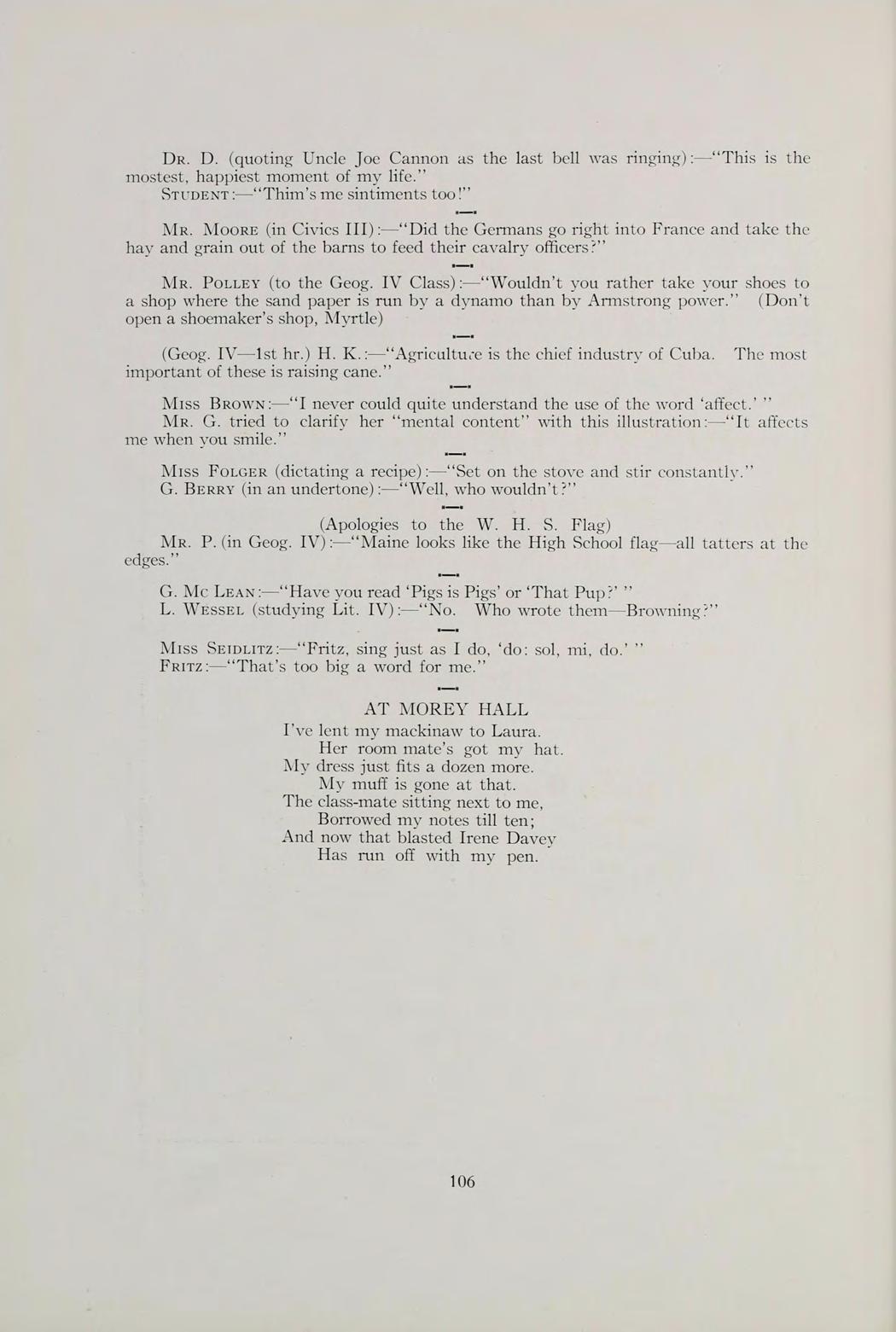
Dr. D. (quoting Uncle Joe Cannon as the last bell was ringing):—“This is the mostest, happiest moment of my life.”
Student —“Thim’s me sintiments too!”
Mr. Moore (in Civics III):—“Did the Germans go right into France and takethe hay and grain out of the barns to feed their cavalry officers?”
Mr. Polley (to the Geog. IV Class):—“Wouldn’t you rather take your shoes to a shop where the sand paper is run by a dynamo than by Armstrong power.” (Don’t open a shoemaker’s shop, Myrtle)
(Geog. IV—1st hr.) H. K.:—“Agriculture is the chief industry of Cuba. The most important of these is raising cane.”
Miss Brown:—“I never could quite understand the use of the word ‘affect.’
Mr. G. tried to clarify her “mental content” with this illustration:—“It affects me when you smile.”
Miss Folger (dictating a recipe):—-“Set on the stove and stir constantly.”
G. Berry (in an undertone):—“Well, who wouldn’t?”
(Apologies to theW. H. S. Flag)
Mr. P. (in Geog. IV):—“Maine looks like the High School flag—all tatters at the edges.”
G. Me Lean:—“Have you read ‘Pigs is Pigs’ or ‘That Pup?’ L. Wessel (studying Lit. IV):—“No. Who wrote them—Browning?”
Miss Seidlitz:—“Fritz, sing just as I do, ‘do: sol, mi, do.’ Fritz:—“That’s too big a word for me.”
I’ve lent my mackinaw to Laura. Her room mate’s got my hat. My dress just fits a dozen more. My muff is gone at that. The class-mate sitting next to me, Borrowed my notes till ten; And now that blasted Irene Davey Has run off with my pen.
EMIL LEICHT President STANLEY J. LOW Manager

(|j Superior equipment and facilities enable us J to offer to Educational Institutions a particularly complete and efficient Printing Service.
{j| Wide experience on College Catalogs, Annual ^ Publications and similar works, together with an organization of intelligent workmen under carefull supervision, insure our patrons that orders will be properly filled, and that the details of typography, presswork and binding will be accorded the attention necessary for the most effective results.
(J LEICHT PRESS SERVICE is resourceful service. Let us submit samples to demonstrate the distinct advantage it has for you.
MINNESOTA
It’s all in the way it’s milled
All requirements are fulfilled Though o’er all the earth you scour You’ll find no match for WINGOLD FLOUR.
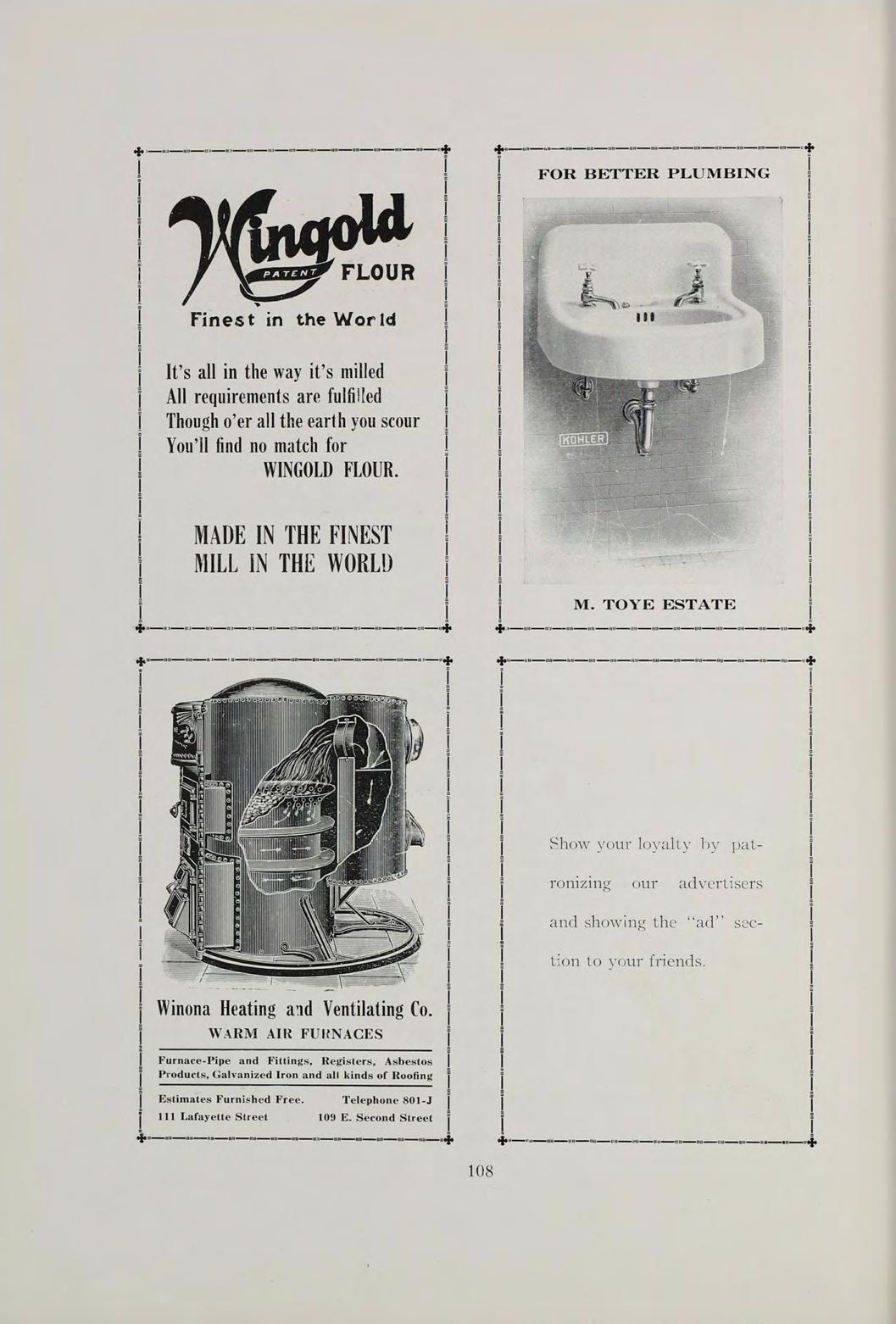
Show your loyalty by patronizing our advertisers and showing the “ad’' section to your friends.
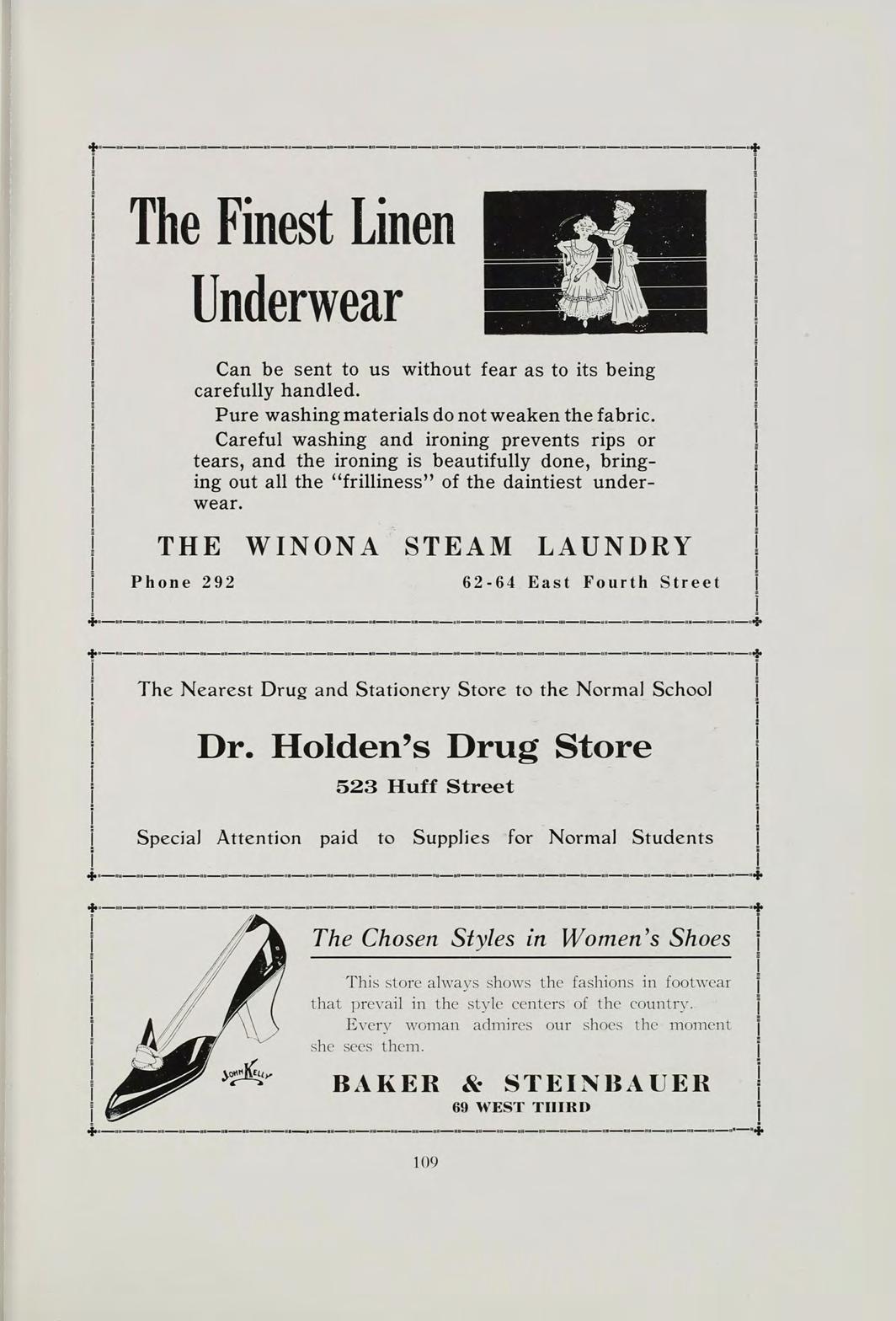
Canbe sent to us without fear as to its being carefully handled.
Pure washing materials do not weaken the fabric. Careful washing and ironing prevents rips or tears, and the ironing is beautifully done, bringing out all the “frilliness” of the daintiestunderwear.
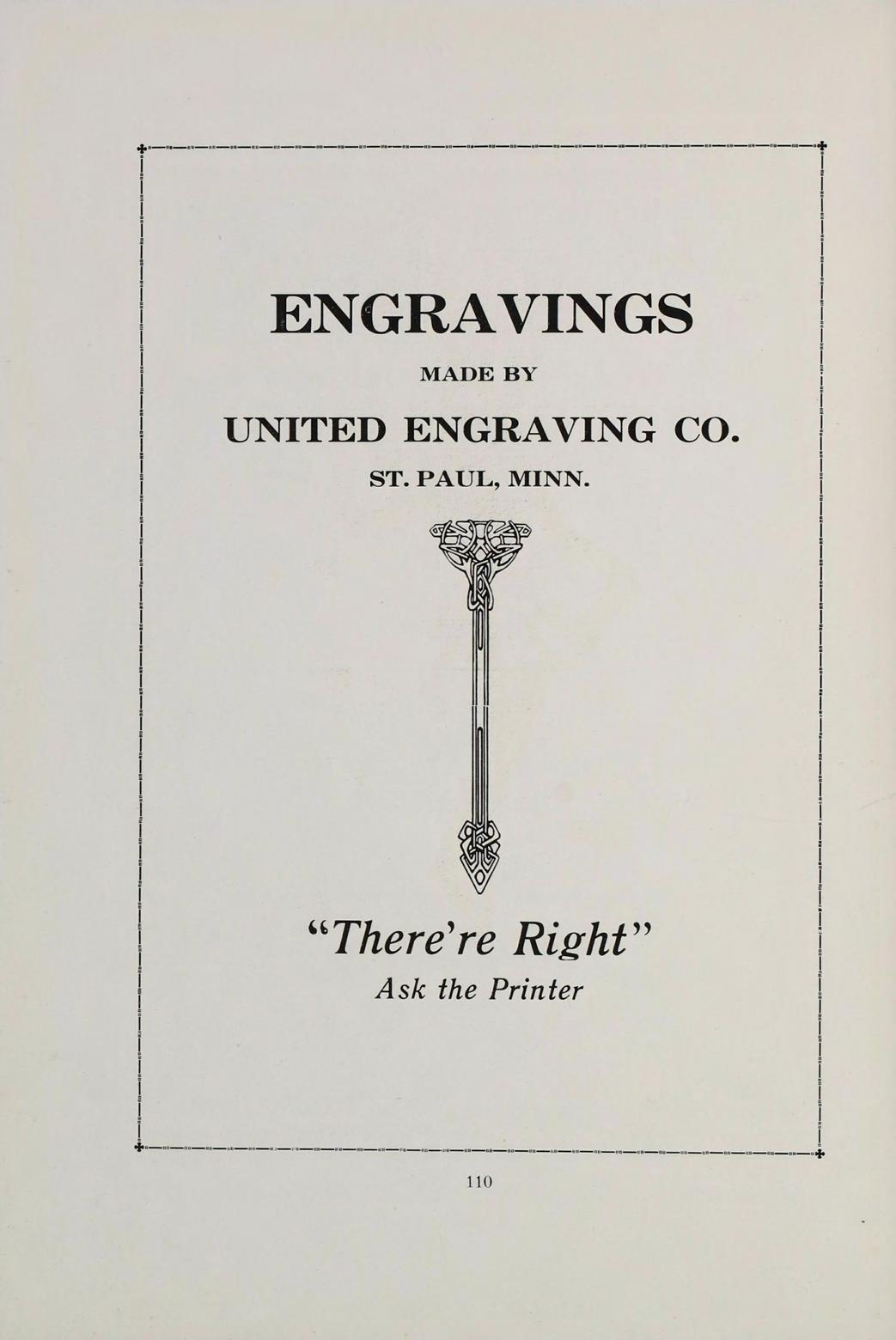
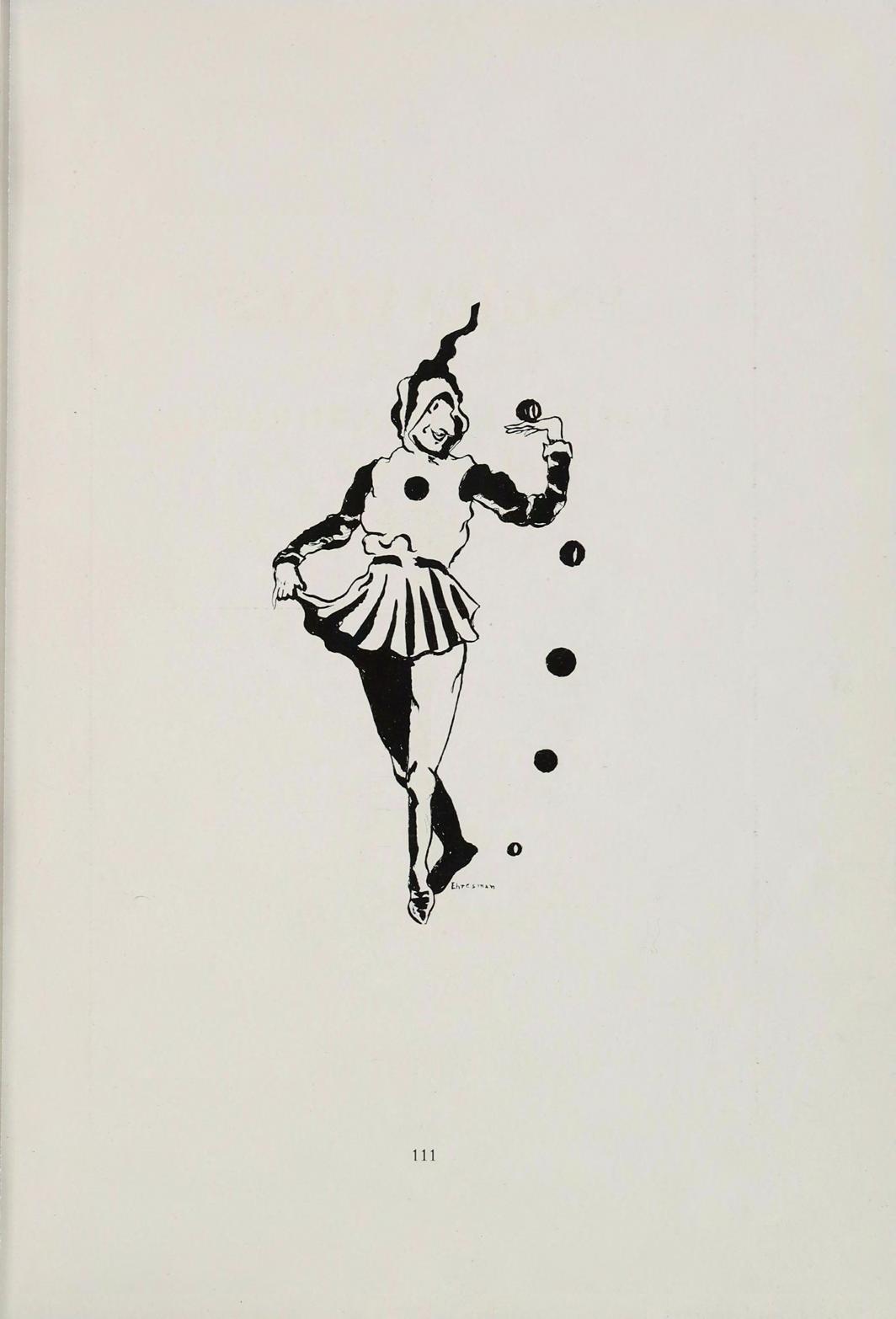


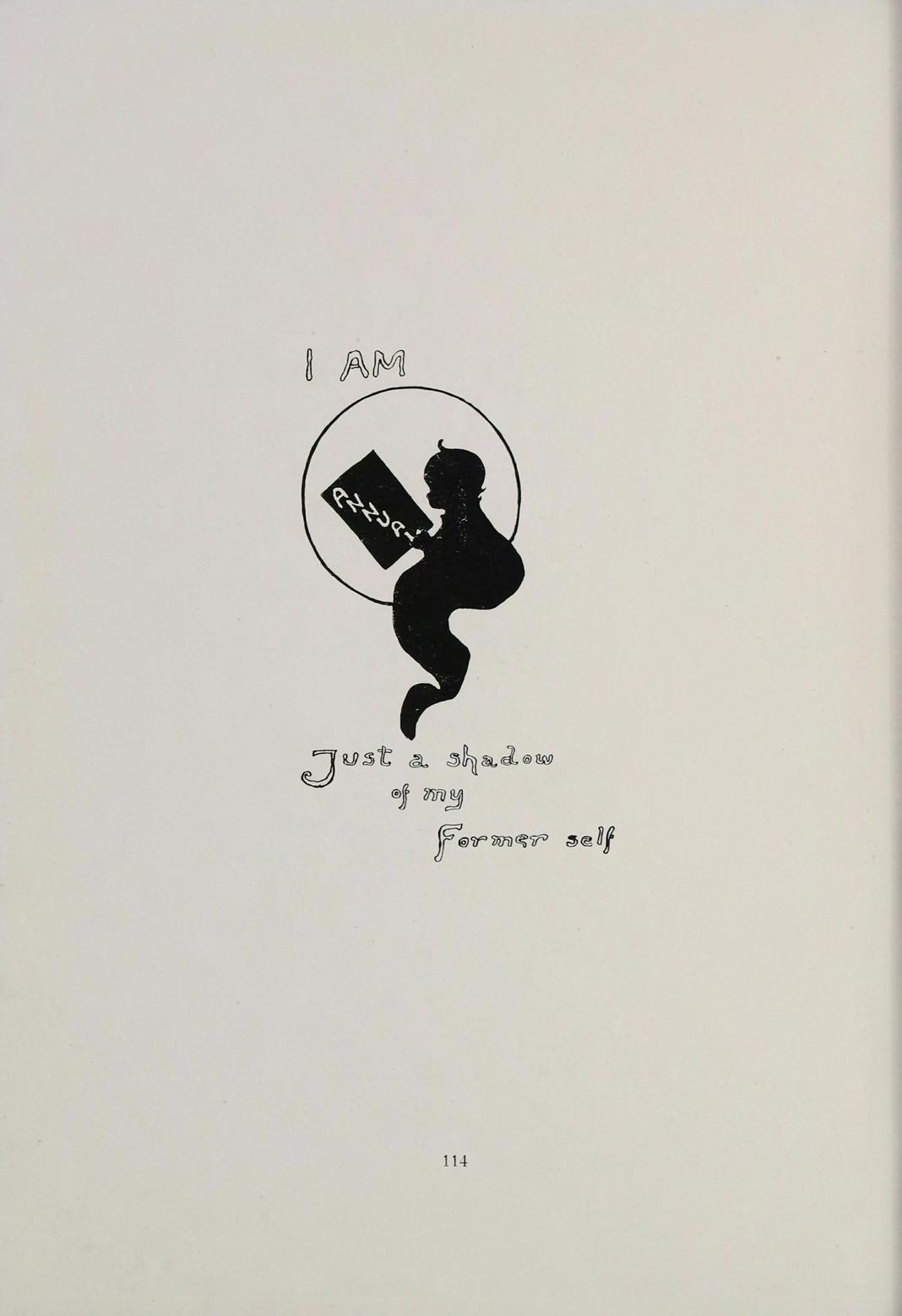
I AM





